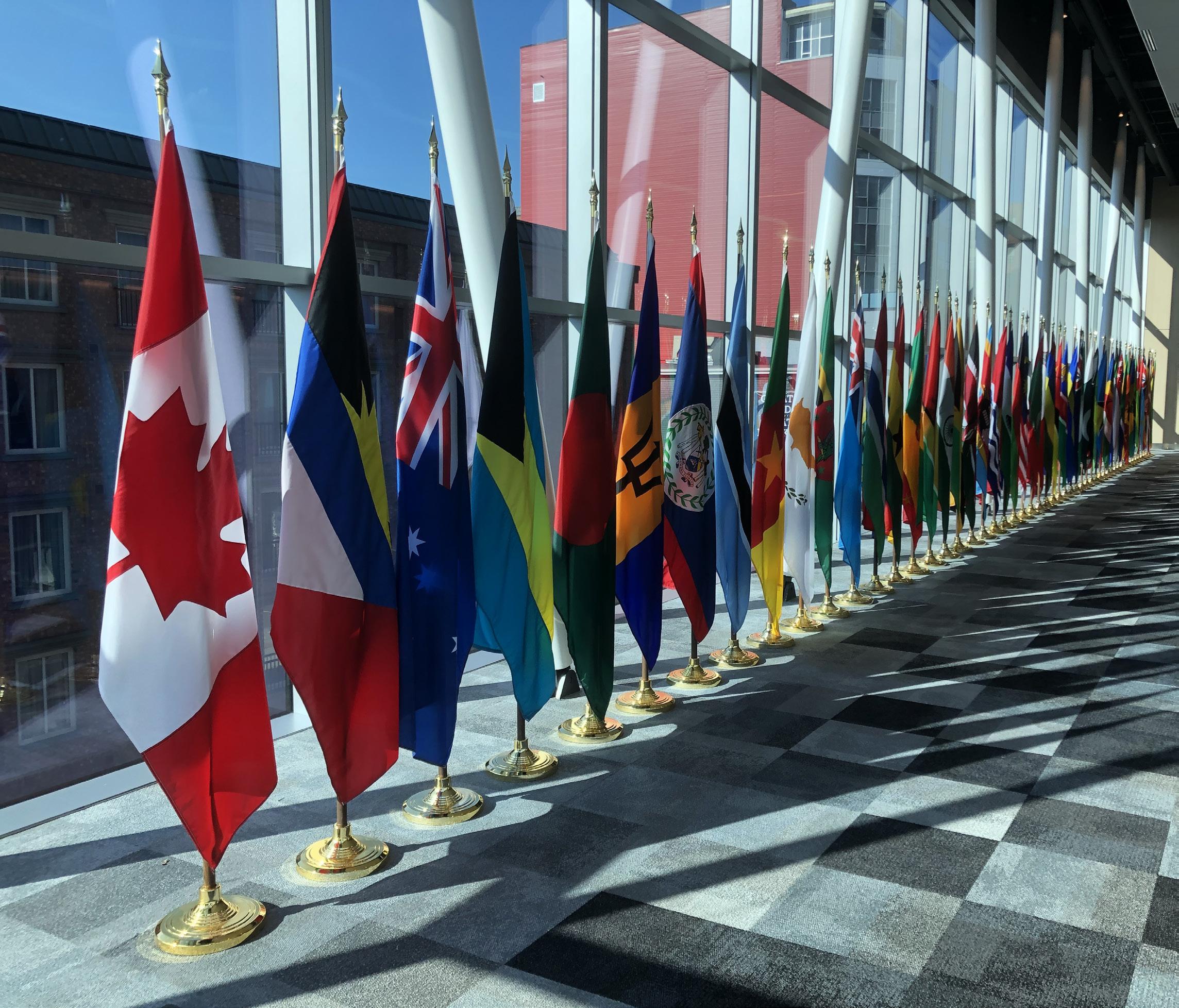
TheParliamentarian Journal of the Parliaments of the Commonwealth Established in 1920 | Over 100 years of publishing 2022 | Volume 103 | Issue Three | Price £14 IN THIS ISSUE 65th CPC: News and Workshop Reports from Halifax, Nova Scotia, Canada PAGES 206-241 7th triennial Commonwealth Women Parliamentarians (CWP) Conference PAGES 242-255 38th CPA Small Branches Conference PAGES 256-267 56th Meeting of the Society-ofClerks-at-the-Table (SoCATT) PAGES 268-269 65e Conférence parlementaire du Commonwealth Halifax, Canada 20 au 26 août 2022 65th Commonwealth Parliamentary Conference Halifax, Canada August 20-26, 2022 CONFERENCE ISSUE: Inclusive, Accessible, Accountable and Strong Parliaments
Register for the CPA Parliamentary Academy Now
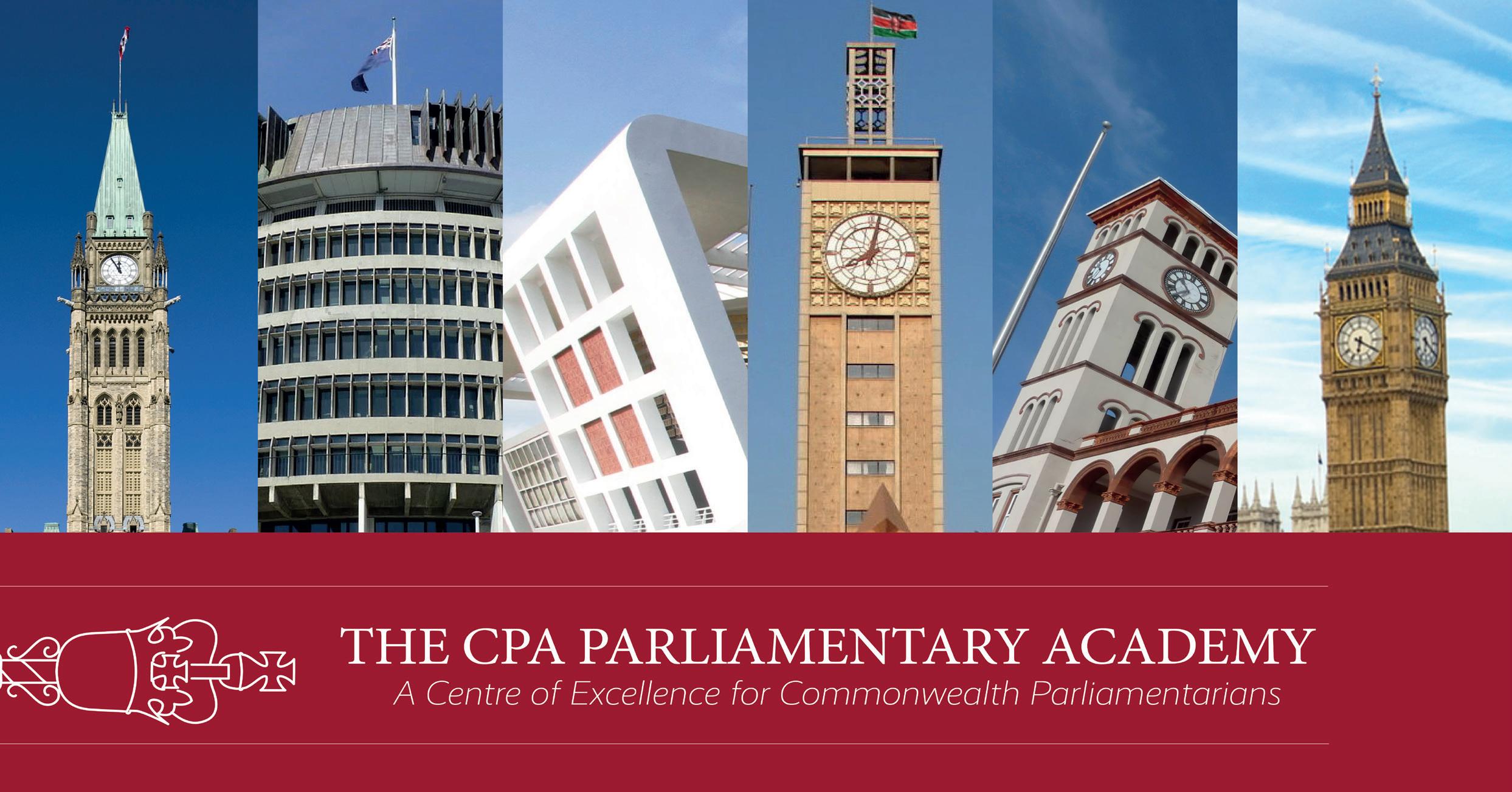
Free courses for CPA Members

The CPA has designed a curriculum of online courses specifically for Parliamentarians and parliamentary officials.
Our courses are intended to strengthen your capacity to fulfil constitutional and statutory obligations as well as to enhance your knowledge and understanding of the role of Parliament in the democratic governance process. These accessible courses offer an adaptive and flexible learning approach, with both written and visual content along with access to a variety of useful resources. So if this sounds right for you, register for the Academy now and get started!
To register for the CPA Parliamentary Academy, please email hq.sec@cpahq.org or fill out a ‘Contact Us’ form on our website. More information can be found on our website: www.cpahq.org/parliamentary-academy
2022
October
Calendar of Forthcoming Events
Updated as at 10 October 2022
4 to 7 October 2022 Commonwealth Women Parliamentarians Regional Conference for the CPA British Islands and Mediterranean Region, Gibraltar
11 to 15 October 2022 145th IPU Assembly, Kigali, Rwanda
18 to 22 October 2022 Commonwealth Women Parliamentarians Regional Sensitization Workshop for CPA Africa Region, Dar Es Salaam, Tanzania
23 to 28 October 2022 CPA Parliamentary Academy - Advanced Professional Development & Skills-Building Residency Course, Western Cape, South Africa

29 Oct to 4 Nov 2022 CPA Technical Assistance Programme (TAP) - St Helena Committee and Ministerial Training
November
6 to 11 November 2022 COP27, Egypt
7 to 8 November 2022 GLOBE COP27 Legislators Summit, Cairo, Egypt (hybrid)
8 to 10 November 2022 Women Political Leaders Conference, Reykjavík, Iceland
20 to 24 November 2022 11th Commonwealth Youth Parliament, Port of Spain, Trinidad and Tobago
14 to 18 November 2022 Commonwealth Parliamentarians with Disabilities (CPwD) Regional Conference, Dar Es Salaam, Tanzania
28 Nov to 3 Dec 2022 Gender Audit for the Legislative Assembly of the Australian Capital Territory, Canberra, Australia
December
5 to 12 December 2022 CWP Workshop on Champions for Gender Equality, Canberra, ACT, Australia 2023
2 to 6 January 2023 Conference of the Speakers and Presiding Officers of the Commonwealth (CSPOC), Canberra, Australia
5 to 9 March 2023 23rd Commonwealth Law Conference 2023, Goa, India
8 March 2023 International Women's Day
11 to 15 March 2023 146th IPU Assembly, Bahrain
13 March 2023 Commonwealth Day
30 Sept to 6 Oct 2023 66th Commonwealth Parliamentary Conference, Accra, Ghana
The CPA calendar fosters the exchange of events and activities between CPA Regions and Branches. For further information on any events, please contact the CPA Branch concerned or the CPA Headquarters Secretariat via hq.sec@cpahq.org or visit www.cpahq.org. CPA Branch Secretaries are asked to send notices of all events to the CPA Headquarters in advance of the publication deadline to ensure the calendar is accurate.
Parliamentary Conversations in the Commonwealth
A new podcast by the CPA that gives a voice to Parliamentarians, civil society experts and activists across the Commonwealth to discuss common democratic challenges and share their ideas on what can be done to solve them.
Listen now to new episodes on all major podcast platforms or visit www.cpahq.org/knowledgecentre/cpa-podcast
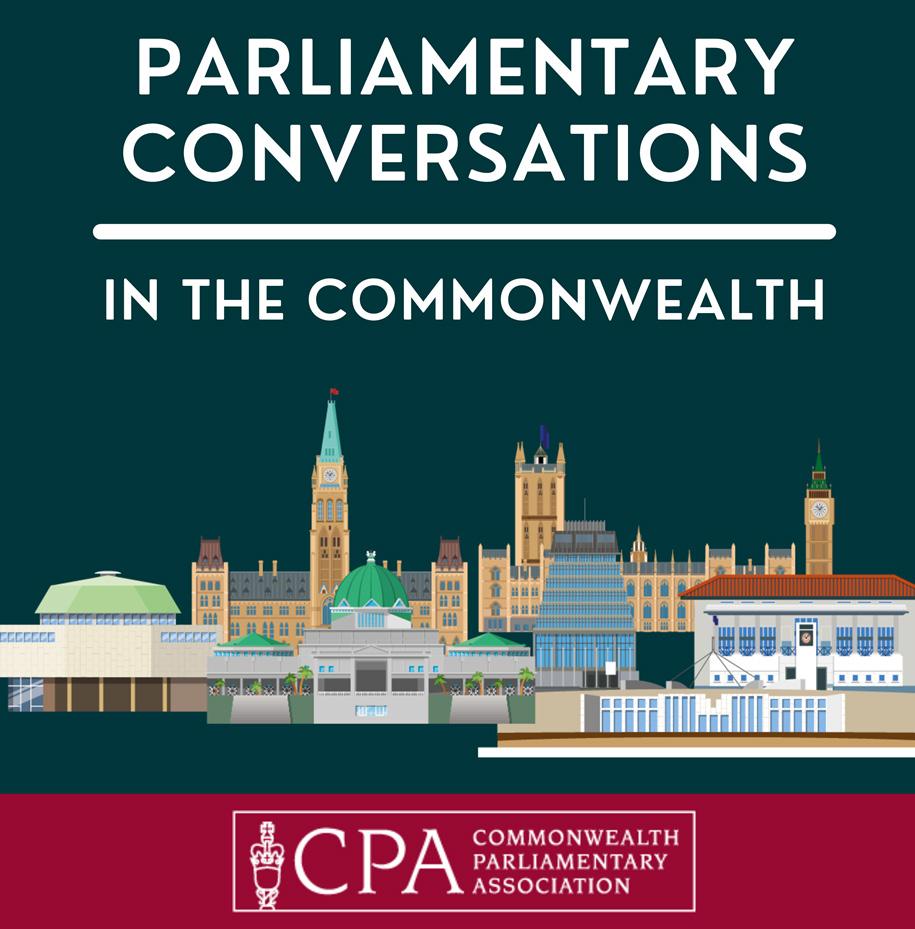
VIEWS & COMMENT
Editor’s Note
Inclusive, Accessible, Accountable and Strong Parliaments Page 196
View from the CPA Secretary-General
Reflections on the 65th Commonwealth Parliamentary Conference Page 198
NEWS & PHOTOS
CPA news News reports include: CPA Small Branches-UNDP Workshop
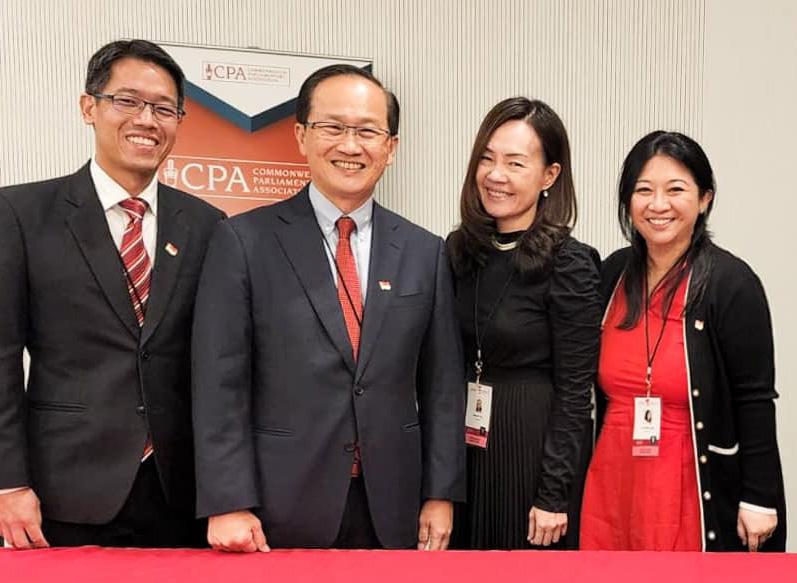
• 58th CPA Canada Regional Conference, Prince Edward Island
• CPA Post-Election Seminar in Zambia
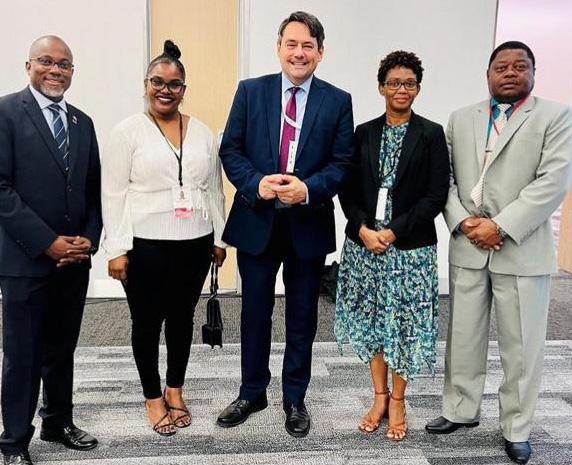
• 51st Presiding Officers and Clerks Conference (POCC) in Victoria
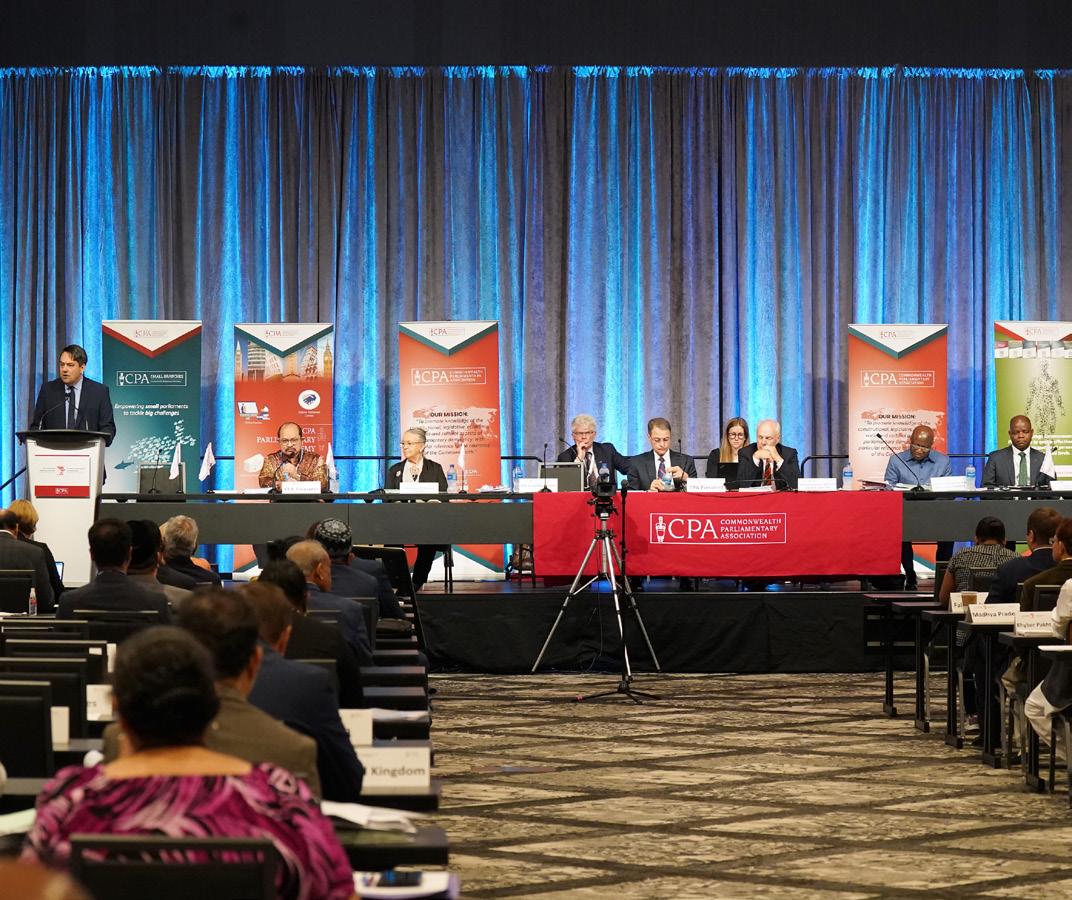
• Montserrat Benchmarks report
Visitors from Zambia, New South Wales, Malaysia, Assam and The Maldives
• CPA Branch visit to Scotland Pages 200-204
PARLIAMENTARY REPORTS
Parliamentary Reports and Third Readings
Legislative reports from Canada, Trinidad and Tobago, United Kingdom, New Zealand, Australia and India Pages 270-285
Book review
A Member of the Parliament of Jamaica reviews a new autobiography of a leading figure in the Commonwealth Page 286
View from the CPA Chairperson
Looking ahead to working with CPA Branches and Regions Page 197
Commonwealth Women Parliamentarians (CWP) news

Reports from CWP activities in Rwanda, Australia, Canada and Uzbekistan Pages 205
CPA DIRECTORY
CPA Organisational Structure
CPA Executive Committee, CWP and CPA Small Branches Steering Committees, CPwD Regional Champions and CPA Regional Secretaries Page 288
194 | The Parliamentarian | 2022: Issue Three | 100 years of publishing
CONTENTS THE PARLIAMENTARIAN: 2022 ISSUE THREE
CONFERENCE REPORTS
65th COMMONWEALTH PARLIAMENTARY CONFERENCE

65th CPC news Reports
Conference opening 65th CPA General Assembly
• CPA Executive Committee
• CPA Officer elections Parliamentarian of the Year Award
• Future Conference venues
• Commonwealth Parliamentarians with Disabilities meetings Pages 206-213

65th CPC Photo Gallery Pages 214-215
65th CPC Official delegate photo Pages 240-241
CPC Workshop A: Remaining Relevant in Response to a Pandemic: The Role and Responsibilities of Parliament Page 216
CPC Workshop B: Role of Parliaments in achieving sustainable development Page 220
CPC Workshop C: A People's Parliament: Accessibility through innovation Page 223
CPC Workshop D: Professional Development for Parliamentarians – Opportunities and Challenges for Small Parliaments Page 226
CPC Workshop E: Access to assistive technologies: Implementation of standards across Commonwealth Parliaments Page 229
CPC Workshop F: Building Gender Sensitive Parliaments Page 232
CPC Workshop G: Cyberbullying: youth, trolling and mental health Page 235
CPC Workshop H: The Climate Emergency: Are Parliaments holding governments to account? Page 237
7th triennial Commonwealth Women Parliamentarians (CWP) Conference Pages 242-243
CWP Workshop A: Empowering Women Parliamentarians and Promoting Diversity/ Intersectionality Page 244
CWP Workshop B: Effectively combating all forms of abuse and harassment in Parliament Page 247
CWP Workshop C: Financial Empowerment of Women and Gender Sensitive Budgeting Page 250
CWP Workshop D: Promoting Gender Sensitive Parliaments PostPandemic Page 253
38th CPA Small Branches Conference Page 256
CPA Small Branches Workshop A: Disaster risk preparedness for small jurisdictions Page 257
CPA Small Branches Workshop B: Building sustainable economies in CPA Small Branches Page 260
CPA Small Branches Workshop C: Financial scrutiny and oversight: How can small Parliaments ensure effective accountability? Page 263

CPA Small Branches Workshop D: Well-Being Indicators for CPA Small Branches Page 266
56th Meeting of the Society-of-Clerks-atthe-Table (SoCATT) Pages 268-269
CONTENTS
The Parliamentarian: Journal of the Parliaments of the Commonwealth
Volume 103 | 2022: Issue Three
The Parliamentarian ISSN 0031-2282
Issued and published by the Commonwealth Parliamentary Association, CPA Headquarters Secretariat, Richmond House, Houses of Parliament, London, SW1A 0AA, United Kingdom.
Tel: +44 (0) 20 7799 1460 Email: hq.sec@cpahq.org www.cpahq.org Twitter @CPA_Secretariat Facebook.com/CPAHQ Stephen Twigg CPA Secretary-General
Mr Jeffrey Hyland
Editor, The Parliamentarian editor@cpahq.org
Main images: CPA Headquarters Secretariat. Additional images: CPA Branches and Shutterstock.
Annual subscription: Four issues including supplements: UK: £44 inc. postage. | Worldwide: £46 surface post and £52 airmail
Price per issue: UK: £14 cover price plus UK or worldwide postage.
Disclaimer: Opinions and comments expressed in articles and reviews published in The Parliamentarian are those of the individual contributors and should not be attributed to the Secretariat of the Association.
Contributors: Thank you to all contributors for this issue.
Printed in: United Kingdom by Warners Midlands, PLC; and Times Printers, Singapore.
Limited print run - contact editor@cpahq.org for details of print copies for CPA Branches.
The Parliamentarian | 2022: Issue Three | 100 years of publishing | 195
INCLUSIVE, ACCESSIBLE, ACCOUNTABLE AND STRONG PARLIAMENTS
Reports from the 65th Commonwealth Parliamentary Conference in Halifax, Canada.
Mr Jeffrey Hyland, Editor
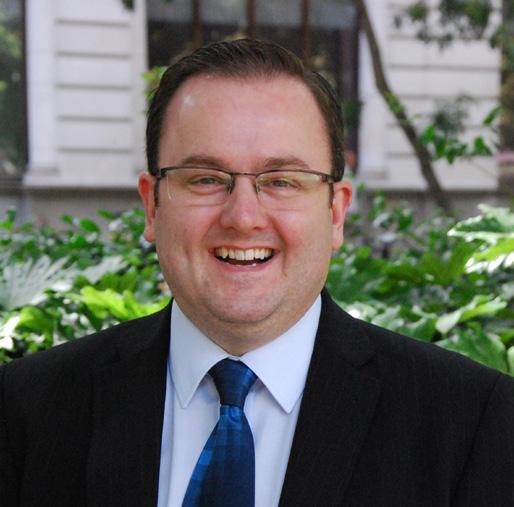
The Parliamentarian,
Commonwealth Parliamentary Association

For the first time in over two years due to the travel restrictions arising from the COVID-19 pandemic, Commonwealth Parliamentarians gathered in Halifax, Nova Scotia, Canada for the 65th Commonwealth Parliamentary Conference (CPC) hosted by the CPA Canada Region. Parliamentarians, Parliamentary Clerks and staff from nine CPA Regions and 128 CPA Branches from 43 Commonwealth countries attended the 65th CPC along with experts and academics for this unique conference and networking opportunity.
This Conference issue of The Parliamentarian reports on the 65th CPC and the many sub-conferences and governance meetings that took place including: 38th CPA Small Branches Conference; 7th triennial Commonwealth Women Parliamentarians (CWP) Conference; meetings of the Commonwealth Parliamentarians with Disabilities (CPwD); 65th CPA General Assembly, meetings of the CPA Executive Committee; and the 56th Society of Clerks at the Table (SoCATT) meeting.
This issue also features detailed reports of the many CPC, CWP and CPA Small Branches workshops covering a wide range of thematic topics and shared experiences.
The annual conference also held elections for the Chairperson of the CPA Executive Committee; the Chairperson of the Commonwealth Women Parliamentarians; the Chairperson of the CPA Small Branches; and the CPA Treasurer for new terms of office.
The newly elected CPA Chairperson, Hon. Ian LiddellGrainger, MP (United Kingdom) and the CPA Secretary-General, Stephen Twigg in their View articles for The Parliamentarian reflect on the recent 65th CPC in Canada and the opportunity it gave to bring Commonwealth Parliamentarians together.
This issue of The Parliamentarian features a wide range of news and reports from CPA and Commonwealth activities including: the CPA Small Branches-UNDP Workshop; 58th CPA Canada Regional Conference in Prince Edward Island; CPA PostElection Seminar in Zambia; 51st Presiding Officers and Clerks Conference (POCC) in Victoria; Montserrat Benchmarks report; Visitors from Zambia, New South Wales, Malaysia, Assam and The Maldives; and the CPA Branch visit to Scotland.
The Parliamentary Report and Third Reading section in this
issue includes parliamentary and legislative news from Canada Federal; Trinidad and Tobago; India; New Zealand; United Kingdom; and Australia Federal. We also feature a book review by a Member of the Parliament of Jamaica on a new autobiography of a leading figure in the Commonwealth, Carl Wright, SecretaryGeneral Emeritus, Commonwealth Local Government Forum and member of the Editorial Advisory Board for The Parliamentarian
We look forward to hearing your feedback and comments on this issue of The Parliamentarian, on the issues affecting Parliamentarians across the Commonwealth and to receiving your future contributions to this publication.
Jeffrey Hyland Editor, The Parliamentarian editor@cpahq.org
A special supplement paying tribute to the CPA Patron, Queen Elizabeth II, featuring some of the many parliamentary tributes from across the Commonwealth as well as reflections on her life and legacy as Head of the Commonwealth, can be found with this issue of The Parliamentarian and also on the CPA website.
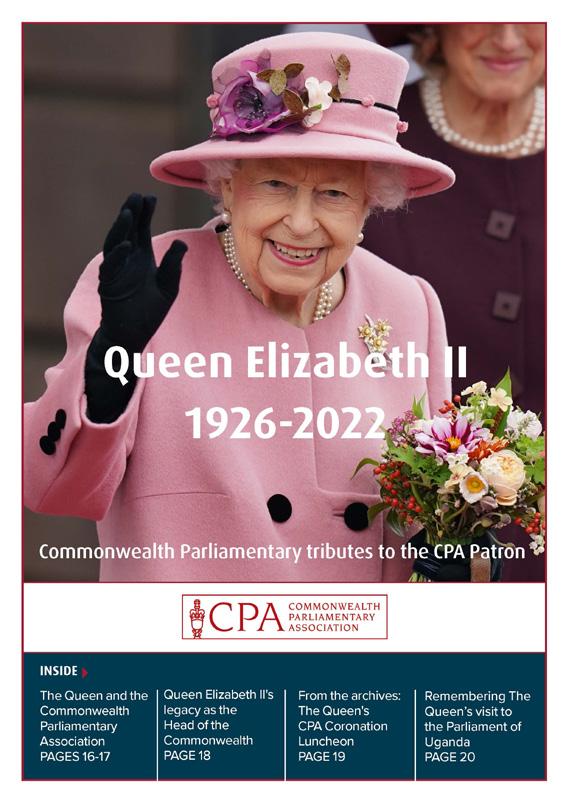
196 | The Parliamentarian | 2022: Issue Three | 100 years of publishing EDITOR’S NOTE
NEW CPA CHAIRPERSON LOOKS AHEAD TO WORKING WITH CPA BRANCHES AND REGIONS
 Hon. Ian Liddell-Grainger, MP, Chairperson of the CPA Executive Committee and Member of the United Kingdom Parliament.
Hon. Ian Liddell-Grainger, MP, Chairperson of the CPA Executive Committee and Member of the United Kingdom Parliament.
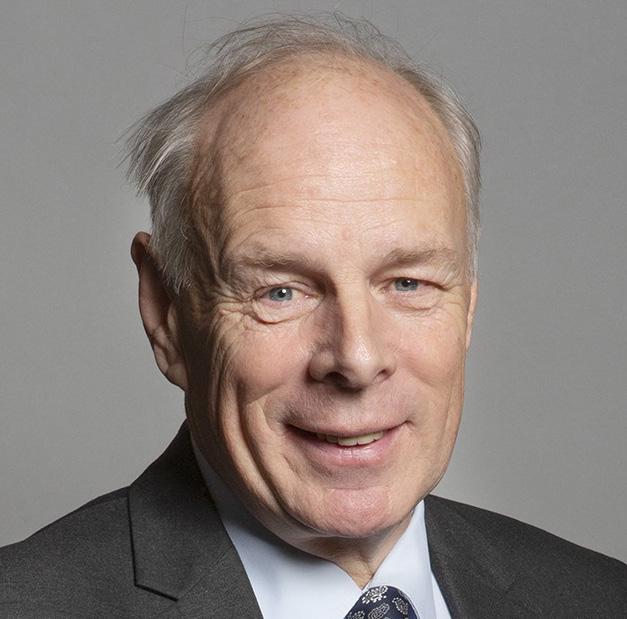
It is a great pleasure to be writing my first View Article for The Parliamentarian in my new capacity as Chairperson of the Commonwealth Parliamentary Association (CPA) Executive Committee. Following my election at the recent 65th Commonwealth Parliamentary Conference (CPC) in Canada, I have been provided with the opportunity to continue the work I began as Acting Chairperson following the very sad and untimely passing of our former CPA Chairperson and the Deputy Speaker of Cameroon, Hon. Emilia Monjowa Lifaka, MP, in April 2021.
Hon. Lifaka’s legacy lives on in the work of the CPA and the many positive changes the organisation brought about under her strong leadership.
During my term over the next three years, I greatly look forward to working with each and every member of our organisation, liaising closely with the CPA’s Branches and Regions to ensure our membership’s needs are met and that the CPA continues to develop from strength to strength. A key part of this work will be the progression of the issue of a change to the CPA’s legal status – an undertaking to which I am wholly committed. I will do this alongside our CPA Working Group on Governance, the CPA Executive Committee and newly elected CPA Officers, many of whom I have had the pleasure of working together with previously. I am aware of, and greatly respect, their dedication to the CPA and our aims.
The CPC was a fantastic chance to meet with many colleagues from across all nine of our CPA Regions. After a hiatus of three years, it was excellent to see so many Members,
Parliamentarians and parliamentary staff, convene to reaffirm our dedication to building and maintaining strong, accountable and inclusive Parliaments, contributing to the strengthening of democracy across the Commonwealth. The CPA Executive Committee and the 65th CPA General Assembly saw the agreement of exciting and important decisions on governance issues such as measures to increase women’s representation in the CPA’s membership, changes to ensure the Commonwealth Parliamentarians with Disabilities (CPwD) network and its Chairperson are of equal basis with our other networks within the CPA’s structures and an increase in the population threshold for Branches of our CPA Small Branches network.
Looking outside of our formal governance structures, the CPC also saw many experts present on a wide range of topics, from responses to the COVID-19 pandemic, tackling climate change and achieving the sustainable development goals to accessibility and technology for Parliaments and building gender sensitive Legislatures. This sharing of best practice is a core component of the CPA’s success in empowering change. I look forward to continuing to engage with our Members and other Commonwealth and international organisations on leading progress in these areas and promoting our shared values.
In recent weeks, all of us at the CPA were extremely saddened to learn of the passing of Her Majesty Queen Elizabeth II. As Head of the Commonwealth and Patron of the CPA, Her Majesty played a pivotal role in the development of the modern Commonwealth and it was my great honour to represent the CPA at Her Late Majesty’s State Funeral in London, alongside many Commonwealth leaders, High Commissioners and dignitaries who paid their respects.
A special supplement paying tribute to the CPA Patron and featuring some of the many parliamentary tributes to Her Majesty The Queen can be found with this issue of The Parliamentarian and also on the CPA website.
The Parliamentarian | 2022: Issue Three | 100 years of publishing | 197 VIEW FROM THE CPA CHAIRPERSON
“During my term over the next three years, I greatly look forward to working with each and every member of our organisation, liaising closely with the CPA’s Branches and Regions to ensure our membership’s needs are met and that the CPA continues to develop from strength to strength.”
REFLECTIONS ON THE 65th COMMONWEALTH PARLIAMENTARY CONFERENCE IN CANADA
The Secretary-General of the Commonwealth Parliamentary Association, Stephen Twigg
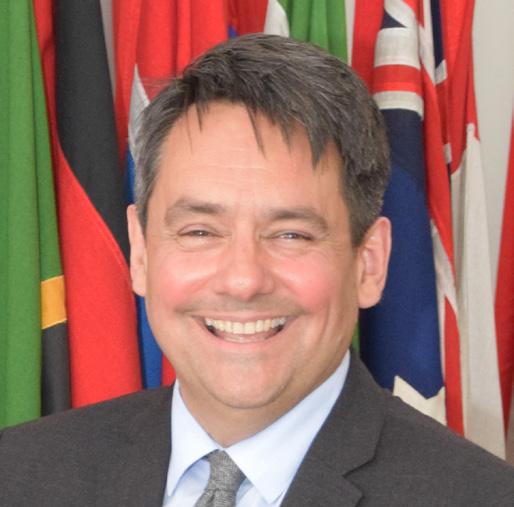
August 2022 saw the first Commonwealth Parliamentary Conference (CPC) since Kampala in 2019. It was wonderful to meet delegates and observers from throughout the Commonwealth. I am hugely grateful to the CPA Canada Region for hosting the 65th CPC in Halifax, Nova Scotia.
The mood of the Conference was very positive and characterised by a determination that the CPA will move forward in a spirit of unity and harmony. This mood was a common thread through our proceedings including the 65th CPA General Assembly, the CWP Conference, the CPA Small Branches Conference, the CPwD Regional Champions meeting, the Conference Workshops and the CPA Executive Committee.
I often emphasise that mutual learning is at the heart of the CPA’s mission. The CPC saw excellent workshops on some of the most significant shared challenges facing Parliaments and Parliamentarians throughout the world, including climate change, disability inclusion and the Sustainable Development Goals. The CPC provided an opportunity to increase awareness about the CPA’s Parliamentary Academy and there was a very enthusiastic response from participants about the Academy, its impact so far and its potential in the future.
At the 65th CPA General Assembly (GA), I was pleased to have the opportunity to update participants about the CPA’s legal status in the light of the very disappointing response from the UK Government earlier this year. The GA reaffirmed the CPA’s policy of seeking a new status as an international, interparliamentary organisation. It was agreed that discussions should continue with the UK Government but that a process should begin to identify benchmarks for a potential relocation of the CPA headquarters to another Commonwealth country. I will be working closely with the members of the CPA Governance Working Group to develop these benchmarks and a proposal will then be taken to the CPA Executive Committee. Legal and financial advice is being taken so that a proposal can be brought to the 66th CPC in Ghana in 2023 establishing a new non-charitable organisation into which Branches will pay future membership fees. We will also ensure that existing charitable assets are protected so that they can continue to support the work of Commonwealth Parliaments in line with UK charity law.
The long period between the 64th and 65th CPCs was, of course, a consequence of the travel restrictions arising from the
COVID-19 pandemic. During this time, a lot of work has been done to consider ways in which the CPA’s Constitution can be strengthened and updated. An important set of constitutional and other reforms was agreed in Halifax including:
• Measures to increase the representation of women within the CPA both on the CPA Executive Committee and at the CPA General Assembly. May I take this opportunity to thank the New Zealand and Western Cape Branches for bringing this important issue to the last two CPCs and to thank the Commonwealth Women Parliamentarians (CWP) for making the case for change.
• A change to the population threshold for the CPA Small Branches from 500,000 to 1 million which has enabled the following Branches to join or rejoin the CPA Small Branches network – Fiji, Guyana, Malacca, the Maldives, Malta, New Brunswick, Newfoundland & Labrador, Nova Scotia, Sikkim, the Solomon Islands and Tasmania.
• Recognition of the Commonwealth Parliamentarians with Disabilities (CPwD) network and including its Chairperson in CPA’s governance structures on the same basis as the Chairs of CWP and CPA Small Branches.

• A series of reforms addressing issues which have arisen during the long period between the 64th and 65th CPCs including making provision for CPA Executive Committee meetings to be held virtually or on a hybrid basis as well as in person.
• A policy statement on the recruitment to the position of CPA Secretary-General in which it was agreed that the position will be limited to two terms with eligibility to a second term being based on performance. To enable regional rotation, in future applications for the role of CPA Secretary-General will be ringfenced to exclude the regions from which the previous two holders of the position have been nominated.
Over the coming months, the CPA Secretariat will be assessing the impact of the 65th CPC so that lessons can be learned for the 66th. In doing so, we will be working closely with both the CPA Ghana Branch and the CPA Canada Region as well as establishing the Working Group on CPC modalities. I encourage all Members and Branches to complete the CPC feedback forms and surveys to ensure that we receive your
198 | The Parliamentarian | 2022: Issue Three | 100 years of publishing VIEW FROM THE CPA SECRETARY-GENERAL
CPA PHOTO GALLERY
Right and far right: The Speaker of the National Assembly of Zambia, Rt Hon. Nelly B. K. Mutti, MP visited the Headquarters of the Commonwealth Parliamentary Association in London where she met with the CPA Secretary-General, Stephen Twigg to discuss ongoing collaboration with the CPA Zambia Branch and the wider CPA Africa Region. Members of the National Assembly of Zambia recently took part in a four-day CPA Post-Election Seminar.
Left: The Speaker of the National Assembly of Namibia, Hon. Professor Dr Peter H. Katjavivi, MP, accompanied by his late wife, Jane Katjavivi, met the CPA Secretary-General, Stephen Twigg at the CPA Headquarters Secretariat on 2 August 2022. At the meeting, they discussed the history of the Parliament of Namibia, recent contributions by the Parliament to CPA activities and an upcoming Society of Clerks-At-The-Table Africa Professional Development Seminar, hosted by the Parliament of Namibia in Windhoek.
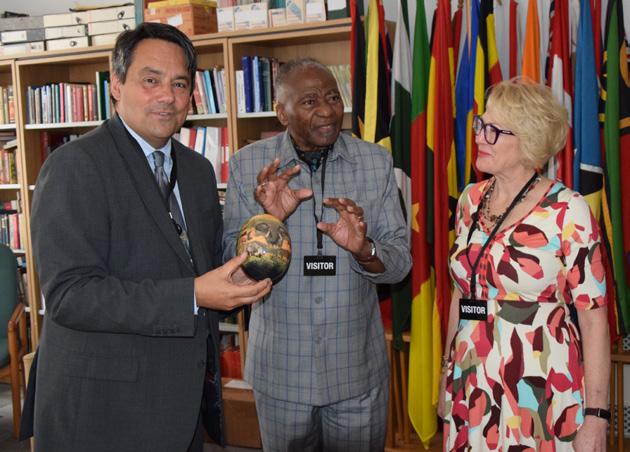
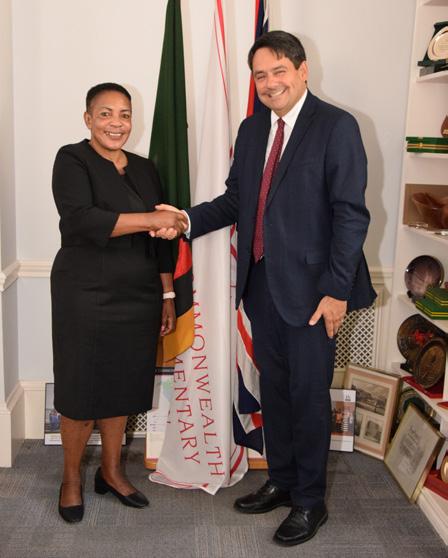
The Speaker also informed the CPA Secretary-General that the Parliament was working on thematic areas including women’s representation, youth and COVID-19 recovery, and had engaged the World Bank on explorations into an e-Parliament system that could improve efficiency within the Legislature, as well as in its interactions with its stakeholders.

Below left: The CPA Secretary-General met with a delegation from the People’s Majlis (Parliament) of The Maldives. The delegation of MPs and parliamentary staff were at the UK Parliament to learn about Parliamentary Committees. The delegation were led by Hon. Mohamed Nashiz MP, Chairperson of the Public Accounts Committee together with Members, Hon. Rozaina Adam, MP; Hon. Ahmed Abdulla MP; Hon. Mohamed Aslam MP; Hon. Mohamed Shifau MP; and parliamentary staff - Ms Shabana Rasheed, Assistant Director-General, Accounts; Ms Aminath Asfa Shafie, Deputy Director. They were accompanied by Ms Aminath Aryj Hussain, Country Representative, Westminster Foundation for Democracy.
Above: The CPA Secretary-General hosted Members and staff from the Parliament of Malaysia’s Special Select Committee on Social, Women and Children Affairs at the CPA Headquarters.
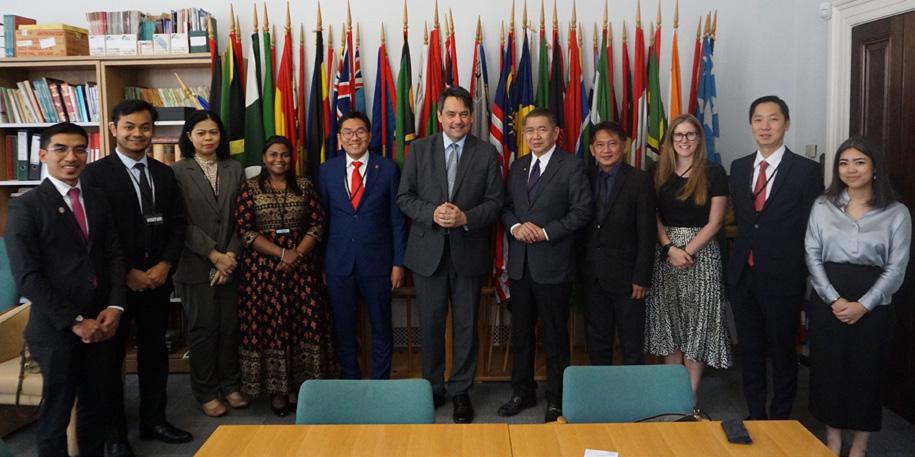

The newly formed Committee was visiting Westminster as part of a programme organised by the CPA UK Branch.
In addition to meeting with the CPA Secretary-General, Committee Members and staff held several meetings with MPs and Clerks from the UK Parliament, exploring how to build Committee resilience and momentum in the context of political uncertainty. Issues covered during the one-day programme included effective scrutiny by Select Committees, women’s representation and executive interference in Committee work.
Right: Hon. Shri Biswajit Daimary, the Speaker of the Assam Legislative Assembly met the CPA Secretary-General at the CPA Headquarters. At the meeting, which took place on 5 September 2022, they discussed opportunities for further collaboration between the Assam Legislative Assembly, the CPA India Region and the CPA Headquarters Secretariat.
The Speaker of Assam is a Member of the CPA International Executive Committee as a representative of the CPA India Region. The Legislative Assembly also hosted the CPA Mid-Year Executive Committee Meeting in April 2022 in Guwahati, Assam.
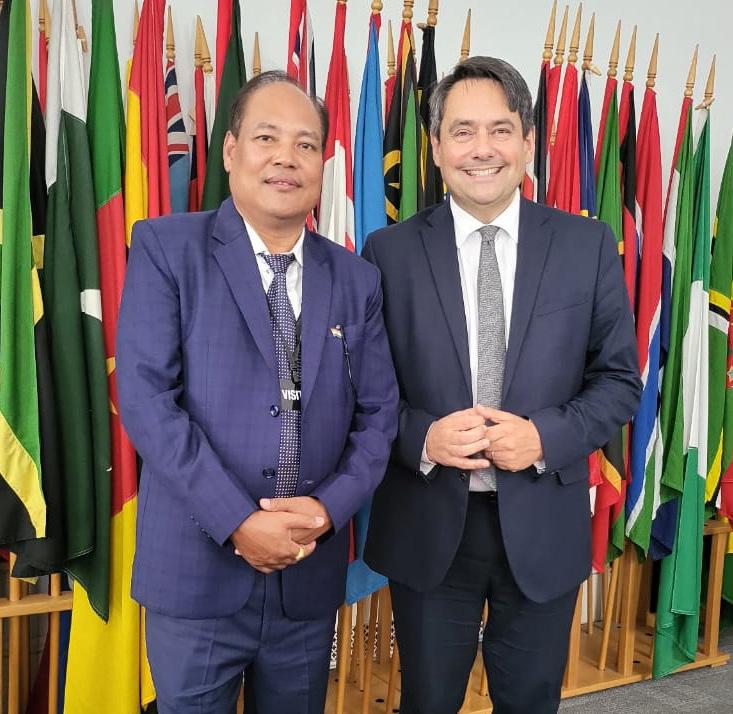
views. Please feel free to contact me if you have any thoughts or suggestions so that we can do our utmost to ensure that the 66th CPC in Ghana is even more successful than the 65th.
At the 65th CPC, elections were held for the various Officer positions and one third of the Regional Representatives on the CPA Executive Committee. I congratulate all the newly-elected Officers and Regional Reps. May I also take this opportunity to thank the outgoing CPA Executive Committee members with a particular mention for our outgoing CWP Chairperson, Shandana Gulzar Khan (Pakistan), outgoing Treasurer, Datuk Shamsul Iskander Md. Akin (Malaysia) and outgoing CPwD Chair, Dennitah Ghati (Kenya).
CPA Patron
It was with immense sadness that we heard the news that Her Majesty Queen Elizabeth II had died on 8 September 2022.
The Queen was both the Head of the Commonwealth and the Patron of the Commonwealth Parliamentary Association. Her lifetime of dedicated and dignified service was an example to us all. The CPA was represented at Her Majesty’s State Funeral in London by our Chairperson, Hon. Ian Liddell-Grainger MP. I sent condolences to His Majesty King Charles III on behalf of the CPA.
A special supplement paying tribute to the CPA Patron and featuring some of the many parliamentary tributes to Her Majesty The Queen can be found with this issue of The Parliamentarian and also on the CPA website.
The Parliamentarian | 2022: Issue Three | 100 years of publishing | 199 VIEW FROM THE CPA SECRETARY-GENERAL
CPA SEMINAR HELPS TO BUILD CAPACITY FOR ZAMBIAN PARLIAMENTARIANS

Members of the National Assembly of Zambia took part in a four-day Post-Election Seminar hosted by the Commonwealth Parliamentary Association (CPA) from 25 to 28 July 2022. The seminar, which was due to be held after the most recent Zambian General Election in August 2021 but was postponed due to COVID-19, featured sessions on women’s representation in Parliament, the budget approval process and the central tenets of parliamentary practice, procedure and ethics.
Zambian Parliamentarians from across the House were joined by parliamentary leaders and experts from Malawi, Namibia and South Africa, including Hon. Nontembeko Nothemba Boyce, MPL, Speaker of the KwaZulu Natal Legislature; Hon. Joyce Chitsulo, MP, Chairperson of the Malawi Public Appointments Committee; Hon. C. T. Frolick, MP, Chairman of Committees, Oversight and ICT, South Africa; Adv. Johannes Namiseb, Secretary of the National Council of Namibia; and Boemo M. Sekgoma, Secretary-General of the Southern African Development Community Parliamentary Forum (SADC PF). The Sustainable Development Goals Centre for Africa also contributed to the CPA seminar.
Opening the seminar, Rt Hon. Nelly B. K. Mutti, Speaker of the National Assembly of Zambia, noted that the 2021 General Election saw a 61% turnover of Members in the National Assembly. With so many new Members, she said, it was: “imperative that the National Assembly of Zambia takes deliberate steps to ensure capacity is built for all Members of Parliament in order for them to take a more active role in enhancing democracy.” In a virtual address, the CPA Secretary-General, Stephen Twigg, added: “These seminars provide a great opportunity for Parliamentarians to come together, to plan ahead, and to learn from each other. I hope that you have a successful series of discussions and conversations over the coming days.”
Reflecting on the seminar, newly elected MP Hon. Joel Chibuye, an Independent Member of the National Assembly for Roan constituency, said that it had been a “very interesting, very refreshing seminar.” He encouraged other Members of Parliament across the Commonwealth to take the opportunity to participate in future seminars, adding that, “they are very educative, very informative, and will help to build on any knowledge gaps that you have.”
The CPA promotes knowledge of the constitutional, legislative, economic, social and cultural aspects of parliamentary democracy. The National Assembly of Zambia has been a Branch of the CPA since 1964 and previously hosted a CPA programme in 2019, when Zambian Parliamentarians studied the role of Parliament in the scrutiny of international treaties and agreements.
CARIBBEAN PARLIAMENTARIANS ADDRESS IMPACT OF COVID-19 AND CLIMATE CHANGE AT CARICOM MEETING IN SURINAME
Parliamentarians from across the CPA Caribbean, Americas and Atlantic Region attended the 43rd Meeting of the Heads of Government of the CARICOM (Caribbean Community) in Paramaribo, Suriname from 3 to 5 July 2022.
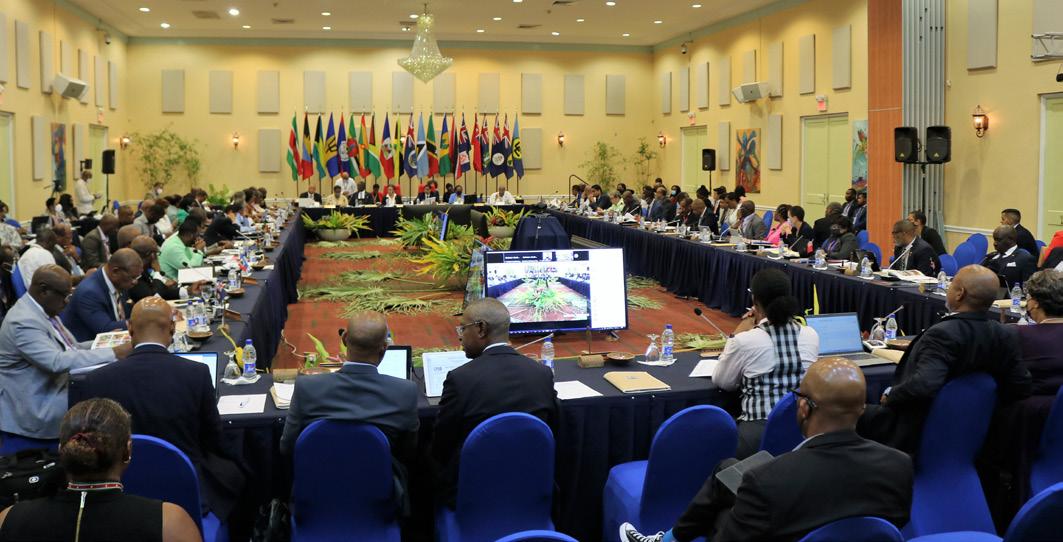
The United Nations Secretary-General, António Guterres spoke at the opening of the meeting to highlight the importance of the Caribbean in the battle against climate change saying ‘The small island low-lying coastal states of the Caribbean are especially vulnerable to what is perhaps the biggest challenge facing our world today — the climate crisis’.
Delegates were welcomed by the Incoming Chairman of CARICOM, H.E. President Chandrikapersad Santokhi of Suriname and the CARICOM Secretary-General, Dr Carla Barnett.
CARICOM members include: Antigua and Barbuda; The Bahamas; Barbados; Belize; Dominica; Grenada; Guyana; Haiti;
Jamaica; Montserrat; Saint Lucia; St Kitts and Nevis; St Vincent and the Grenadines; Suriname; Trinidad and Tobago. Associate Members: Anguilla; Bermuda; British Virgin Islands; Cayman Islands; Turks and Caicos Islands.

200 | The Parliamentarian | 2022: Issue Three | 100 years of publishing CPA NEWS
For the latest CPA and Commonwealth news please visit www.cpahq.org or follow the CPA on social mediaTwitter @CPA_Secretariat | Facebook.com/CPAHQ | LinkedIn | Instagram @cpa_secretariat Image: CARICOM
COMMONWEALTH PARLIAMENTARIANS MEET FOR HYBRID PUBLIC ACCOUNTS COMMITTEE CONFERENCE IN THE MALDIVES
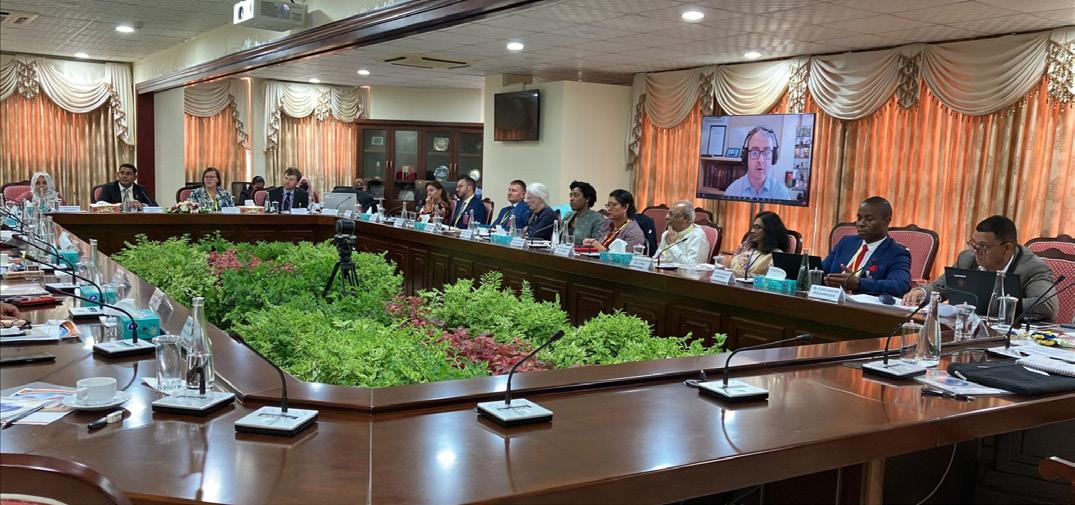
Hon. Dame Meg Hillier, MP (United Kingdom PAC Chair) chaired the conference, which heard from a wide range of delegates including New Zealand PAC Chair, Hon. Barbara Edmonds, MP and Hon. Wajiha Qamar, MNA, a member of the PAC in Pakistan. Other topics included scrutinising government spending in the pandemic and how regional PACs can support one another.
The Commonwealth Association of Public Accounts Committees (CAPAC) held a hybrid conference in partnership with the People’s Majlis (Parliament of The Maldives) from 30 to 31 August 2022 in Malé. Delegates from more than 30 Legislatures joined in person and virtually for the conference, which provided an opportunity for Public Accounts Committee (PAC) Chairs and Clerks from across the Commonwealth to network and share new ideas.
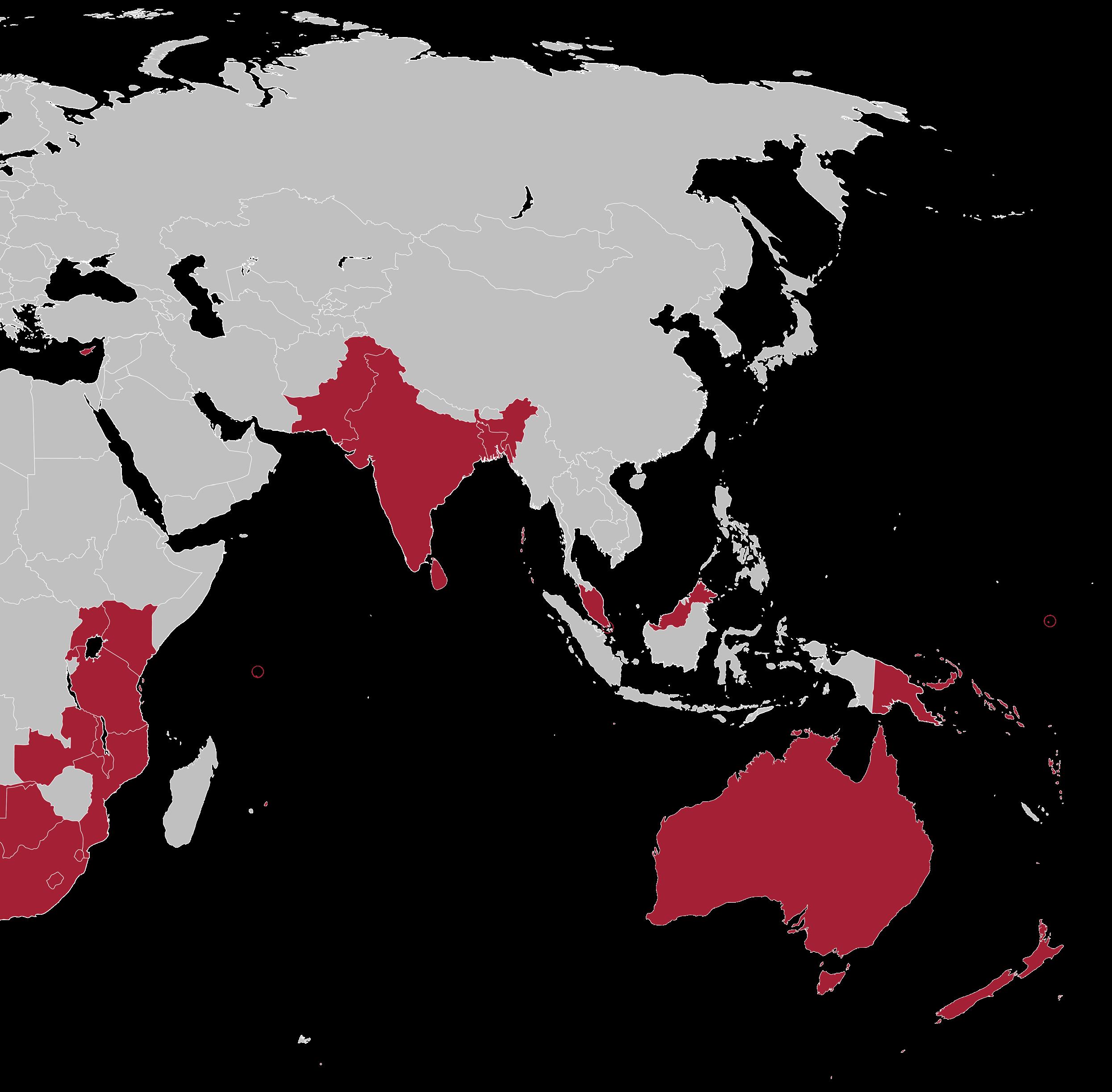
The conference also included a General Meeting where new CAPAC members were ratified, and elections took place for new CAPAC Executive positions. Hon. Mohamed Nashiz, MP, Chair of the PAC in The Maldives was elected as the new CAPAC Chair and Hon. Juan Watterson, Speaker of the House of Keys (Isle of Man) as the CAPAC Vice-Chair. The Speaker of the People’s Majlis (Parliament of The Maldives), Hon. Mohamed Nasheed gave the closing remarks to delegates at the CAPAC Conference. The CAPAC is administered by the CPA UK Branch on behalf of the wider CPA membership and the CPA UK Branch partnered with the People's Majlis to deliver the conference.
15th WORKSHOP OF PARLIAMENTARY SCHOLARS AND PARLIAMENTARIANS HELD AT WROXTON COLLEGE Parliamentary delegates from across the world participated in the Fifteenth Workshop of Parliamentary Scholars and Parliamentarians held on 30 and 31 July 2022 in partnership with the InterParliamentary Union (IPU) and the Centre for Legislative Studies at the University of Hull. Delegates at the event held at Wroxton College, Oxfordshire, UK heard from a wide range of scholars led by Professor Lord Norton of Louth. Former CPA Chairperson and the Speaker of the Bangladesh Parliament, Hon. Dr Shirin Sharmin Chaudhury, MP chaired a session on strengthening legislatures featuring panelists from South Africa, Canada, Malaysia and Pakistan.
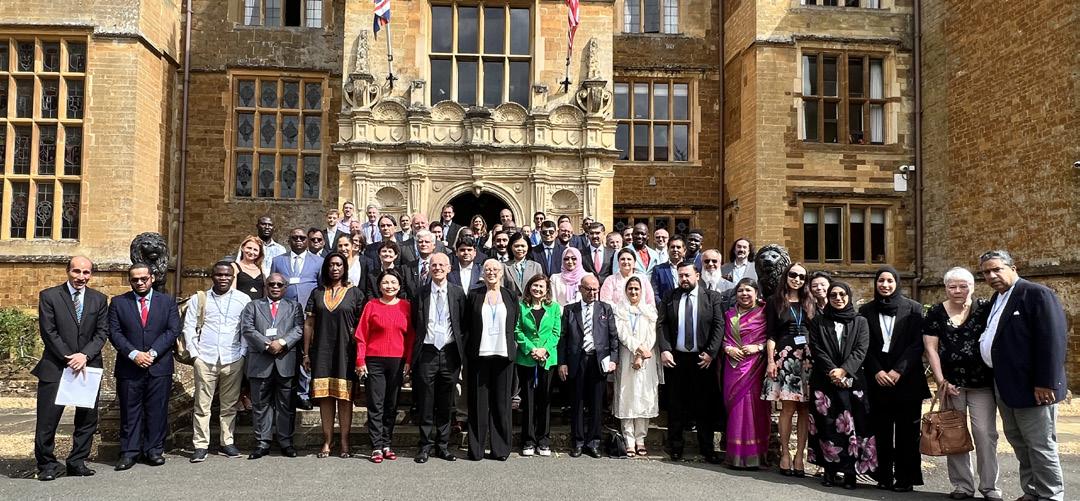
The Secretary-General of the Commonwealth Parliamentary Association (CPA), Stephen Twigg, met with the CPA Scotland Branch President and the Presiding Officer of The Scottish Parliament, Rt Hon. Alison Johnstone, MSP in Edinburgh recently. At the meeting, which took place on 7 September 2022, the CPA Secretary-General updated the Presiding Officer on key governance decisions taken at the recent 65th Commonwealth Parliamentary Conference (CPC) in Halifax, Canada. The Presiding Officer provided an overview of progress on the Gender Audit currently being undertaken at The Scottish Parliament. She highlighted that the audit was examining Gender Sensitivity across all levels of Parliament, with a particular focus on intersectionality within the institution.
During the visit, the CPA Secretary-General also attended a ‘meet and greet’ session with Members of the Scottish Parliament, highlighting the work of the CPA and answering questions from Members. At the session, a panel of Members of the Scottish Parliament - Hon. Jeremy Balfour, MSP, Hon. Sarah Boyack, MSP, Hon. Stuart McMillan, MSP and Hon. Martin Whitfield, MSP - discussed their recent participation in CPA events. These included attending the CPA Executive Committee and CPA General Assembly at the 65th CPC in Canada, thematic discussions at CPC workshops, attending the CPA British Islands and Mediterranean Region conferences and workshops, and participating in CPA Election Observation Missions. Members expressed their positive experiences in their interactions with CPA activities and encouraged new Members to take advantage of the CPA’s resources, particularly the new CPA Parliamentary Academy online courses.

The Parliamentarian | 2022: Issue Three | 100 years of publishing | 201 CPA NEWS
CPA SECRETARY-GENERAL VISITS THE
SCOTTISH PARLIAMENT IN EDINBURGH
Image credit: Wroxton Workshop
STRENGTHENING LEGISLATIVE PRACTICES AND PARLIAMENTARY PROCEDURES AT 58th CPA CANADA REGIONAL CONFERENCE IN PRINCE EDWARD ISLAND
Over 60 Commonwealth Parliamentarians from across Canada recommitted to increasing parliamentary strengthening at the 58th CPA Canada Regional Conference, which took place in Charlottetown, Prince Edward Island from 16 to 22 July 2022. Delegates were welcomed to the CPA Canada Regional Conference by Hon. Colin LaVie, Speaker of the Legislative Assembly and CPA Prince Edward Island Branch President. This was the first time that the Canadian Regional Conference had been held in person since July 2019.
The CPA Canada Regional Conference was attended by Commonwealth Parliamentarians from the federal, provincial and territorial Legislatures of the region as well as Parliamentary Clerks who attended workshop sessions on a wide range of topics including: Climate change: creating resilient infrastructure; consultation with citizens: Québec Citizens' Roundtable; Unparliamentary language and behaviour: managing expectations; Restoration projects at Legislatures.
The CPA Secretary-General, Stephen Twigg sent a video message to the Regional Conference to reiterate the CPA’s commitment to the CPA Canada Region as well as looking forward to the 65th Commonwealth Parliamentary Conference (CPC) which was due to be held in Halifax, Nova Scotia in August 2022. He said: “It has been a very challenging time over the past two years for Parliamentarians and Legislators across the world, including throughout the Commonwealth. In a few weeks time, we will convene in Halifax, Nova Scotia for the Commonwealth Parliamentary Conference, our first CPC since 2019, and a real opportunity to come together and to address some of our shared challenges and learn from each other.”
The Commonwealth Women Parliamentarians (CWP) Canada Regional meetings also took place at the regional conference in Prince Edward Island (turn to page 205 for more info).
The new CPA Vice-President, Hon. Matthew Mason-Cox, MLC, President of the Legislative Council of New South Wales, visited the Headquarters of the Commonwealth Parliamentary Association in London where he met with the CPA Secretary-General, Stephen Twigg to discuss ongoing collaboration with the CPA New South Wales Branch and the wider CPA Australia Region. The meeting was also attended by David Blunt, Clerk of the Parliaments and Clerk of the Legislative Council in the Parliament of New South Wales and Emily Davies, Head of Strategy and Engagement at the CPA Headquarters.
The CPA Vice-President assumed his new role at the 65th Commonwealth Parliamentary Conference (CPC) in Canada last week – where the CPA General Assembly approved the hosting of the 67th CPC by the Parliament of New South Wales in 2024. Traditionally the CPA President and Vice-President are Presiding Officers from the next two CPC hosts.
The Parliament of New South Wales also recently hosted the first CPA Parliamentary Academy residency programme for Commonwealth Parliamentarians from a wide range of Commonwealth jurisdictions including Anguilla; Australian
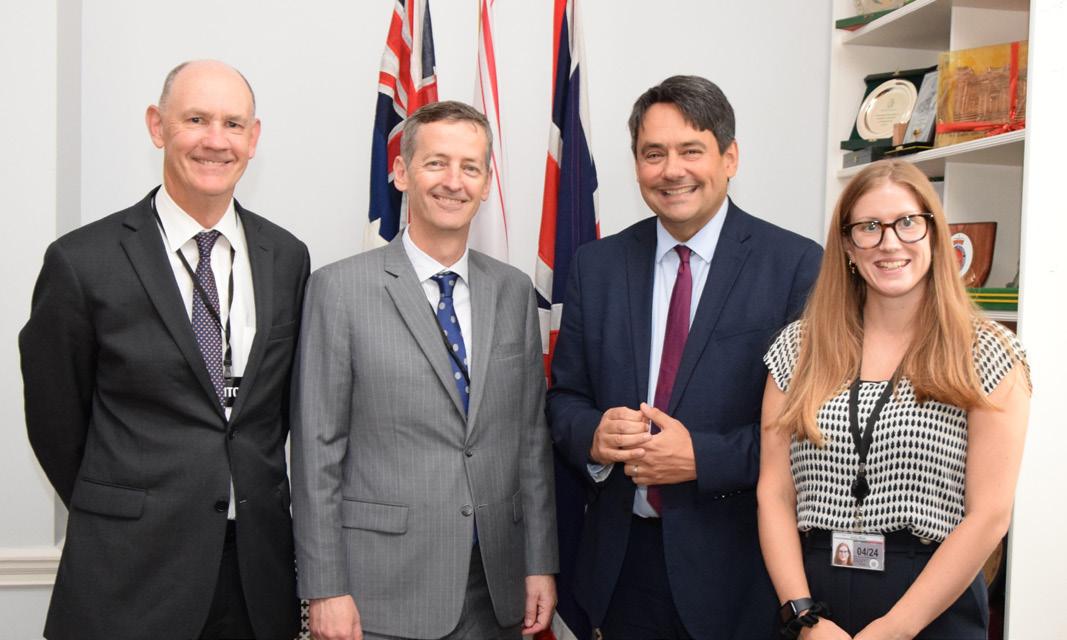
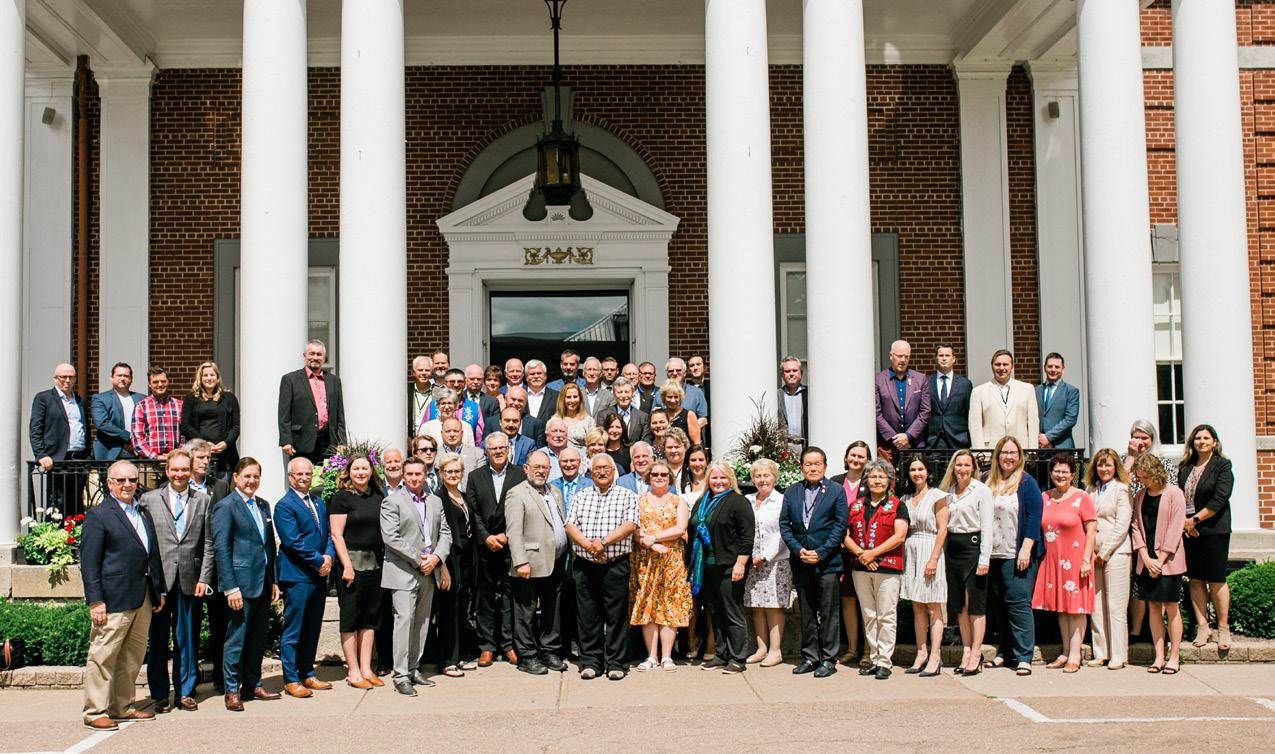
Capital Territory; Bangladesh; Belize; New South Wales; Niue; Pakistan; Saint Lucia; Selangor (Malaysia); Sri Lanka; Tanzania; Queensland; Western Australia; and Western Cape (South Africa). The CPA programme examined how MPs can be better performing legislators and scrutineers and provided an extension of the CPA Parliamentary Academy, the CPA’s portfolio of online courses specifically for Parliamentarians and parliamentary officials.
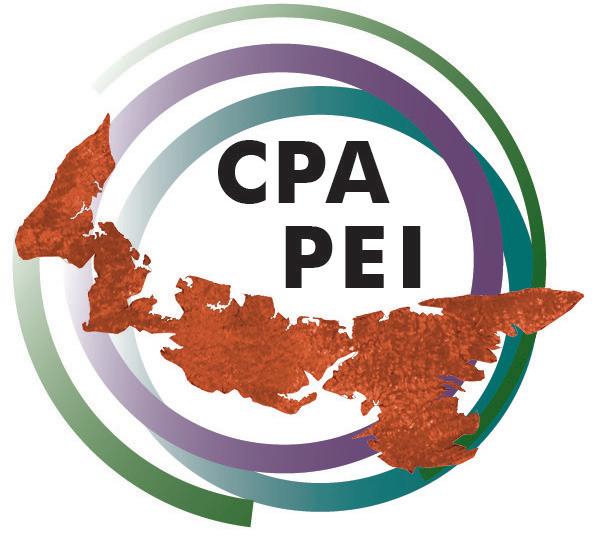
For the latest CPA and Commonwealth news please visit www.cpahq.org or follow the CPA on social mediaTwitter @CPA_Secretariat | Facebook.com/CPAHQ

202 | The Parliamentarian | 2022: Issue Three | 100 years of publishing CPA NEWS
| LinkedIn | Instagram @cpa_secretariat
NEW CPA VICE-PRESIDENT VISITS CPA HEADQUARTERS
FOCUS ON REVITALISING DEMOCRACY AT PRESIDING OFFICERS AND CLERKS CONFERENCE FOR AUSTRALIA AND PACIFIC REGIONS
Parliamentarians from the Australia and Pacific Regions have focused on strengthening democracy to face modern challenges at the 51st Presiding Officers and Clerks Conference (POCC), hosted by the Victoria Parliament in Melbourne, Australia from 4 to 8 July 2022. The theme of this year’s conference was ‘Democracy’s Way Forward’. The regular event is hosted by a different Parliament each year as a conference of the Parliaments of Australia and the Pacific, and it is open to Presiding Officers and Clerks from Parliaments across the two Regions. This was the first time the event was held since 2019 due to COVID-19 and Parliamentarians considered the ways in which Legislatures have had to adapt their processes due to the pandemic and what more can be done to better engage communities in the work of Parliament.
Delegates from 18 Parliaments discussed the revitalisation of democracy, and how Parliaments can best meet the challenges of a rapidly changing world, for the people they represent. They also participated in workshops and present conference papers on a range of topics.
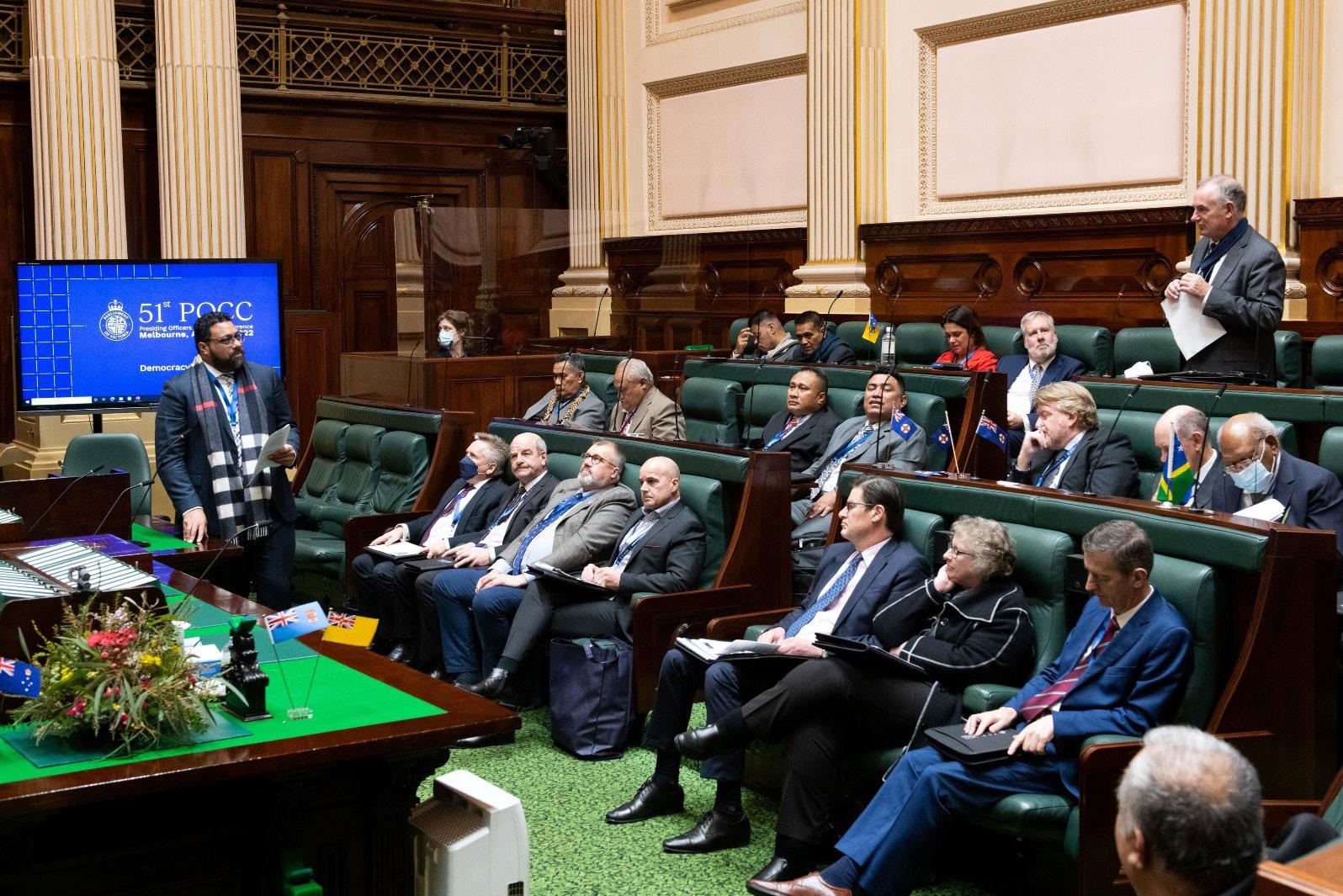
The President of the Victoria Legislative Council, Hon. Nazih Elasmar, MLC said: “Democracy itself is being challenged in various parts of the world but the resilience of our parliamentary institutions is something we can all be proud of - a strong foundation from which to consider the requirements of the times we now face.” He also said that the conference was an important opportunity to show that Parliaments are committed to moving forward through democratic practices and that democracy offers
the best hope for all of us to address the issues we face in a just and inclusive way.
One of the attendees, the Speaker of the Parliament of New Zealand, Rt Hon. Trevor Mallard, MP said this conference offered a valuable opportunity to share ideas, impart knowledge, and grow global connections for stronger Parliaments. “The work of the parliamentary agencies and Presiding Officers is essential for every Parliament, and after the past two years, having the opportunity to share with and learn from our neighbouring parliamentary colleagues has never been more important.”
The next POCC will be hosted by the Solomon Islands in 2023.

PARLIAMENTARY TWINNING PROGRAMMES BETWEEN CPA AUSTRALIA AND CPA PACIFIC REGIONS
As part of the POCC conference in Melbourne, Victoria, meetings were also held to discuss the twinning programs between Parliaments in the CPA Australia and CPA Pacific Regions. Under the twinning arrangements, joint capacity building and professional development initiatives are conducted for Parliamentarians and parliamentary staff.
In recognition of the twinning between the Victoria Parliament and the Parliaments of Fiji, Nauru and Tuvalu, a meeting room at the Parliament building in Melbourne was named the Davui Room. A naming ceremony was conducted by the President of the Victoria Legislative Council, Hon. Nazih Elsamar, MLC; the Deputy Speaker of the Victoria Legislative Assembly, Hon. Maree Edwards, MLA; and the Speaker of the Fiji Parliament, H.E. Hon. Ratu Epeli Nailatikau.

The Deputy Speaker explained that “Davui in the Fijian language stands for the conch shell that is used widely in the Pacific to call people together. And so it will be that in the Davui Room people will be called together to discuss significant issues being considered by our Parliament and its Committees.” The ceremony included a cultural performance by local Fijian group Bula Meke and the Davui Room features an artwork by Fijian artist Rusiate Lali.

The Parliamentarian | 2022: Issue Three | 100 years of publishing | 203 CPA NEWS
Image: Parliament of Victoria.
READY FOR COP27: MPs FROM SMALL PARLIAMENTS LEARN CLIMATE NEGOTIATING SKILLS AT CPA AND UNDP WORKSHOP
At a three-day workshop hosted by the Commonwealth Parliamentary Association (CPA) Small Branches network and the United Nations Development Programme (UNDP), twenty-one Members of Parliament from sixteen small states and jurisdictions learned how to navigate the multilateral climate landscape and implement effective climate action.
The workshop, hosted at the United Nations complex in New York, was designed to equip participants from both national and sub-national Legislatures with the knowledge and skills to represent their jurisdictions in international climate negotiations.
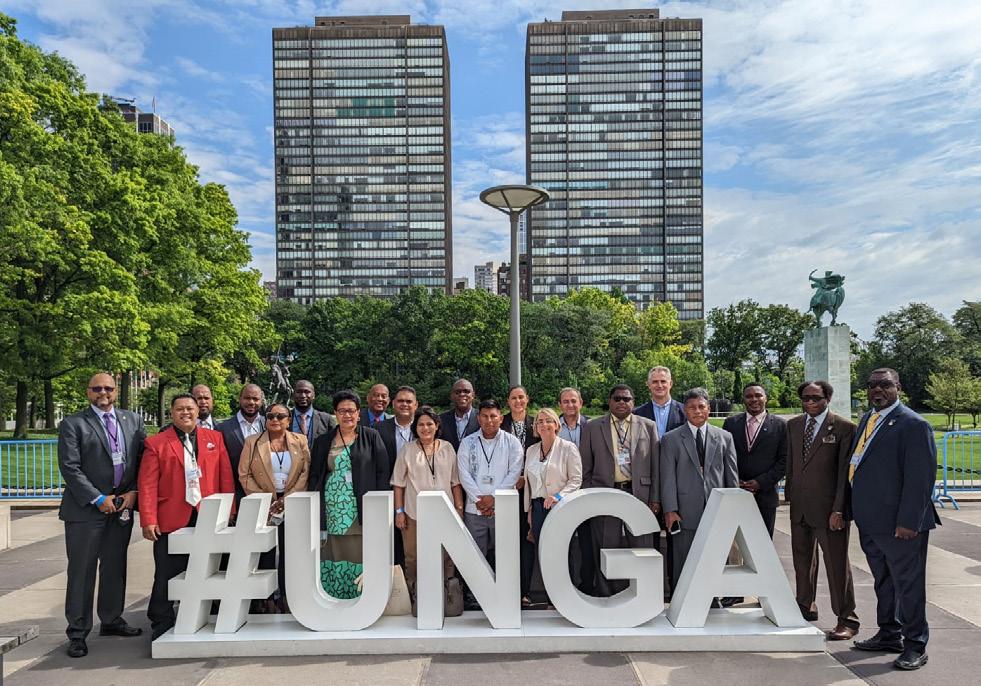
Despite their relatively limited contributions to global greenhouse gas emissions, people living in the smallest jurisdictions, particularly Small Island Developing States (SIDS), often suffer the most severe impacts of global warming, including rising sea levels, extreme weather events and internal displacement. Improved access to climate finance, technology and renewable energy sources are essential for small states and jurisdictions to adapt to the global climate risk. International climate negotiations represent an opportunity for small jurisdictions to leverage their concerns and secure these resources, alongside wider commitments to protect their economies and environments from the damage caused by climate change.
At the CPA-UNDP workshop, participants had the opportunity to gain insights into the internal workings of international climate negotiations through practice negotiation sessions, mock public hearings and group workshops, led by experts from international organisations including the Alliance of Small Island States (AOSIS) and UNDP. Hon. Churchill Gill, Member of the National Assembly of the Seychelles, said that the negotiation session was ‘very informative’, adding that he would ‘surely use the knowledge in my country.’ This was echoed by Senator Janelle Chanona from the National Assembly of Belize who said that the mock negotiation was an ‘insightful exercise across the board.’
Commenting on the format of the workshop, the CPA Secretary-General Stephen Twigg said: “This programme offered participants opportunities to engage with expert speakers, complete practice negotiations and to network with a number of multilateral actors. At the CPA, we believe that the best learning environments prioritise dynamic engagement and focus on participation across all attendees.”
The CPA Small Branches network empowers small Parliaments in the Commonwealth to overcome national and global challenges through cooperation, advocacy and the strengthening of parliamentary democracy and good governance. Climate change and environmental governance are a thematic priority under the network’s 2021-2023 Strategic Plan. UNDP works to help Parliaments to better ensure gender equality; nature-sensitive development; equitable energy access and transition; risk management for resilience; and reduced poverty and inequality.
CPA BENCHMARK REPORT RECOMMENDS REFORMS FOR MONTSERRAT'S LEGISLATIVE ASSEMBLY
In early 2022, to coincide with its 70th Anniversary, the Speaker of the Legislative Assembly of Montserrat, Hon. Charliena White, commissioned the Commonwealth Parliamentary Association (CPA) to support a self-assessment of the Assembly against the CPA's Recommended Benchmarks for Democratic Legislatures. In total, 24 recommendations have been proposed to strengthen the governance, independence and administration of the Legislative Assembly, one of the smallest Legislatures in the Commonwealth. Consultations were undertaken with a large cross-section of stakeholders including current and former Members, members of civil society, government and parliamentary officials and the media.
The concluding report proposes greater financial independence and transparency, updating of legal and procedural matters, strong leadership on the governance of the House and increased staffing support. The report also has broader constitutional considerations as part of an ongoing constitutional review process.
The report forms part of the CPA's ongoing Benchmarking programme with Montserrat as the 20th Legislature to conduct a recent assessment. In 2018, the CPA completed a consultation and review process that resulted in the adoption of updated Recommended Benchmarks for Democratic Legislatures. The benchmarks, which were adopted by all Commonwealth Legislatures, provide a minimum standard and a guide on how a Parliament should be constituted and how it should function. They play an important role in developing the effectiveness of parliamentary institutions across the 180 Parliaments and Legislatures of the CPA and contribute to the implementation of the Sustainable Development Goals (SDGs7).
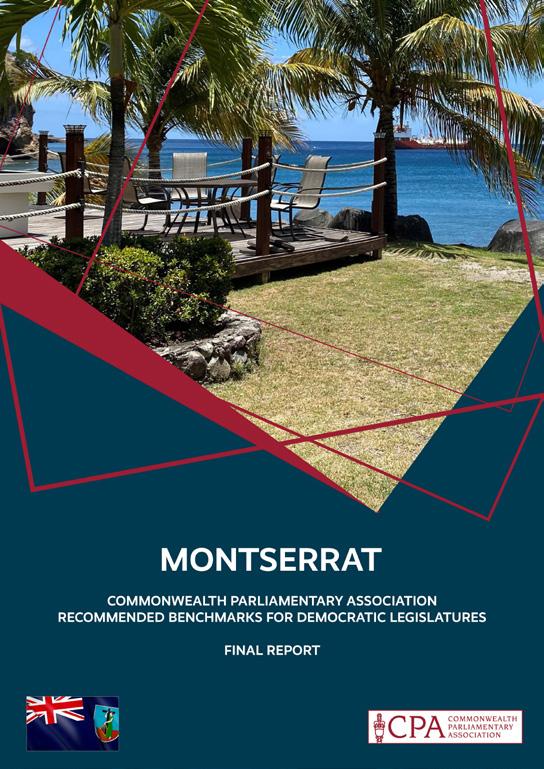
To read the full report please visit the CPA website or email hq.sec@cpahq.org for a copy.
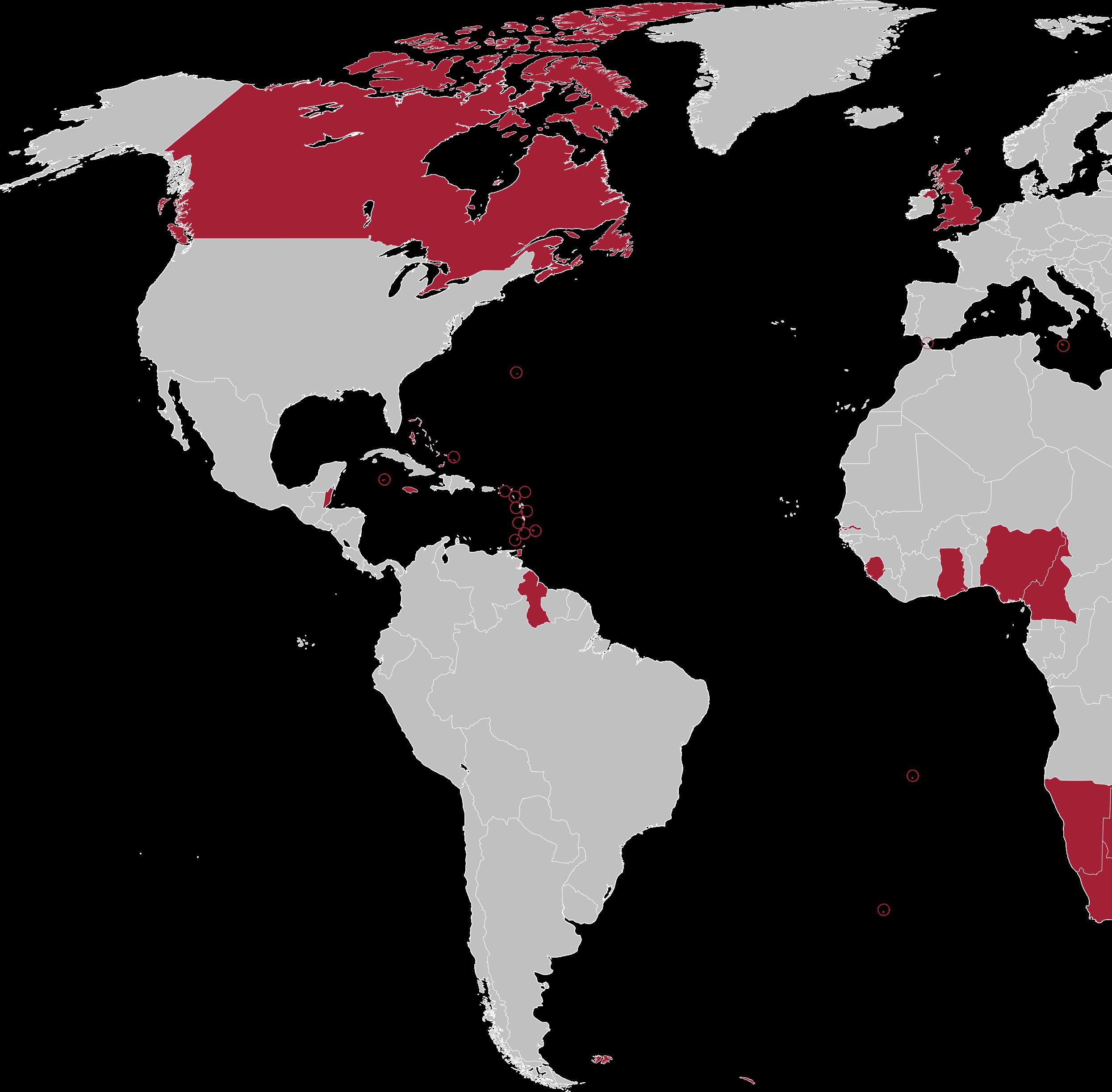
204 | The Parliamentarian | 2022: Issue Three | 100 years of publishing CPA NEWS
COMMONWEALTH WOMEN PARLIAMENTARIANS ATTEND 14th SUMMIT OF WOMEN SPEAKERS OF PARLIAMENT IN UZBEKISTAN
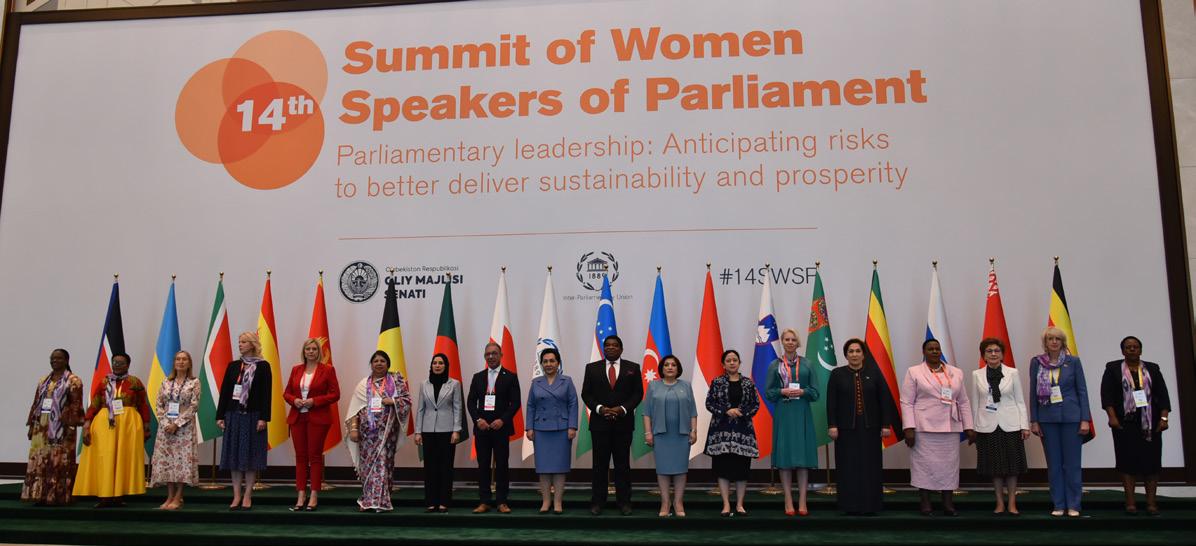
The former CPA Chairperson and the Speaker of the Bangladesh Parliament, Shirin Sharmin Chaudhury, MP and the Deputy Speaker of the Rwanda Chamber of Deputies, Hon. Edda Mukabagwiza, MP were amongst 20 Women Speakers and Presiding Officers from across the world attending the 14th Summit of Women Speakers of Parliament (14SWSP) in Tashkent, Uzbekistan from 8 to 9 September 2022.
The Summit theme was ‘ Parliamentary leadership: Anticipating risks to better deliver sustainability and prosperity’ and discussion topics included the post-COVID-19 recovery, technology’s role in politics and increasing levels of violence against women globally. Delegates adopted the 2022 Tashkent Declaration which recognised their vital leadership role in building resilient societies and delivering sustainability. The keynote address was given virtually by H.E. Amina J. Mohammed, Deputy Secretary-General of the United Nations. The Inter-Parliamentary Union organised summit is designed to inspire future generations of female leaders and was hosted by Hon. Tanzila Narbaeva, Chairwoman of the Senate of the Oliy Majlis of the Republic of Uzbekistan and Mr Martin Chungong, IPU Secretary-General and Chair of the Board of International Gender Champions.
CWP REGIONAL CONFERENCE FOR AUSTRALIAN MPs
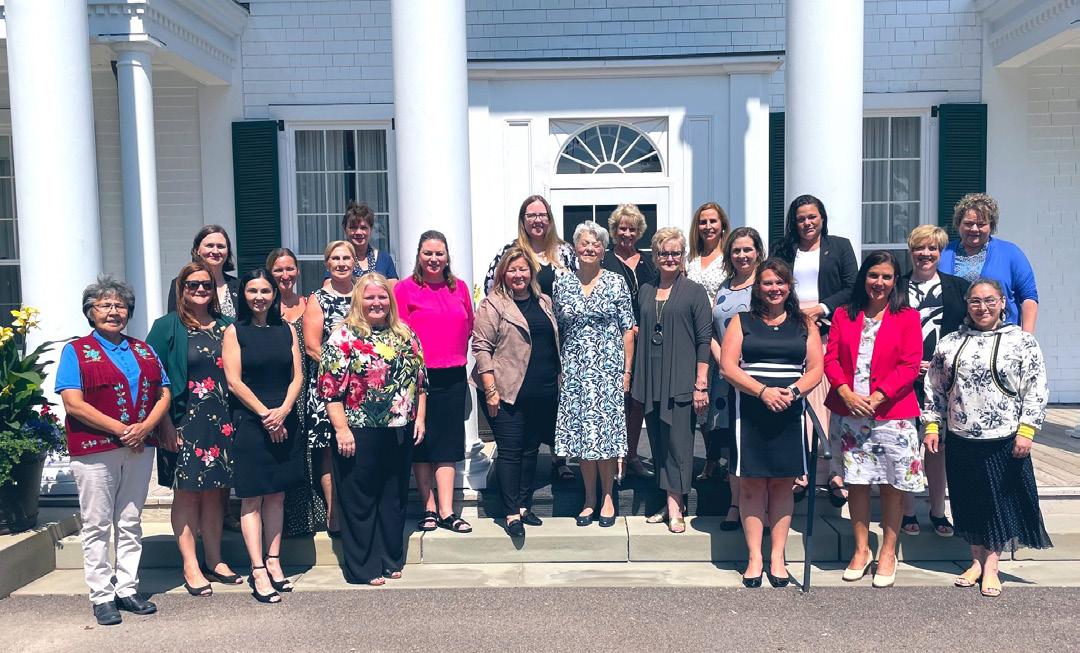

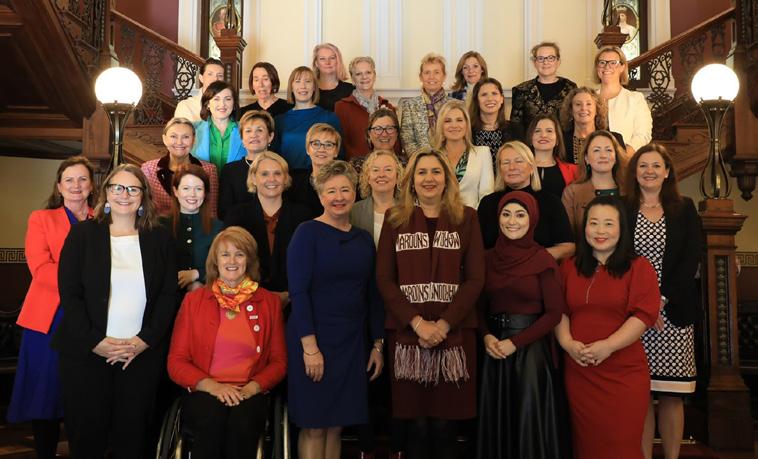

Women MPs from the Federal and State Parliaments of the CPA Australia Region met for the Commonwealth Women Parliamentarians (CWP) Regional Conference, hosted by the Queensland Parliament in Brisbane from 14 to 15 July 2022. Thirty-six women Parliamentarians heard from the Premier of Queensland and Minister for the Olympics, Hon. Annastacia Palaszczuk, MP and the Speaker of the Queensland Legislative Assembly, Hon. Curtis Pitt, MP. The Regional Conference focused on gender equality in Parliaments and women’s leadership. Workshop sessions also heard about the work of Queensland’s Women’s Safety and Justice Taskforce – ‘Hear Her Voice’; as well as highlighting gender, human rights and sex discrimination. The CWP Australia Regional Chairperson, Senator Nita Green said that ‘in 2022, there are more women in public office than ever before – but there is still so much more work to do’.
CANADIAN MPs AT CWP CANADA REGIONAL CONFERENCE IN PRINCE EDWARD ISLAND
Ahead of the 58th CPA Canada Regional Conference held in Charlottetown, Prince Edward Island from 16 to 22 July 2022, the Commonwealth Women Parliamentarians (CWP) Canada Regional meetings also took place. The CWP Canada Regional Chair, Hon. Lisa Thompson, MPP (Ontario) chaired the meetings which focused on actions to attract, prepare and support women into public office. The meetings provided Members with the opportunity to hear about activities and to emphasise the importance of promoting the CWP in Canada on a variety of platforms, including social media.
WOMEN PARLIAMENTARIANS IN RWANDA LOOK AHEAD TO FUTURE CWP ACTIVITIES
Commonwealth Women Parliamentarians from the Parliament of Rwanda met recently to elect their CWP Branch Steering Committee and to look at activities for the year ahead. Members elected Hon. Ndangiza Madina, MP as CWP Branch Chairperson and Hon. Nyinawamwiza Laetitia, MP as CWP Branch Deputy Chairperson. The Speaker of the Chamber of Deputies and CPA Rwanda Branch President, Hon. Donatille Mukabalisa said: “I have no doubt that building from your predecessor’s foundation, you will keep moving forward for the best interest of the CWP.”
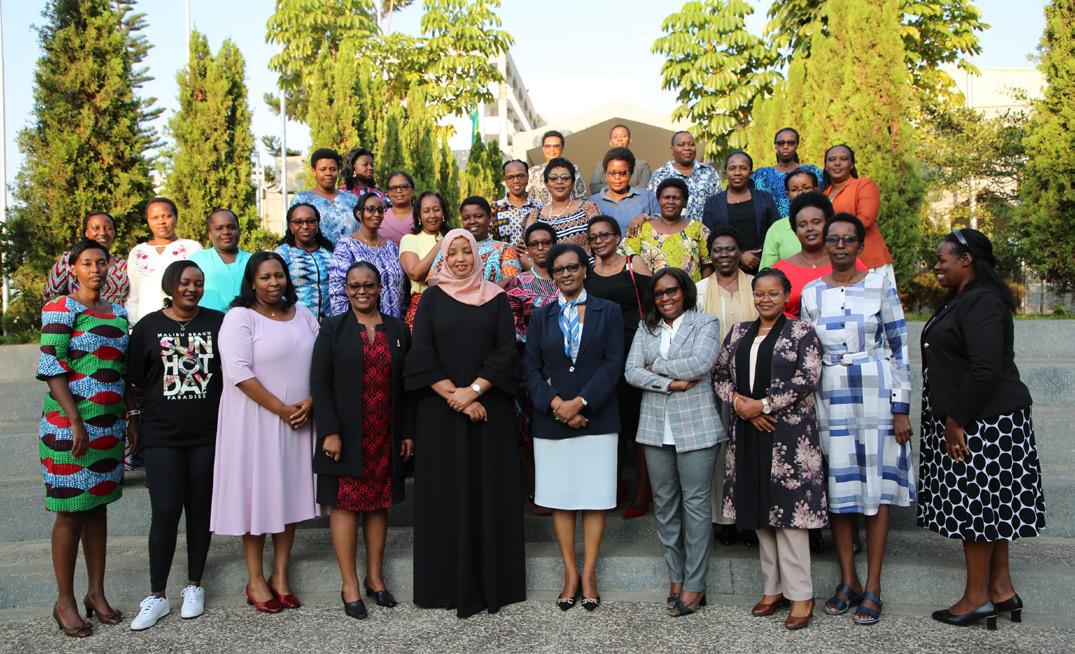
The Parliamentarian | 2022: Issue Three | 100 years of publishing | 205
COMMONWEALTH WOMEN PARLIAMENTARIANS NEWS
Commonwealth Parliamentarians attending the 65 th Commonwealth Parliamentary Conference and associated meetings recognised the Commonwealth’s commitment to democracy and met under the conference theme of ‘Inclusive, Accessible, Accountable and Strong Parliaments: the Cornerstone of Democracy and Essential for Development’.
The conference, hosted by the CPA Canada Region from 20 to 26 August 2022 in Halifax, Nova Scotia, Canada, was attended by over 600 Parliamentarians and Parliamentary Clerks representing Parliaments and Legislatures from across the Commonwealth.
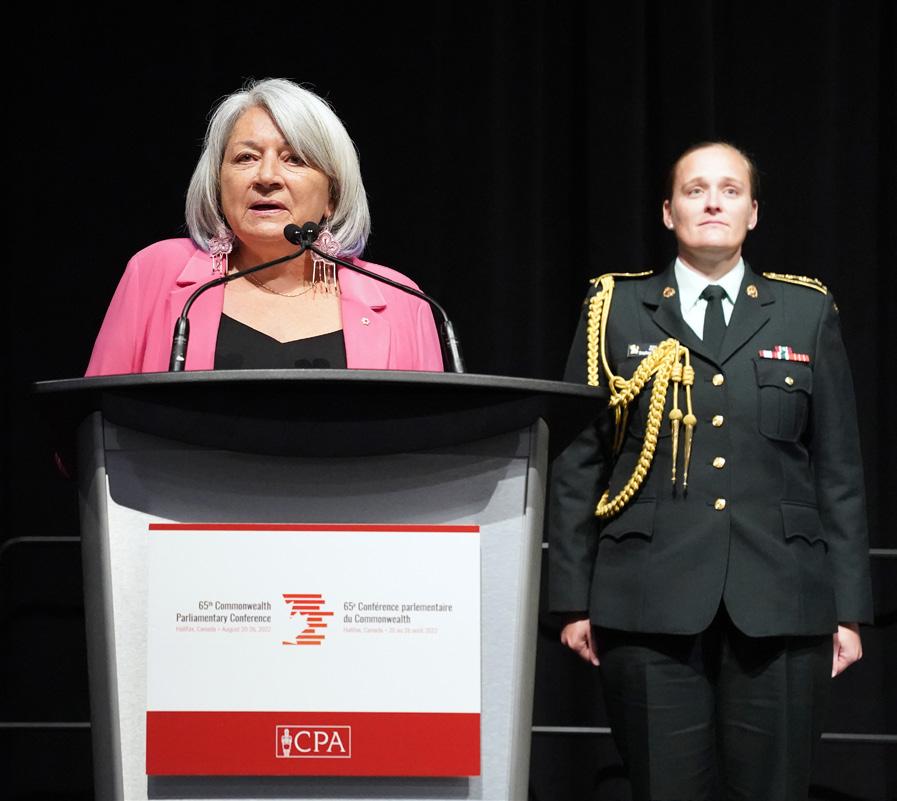
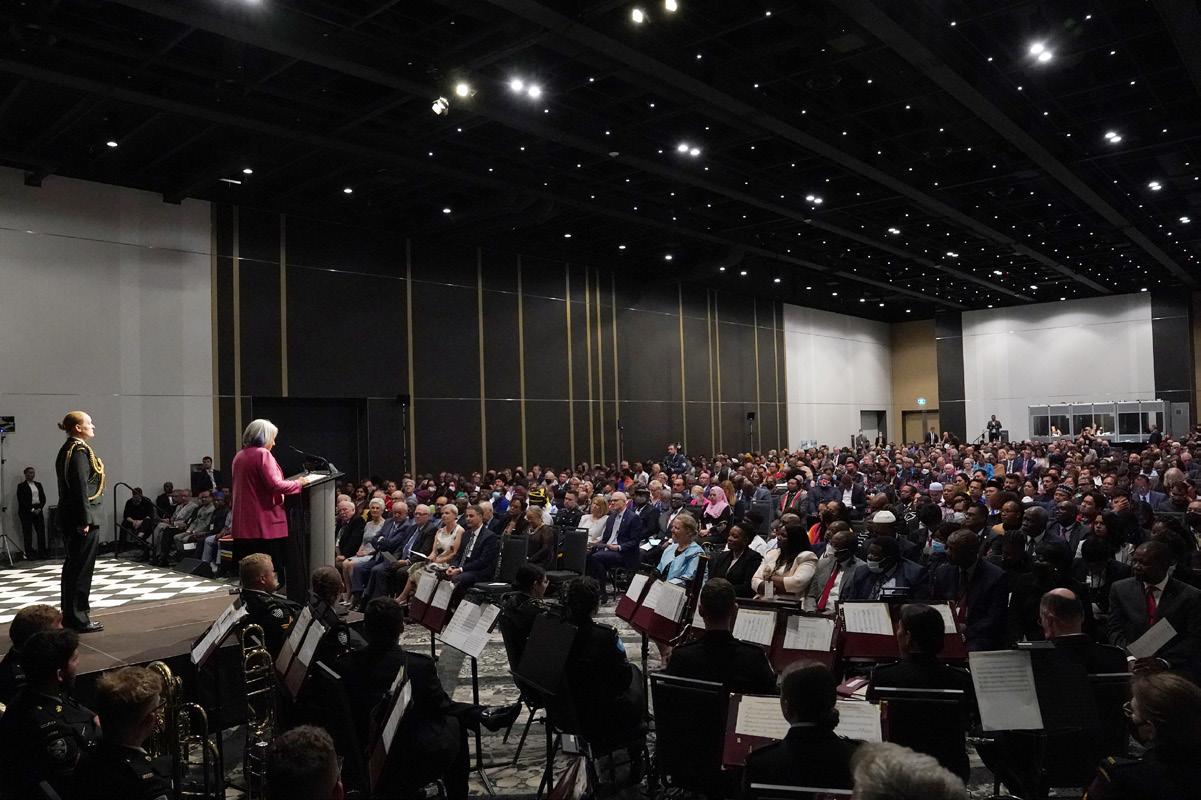
The conference was hosted by the CPA President (20192022), Hon. Anthony Rota, MP, Speaker of the House of Commons of Canada and also included the 38th CPA Small Branches Conference and the seventh triennial Commonwealth Women Parliamentarians (CWP) Conference as well as a meeting of the Commonwealth Parliamentarians with Disabilities (CPwD) Regional Champions.
Alongside the substantive conference workshops and the CPA governance meetings (65th General Assembly and CPA Executive Committee meetings), the 65th Commonwealth

Parliamentary Conference also included a number of additional events.
The CPA Vice-Patron, Her Excellency Rt Hon. Mary Simon, Governor-General of Canada, urged Commonwealth Parliamentarians to work together to uphold democratic principles and the values of the Commonwealth as she opened the conference by saying: “The Commonwealth is not merely a name, but a goal. A society of nations that work together with common objectives.” She also spoke to delegates about the opportunities to offer increased humanitarian support to those fleeing conflicts, encouraged Parliamentarians to do more to promote dialogue and peace, and highlighted the threat of food insecurity facing citizens across the world.
Senator Hon. George Furey, Speaker of the Senate of Canada read the goodwill message to the conference from Her Majesty Queen Elizabeth II, Patron of the Commonwealth Parliamentary Association and Head of the Commonwealth. Since 1989, the Vice-Patron of the Commonwealth Parliamentary Association has traditionally been the Head of State or Government of the CPA Branch hosting the annual Commonwealth Parliamentary Conference.
Delegates to the 65th CPC were welcomed by the CPA President (2019-2022), Hon. Anthony Rota, MP, Speaker of the House of Commons of Canada who said at the opening ceremony: “As the pandemic forced us more than once to postpone this event, we have been looking forward for some time to hosting the 65th CPC. Three years have passed since Uganda played host to our last in-person conference in 2019. As such, this year’s meeting takes on added significance.
206 | The Parliamentarian | 2022: Issue Three | 100 years of publishing INCLUSIVE, ACCESSIBLE, ACCOUNTABLE AND STRONG PARLIAMENTS
CALL FOR COMMONWEALTH PARLIAMENTARIANS TO UPHOLD INCLUSIVE PARLIAMENTARY DEMOCRACY AT 65 th COMMONWEALTH PARLIAMENTARY CONFERENCE IN CANADA “ The Commonwealth is not merely a name, but a goal. A society of nations that work together with common objectives. ”
Images credit: Christian Diotte/Parliament of Canada and Jeffrey Hyland/CPA Headquarters
After having been apart for so long, many of us in the CPA family are eager not only to tackle our busy agenda, but also to rekindle old friendships and forge new ones.
While we all recognise the remarkable work of CPA Headquarters in keeping us connected over the course of the pandemic, despite the time differences and technological challenges, there is no substitute for in-person exchanges. Our conversations at the dinner table, during receptions and at the sidelines of panel discussions simply cannot be replicated in the virtual world.
During this conference, we will continue to learn from each other about how we can make our respective Parliaments more inclusive, accessible, accountable and stronger. The conference program is full of opportunities to network and expand our understanding about how to promote the values of the Commonwealth Parliamentary Association, which is to say our values.”
The CPA Secretary-General, Stephen Twigg paid tribute to the late CPA Chairperson, Hon. Emilia Monjowa Lifaka from Cameroon and highlighted the key agenda items and proposed constitutional amendments for the conference. He also thanked the CPA Canada Region for their hosting of the conference and the outgoing Officers and Members of the CPA Executive Committee for their dedication to the Association. He concluded by saying “Our CPC theme this year is ‘Inclusive, Accessible, Accountable and Strong Parliaments’ which provides a timely opportunity to face the shared challenges arising from the current economic situation, the COVID-19 pandemic, climate change and Agenda 2030. I wish everyone here a successful, constructive and enjoyable 65th CPC.”
The Speaker of the Nova Scotia Legislature, Hon. Keith Bain, MLA said: “On behalf of the Canadian Region of CPA, we are proud to welcome you to Halifax for this gathering of Parliamentarians. We hope that throughout the conference, the exchanges and workshops will be fruitful and that relationships will be forged and hopefully continue to flourish when you return home.”
Delegates heard from a number of musical and dance performances during the opening ceremony including an indigenous blessing and drummers, THR!VE choir for girls, Legacy Circus, BreakSpace breakdancing group and members of the Canadian Armed Forces.

One of the largest annual gatherings of Commonwealth Parliamentarians, MPs and parliamentary staff attending the conference benefitted from professional development, supportive learning and the sharing of best practice with colleagues from across the Commonwealth together with the participation of leading international organisations. The conference also explored a wide range of workshop topics from responses to the COVID-19 pandemic, tackling climate change and achieving the sustainable development goals to accessibility and technology for Parliaments and building gender sensitive Legislatures.
The unique conference brought together Speakers, Members of Parliament and Parliamentary staff representing the nine regions of the CPA – Africa; Asia; Australia; British Islands and Mediterranean; Canada; Caribbean, Americas and Atlantic; India; Pacific; and South East Asia. The CPA reaches the countries of the Commonwealth as well as national, state, provincial and territorial Parliaments and Legislatures bringing together over 180 CPA Branches of the Association.


The Parliamentarian | 2022: Issue Three | 100 years of publishing | 207 INCLUSIVE, ACCESSIBLE, ACCOUNTABLE AND STRONG PARLIAMENTS
Images credit: Christian Diotte/Parliament of Canada and Jeffrey Hyland/CPA Headquarters
DELEGATES TO 65 th CPA GENERAL ASSEMBLY MAKE KEY CONSTITUTIONAL DECISIONS IN RELATION TO REPRESENTATION, MEMBERSHIP AND GOVERNANCE
for the CPA including on governance and membership, Officer roles and appointments, women’s representation as full delegates to CPC and on the CPA Executive Committee, representation of the Commonwealth Parliamentarians with Disabilities (CPwD) network with a new Officer role for the CPwD Chairperson, provision for virtual/hybrid meetings, rules for elections, increasing the population threshold for CPA Small Branches and the regional rotation for future appointments to the role of CPA Secretary-General.
The 65th CPA General Assembly also approved the application submitted by the Parliament of Maldives (The People's Majlis) to form the CPA Maldives Branch and re-join the CPA’s membership.
Delegates from 128 CPA Branches attended the 65th CPA General Assembly held at the 65th Commonwealth Parliamentary Conference (CPC) in Canada. The CPA General Assembly, the Association’s supreme authority, is constituted by delegates to the annual CPC and the body has the ultimate authority to determine the policy and management of the Association.
The CPA General Assembly was chaired by the CPA President (2019-2022), Hon. Anthony Rota, MP, Speaker of the House of Commons of Canada. Important discussions took place which agreed a new road map to CPA’s goal of recognition as an international, interparliamentary organisation. Members also approved a number of important constitutional amendments
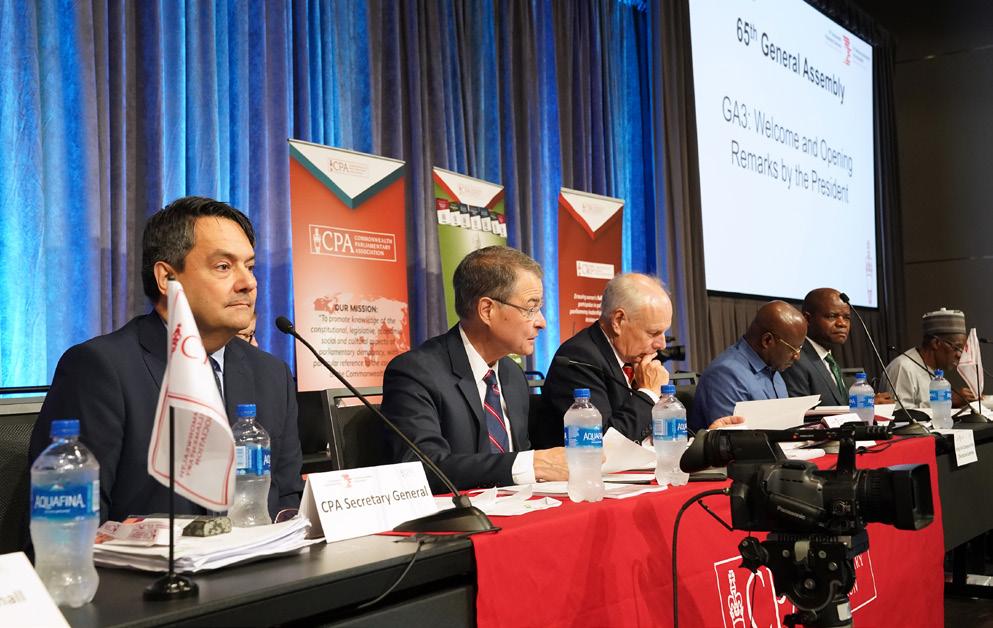
Full details of all the CPA Constitutional amendments that were approved at the 65th CPA General Assembly have been sent to all CPA Branches and published on the CPA website.
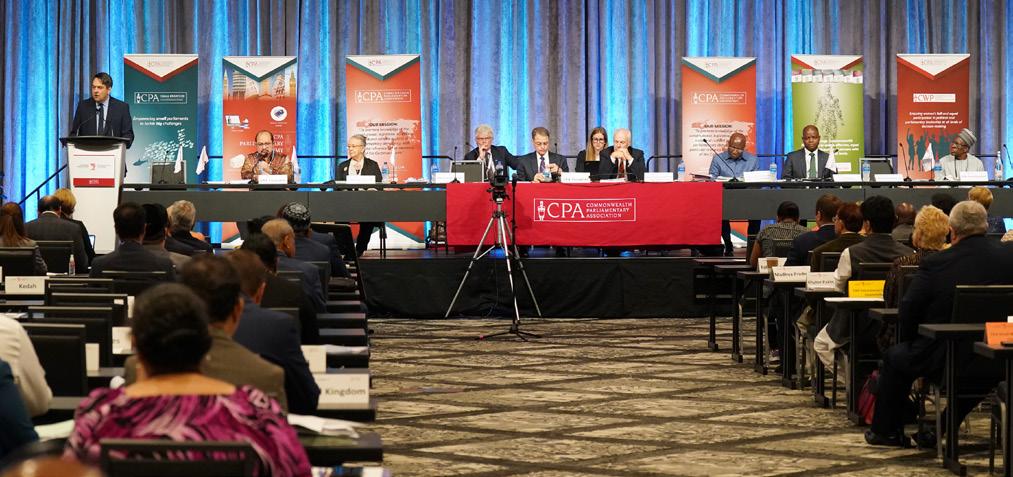

At the conclusion of the 65th Commonwealth Parliamentary Conference (CPC), the CPA President (2019-2022), Hon. Anthony Rota, MP, Speaker of the House of Commons of Canada was presented with a commemorative silver salver to thank the CPA Canada Region for their hosting of the conference. The presentation has become a regular tradition of the CPC.
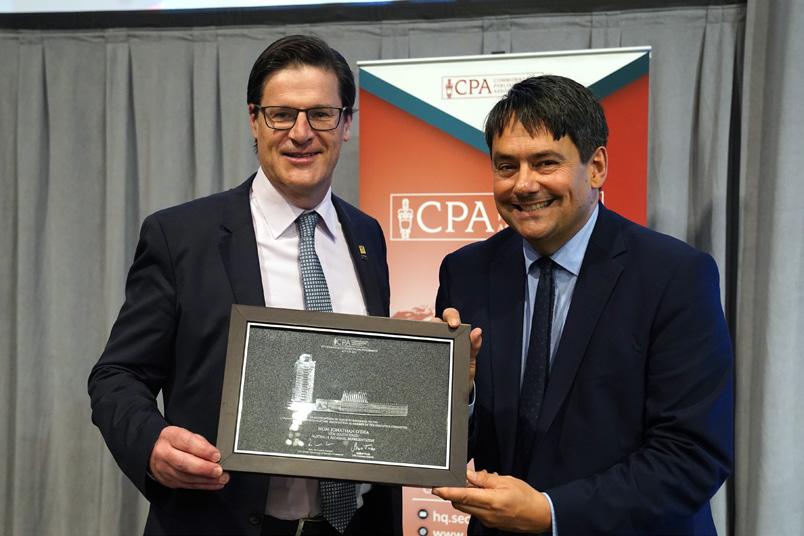
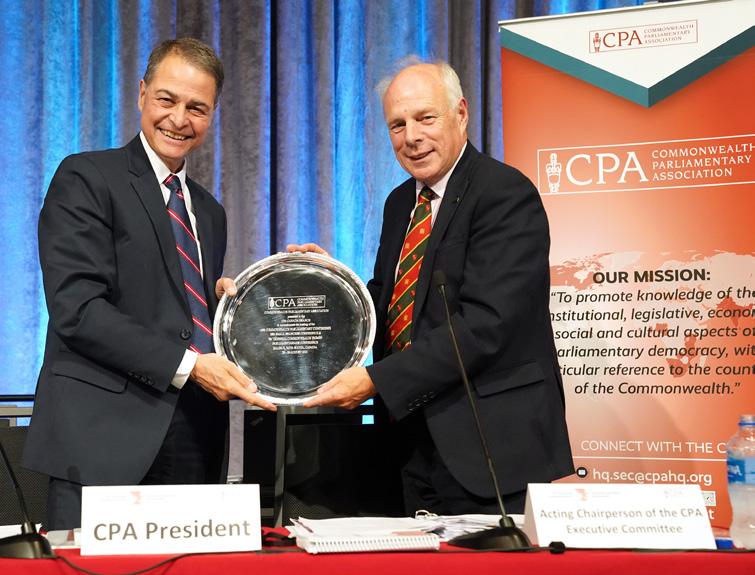
In addition, outgoing CPA Executive Committee Members who have served on the governance body over recent years were presented with commemorative plaques, traditionally donated by the CPA Malaysia Branch, to thank them for their service to the CPA.
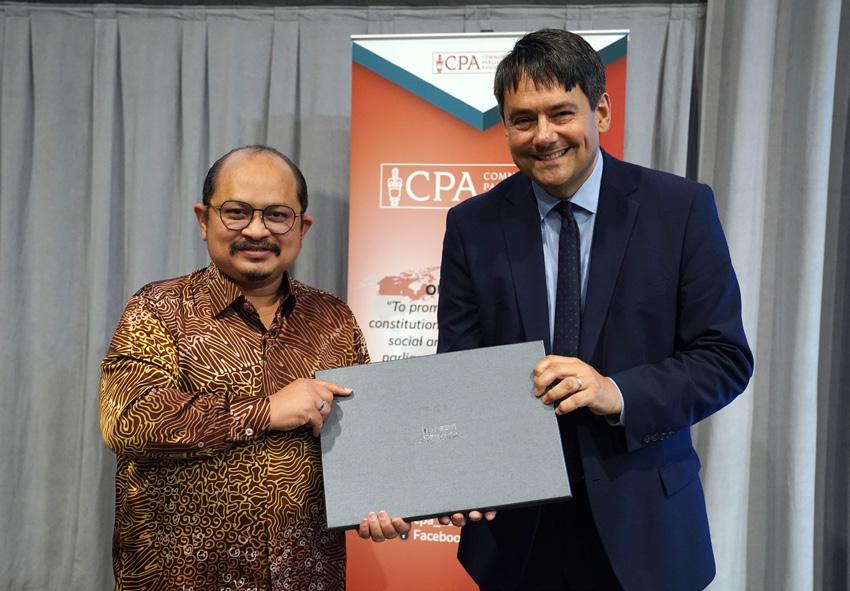
208 | The Parliamentarian | 2022: Issue Three | 100 years of publishing INCLUSIVE, ACCESSIBLE, ACCOUNTABLE AND STRONG PARLIAMENTS
RECOGNITION FOR 65 th CPC HOST BRANCH AND OUTGOING CPA EXECUTIVE COMMITTEE MEMBERS
Images
credit:
Christian Diotte/Parliament of Canada and Jeffrey Hyland/CPA Headquarters
CPA EXECUTIVE COMMITTEE ADDRESS KEY GOVERNANCE ISSUES FOR THE COMMONWEALTH PARLIAMENTARY ASSOCIATION AT 65 th CPC IN CANADA
The Executive Committee of the Commonwealth Parliamentary Association (CPA) met both ahead of and following the 65th Commonwealth Parliamentary Conference in Halifax, Nova Scotia, Canada. The CPA Executive Committee represents the nine regions of the CPA - Africa; Asia; Australia; British Islands and Mediterranean; Canada; Caribbean, Americas and Atlantic; India; Pacific; South East Asia.

The CPA Executive Committee is chaired by CPA Chairperson, Hon. Ian Liddell-Grainger, MP (United Kingdom) who said: “The Commonwealth Parliamentary Association (CPA) provides a unique platform for inter-parliamentary dialogue to take place. The CPA’s membership comprises the national, state, provincial and territorial Parliaments of
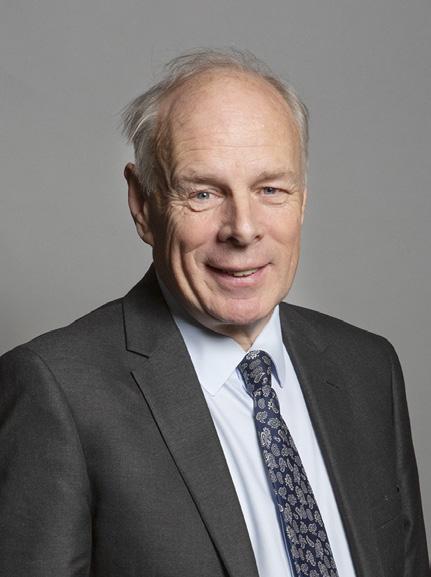
the Commonwealth. The diverse nature of the membership provides the CPA with a unique position within the parliamentary community to offer a comprehensive perspective on how to strengthen parliamentary democracy across the Commonwealth and to discuss new and innovative approaches on how to do so.
The 65th Commonwealth Parliamentary Conference is the most prominent event in the Commonwealth Parliamentary Association’s calendar, as it offers a unique opportunity for the representatives of the Association’s 180 Member Parliaments and Legislatures to network with colleagues from other jurisdictions and discuss common issues of concern which affect Commonwealth Parliaments.”

During the 65th CPA General Assembly which took place at the 65th Commonwealth Parliamentary Conference in Halifax, Canada, CPA Members elected Hon. Ian Liddell-Grainger, MP (United Kingdom) as the new Chairperson of the CPA Executive Committee. He has held the role of Acting Chairperson of the CPA Executive Committee since April 2021. He is a Member of the UK Parliament representing the constituency of Bridgwater and West Somerset, having first been elected in 2001. The CPA Chairperson is elected for three years and works with the CPA Secretary-General to lead the Association.
Members also endorsed the appointment of Hon. Shri Anurag Sharma, MP, Member of the Lok Sabha at the Parliament of India as the new CPA Treasurer. He was elected in 2019 to represent the constituency of Jhansi (Uttar Pradesh) in the 17th Lok Sabha and is a Member of several Parliamentary Committees. The Treasurer, who is a Member of the Association nominated by the Executive Committee, is appointed for three years and works with the CPA Secretary-General to monitor the finances of the Association. The CPA Treasurer also heads the Trustees board.

The 65th CPA General Assembly was followed by a meeting of the new CPA Executive Committee during which Hon. Osei Kyei Mensah Bonsu, MP, and Member of the Parliament of Ghana was confirmed for the position of Vice-Chairperson of the CPA Executive Committee. He was first elected as a Member in 1997 and is also the Majority Leader in the Ghanaian Parliament. The position of Vice-Chairperson is for a term of one year and the holder is also a Member of the CPA Co-ordinating Committee.
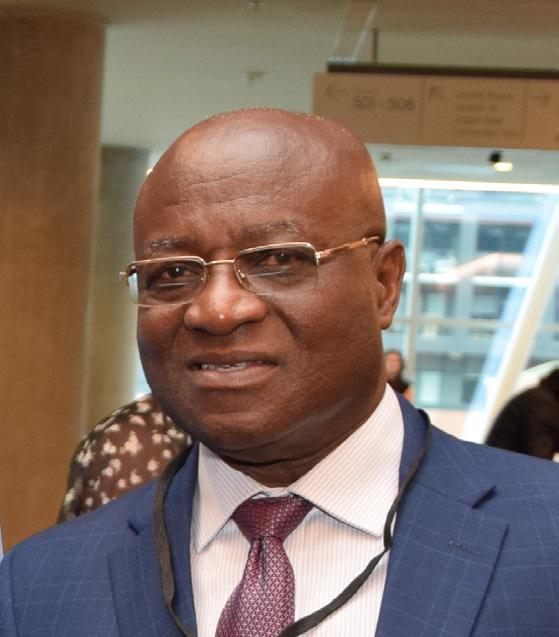
The Parliamentarian | 2022: Issue Three | 100 years of publishing | 209 INCLUSIVE, ACCESSIBLE, ACCOUNTABLE AND STRONG PARLIAMENTS
CPA OFFICERS ELECTED AT 65 th CPC Images credit: Christian Diotte/Parliament of Canada and Jeffrey Hyland/CPA Headquarters
COMMONWEALTH PARLIAMENTARIAN OF THE YEAR AWARD ANNOUNCED AT 65 th CPC IN CANADA
The inaugural winner of the Commonwealth Parliamentarian of the Year Award was announced at the 65th Commonwealth Parliamentary Conference in Halifax, Nova Scotia, Canada.
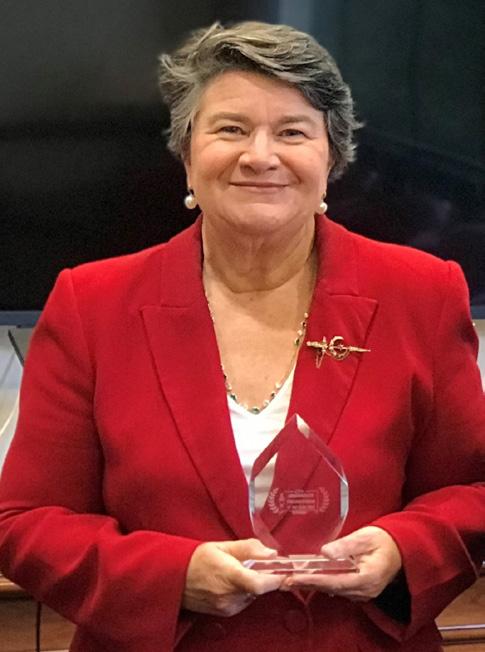
Hon. Kate Doust, MLC from the Parliament of Western Australia was the 2022 recipient of the Commonwealth Parliamentarian of the Year Award in recognition of her long parliamentary service as well as working to promote women and people with disabilities in her community. The award also recognises the Member’s contributions to the work of the CPA (including acting as a Mentor during programmes), her commitment to the diversity of her community, the work she has undertaken in addressing and combatting domestic violence, and her approach in embracing innovation and new ideas in the Parliament of Western Australia.
In a letter of thanks to the CPA, she wrote to the CPA Secretary-General, Stephen Twigg: "I thank the Commonwealth Parliamentary Association, Members, the CPA Executive Committee and yourself for the privilege of this acknowledgement. I do not think that any individual who puts themselves forward for a role in public life, as an advocate for others, does so with the intention of garnering accolades. Members of Parliament are overall driven by a desire to pursue change in their communities and improve the lot of their constituents using Parliament as a vehicle.
Receiving this award from the CPA is a highlight of my parliamentary career and I am very grateful for the acknowledgement. I hope to continue working with the CPA to assist Members with their ongoing development and support in their work representing their constituents both in their electorates and Parliament."
Hon. Kate Doust was first elected in 2001 and has been re-elected five times. She was the President of the Legislative Council of Western Australia from 2017 to 2021 and was also a Deputy Chair of Committees amongst many other roles. Before entering Parliament, she was a trade union official.
As part of the Commonwealth Parliamentary Association’s mission to strengthen parliamentary democracy through the promotion of good governance and sharing best practice, the awards have been launched this year to recognise and highlight inspirational and active Parliamentarians for excelling in their field.
Awards are open to nominees who are current Parliamentarians* across the Commonwealth. The Commonwealth Parliamentary Association’s unique membership includes over 180 national, state, provincial and territorial Legislatures. The next awards will be open for nominees in 2023.
* Nominees should be sitting Members of Parliament in a Commonwealth Legislature or have been a sitting Member of Parliament in a Commonwealth Legislature in the award period. The award can be made posthumously. Please check the CPA website for full nomination criteria and details of the 2023 awards.
FUTURE CPA GOVERNANCE MEETINGS CONFIRMED AT 65 th COMMONWEALTH PARLIAMENTARY CONFERENCE
During the 65th General Assembly held in Canada, the following future CPA governance meetings and conferences were discussed:
• 2023 Mid-Year CPA Executive Committee Meeting – to be hosted by the CPA Gibraltar Branch and the Parliament of Gibraltar in Spring 2023 (final dates to be confirmed).
• 66th Commonwealth Parliamentary Conference (CPC) – to be hosted by the CPA Ghana Branch and Parliament of Ghana in Accra, Ghana from 30 September to 6 October 2023.

• 2024 Mid-Year CPA Executive Committee Meeting (virtual) – final details to be confirmed.
• 67th Commonwealth Parliamentary Conference (CPC) – to be hosted by the CPA New South Wales Branch and Parliament of New South Wales in November 2024.

Further information about these events will be circulated to all CPA Branches.

210 | The Parliamentarian | 2022: Issue Three | 100 years of publishing INCLUSIVE, ACCESSIBLE, ACCOUNTABLE AND STRONG PARLIAMENTS
For images of 65th Commonwealth Parliamentary Conference please visit CPA Flickr page (www.flickr.com/photos/cpa_hq/albums), CPA website www.cpahq.org or social media - Twitter @CPA_Secretariat | Facebook.com/CPAHQ | LinkedIn | Instagram @cpa_secretariat
CPA LAUNCHES NEW COURSES ON CLIMATE CHANGE AND ACCESSIBILITY FOR THE CPA PARLIAMENTARY ACADEMY
Ahead of the 65th CPC in Canada, the CPA launched two new courses as part of its portfolio of parliamentary professional development courses via the CPA Parliamentary Academy.

The first new course is linked to the CPA Small Branches network and will introduce Commonwealth Parliamentarians to the critical issue of climate change, its distinct and disproportionate impacts in small jurisdictions, and how this links to the role of Parliament and individual MPs.
The second new course focuses on ‘Making Parliaments Accessible to Persons with Disabilities’ and links to the Commonwealth Parliamentarians with Disabilities (CPwD) network.
Both new courses are available to all Members of Parliament and parliamentary staff across the CPA’s membership as part of the CPA Parliamentary Academy, a new online learning platform for Members of Parliament, Clerks and parliamentary staff featuring online training and professional development with easy-to-use videos and resources.
The CPA Parliamentary Academy also features two residency-based workshops on advanced parliamentary development for Commonwealth Parliamentarians that complement the online courses. The next Residency programme is due to be held in Cape Town, South Africa in October 2022 with further programmes in 2023.

To register for the CPA Parliamentary Academy please visit www.cpahq.org/parliamentary-academy.

NIGERIA SPEAKER HIGHLIGHTS COSAP AGENDA AT 65th CPC
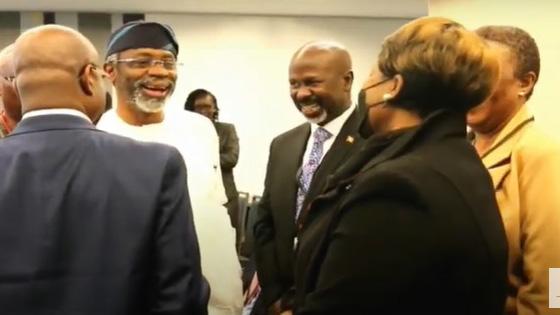
In the margins of the 65th Commonwealth Parliamentary Conference (CPC) in Halifax, Canada, the Speaker of the Nigeria House of Representatives, Rt Hon. Femi Gbajabiamila met with delegates from the CPA Africa Region to present the upcoming agenda of the Conference of Speakers and Heads of African Parliaments (CoSAP).
The Nigeria Speaker outlined the focus of the legislative platform and described CoSAP as “an exclusive platform, where specifically we Speakers and Heads of Parliaments can meet once a year to interact, discuss, engage with one another to shape common ideas, priorities and approaches for tackling the myriad challenges we face as a continent, while also providing peer to-peer support and solidarity.”
The inaugural CoSAP meeting took place in Abuja from 8-10 May 2022 attended by the CPA Deputy Secretary-General, Jarvis Matiya. The meeting was held on the the theme of ‘Enhancing Africa’s Post-COVID economic recovery through parliamentary leadership’ and it was attended by Speakers of Parliaments across Africa including Ethiopia, Egypt, Ghana, Kenya, Rwanda, Cameroon, Senegal, Malawi, Algeria and South Africa.
CPA REGIONAL SECRETARIES MEET AT 65th CPC
Ahead of the 65th Commonwealth Parliamentary Conference in Halifax, Canada, CPA Regional Secretaries met with the CPA Secretary-General, Stephen Twigg and the CPA Secretariat team to provide updates on activities in the nine CPA Regions. The nine CPA Regions are: Africa; Asia; Australia; British Islands & Mediterranean; Canada; Caribbean, Americas & the Atlantic; India; Pacific; South-East Asia.
The Parliamentarian | 2022: Issue Three | 100 years of publishing | 211 INCLUSIVE, ACCESSIBLE, ACCOUNTABLE AND STRONG PARLIAMENTS
Images credit: Christian Diotte/Parliament of Canada and Jeffrey Hyland/CPA Headquarters
COMMONWEALTH PARLIAMENTARIANS WITH DISABILITIES REGIONAL CHAMPIONS MEET IN CANADA AND ELECT NEW CPWD CHAIRPERSON
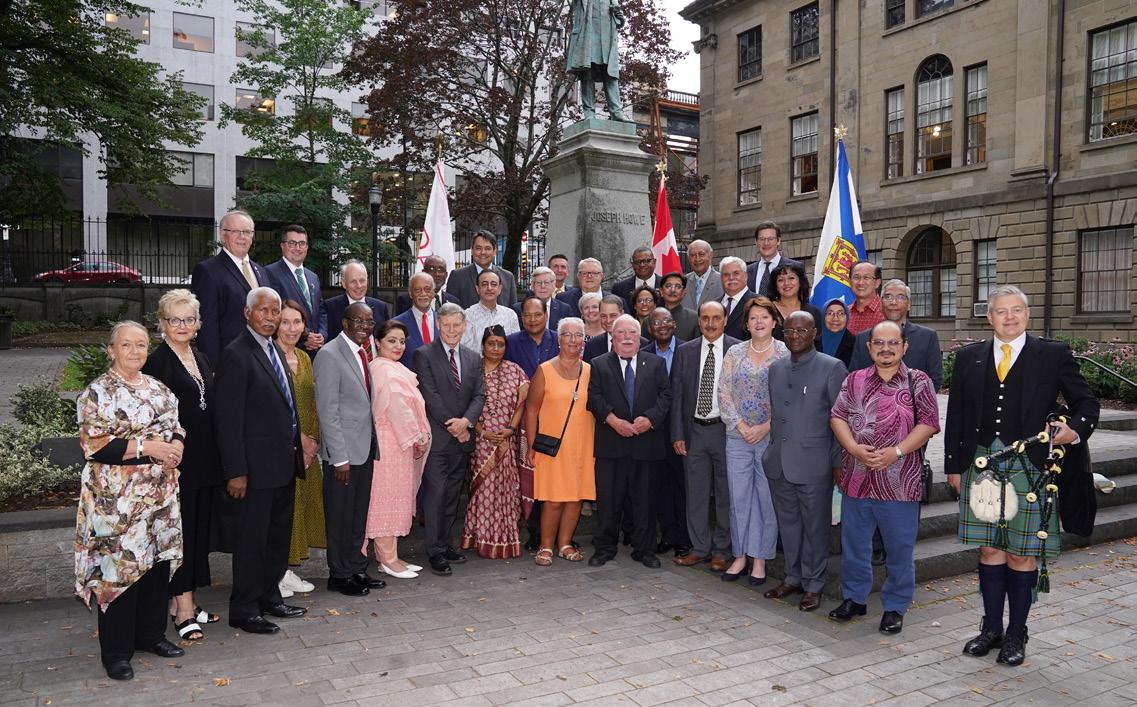
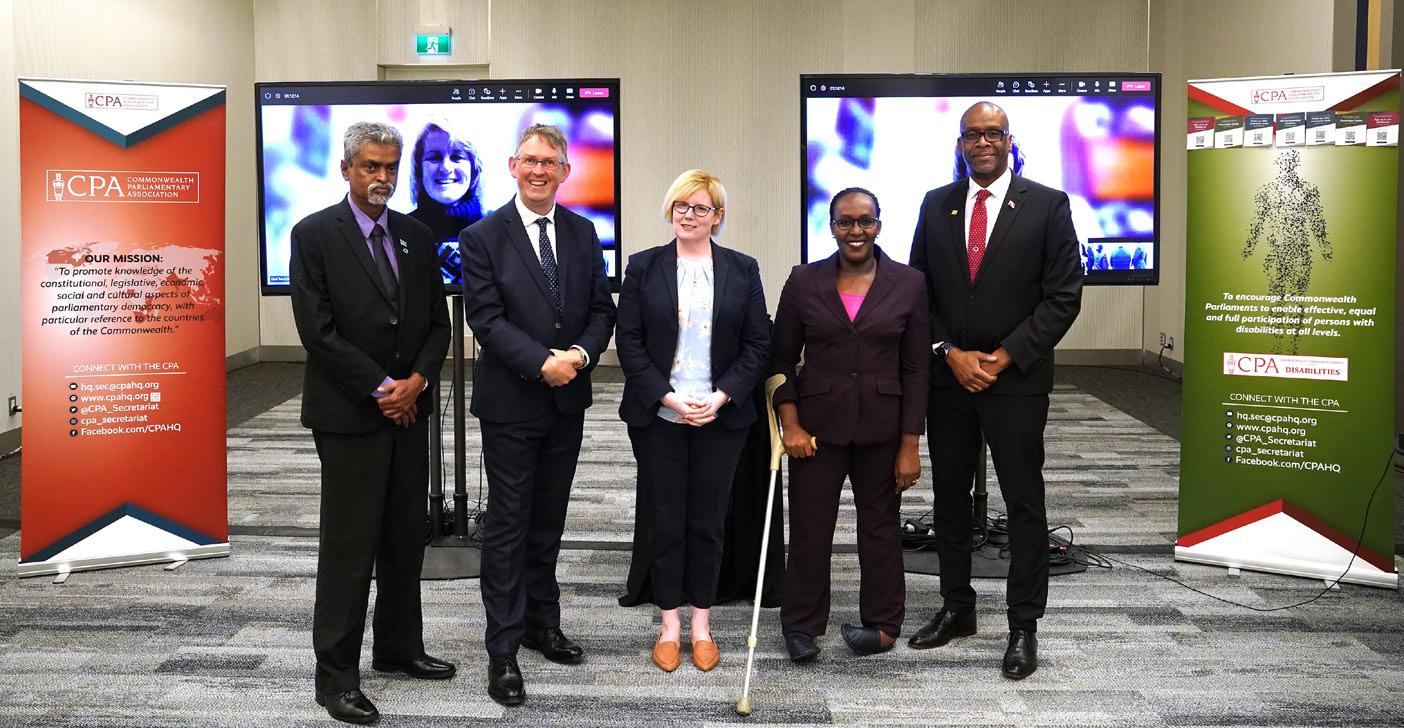


The Regional Champions of the Commonwealth Parliamentarians with Disabilities (CPwD) network have met at the 65th Commonwealth Parliamentary Conference in Halifax, Nova Scotia, Canada. The meeting, held on 23 August 2022, was chaired by the CPA Canada Regional Champion, Hon. Carla Qualtrough, PC, MP, Minister of Employment, Workforce, Development and Disability Inclusion from the Parliament of Canada.
During the meeting, Hon. Laura Kanushu, MP (CPwD Africa Regional Champion) from the Parliament of Uganda was elected as the new CPwD Chairperson and Senator Hon. Paul Richards (CPwD Caribbean, Americas and Atlantic Regional Champion) from the Parliament of Trinidad and Tobago was elected as CPwD Vice-Chairperson.
The new CPwD Chairperson is a Ugandan lawyer and legislator, who represents people with disabilities in the Parliament of Uganda. She is also an Executive Member of the Uganda Women’s Parliamentary Association (UWOPA) advocating for people with disabilities.
The CPwD Vice-Chairperson is an independent Senator in the Parliament of the Republic of Trinidad and Tobago where he advocates for persons with disabilities, special needs and vulnerable groups. He has also sat on many Joint Select Committees and has many years’ experience in radio and television broadcasting and production.
Also attending the CPwD meeting were: Hon. Paul Maynard, MP (CPwD British Islands and Mediterranean Regional Champion) from the Parliament of the United Kingdom; Hon. Viam Pillay, MP (CPwD Pacific Regional Champion) from Parliament of Fiji; with Hon. Liesl Tesch, MP (CPwD Australia Regional Champion) from the Parliament of New South Wales joining remotely.
The first CPwD Chairperson, Hon. Kevin Murphy, former Speaker of the Nova Scotia Legislature also attended the meeting.
The CPwD network was established by the CPA to support Parliamentarians with disabilities to be more effective in their roles and to help improve awareness of disability issues amongst all Parliamentarians and parliamentary staff. The CPwD Regional Champions represent each of the CPA’s nine Regions and promote the rights of Commonwealth Parliamentarians with disabilities in their respective Regions and represent disability interests within the CPA.
CPA
LEGISLATURE
The Speaker of the Nova Scotia Legislature, Hon. Keith Bain, MLA welcomed the CPA Executive Committee led by CPA President, Hon. Anthony Rota, MP, Speaker of the House of Commons, together with Canadian Provincial Speakers, to Province House during the 65th Commonwealth Parliamentary Conference, hosted by the CPA Canada Region in Halifax, Canada.
212 | The Parliamentarian | 2022: Issue Three | 100 years of publishing INCLUSIVE, ACCESSIBLE, ACCOUNTABLE AND STRONG PARLIAMENTS
EXECUTIVE COMMITTEE MEMBERS VISIT NOVA SCOTIA
Images credit: Christian Diotte/Parliament of Canada and Jeffrey Hyland/CPA Headquarters
NEW RESEARCH PROVIDES GUIDANCE ON ‘TRANSITIONING TO LIFE AFTER PARLIAMENT’ FOR FORMER PARLIAMENTARIANS
7. Financial stress is common.
8. Depression, anxiety, post-traumatic stress disorder (PTSD), exhaustion, agoraphobia and alcohol abuse were all experienced to varying degrees.
In general, the report found that establishing a postparliamentary career was a very difficult process:
1. 53% of respondents to the survey took at least six months to find work and 12% took longer than 18 months.
2. During their career, MPs develop a broad set of skills that are not well-understood by the public, potential employers and recruitment agencies.
In the margins of the 65th Commonwealth Parliamentary Conference in Halifax, Canada, a research team from Australia - comprising of Dr Andrea Coote of the Victorian Parliament Former Members Association and Dr Amy Nethery and Dr Zim Nwokora from Deakin University, Australia - spoke to conference delegates about their recent report findings on the subject of ‘Transitioning to life after Parliament’.


The background to the research began in 2018 when the Executive of the Victorian Parliament Former Members Association (VPFMA) approached former Members of Parliament who had lost their seats or retired after the 2014 and 2018 Elections. According to feedback received by the report team: “We heard the raw emotion, anger, distress and depression of those who had left Parliament involuntarily. We learnt of the inability to gain meaningful work, of mental health issues, relationship breakdowns, frustration, shame, loneliness, and utter despair” (Transitioning to life after Parliament report)
In order to understand this issue more and gain meaningful empirical data, the VFPMA commissioned Deakin University to produce a comprehensive report. The research team comprised Dr Amy Netherey, Dr Zim Nwokora, Dr Peter Ferguson and Professor Michael Clarke. The research provided one of the most substantial studies of the transition to life after Parliament conducted anywhere in the world.
The key findings from the report were:
1. All MPs experience challenges leaving Parliament.
2. Most MPs who leave Parliament unimpededly do not plan for their departure.
3. Lack of planning exacerbates post-parliamentary challenges.
4. Frequently there is an irretrievable loss of identity, status and purpose.
5. There is a feeling of betrayal by the community.
6. Relationship breakdown is common.
3. While all former MPs suffered in the employment market because of their previous political career, many female former MPs found it even more difficult to find meaningful, paid employment.
4. Executive recruitment agencies were unhelpful.
A wide range of Commonwealth Parliaments were approached to participate in the Deakin University survey on transitional financial assistance, superannuation and pensions, redundancy, career and life transitions counselling, mental health and medical services, social and networking opportunities. Most of the 33 Parliaments who responded reported that they provided few or no support to MPs to transition to life after Parliament.
The report provided a number of recommendations specific to the Victorian Parliament as follows:
1. Parliamentary Career Support Program (three stages).
2. Provide departing MPs opportunity for valedictory speech.
3. Change the date of the opening of Parliament.
4. Broader assistance to MPs during office audit process.
5. Ongoing psychological counselling.
6. Formalise the status of the former Members’ Association.
7. Parliament should build relationship with recruitment agencies.
8. Parliament should provide former MPs with a testimonial.
9. Financial support for retraining.
10. Waive accreditation conditions.
Although the report provided specific recommendations to the Victorian Parliament, it became evident from the research and subsequent conversations that the Deakin University research could be relevant to many different Parliaments in the Commonwealth and so the research has been shared more widely.
If readers have any further questions on this research or would like any further information then please contact andrea.coote@icloud.com and amy.nethery@deakin.edu.au.
The Parliamentarian | 2022: Issue Three | 100 years of publishing | 213 INCLUSIVE, ACCESSIBLE, ACCOUNTABLE AND STRONG PARLIAMENTS
Images credit: Christian Diotte/Parliament of Canada and Jeffrey Hyland/CPA Headquarters

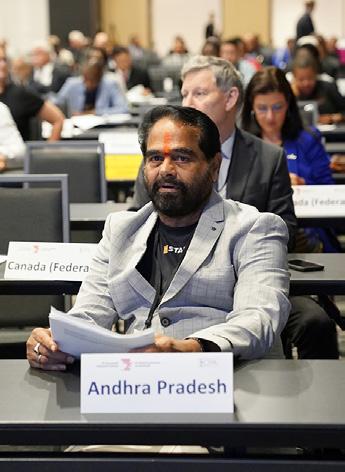

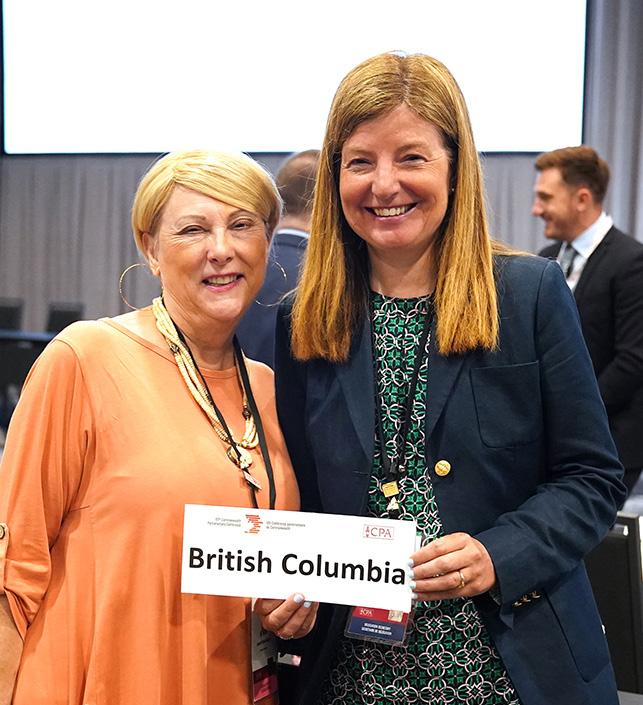
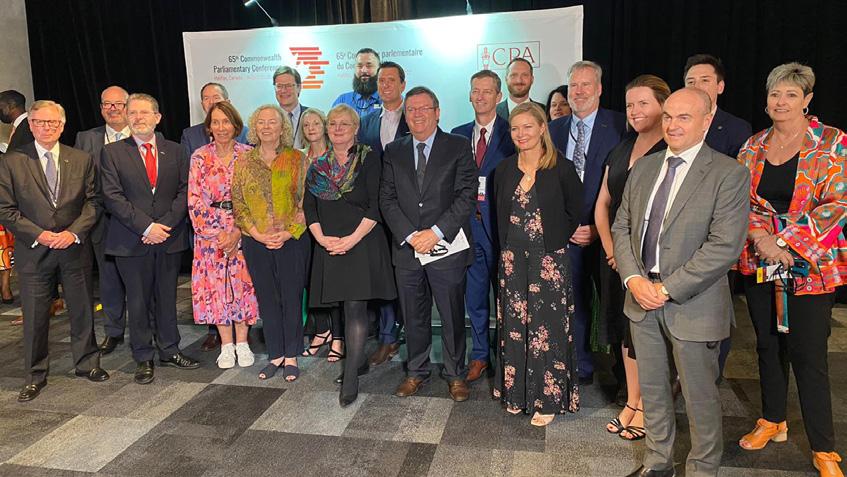
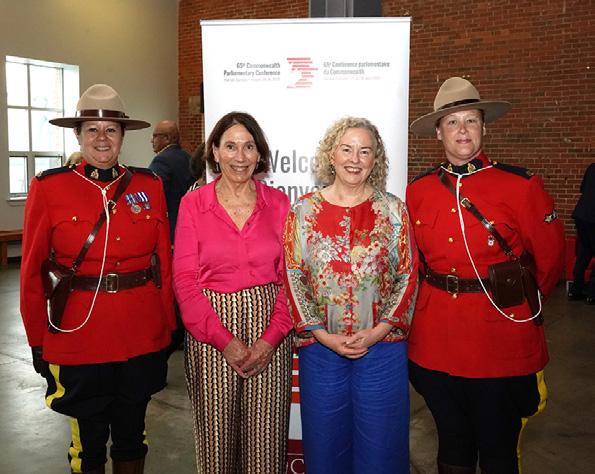

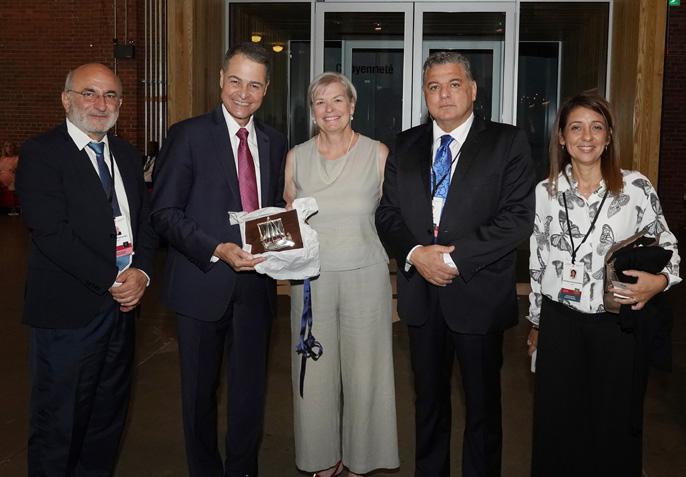
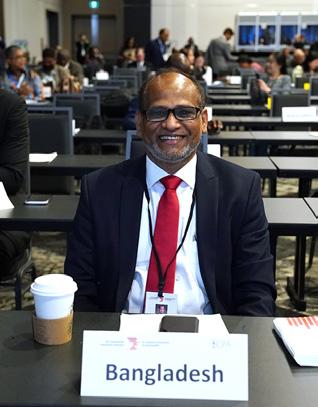
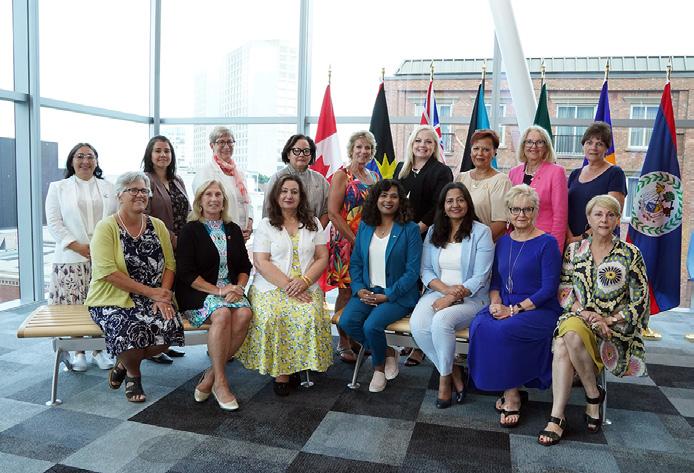
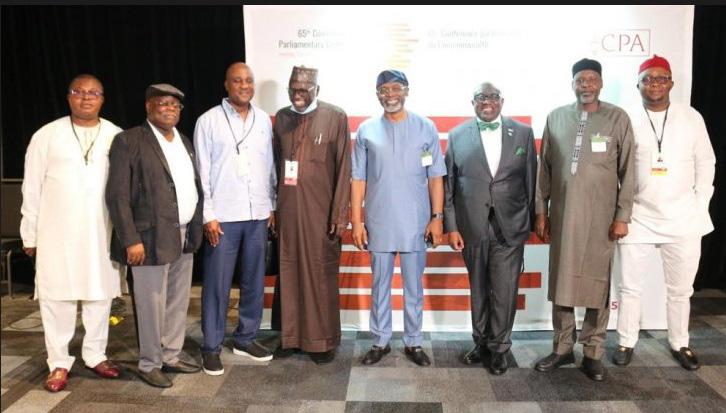
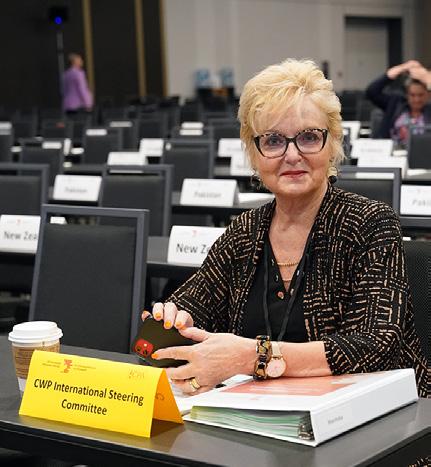
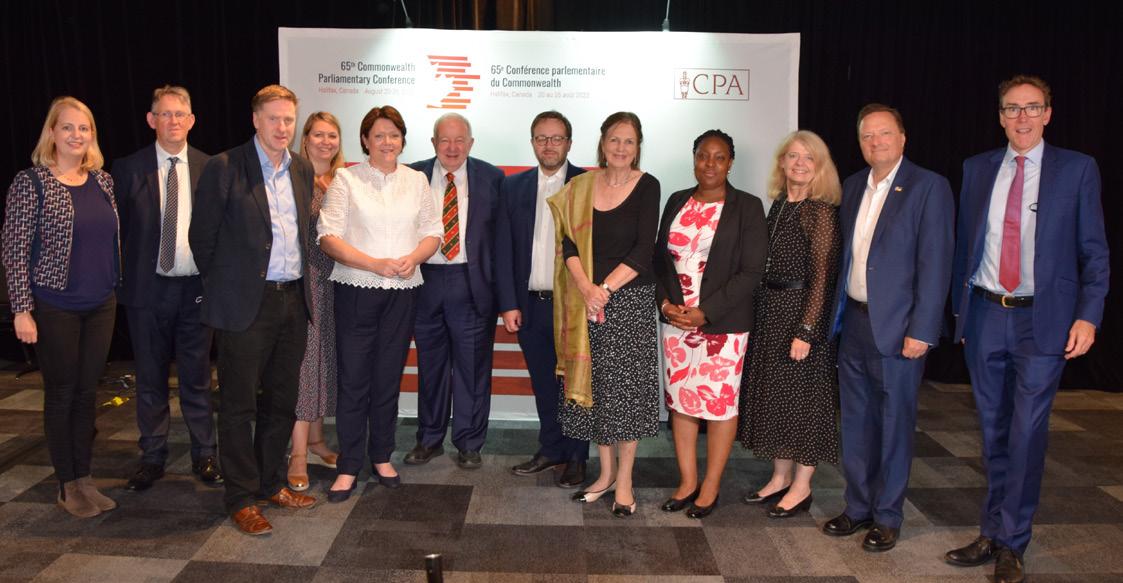
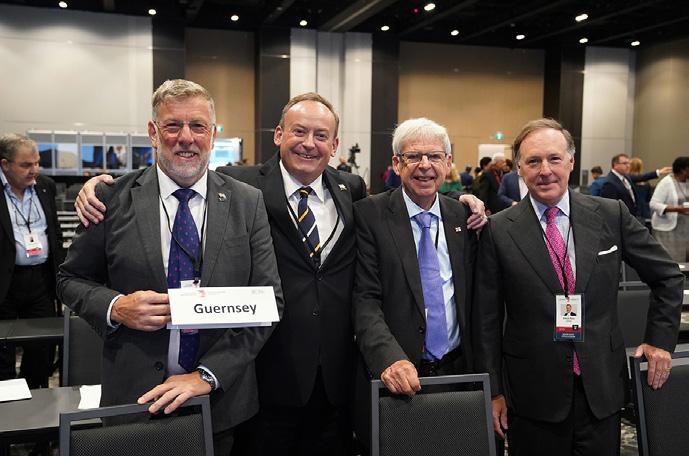
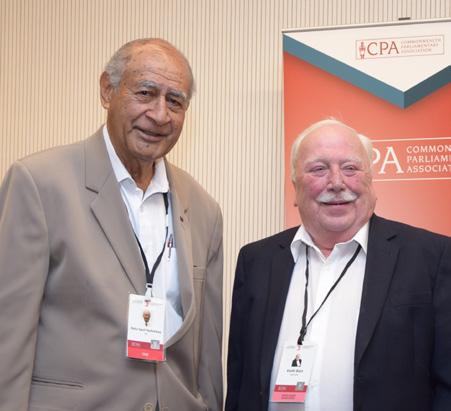
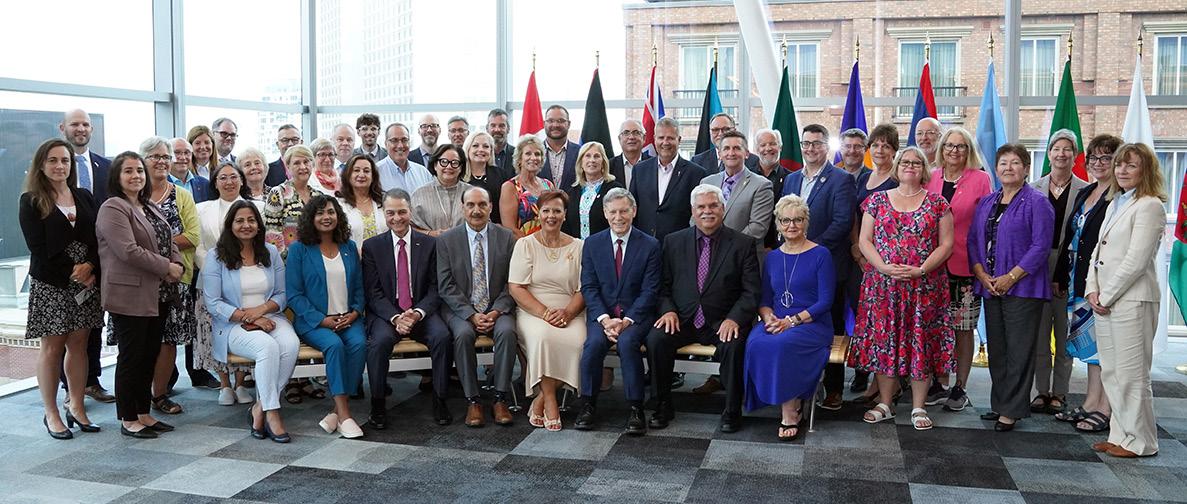
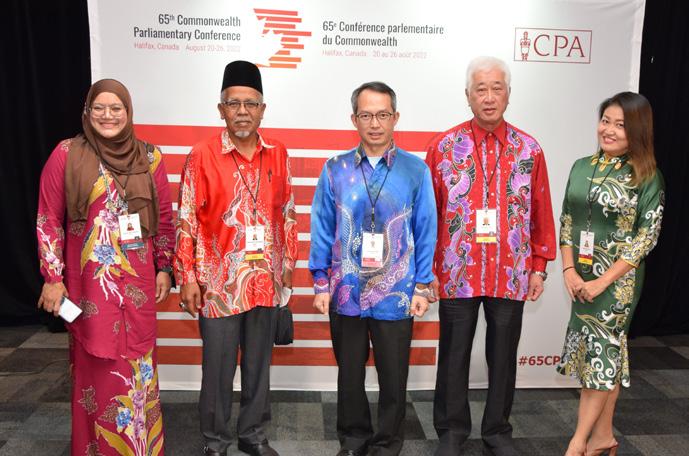
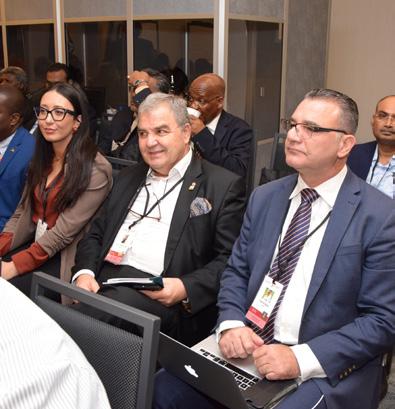
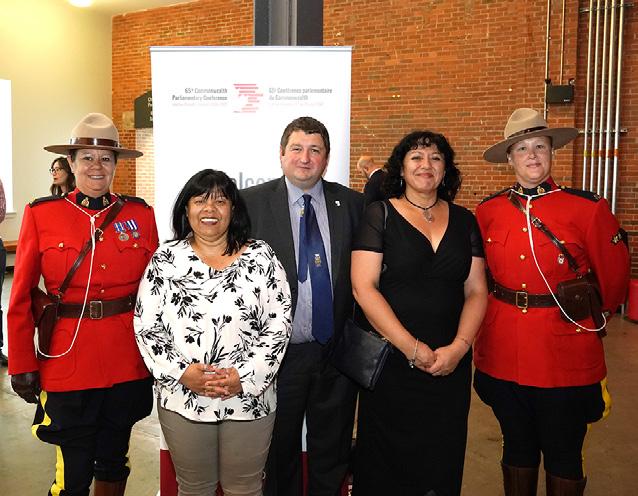
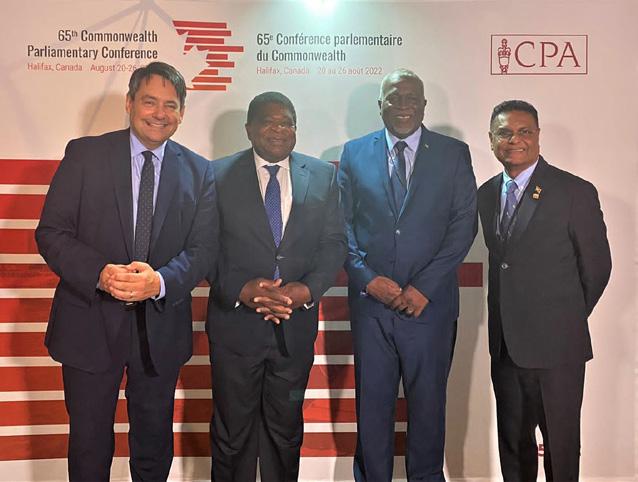
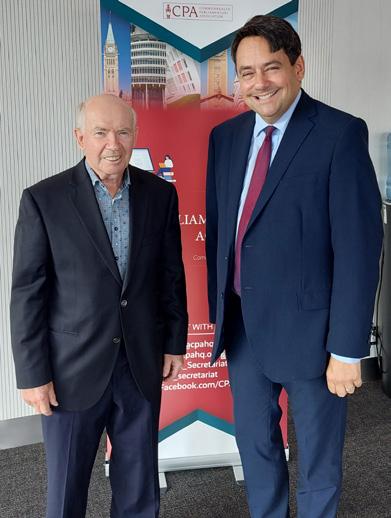
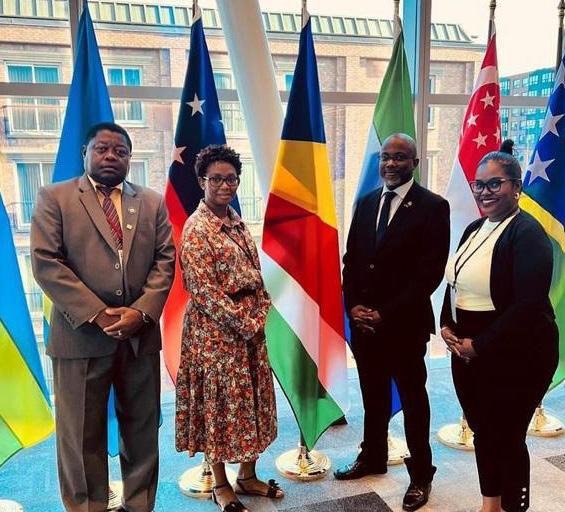
214 | The Parliamentarian | 2022: Issue Three | 100 years of publishing INCLUSIVE, ACCESSIBLE, ACCOUNTABLE AND STRONG PARLIAMENTS 65th CPC PHOTO GALLERY
Images credit: Christian Diotte/Parliament of Canada and Jeffrey Hyland/CPA Headquarters

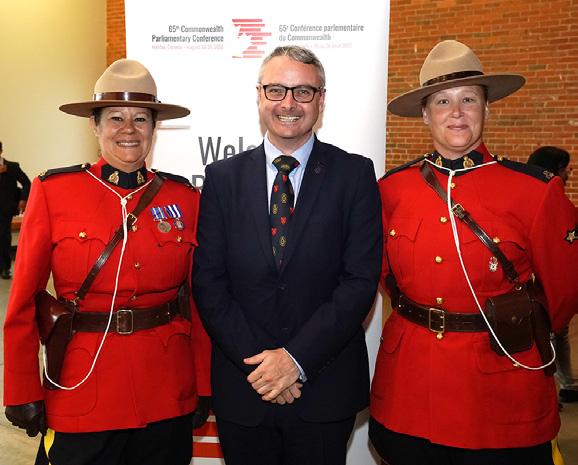

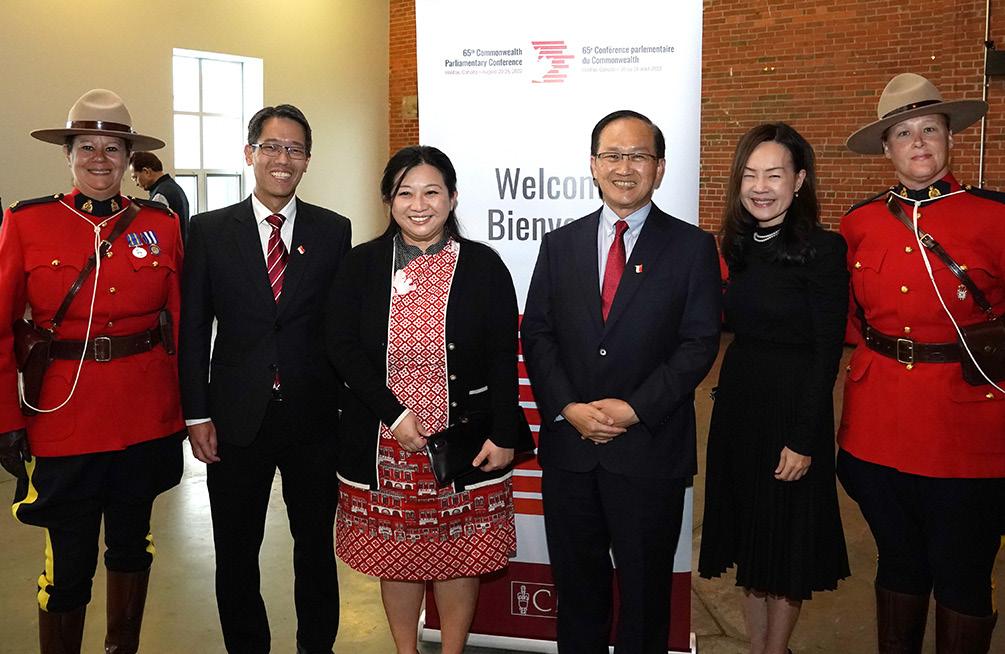
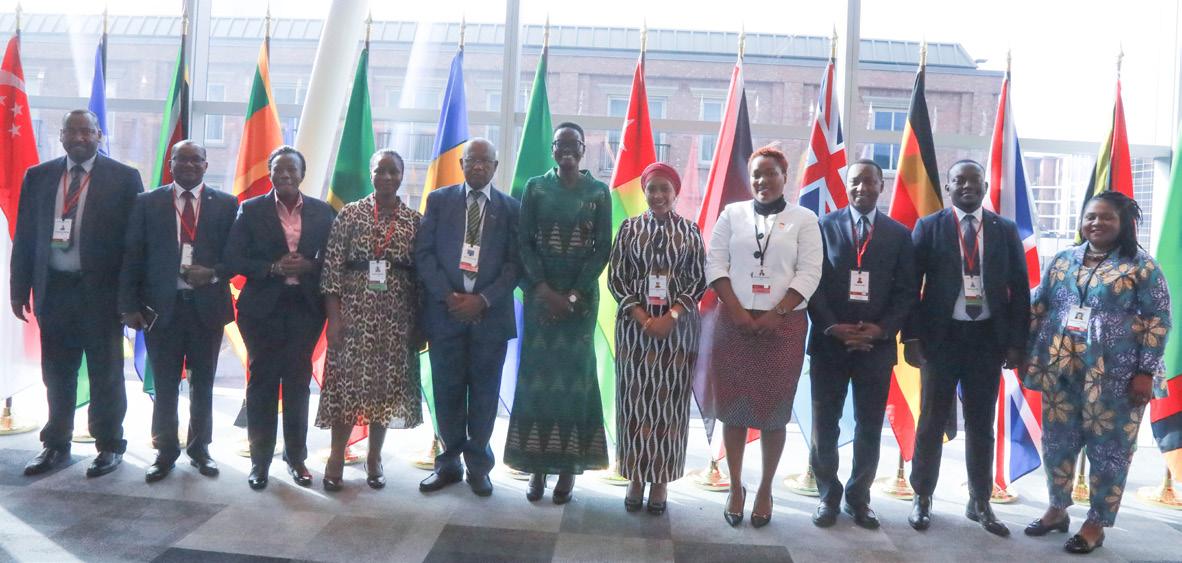
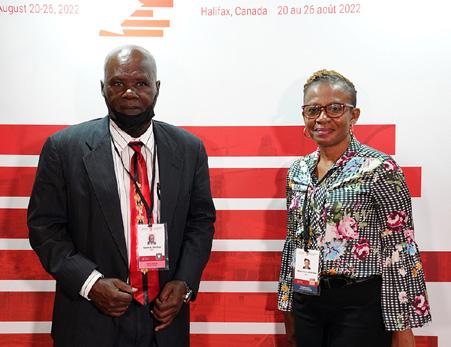
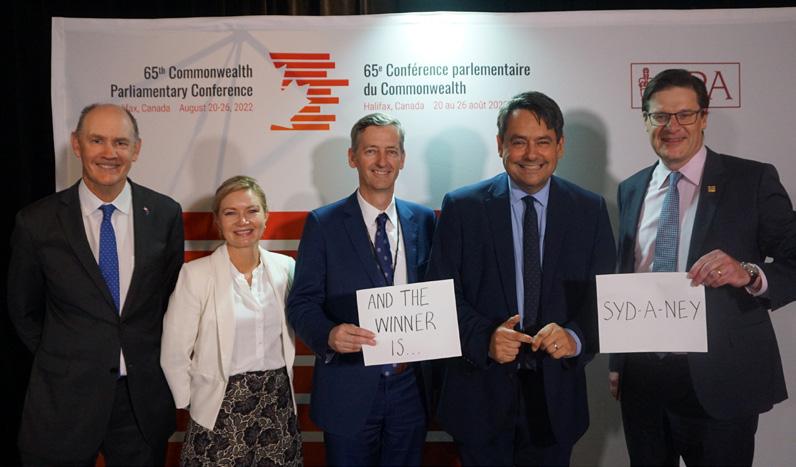
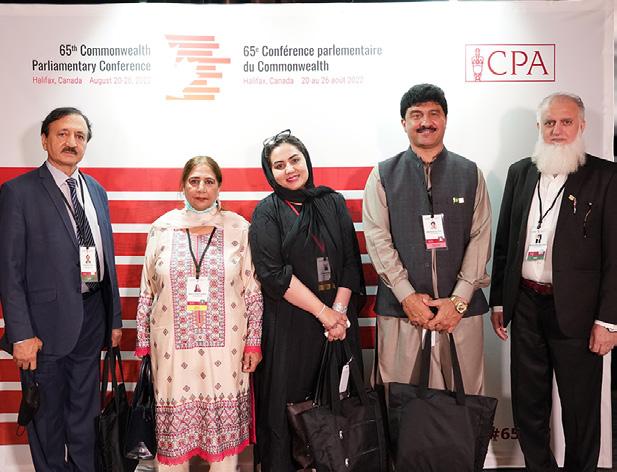
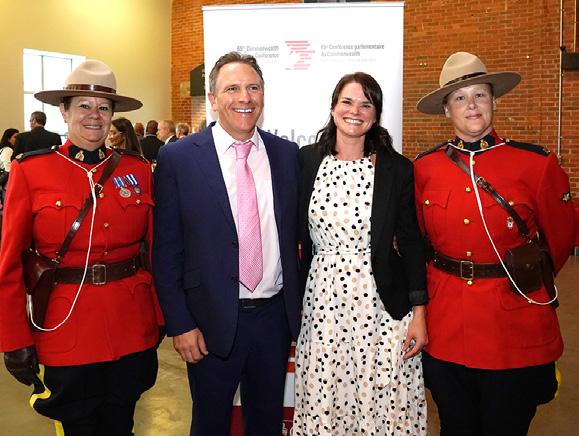
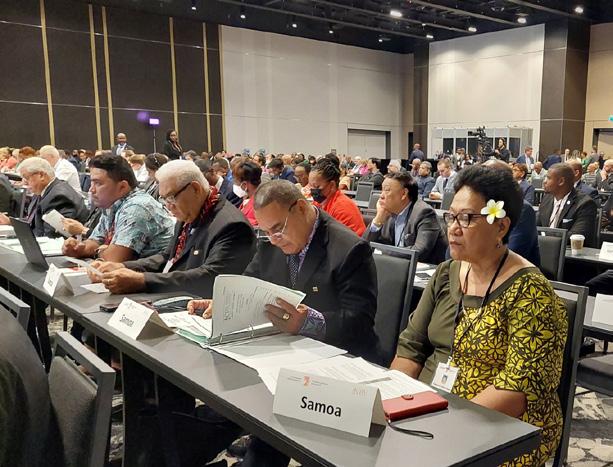
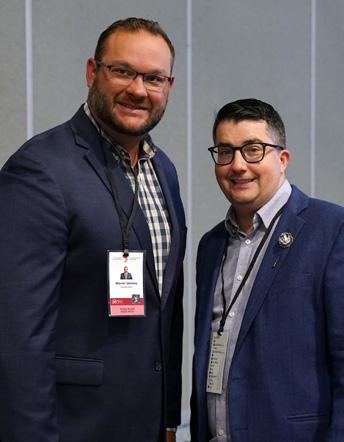
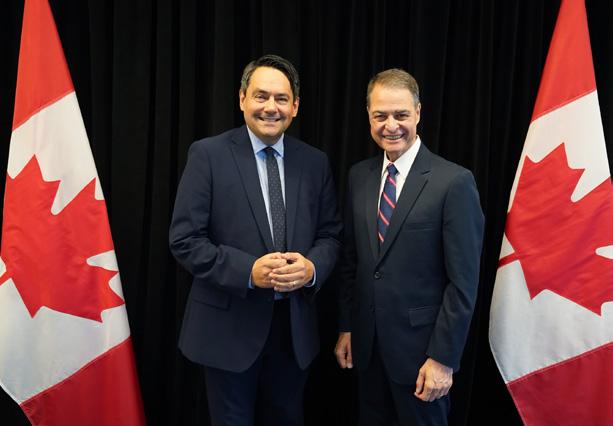
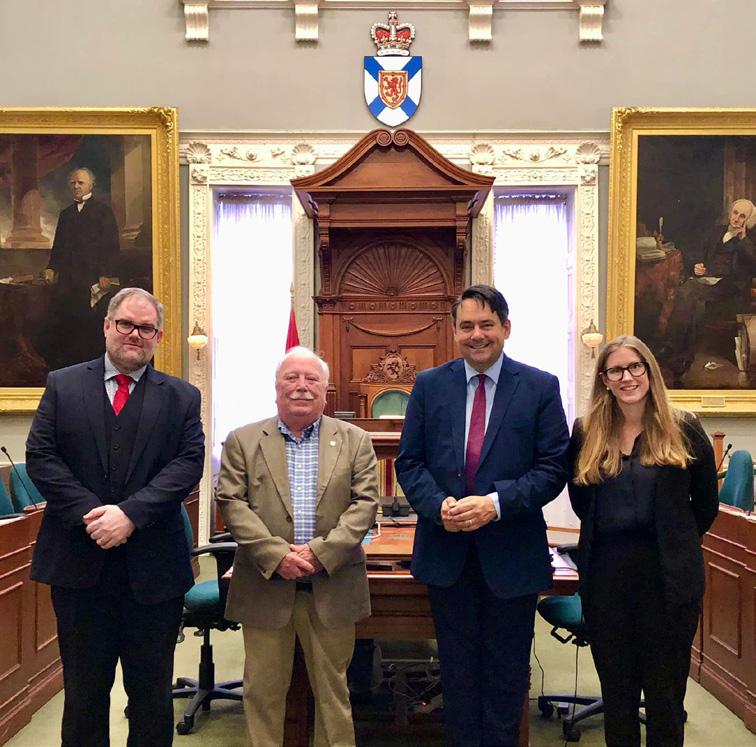
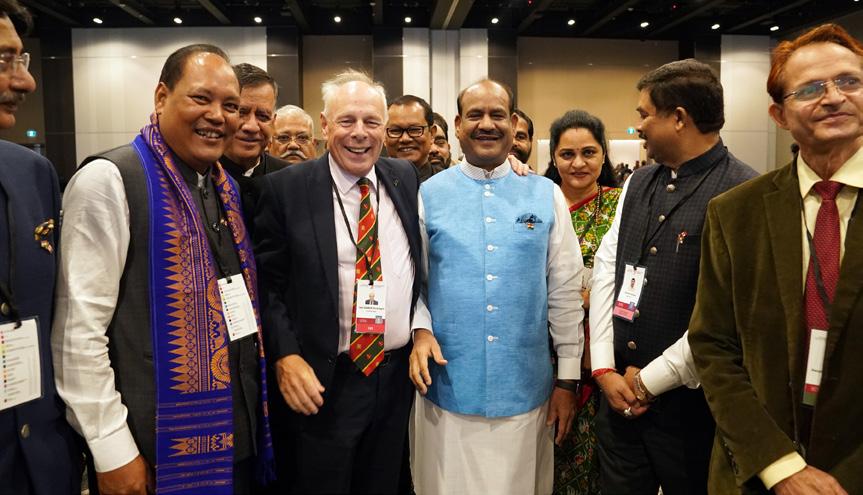
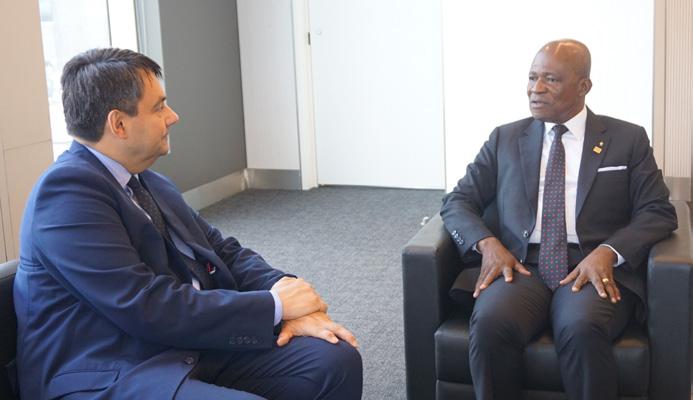
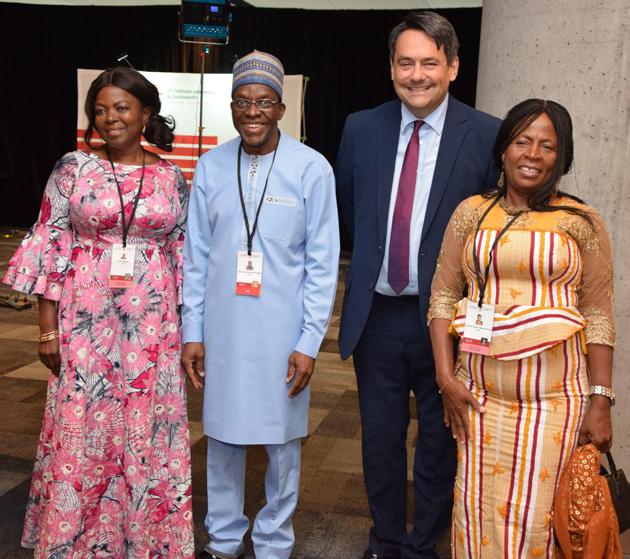
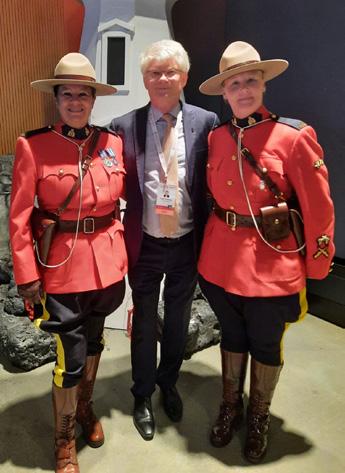
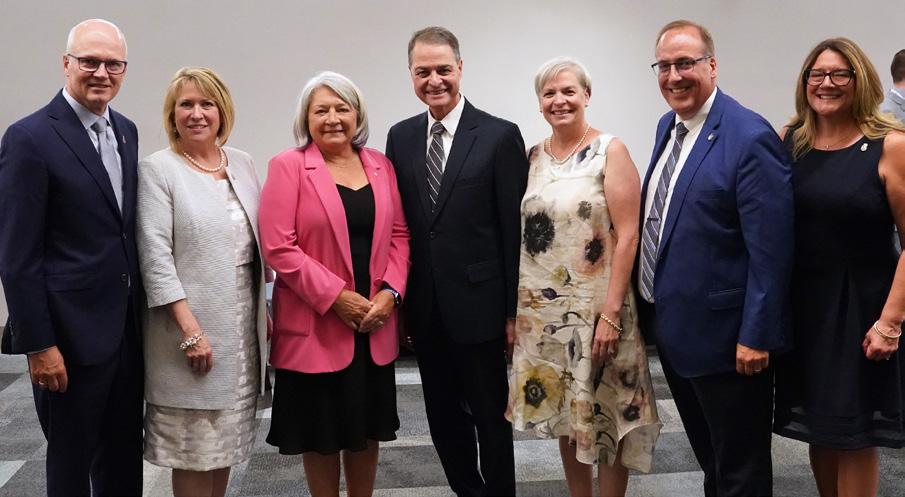
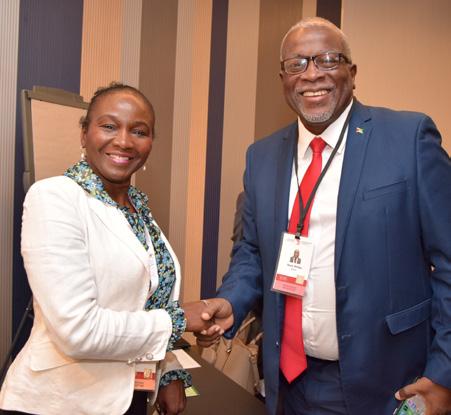
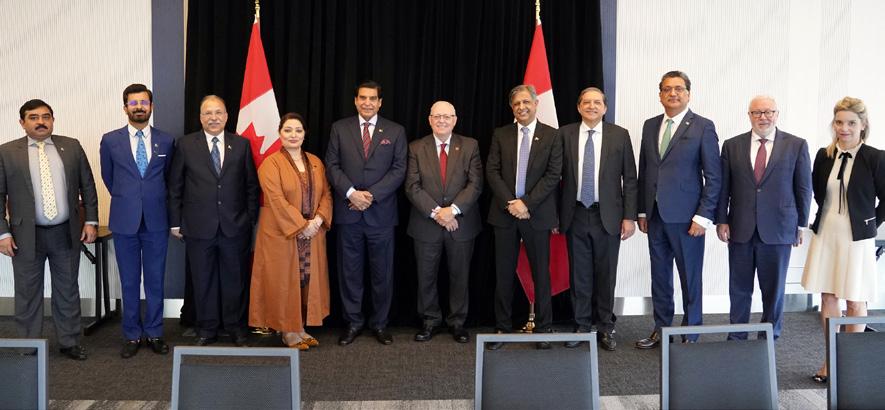
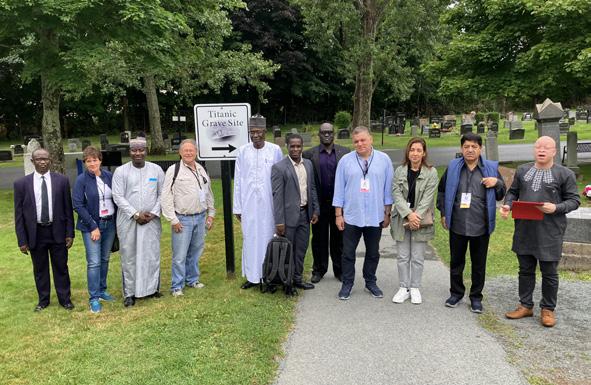
The Parliamentarian | 2022: Issue Three | 100 years of publishing | 215 INCLUSIVE, ACCESSIBLE, ACCOUNTABLE AND STRONG PARLIAMENTS For images of 65th Commonwealth Parliamentary Conference please visit CPA Flickr page (www.flickr.com/photos/cpa_hq/albums), CPA website www.cpahq.org or social media - Twitter @CPA_Secretariat | Facebook.com/CPAHQ | LinkedIn | Instagram @cpa_secretariat 65th CPC PHOTO GALLERY Images credit: Christian Diotte/Parliament of Canada and Jeffrey Hyland/CPA Headquarters
CPC WORKSHOP A: REMAINING RELEVANT IN RESPONSE TO A PANDEMIC: THE ROLE AND RESPONSIBILITIES OF PARLIAMENT
CPA HOST REGION TOPIC

Discussion Leaders:
• Hon. Chris d’Entremont, MP, Deputy Speaker of the House of Commons (Canada Federal)
• Hon. Nathan Cooper, MLA, Speaker of the Alberta Legislative Assembly
• Hon. Catherine Fife, MPP, (Ontario)
• Dr Lisa Barrett, Epidemiologist, Dalhousie University (Canada)
Facilitator: Bénite Dibateza (CPA Secretariat)
Rapporteurs: Mr Conor Hubley and Mr David Hastings (Nova Scotia Legislature)
This session looked to further emphasise the particular and enduring importance of Parliament in times of crises and when providing oversight of emergency responses, whilst also assessing the need for Parliaments to undergo urgent modernisation to better equip themselves in response to handling crises.
Hon. Chris d’Entremont, MP, Deputy Speaker of the House of Commons of Canada stated that although the COVID-19 pandemic is not over we can, with hindsight, learn several lessons from the pandemic’s impact on the legislature. He noted that, while many countries invoked their emergency powers legislation to empower the Executive branch to better manage the crisis, this usually results in the suspension of the Legislative branch and human rights. He argued, therefore, that Parliaments must adapt under the changing circumstances of a crisis like the COVID-19 pandemic so that they can better react to and plan for future crises.
To that end, Hon. Chris d’Entremont explained how the Canadian Parliament could have utilised the Emergencies Act to grant special powers to the Executive branch of the Canadian government during the crisis but did not. Rather, while the Federal Emergencies Act was not invoked by Parliament, various provincial governments did invoke their own emergency legislation to manage the pandemic. As a result, the Canadian House of Commons adhered to the legislation implemented by the Provincial Government of Ontario and it was suspended until new measures were adopted.
These measures, Hon. Chris d’Entremont said, included the Canadian House of Commons adopting several motions to allow for hybrid sessions and the establishment of a Special Committee on 20 April 2020, which allowed Parliamentarians to meet, discuss issues, and release announcements in a hybrid setting (utilising
the Zoom platform). It was explained that these motions are not permanent but are part of the Standing Orders of the House of Commons and Members will decide later if they want to make them permanent.
Hon. Chris d’Entremont added in lieu of utilising a traditional standing vote system, the House of Commons implemented an electronic voting system on 23 September 2020. Since the implementation of this system, Parliamentarians currently have the option to vote in person or remotely via an app on their mobile device. The rules around this system of electronic voting included the rule that Parliamentarians must vote within the confines of a countdown initiated by the app, and that the Member must be in Canada to vote. If a Member of Parliament votes both in person and remotely then only the in-person vote will be recorded. It was also clarified that the system encourages transparency because there is a public ‘live vote’ webpage so the public can watch the vote in real time and this webpage is monitored by party whips and caucus staff.
Hon. Chris d’Entremont added that for the benefit of Parliamentarians they are encouraged to remain on Zoom during votes so that they can raise a Point of Order should they encounter problems with the voting app. When asked why hybrid sittings could become permanent, Hon. Chris d’Entremont responded that there is a political view that the government needs to be held accountable, preferably through traditional methods of parliamentary scrutiny. However, he added the implementation of non-traditional methods (electronic voting and hybrid sittings) makes it easier to overcome several important communication and physical barriers (such as illness and childcare).
Hon. Nathan Cooper, MLA, Speaker of the Alberta Legislative Assembly described the unique responsibilities of legislators and elaborated that legislators have a responsibility to be relevant, emphasising that the Westminster system is the best method for protecting the people from government overreach. He explained that the pandemic struck during the beginning of the second session of the Alberta Legislature and that a budget had been introduced when the pandemic was announced. As a result, the Assembly and the Government, which had begun the first year of its new mandate, believed it was important for Albertans to see the Government continuing to govern in a calm fashion. However, Hon. Nathan Cooper admitted that, while the continuation of in-person sittings by the Assembly were intended to boost public morale, this was not the universal view of the Assembly’s Members. Thus, the Legislative Assembly of Alberta never adopted a hybrid system like its federal counterpart because it wanted to project a sense of continuance.
216 | The Parliamentarian | 2022: Issue Three | 100 years of publishing
INCLUSIVE, ACCESSIBLE, ACCOUNTABLE AND STRONG PARLIAMENTS
In lieu of hybrid sittings, Hon. Nathan Cooper noted that the Assembly introduced temporary Standing Orders concerning the passage of the budget to allow for the swift passage of any legislation and briefly adopted an electronic voting system. He added that the main estimates were transferred to a Committee on supply and that, due to the pandemic occurring early in the passage of a budget, nine departments still needed to be examined. However, due to the revision, they collectively received only three hours of scrutiny.
Thereafter, Hon. Nathan Cooper discussed how Bill 10: The Public Health Emergency Powers Act represented an example of government overreach by the Executive branch during the pandemic. The Bill had expanded the authority of a Minister to specify conditions that replace any provision of a statute without any oversight of the Legislative Assembly. Consequently, the Bill drew the criticism of both the opposition and wider public, who criticised the Executive branch for trying to bypass the Legislature and questioned the need for such legislation due to the existence of pre-existing emergency powers legislation. Furthermore, the Bill was subject to a constitutional challenge based on the concept that the Legislature and not individual Ministers, alone, possesses the authority to make laws. Subsequently, a Committee review made several recommendations to ensure transparency, however, Hon. Nathan Cooper explained that the provision was not removed. As a result, a new amendment (Bill 66) was introduced in the Fall, which repealed the clause that allowed the Executive branch to overreach in its authority.
In summation, the Speaker of the Alberta Legislative Assembly said that the successful adoption of Bill 66, amending Bill 10, serves as a perfect example of the Westminster system’s ability to hold the government to account during a time of crisis. He stressed his opinion that in-person sittings, rather than hybrid sittings, remain the best means of holding the government accountable. Unlike any other jurisdictions in Canada, Alberta allows interventions
INCLUSIVE, ACCESSIBLE, ACCOUNTABLE AND STRONG PARLIAMENTS
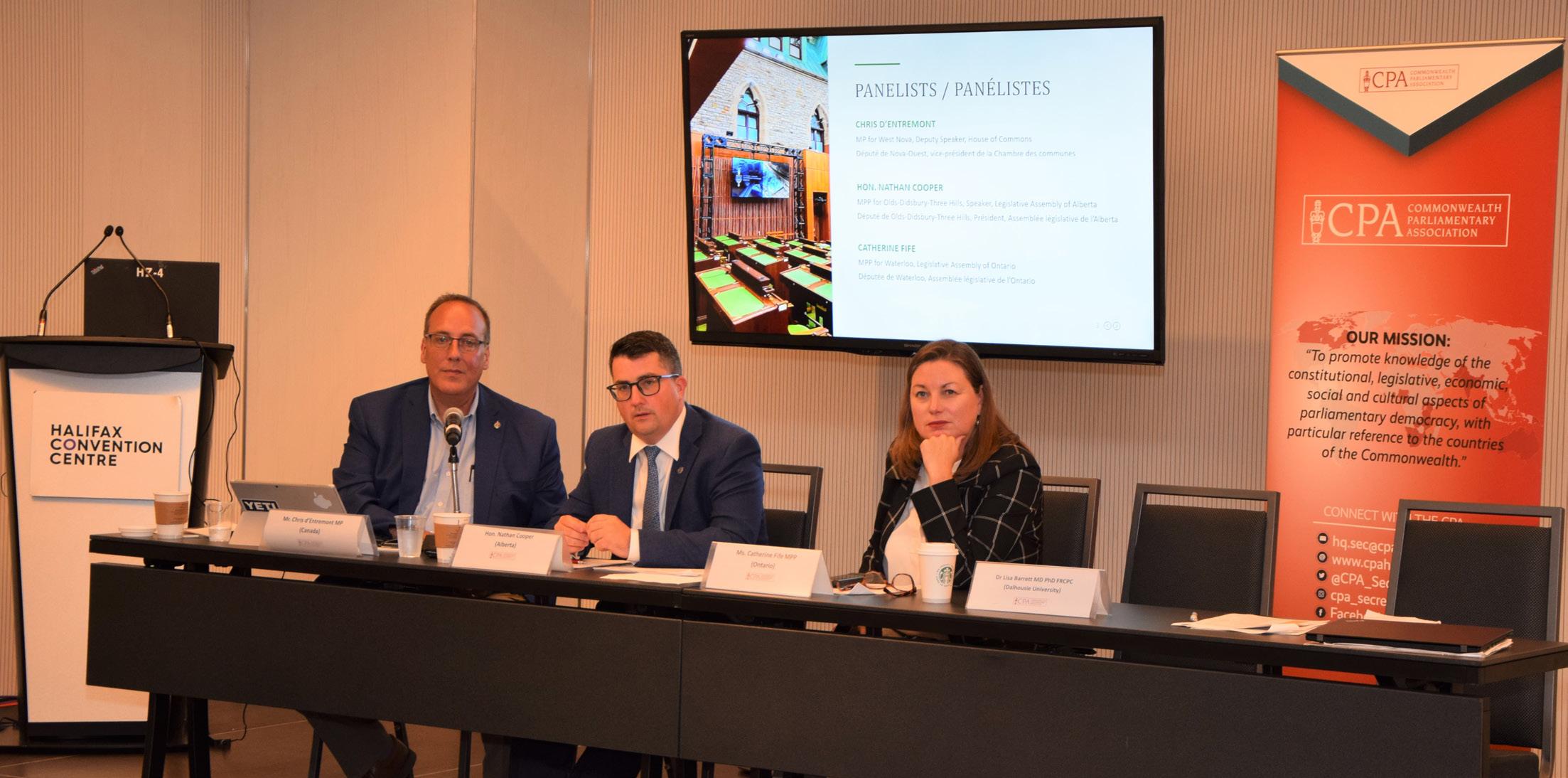
by Members, and it would have been impossible to maintain this practice under a hybrid system. In-person meetings encouraged Parliamentarians to forge closer connections with other Members and these connections encouraged civility within the Assembly. Therefore, Parliamentarians would have been hampered by the introduction of a hybrid system.
Hon. Catherine Fife, MPP (Ontario) commented on how different political parties in Alberta and Ontario handled the pandemic and that there were both strengths and weaknesses in the approaches which Parliament needs to address. In Ontario, emergency legislation was invoked on 17 March 2020 and a total of 40 emergency orders were issued in relation to the pandemic. These emergency measures were lifted in Spring 2022.
Hon. Catherine Fife commented that Executive overreach grew exponentially in Ontario despite the existence of a Committee to provide oversight as the Committee’s proposals were ignored, and, as a result, the pre-existing trend of delegated legislation rapidly increased. An example of this overreach was when the Government announced that the police could take personal information from anyone who was not at home. As a result, many municipal police departments refused to enforce this order with an outcry from the general public and the opposition parties, resulting in the order being rescinded within 24 hours.
Another polarizing issue in Ontario was the lack of proper planning for the COVID-19 crisis by the Government. Hon. Catherine Fife explained that despite the SARS crisis in the early 2000s, the province had failed to maintain its supplies of PPE (which expired when the COVID pandemic began) and as a result the Government was caught totally off-guard. She urged delegates to consider the need for Parliament to plan for the next pandemic, for example, by encouraging essential industries that were necessary to maintain supplies. The role of Parliament in preparing for future crises must be improved via the introduction of hybrid sittings so that a ‘virtual government’ scenario is in place

The Parliamentarian | 2022: Issue Three | 100 years of publishing | 217
Images credit: Christian Diotte/Parliament of Canada and Jeffrey Hyland/CPA Headquarters
PARLIAMENTS
for the future. Hon. Catherine Fife argued that hybrid sittings in Ontario were also necessitated by the inability of Committees (such as Public Accounts) to meet and properly investigate the allocation of funds by the Government during the pandemic. The importance of these investigations was illustrated by the increasing role of legislators in working with their community to alleviate the effects of COVID-19 on constituents. Beyond acting as a scrutiniser of government, legislators need to be nimble and flexible in responding to their communities because they need to provide clarity for their constituents so they can navigate the rules during a crisis. Furthermore, the introduction of a hybrid sitting would allow legislators to overcome the challenges posed by remote ridings, illness, and staffing shortages.
Hon. Catherine Fife concluded her presentation by suggesting that Parliament needs to balance post-COVID needs created by the difficulties of the pandemic and that there is a need for future checks and balances to be discussed outside the current crisis.
Dr Lisa Barrett (Dalhousie University) spoke to delegates about the scientific perspective of the pandemic and its next steps. The pandemic began due to the proliferation of unmonitored and constantly evolving pathogens and Dr Barrett noted these pathogens, due to high-density areas and close animal-human contact, spread rapidly without observation. Due to their mortality (they can be lethal but will not wipe out a whole population), they are able to spread, persist and cause a pandemic.
Dr Barrett told delegates that in her scientific opinion we are under-resourced and that we are not back to normal, but rather are at a normal stage of the pandemic and, as such, mitigation measures and more importantly vaccine rollouts must continue. There will be other pathogens that cause future pandemics and as a result, Dr Barrett urged delegates to increase government funding for the surveillance and research of the most dangerous pathogens. Better surveillance, research and infrastructure will result in the production of more accessible vaccines thereby allowing the world to better respond to the next crisis.
Dr Barrett commented that there is a difference between the phases in a pandemic and so the early ‘uncertainty’ period of a pandemic will cause government overreach. During the next phase of the pandemic, once vaccines are rolled out, a ‘grey area’ emerges, and the final ‘outgoing’ phase only occurs when everyone is vaccinated and the authorities possess the necessary information about the pathogen. Parliament needs to respond to each phase and, as such, proper communication and scientific research is necessary to guide public policy. Dr Barrett said that while she is “not an expert in human opinion,” there is a real tension between preparing for viruses and the rise of fear.
Dr Barrett suggested that leaders needed to approach people with different health models by understanding there is a real difference between people who spread misinformation and those who simply take health risks. She added that experts and leaders cannot misinterpret what vaccines do, when presenting them to the public, and cannot vilify people. Dr Barrett commented that the lack of international equity in vaccines for COVID-19 and the monkeypox virus speaks to a need for an international body capable of achieving that equity. In conclusion, she said public health needs to be more concerned about the outcomes, rather than the money spent, because public health expectations need to be met.
During the discussion which followed a delegate from India emphasised IT usage by the Parliament of India during the pandemic and described various successful measures implemented by the government.
A second delegate from India proposed the adoption of a resolution by the Commonwealth to share resources and technology to fight COVID-19.

A delegate from the United Kingdom questioned why hybrid sittings should be made permanent in a vaccinated world. Later, the delegate agreed that better planning for future crises was

218 | The Parliamentarian | 2022: Issue Three | 100 years of publishing
INCLUSIVE, ACCESSIBLE, ACCOUNTABLE AND STRONG
“ Beyond acting as a scrutiniser of government, legislators need to be nimble and flexible in responding to their communities because they need to provide clarity for their constituents so they can navigate the rules during a crisis. Furthermore, the introduction of a hybrid sitting would allow legislators to overcome the challenges posed by remote ridings, illness, and staffing shortages.”
required but questioned how a portion of a budget could be devoted to pandemic planning in advance, when Parliamentarians need to consider other pressing interests in their jurisdictions.
A delegate from Bermuda voiced concern about the need for Parliament to scrutinise government spending during the COVID19 pandemic.

A delegate from New Zealand stated their national Parliament implemented a hybrid system and MPs have the capacity to select a ‘proxy’ (the Party Whip) to vote on their behalf, adding that these measures allowed MPs to contribute to Parliament despite barriers such as illness.
A delegate from Ghana asked if the Standing Orders of Parliament should be reviewed because of COVID-19, agreeing with the presenters that the Executive branch was gaining greater power and raised the need for greater parliamentary oversight of the Executive branch.
A delegate from Gambia concurred with other delegates that the Executive branch was gaining too much power and noted that the Standing Orders of the Parliament of Gambia must be approved in person.
A delegate from South Africa noted the similarity between the challenges facing Legislatures around the globe and added that Parliament needs to adapt in the face of a global crisis. The delegate said the increasingly ‘unchecked power’ of the Executive branch had become problematic and that the delegates needed to think about a means for keeping Parliament relevant in times of crisis.
A delegate from Scotland stated his government recently published a report about the effects of the COVID-19 pandemic and that a self-examination was taking place. The delegate added that hybrid sittings should continue based upon the findings of the report. However, other processes of Parliament must also change and the delegate explained how Scottish legislators can now intervene during debates. It was explained that the Scottish Parliament had adopted interventions to generate better debates between legislators.
A delegate from British Columbia stated there is going to be another pandemic and raised the possibility of emergency preparedness for future pandemics akin to the province’s existing preparations for earthquakes.






A delegate from Nova Scotia agreed Parliament needed to be more involved in emergency preparedness and asked Dr Barrett how politicians should help educate their constituents about vaccines and emergency measures.
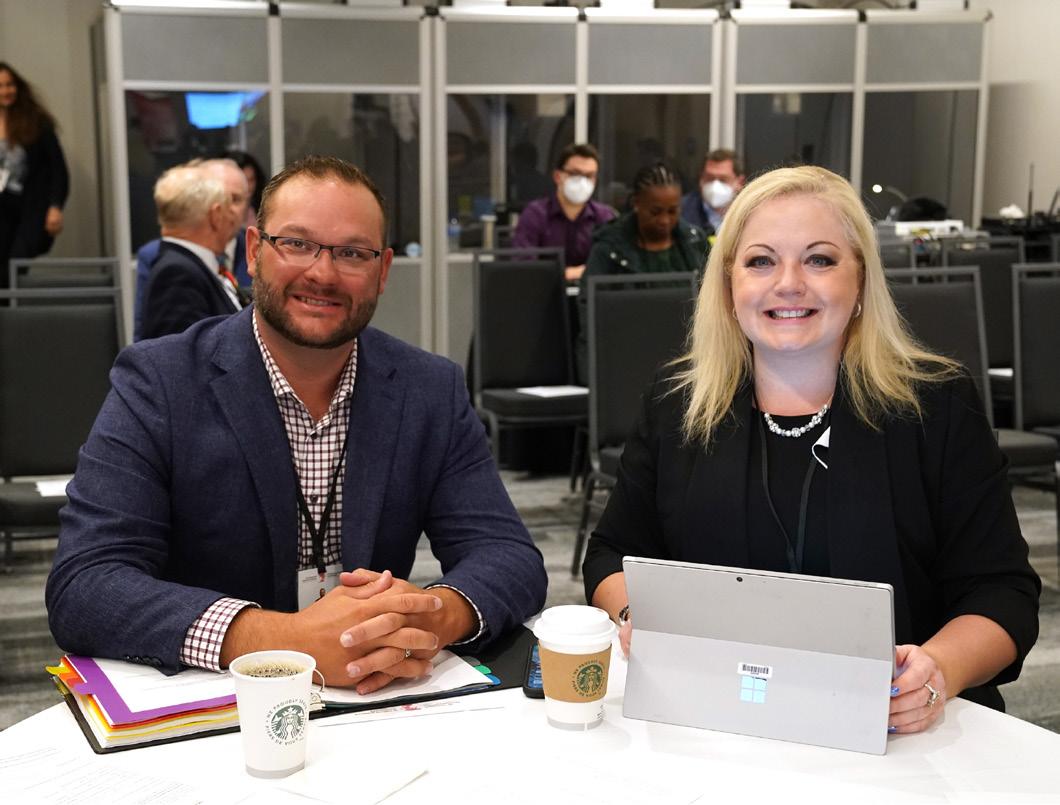
A Senator from Canada asked if the government should make hybrid sittings permanent and what was the role of hybrid sittings for future Parliaments.
A delegate from Nunavut raised the issue of food security during the pandemic. The delegate explained that Nunavut has the highest rate of food insecurity in Canada and therefore has a high morbidity rate. The delegate was curious about current national food security planning for a pandemic.
The recommendation at the workshop was endorsed as follows:











• Parliaments (both large and small) should develop









INCLUSIVE, ACCESSIBLE, ACCOUNTABLE AND STRONG PARLIAMENTS COVID-19 DELIVERING PARLIAMENTARY DEMOCRACY CPA Toolkit for Commonwealth Parliaments CPA TOOLKIT FOR COMMONWEALTH PARLIAMENTS AND LEGISLATURES ON THE COVID-19 (CORONAVIRUS) PANDEMIC AND DELIVERING PARLIAMENTARY DEMOCRACY Providing various measures and recommendations that can be adopted by both Parliaments and Parliamentarians in order to continue to deliver on the Legislatures’ role of scrutinising legislation and delivering democracy during a global pandemic. Visit www.cpahq.org to download your copy.
Images credit: Christian Diotte/Parliament of Canada and Jeffrey Hyland/CPA Headquarters
CPC WORKSHOP B: ROLE OF PARLIAMENTS IN ACHIEVING SUSTAINABLE DEVELOPMENT
Panel Chair: Hon. Keith Bain, MLA, Speaker of the Nova Scotia House of Assembly
Discussion Leaders:
• Hon. Gervais Henrie, MNA (Seychelles)
• Hon. Savitri Sonia Parag, MP, Minister of Public Service (Guyana)
• H.E. Hon. Ratu Epeli Nailatikau, Speaker of the Parliament of Fiji

Facilitator: Clive Barker (CPA Secretariat)
Rapporteurs: David Fraser and Michael Chandler (Nova Scotia Legislature)
With seventeen new goals including ending poverty and hunger, realising gender equality, reducing inequalities and ensuring climate action, it was clear when they were agreed to, the 2030 Sustainable Development Goals (SDGs) created a sense of optimism and potential for the years 2015 to 2030. However, the role that Legislatures around the world play in ensuring the implementation of these goals remains an often-unexplored topic.
Hon. Gervais Henrie, MNA (Seychelles) began the session by recalling being recently among a group of Parliamentarians discussing sustainable development. One of the party caucus Members in attendance commented, “this isn’t my thing”. His colleague’s admission made him realise that we all come from diverse backgrounds and therefore, may not be familiar with legislative ‘buzzwords’.
Hon. Gervais Henrie stressed the need for capacity building by Parliaments to effectively implement the SDGs. Referring to the 2022 SDG Index noting Canada, Malta, Australia and Fiji are in the top four in terms of harmonizing economic growth and environmental protection, he asked whether we were doing enough as Parliamentarians and how we can help to re-engineer the mindset of future generations to endorse the SDGs. The Member noted Seychelles’ community-based organisations are working with the Legislature thereby enabling citizens to be involved in the decision-making process. He emphasised that Parliamentarians need to lead by example to show sustainable development is achievable and he concluded by quoting from the last paragraph of the poem ‘Carry On!’ written by Robert Service.
Fight the good fight and true;
Believe in your mission, greet life with a cheer;
There’s big work to do, and that’s why you are here.
As a Minister of Public Service, Hon. Savitri Sonia Parag, MP (Guyana) stated that every policy implemented in Guyana is geared towards achieving the seventeen SDGs. She emphasised the critical role of Parliament to eradicate inequalities affecting the implementation of the SDGs, reminding the audience of the Commonwealth concept of ‘leaving no one behind’. She noted that since 2020, the Government looked at every policy while considering the SDGs including the budget where it focussed on key areas including food security, combating climate change, developing the education sector, housing, safe water and health care.
The Member mentioned the passing of legislation is key to achieving sustainability. The Natural Resource Fund is another example whereby monies can only be used for sustainable development. She also noted sectoral Committees have been established to track progress, provide public awareness and hold government accountable. The Member reiterated that all sectors of society must help to prevent climate change and noted that consultations are also underway on a new carbon strategy. She stated that Guyana is working towards achieving the SDGs by 2030 but more funding is needed.
H.E. Hon. Ratu Epeli Nailatikau, Speaker of the Parliament of Fiji stated that the 2030 agenda for sustainable development provides an excellent pathway for small island states to engage with the SDGs. He noted that SDGs create opportunities for countries to make commitments based on national priorities. The Speaker said that Fiji has launched both a five-year and a 20-year plan in 2017 aligned with the SDGs. They have also been able to access the Green Climate Change Fund for climate mitigation projects.
The Speaker of Fiji indicated that the 2030 agenda provides for a sharing of expertise and resources which vulnerable island states can access in their policy making and action on sustainable development. He noted though that small island states have limited resources and small budgets. This requires enhanced engagement with international donor agencies and the pursuit of less costly initiatives such as the banning of plastic bags and imposing higher taxes on high consumption vehicles. The promotion of solar power, the rebirth of coral and the protection of mangroves are also areas worthy of discussion.
The Speaker of Fiji emphasised that Parliaments play a crucial role in SDGs by passing legislation and ratifying international conventions. Parliamentary oversight is also key in holding government to account. He noted the Parliament of Fiji has undertaken initiatives to implement SDGs. A ‘Speakers Debate Series’, started in 2016, involves NGOs, business representatives and Members of Parliament on both sides of the House. In 2017, an SDG self-assessment exercise was conducted to identify opportunities and challenges faced by Parliament. In 2018, a ‘guidance note’ was created for Standing Committees. This note
220 | The Parliamentarian | 2022: Issue Three | 100 years of publishing
INCLUSIVE, ACCESSIBLE, ACCOUNTABLE AND STRONG PARLIAMENTS
is now one of the most important assessment tools to review government commitments and targets.

The Speaker of Fiji remarked that interparliamentary engagement continues through various platforms such as the Asia-Pacific Forum. He said these forums are crucial in enhancing Parliament’s capacity and competency to perform its legislative and oversight functions. He concluded by reiterating that small island states must be encouraged to enhance their engagement with SDGs.

During the Q&A, Hon. Vincent Henry, MP (Guyana) remarked that SDGs focus a lot on climate action, healthy water systems etc. He reminded delegates that Indigenous people are the guardians of the environment and as such should be given support to continue to safeguard the world at large.
Hon. Thulani Vincent Xulu, MPL (KwaZulu-Natal) commented that unemployment is also a serious problem. In her reply, Hon. Savitri Sonia Parag stated that the Government of Guyana had made a promise of 50,000 jobs, and they are well on their way to achieving this.
Hon. Angelo Farrugia, MP, Speaker of the Parliament of Malta pointed out that small nations are very vulnerable to climate change, and this must be addressed to deal with the SDGs. There is much more to be done and we must not delay.
Hon. Gervais Henrie said that he is very happy that MPs do their best to speak collectively. He noted that small islands are facing resistance from big nations. We need friends in the opposition and must push our respective leaders to speak with a stronger voice. He reminded delegates that the Seychelles controls one-third of the world’s oceans noting his country ‘punches above its weight’ in the protection of sea grass. Hon. Savitri Sonia Parag stated that small islands can strive to do their best, but it is not enough if they do not act as a collective body.
Hon. Njume Peter Ambang, MP (Cameroon) said he has created a parliamentary network in his country on the implementation of the SDGs. He noted the implementation begins
INCLUSIVE, ACCESSIBLE, ACCOUNTABLE AND STRONG PARLIAMENTS
with quality education and questioned if the CPA would take this on as a matter of concern for the priority of education among Commonwealth countries.
Hon. Gervais Henrie said many delegates believe in quality education. He suggested that the approach could be better suited at a regional level, noting that different regions could look at developments in a local context.
Clive Barker (CPA Secretariat) reminded delegates that education is a key priority of the CPA and that an online course is being developed by the CPA on how each Commonwealth country can contribute to achieving the SDGs.
Hon. Sunita Duggal, MP (India Union) said that the CPA should give training to MPs on the linkage between social inclusion and economic growth. Developed countries could help smaller countries, which are doing a lot to achieve SDGs.
Hon. Terry Duguid, MP (Canada Federal) endorsed the comments on the understanding of the SDGs. He asked Hon. Savitri Sonia Parag about the role of Parliaments and Parliamentarians noting that governments are often the largest employers and procurers of services and goods. He wondered what governments can do to promote and achieve the SDGs?
Hon. Savitri Sonia Parag stated that the Government of Guyana had recently announced anti-corruption measures and that all spending is monitored by the Procurement Office, the Ministry of Finance, the Public Accounts Committee and the Auditor General’s Office.
Hon. Satish Mahana, MLA (Uttar Pradesh) noted that they have huge challenges in her jurisdiction with a population of over 25 million, but efforts are still being made to achieve SDGs. He asked what steps have been taken to deal with carbon emissions, stating that developing nations must be treated equally regarding climate justice.
The Speaker of Fiji said that Fiji is a small country but noted that the Prime Minister had been the Chair of COP23. He stated that
The Parliamentarian | 2022: Issue Three | 100 years of publishing | 221
Images credit: Christian Diotte/Parliament of Canada and Jeffrey Hyland/CPA Headquarters
strong efforts are being made on SDGs and remarked that children know more about climate change now as it is taught in schools. Hon. Savitri Sonia Parag stated that forests in Guyana are mostly intact which helps keep carbon emissions low. The country is also exploring renewable energy and wants to reduce carbon emissions by 70% by 2030. Hon. Gervais Henrie said that work on carbon emissions around the world must be supported by governments noting initiatives like the planting of 40 million trees. He stated that conservation work is being done by organisations in Seychelles.
Hon. Churchill Gill, MP (Seychelles) said there needs to be a resolution compelling bigger countries to finance smaller countries on dealing with climate change as they are more responsible for pollution overall.
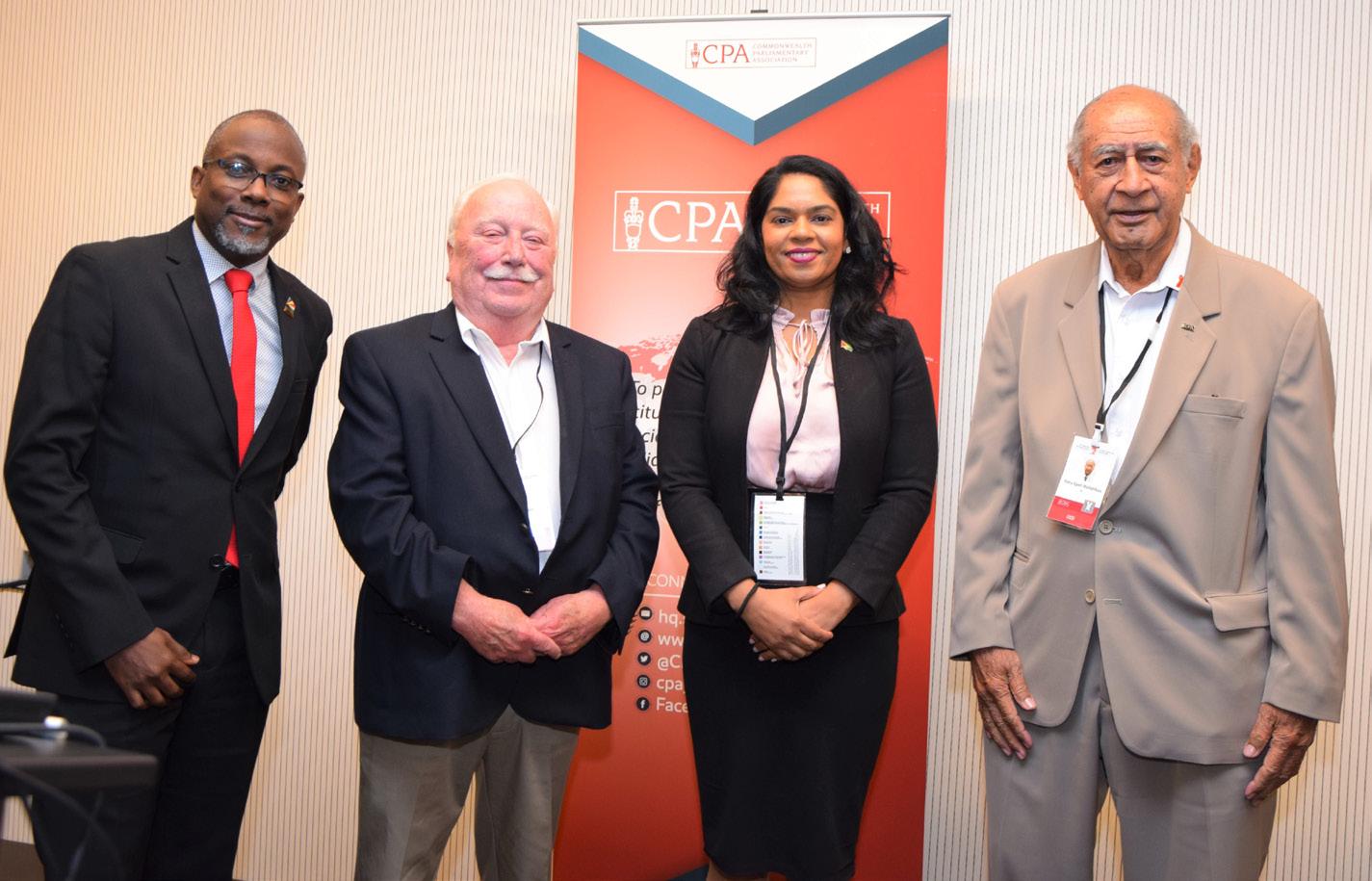
Hon. Ram Niwas Goel, MLA (Delhi) asked what is the role of the CPA as action on SDGs has stalled? This is a crisis that must be dealt with.
Hon. Dato’ Michael Yek Diew Ching, MLA (Negeri Sembilan) asked if we are going to work closely with the business community
on initiatives such as the extraction of fertilizer from seaweed?
Hon. Savitri Sonia Parag replied that Guyana has been working closely with the business sector and recognised the importance of the private sector in achieving goals.
Hon. Gervais Henrie said all delegates should look for ‘local’ solutions rather than expecting the CPA to provide all of the answers. He emphasised that MPs have a duty to leave the world a better place than we found it.
Hon. Shameen Thakur-Rajbansi, MPL (KwaZulu-Natal) said sustainability requires peace, but COVID-19 brought a lot of chaos. Wars are also affecting the economies of developing countries. These destabilising factors make it hard to achieve these goals. The CPA and other global bodies must take a tough stance on peace and stability as these are key factors in achieving the SDGs.
Rt Hon. Baroness Blackstone (United Kingdom) stated that we must fight government ineptitude and failure and put pressure on heads of government while continuing to work hard to monitor progress on SDGs. Baroness Blackstone noted two things are major obstacles: very rapid population growth and climate change. She emphasised the Commonwealth must put pressure on China and the USA to reduce their emissions and wondered if the Commonwealth could do more to bring richer nations together with developing countries. She also noted that the UK Government has reduced its aid budget considerably and emphasised that many smaller countries should be encouraged to speak out on this.
Following the Q&A, delegates participated in a group discussion exercise which considered the following questions:
• Is there a particular SDG that your jurisdiction has made progress towards?
• Are there particular actions the that the Legislature has taken that have contributed to this progress?
• What opportunities and challenges presented themselves as part of this process?
Hon. Angelo Farrugia, MP, Speaker of the Parliament of Malta noted that gender equality is an area where there has been a lot of progress, and this has brought an enrichment in the debate.
The Speaker of the Nova Scotia Legislative Assembly, Hon. Keith Bain, MLA said we are starting to realise we need to change our ways.
At the conclusion of the workshop, delegates endorsed the following recommendation:
• Members of Commonwealth Parliaments should familiarise themselves with the SDGs, their indicators and the mechanisms that they have to contribute toward their implementation by 2030.

222 | The Parliamentarian | 2022: Issue Three | 100 years of publishing
INCLUSIVE, ACCESSIBLE, ACCOUNTABLE AND STRONG PARLIAMENTS Following
the Q&A, delegates participated in a group discussion exercise which
considered
the following questions:
• Is
there a particular SDG that your jurisdiction has made progress towards?
• Are
there particular actions the that the Legislature has taken that have contributed to this progress?
• What opportunities
and challenges
presented themselves
as part of this process?
Images credit: Christian Diotte/Parliament of Canada and Jeffrey Hyland/CPA Headquarters
CPC WORKSHOP C: A PEOPLE'S PARLIAMENT: ACCESSIBILITY THROUGH INNOVATION
Panel Chair: Hon. Masizole Mnqasela, MPP, Speaker of the Western Cape Provincial Parliament

Discussion Leaders:
• Hon. Om Birla, MP, Speaker of the Lok Sabha (India Union)
• Hon. Rachel Ong, MP (Singapore)
Facilitator: James Pinnell (CPA Secretariat)
Rapporteurs: Mr James Charlton and Ms Erin Fowler (Nova Scotia Legislature)
Where Legislatures may have previously acted as bastions of traditions and norms, the effects of the COVID-19 pandemic dramatically accelerated transformations in parliamentary life. In many cases, CPA Branches were required to undergo years of modernisation in a matter of weeks, if not instantaneously. There is now a question of whether this spirit of adaptation and innovation will continue in the medium to long-term.
Hon. Masizole Mnqasela, MPP, Speaker of the Western Cape Provincial Parliament began the discussion by suggesting that nobody has a monopoly on wisdom, but all panelists felt that other institutions could benefit from learning about their agile approaches to accessibility during recent years. The pandemic has proved that things can change when necessary; the question now is how to continue to learn and transition to greater accessibility.
Hon. Om Birla, MP, Speaker of the Lok Sabha (India Union) began by stating that Parliament gives voice to the hopes and aspirations of the people in any parliamentary democracy; people expect their elected representatives to work towards their social and economic betterment. He noted that recent changes in science and technology have bridged the distance between countries and between communities within countries. These changes have also brought democratic institutions closer to the citizens they serve.
India is the biggest democracy in the world and features significant cultural, linguistic, social and religious diversity. Its people have expressed their faith in its democratic institutions through 75 years of free and fair elections. Direct elections at the municipal level have strengthened democracy at the grassroots level. The use of electronic voting machines for the past two decades has further strengthened the electoral process and made it more transparent. As the Parliament of India celebrates its 75th year, it seeks to catapult India to the top league at the global level in terms of prosperity and development with many initiatives
to be more accessible to the people, allowing citizens to monitor the performance of their public representatives in Parliament and facilitate and enhance the participation of the people in parliamentary democracy. Today, more than 750 million people in India have a smart phone. By 2026, that number will be one billion people.
Hon. Masizole Mnqasela emphasised the importance of putting people at the centre of what Parliamentarians do, noting that the Speaker of the Lok Sabha has been a champion of the cause of persons with disabilities. He queried how best to take advantage of new technology to engage with Parliament’s stakeholders and continue to advance the gains in accessibility that have been made during the pandemic.
Hon. Rachel Ong, MP (Singapore) commenced her remarks by noting that the opening of the 14th Parliament of Singapore occurred in two locations to permit for social distancing in light of public health restrictions relating to COVID-19. The pandemic proved to be an opportunity for further innovation, as the Parliament created an app for MPs to provide them with electronic materials such as meeting notices and agendas. As tours of Parliament House could not safely be conducted in person, the Parliament innovated virtual tours of its premises for the public. Parliament was made accessible through the use of social media, the livestreaming of its proceedings and the translation of its proceedings into Mandarin, Malay and Tamil.
Even without the challenges posed by the pandemic, staying connected with one’s constituents can be a serious challenge for politicians who represent populous constituencies. Hon. Rachel Ong provided examples of the various way in which she and other MPs in Singapore stay in touch with their constituents’ concerns. One important tool is the use of ‘house visits’, where an MP goes ‘door-to-door’ to their constituents’ homes to learn about the issues and realities facing constituents. MPs would also host ‘meet the people’ sessions on Wednesday nights, to allow constituents to come to them via video conference or telephone with their issues. For these sessions, MPs would employ teams of volunteer ‘appeal writers’ to help constituents with appeals of administrative decisions affecting them. Each month, there would be targeted outreach of a particular interest group, e.g., entrepreneurs, by having a talkshow-like session with special guests. Constituents who were part of or interested in the targeted group would phonein to participate.
Other means of connecting with constituents and providing them with services included vaccination dialogues to answer constituents’ questions about the risks and benefits of COVID19 vaccinations, mobile health checks and screening services set out throughout the constituency, and community legal clinics held every Saturday where constituents could obtain free legal advice from panels of volunteer lawyers. Much of the outreach efforts were focused around three key focuses: building a sporty
The Parliamentarian | 2022: Issue Three | 100 years of publishing | 223 INCLUSIVE, ACCESSIBLE, ACCOUNTABLE AND STRONG PARLIAMENTS
PARLIAMENTS
community, creating greener spaces and establishing stronger families. A benefit for MPs from participating in these activities is becoming a more integral part of the community.
Hon. Rachel Ong commented that this wouldn’t be possible without MPs engaging grassroots leaders and volunteers in their communities, equipping them with the skills they need to contribute to MPs’ outreach efforts and celebrating the work that these leaders and volunteers do. She concluded by encouraging all Parliamentarians to enjoy their time spent with constituents and to get to know the people whom they serve.
Hon. Masizole Mnqasela commented that young people are losing trust in politics. However, outreach like that being conducted by Parliamentarians in Singapore helps to engage youth and citizens more generally and build faith in the political process. Speaking of the experience in the Western Cape during the pandemic, he noted that the Provincial Parliament was unable
“ In response, the Speaker of the Lok Sabha noted that India has around 910 million electors for its 543 Members of the Lok Sabha. India has extended its use of technology dramatically over the past decade, with notices and information on Bills sent to MPs electronically and an electronic voting system is available for votes in Parliament.”
to meet in person for a two-year period. However, the adaptations that were necessary due to the pandemic largely supported his intent upon becoming Speaker to make it a Parliament of the people. He sought to use technology and innovation to reach out to and engage with as many people as possible by ensuring that Parliament drove innovation.
For the first time, the official opening of Parliament was held in a suburb of Cape Town rather than in the Parliament Building. This was a success, attracting 800 attendees instead of the customary 200 attendees who would normally attend. The lockdowns associated with the pandemic posed a challenge regarding how to continue opening up the work of Parliament to the public. The response was to have Parliament meet virtually commencing on 23 April 2020. This virtual sitting included interpretation and signing for persons with hearing impairment. This occurred shortly after the creation of the COVID-19 Ad-Hoc Committee of Parliament, which met twice weekly and was mandated with monitoring, receiving briefings and engaging government representatives on their response to COVID-19.
Hon. Masizole Mnqasela stated that to make virtual proceedings work, Parliament relied on various mobile applications. Virtual participation by the public was facilitated via various platforms due to the diversity of resources within different socio-economic communities. The use of the virtual proceedings continued in 2021, with the opening of Parliament being conducted as a hybrid proceeding split between Parliament House and an off-site location in Genandendal, with the latter being the main event site. Proceedings continued thereafter in hybrid with limited numbers participating from the legislative chamber while everyone else participated virtually.
In 2023, the Provincial Parliament aspires to hold another off-site opening and hold a people-centred program - Thehtha

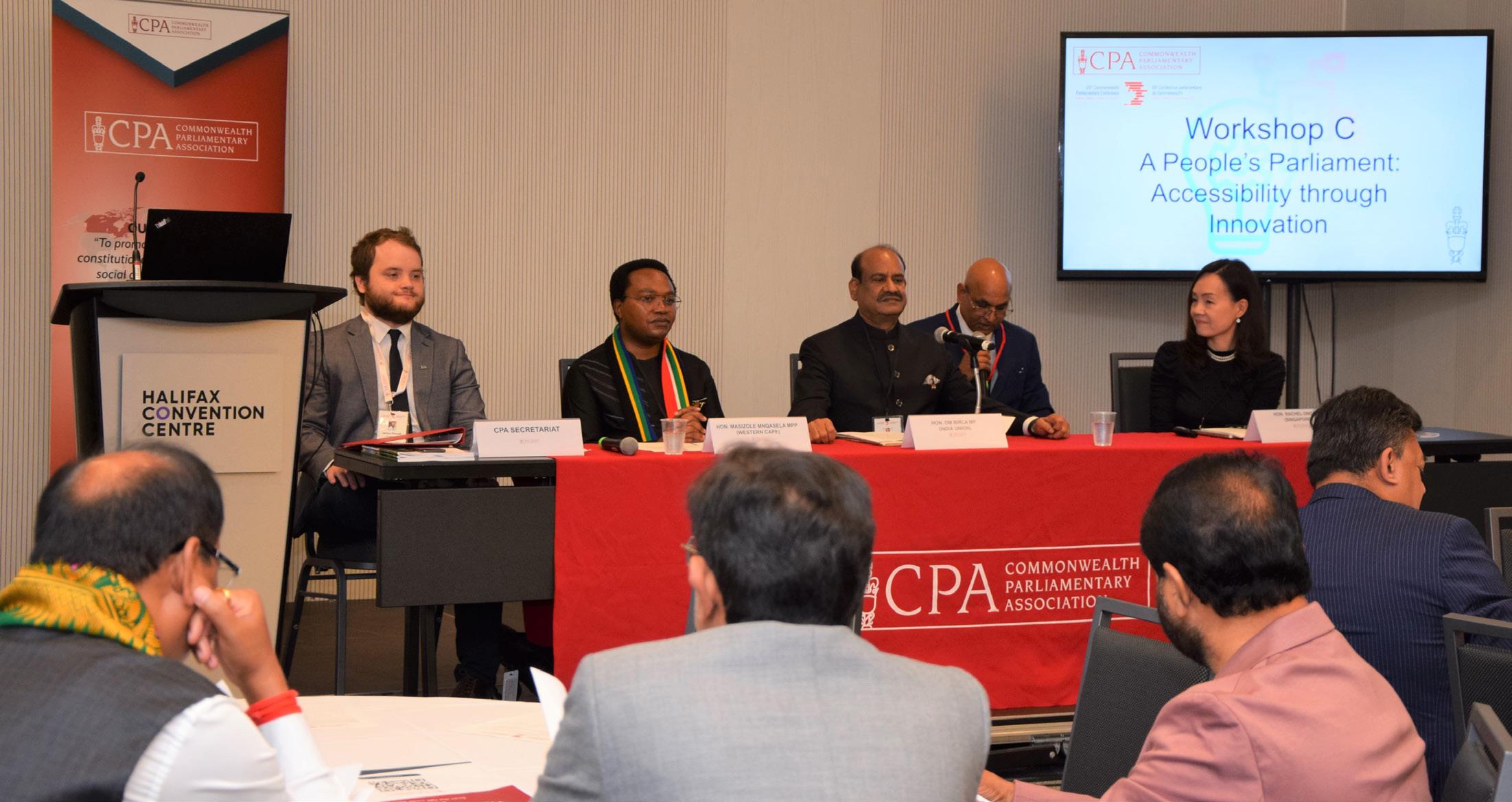
224 | The Parliamentarian | 2022: Issue Three | 100 years of publishing
INCLUSIVE, ACCESSIBLE, ACCOUNTABLE AND STRONG
Images
credit: Christian Diotte/Parliament of Canada and Jeffrey Hyland/CPA Headquarters
Nathi - to bring the different levels of government in Western Cape together to help educate the public about how to engage with the democratic process. Lastly, the Provincial Parliament has conceived a board game, Order!, as a fun way to educate the public about parliamentary procedure in the Western Cape.
Following, the panelists presentations, delegates were divided into teams and played several rounds of the Order! board game. Following this, a question-and-answer session commenced.
Hon. Jamell R. Robinson, MHA (Turks and Caicos) asked about how to improve the connectivity of people through technology and how to ensure that people can access these technologies.
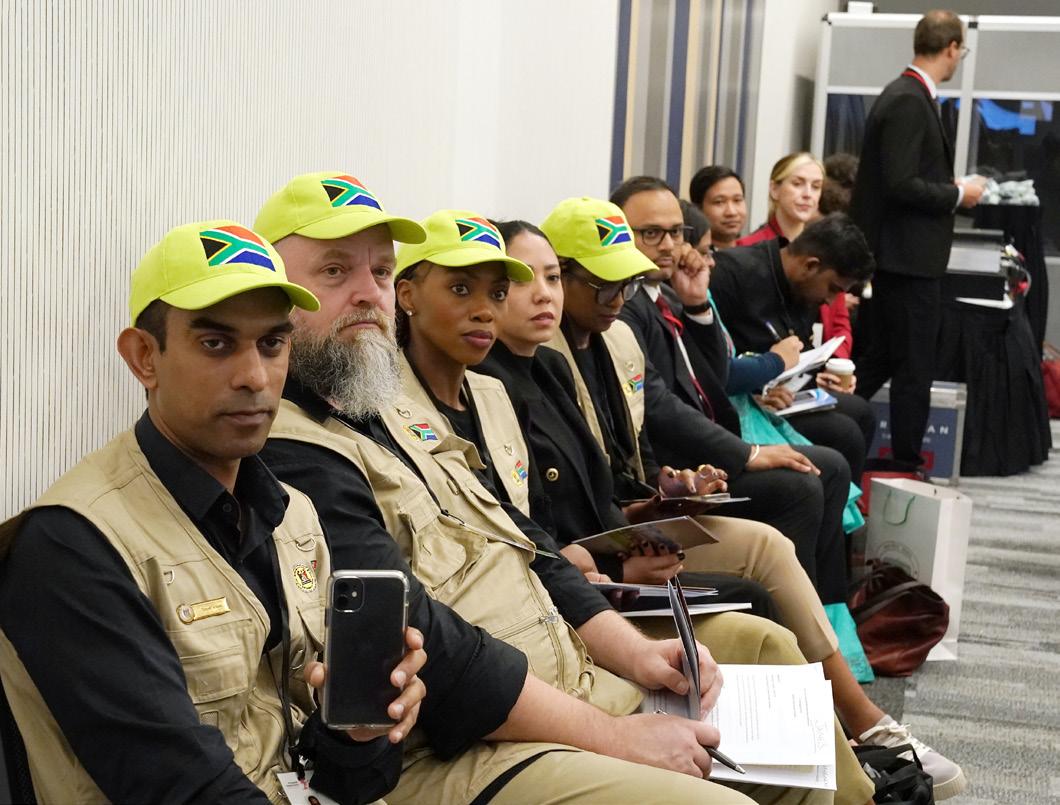
Hon. Willin A. Belliard, MHA (Turks and Caicos) recommended that India and Singapore implement a knowledge hub to share their achievements with technology with other Legislatures and asked about the challenges of implementing electronic voting.
In response, the Speaker of the Lok Sabha noted that India has around 910 million electors for its 543 Members of the Lok Sabha. India has extended its use of technology dramatically over the past decade, with notices and information on Bills sent to MPs electronically and an electronic voting system is available for votes in Parliament. He noted that the credibility of electronic voting machines was well established with the Indian public over the course of 17 national and more than 300 state legislative elections. This credibility is further enhanced by the existence of an independent election commission.
Hon. Brenda Shanahan, MP (Canada Federal) asked what the reaction to the Order! board game has been like among different age groups in Western Cape. Hon. Masizole Mnqasela advised that the game had proven popular with all ages.
Hon. Sarah Murphy, MS (Wales) raised concerns about the collection and use of data from private citizens through parliamentary mobile applications, asking what protections were in place for the data collected from users of such applications. Hon. Masizole Mnqasela commented that it was necessary to collect data from such applications, but crucial that this should not be abused. He noted that South Africa has legislative protections for information collected, with breaches of those protections punishable by law.
INCLUSIVE,
ACCOUNTABLE AND STRONG PARLIAMENTS
Hon. Nontembeko Nothemba Boyce, MPL, Speaker of the Provincial Parliament of KwaZulu-Natal stated that persistent inequality among communities creates barriers to accessibility. The CPA Africa Region has called for greater ease of connectivity. She asked how do we enact laws to make connectivity universal and the price of connectivity more affordable? Hon. Masizole Mnqasela suggested that standards must be made universal within the CPA and the Commonwealth. If people must choose between data and bread, it is a problematic situation. The Speaker of the Lok Sabha commented that India has 600,000 villages, with two thirds connected via optical fibre. The goal is to have 100% connected by 2030.

Hon. Alhagie S. Darbo, MP (Gambia) asked how the Members of Parliament in Singapore manage the time and cost of their community outreach initiatives. Hon. Rachel Ong told a story about a constituent who she met on a house visit who initially disliked her but had gone on to become a supporter and volunteer after they bonded over the course of their interactions. She stated that constituents are looking to see whether you hold yourself accountable as their representative. The community outreach is indispensable as it allows constituents to see one’s energy and passion for representing them.
Shri Anubhav Mohanty, MP (India Union) urged action on developing a single platform for sharing innovations between jurisdictions.
Rt Hon. Lord Foulkes of Cumnock (United Kingdom) asked whether Members found that being elected via first-past-the-post versus by party list influenced how accountable they felt to their electors. Hon. Masizole Mnqasela stated that Members must serve with respect and dignity irrespective of how they are elected but noted that there are party forces at play with party lists and the Members in that system must take care not to hide behind the lists. He opined that South Africa may move to a mixed system to account for the need to represent constituencies.
Hon. Noxolo Phoebe Abraham, MP (South Africa) asked about the powers given to local spheres during the pandemic and whether that held promise for improving accessibility. Hon. Masizole Mnqasela stated that the Western Cape’s localised response included the use of focus groups and ensuring that local people knew about different aspects of the COVID-19 response through publicity and information campaigns.
The recommendation at the workshop was endorsed as follows:
• Parliaments should remain open and accessible institutions to all members of the public that they represent and should, where possible and appropriate, explore modern and innovative approaches to meeting this requirement.
The Parliamentarian | 2022: Issue Three | 100 years of publishing | 225
ACCESSIBLE,
CPC WORKSHOP D: PROFESSIONAL DEVELOPMENT
FOR PARLIAMENTARIANS – OPPORTUNITIES AND CHALLENGES FOR SMALL PARLIAMENTS
CPA SMALL BRANCHES TOPIC
Panel Chair: Hon. Barbara Webster-Bourne, Speaker of the Anguilla House of Assembly
Discussion Leaders:
• Hon. Jonathan O’Dea, MP, Speaker of the New South Wales Legislative Assembly

• Ms Inna Popova, Director, Professional and Corporate Education at McGill University’s School of Continuing Studies (Canada)
• Ms Alisha Todd, Director-General, ParlAmericas
• Ms Lydia Buchanan, Deputy Head of Programmes
– Bilateral Engagement, CPA Secretariat
Facilitator: Mr Matthew Salik (CPA Secretariat)
Rapporteurs: Ms Kim Langille and Ms Eleanor Royle (Nova Scotia Legislature)
This session explored the approach taken by Parliaments and other entities in providing professional development aimed primarily at elected representatives and focused mainly on small Parliaments. The importance of professional development in assisting both new and experienced Members of Parliament in performing their duties, and the challenges in introducing or implementing such programs were discussed. The approaches that have been taken, as well as lessons learned were shared.
Hon. Barbara Webster-Bourne, Speaker of the Anguilla House of Assembly noted that Parliamentarians need special expertise and that the development of special skills to fulfill their roles is important.
Hon. Jonathan O’Dea, MP, Speaker of the New South Wales Legislative Assembly stated that elected representatives are thrust into a very unique job, where they face a combative environment under intense scrutiny. Due to the busy nature of their jobs and cultural forces at play, Parliamentarians often don’t seek out professional development for themselves. He underscored that Parliamentarians need to be engaged and that having champions or influencers of any program to help build support from within and outside the organisation is vitally important; however, cultural change will take time.
Under his speakership, the Speaker’s Office has spearheaded the process of professional development for Members in his jurisdiction which has produced a program which was e-launched in May 2020.
He noted that it will be a challenge to embed the program within the different departments of Parliament. Cultural change will need to be continually driven to promote the program and encourage MPs, including Ministers, and parliamentary staff to participate. He shared that the current Premier has indicated that compliance and ethics-related aspects of the program will be compulsory.
Ms Inna Popova, Director, Professional and Corporate Education, McGill University shared that McGill has been developing professional development programs for Parliamentarians over the past 10 years. In 2012, the Parliamentary Management Program was introduced, aimed at parliamentary staff. Approximately five years ago, the Parliamentary Governance Program for Members of Parliament, aimed at CPA Small Branches and those from nonCommonwealth small jurisdictions, was introduced.
The programs are designed for busy adults, combine theory and practice and are offered fully online or blended with a oneweek residential course at McGill University. There have been over 500 graduates from these programs from over 50 countries. Research is shared with participants and feedback is incorporated into the programming. Ms Popova highlighted that McGill’s programs have been awarded recognition for their quality.
A retrospective study of the past 10 years was conducted in 2022. The survey received 100 responses from 34 countries and jurisdictions. The survey results indicated that 93% of participants shared their learning with colleagues; 85% applied their learning to their work in Parliament; 37% changed their positions in Parliament and 69% remained in contact with other participants.
Ms Lydia Buchanan, Deputy Head of Programmes – Bilateral Engagement at the Commonwealth Parliamentary Association acknowledged that small Parliaments face challenges such as lack of funding, staffing and resources, multiple responsibilities and high election turn over, which can impede their ability to introduce professional development programs. She suggested partnering with academic institutions, establishing twinning programs or using your own networks to reach out to adjacent Parliaments as ways to address the challenges. As Members in small Parliaments have many responsibilities, they need to be aware of conflicts and acknowledge them. Training related to the government code of conduct is important to avoid conflicts of interest.
She noted that small Parliaments can experience high election turnover. Therefore, new Parliamentarians need training as soon as possible. Encouraging your Parliament to hold a CPA Postelection Seminars is a great starting point as the CPA Headquarters Secretariat has been delivering these programmes for over thirty years across the Commonwealth.
The CPA Parliamentary Academy was launched in May 2021, which offers 10 online courses that are continually updated,
226 | The Parliamentarian | 2022: Issue Three | 100 years of publishing
INCLUSIVE, ACCESSIBLE, ACCOUNTABLE AND STRONG PARLIAMENTS
with more courses set to launch. All CPA Members have free access to the offerings. Ms Buchanan also referenced the CPA Recommended Benchmarks for Democratic Legislatures and their value in assessing Parliament and ensuring learning appropriate for their needs. She underscored the importance of having knowledgeable staff and that parliamentary staff should be included in professional development programs, not just Parliamentarians and that training opportunities should be ongoing.
Ms Alisha Todd, DirectorGeneral, ParlAmericas informed delegates that ParlAmericas works to improve democratic processes in the Inter-American System. It focuses on key common issues raised by parliamentary institutions and their Members and shares best practices for the betterment of the people of the Americas.
She acknowledged that resource and time constraints are an issue, particularly for small Parliaments. Their programming is broken down into key steps, which allows for ‘small bites’ to be taken so as not to overwhelm Members. They engage directly with Parliamentarians to create the most effective programs. She also underscored that it is essential to have Parliamentarians who value professional development to promote the training.
She shared that ParlAmericas collaborates with other organisations, such as the CPA, to coordinate and streamline services which is beneficial for Members, who have little time.
A breakout session was held where groups discussed and reported on the following questions:
• What are the key challenges facing small Parliaments to provide adequate professional development for their Members and parliamentary staff?
• What innovative approaches could be taken to overcome such challenges, and how can the CPA, and other organisations assist?

• What type or form of professional development is most sought out by Parliamentarians?
• What support could/should be provided by larger, wellresourced Parliaments towards small Parliaments, if any?
Hon. Lesa Semmler, MLA (Northwest Territories) reported that her group felt time, money and human resources were the key challenges faced by small Parliaments in providing professional development to Members and parliamentary staff. She indicated that more publications to all Members and more training for practice and procedures for new Members would be beneficial, as well as specific training for Presiding Officers and Speakers.
INCLUSIVE, ACCESSIBLE, ACCOUNTABLE AND STRONG PARLIAMENTS
Training specific to legal language would also be of great assistance to help with legislative drafting.
Ms Lydia Buchanan responded that the CPA Secretariat is preparing a course specific to Speakers for the CPA Parliamentary Academy and that a legal language course is being looked into as well.
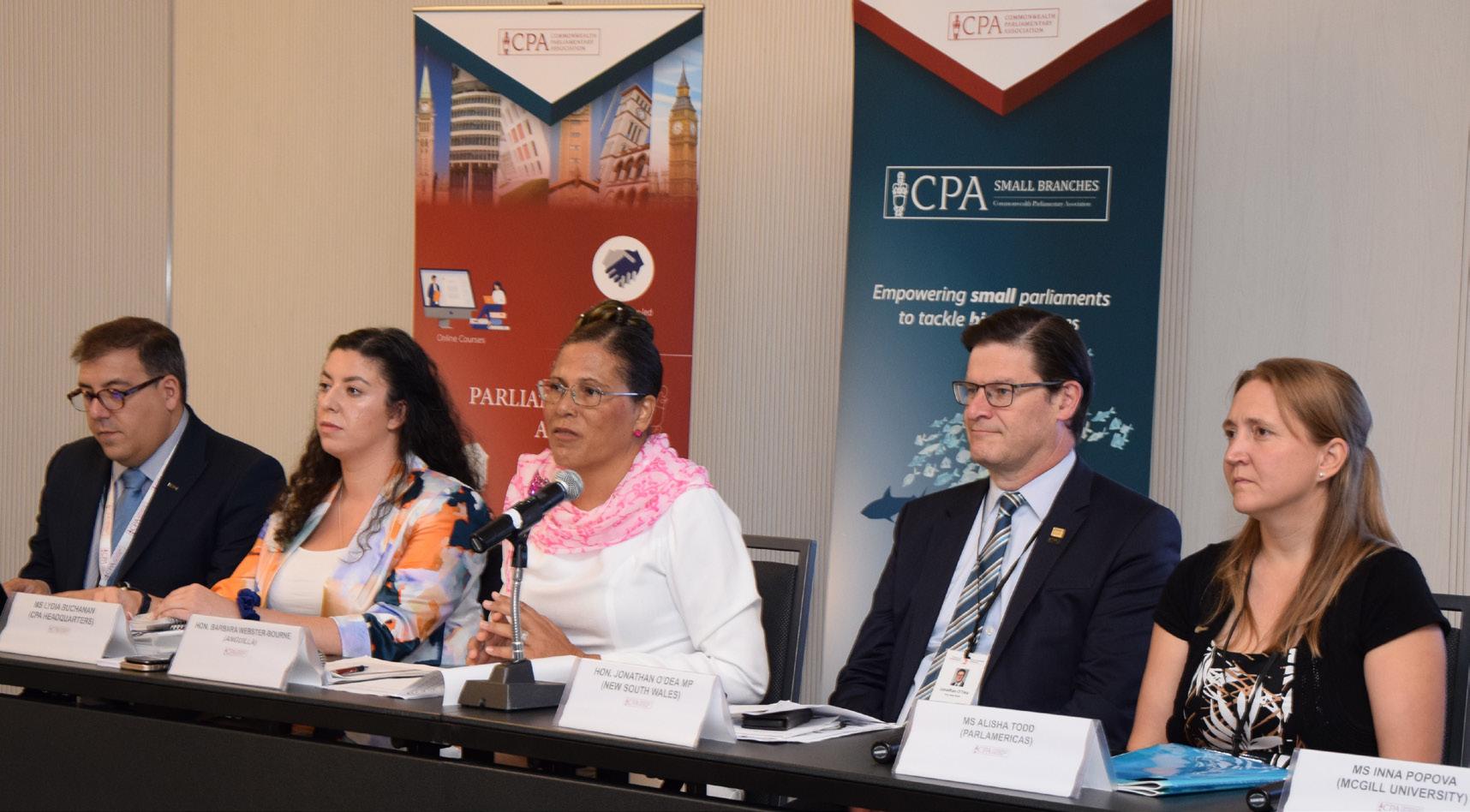
Hon. Valerie Woods, Speaker of the National Assembly of Belize reported that her group agreed that human resources and funding are challenges to providing professional development for small Parliaments and that training tailored for Speakers would be beneficial. Also, orientation at the start of a Parliament session needs to be more robust. It was suggested that ‘in person’ training is preferred over online training. Twinning was also noted as being helpful to share experiences. She suggested that it would be beneficial to have a Member in each CPA Branch in charge of professional development for Parliament. She advised that her group felt that training on the Committee system, public accounts system and general procedures is the most sought after by Parliamentarians. She noted that small Parliaments don’t necessarily have their own legal counsel and assistance in this regard would be helpful.
Deputy Adrian Gabriel (Guernsey) stated that his group agreed that Members have a number of responsibilities in Parliament, on Committee and to constituents, which make it challenging to find time for professional development, and that a CPA time management course would be helpful. Also, instead of Members having to opt in to join the CPA, an opt out process would promote access to CPA information. His group felt that training related to the rules and procedures, especially for new Members was most important. It was suggested that creating a network of champions by region would be of assistance to small Parliaments.
Ms Lydia Buchanan advised that Members need to sign up to join the CPA Parliamentary Academy. It is not possible for the CPA to automatically sign them up.
Hon. Mark Turner, MLA (Northern Territory) reported that his group also agreed that time management and resources pose the biggest challenges to accessing professional development.
The Parliamentarian | 2022: Issue Three | 100 years of publishing | 227
Images credit: Christian Diotte/Parliament of Canada and Jeffrey Hyland/CPA Headquarters
STRONG PARLIAMENTS
He added that mental health first aid training is important, as well. He shared that he has done this type of training and found it was excellent and recommends it to others. He suggested that it would be helpful to have someone in a non-political position to assist new Members and that a peer support and mentorship network would be beneficial. Systems of Parliament, finance, governance, legislative drafting and scrutiny were noted as being of most interest to Parliamentarians in his group relative to training.
In reply, Ms Lydia Buchanan shared that the CPA Secretariat does have a mental health and wellbeing toolkit for MPs and parliamentary staff, and other resources related to time management, life/work balance and communications. The CPA is also hoping to start an Alumni network with former Parliamentarians to provide mentoring on a one-to-one basis.
Hon. Jonathan O’Dea offered that having a former Clerk available on retainer to provide advice and an independent ethics advisory service would be useful.
Hon. Marisa Dalrymple-Philibert, MP, Speaker of the House of Representatives, Parliament of Jamaica indicated that her group endorsed the comments of earlier delegates. She felt that there had been a lot of discussion on this topic over the years but that little has happened and that now is the time for action. She noted that training for the Speaker and Deputy Speaker is of particular importance, as well as legal language training. She suggested that it would be helpful if the CPA could tailor information to reflect the diverse nature of Parliaments. She shared that many new MPs have taken the McGill University training and that the CPA Members Handbook is helpful, as well.
Hon. Ale Vena Ale, MP (Samoa) shared that his group felt that the biggest challenge to providing adequate professional development to Members and parliamentary staff is funding and that assistance is needed from the CPA. It was noted that the culture within Parliament is very important, and that MPs should respect the Speaker and one another.
Hon. Akierra Missick, MP (Turks and Caicos) noted that Parliamentary Clerks are a great resource. She suggested that all new Members need a two-week introduction to Parliament course immediately after they are elected, which could be organised by Clerks with the CPA, and a refresher course after two terms. She expressed support for mentorship and twinning with other regions.
Hon. Jonathan O’Dea reiterated the importance of political leaders supporting the training in order to gain support across the Parliament.
Hon. Juan Watterson, SHK, Speaker of the House of Keys, Isle of Man also added that Parliaments need to be proponents of the CPA and to support its activities.
The Panel Chair, Hon. Barbara Webster-Bourne, Speaker of the Anguilla House of Assembly, then welcomed further questions from delegates.

Hon. Chandra Prakash Joshi, MLA (Rajasthan) expressed his view that Parliaments need a well-defined constitution to be effective and that the minimum days that Parliament is to take place should be prescribed. This will assist in making Parliament more accountable. Without this, professional development is of little use.
Ms Lydia Buchanan offered that the CPA Secretariat can come to different jurisdictions that may be experiencing difficulties and conduct a CPA benchmark assessment.
Hon. Donovan St. Ledger Williams, MP (Jamaica) inquired how the CPA can assist with the development of a post-election toolkit and other resources.

Ms Lydia Buchanan responded that having a working group formed before an election is helpful and stressed that Parliaments have a role to play in developing training. She noted that CPA Branches can write to the CPA Secretariat with any questions and, if a Parliament conducts a benchmark assessment with the CPA Secretariat, then a new Member’s handbook can be created that is tailored for that jurisdiction.
The recommendation at the workshop was endorsed as follows:
• A core responsibility of all Parliaments (both large and small) should include the provision or facilitation of professional development for Parliamentarians. Such provision should be innovative and adaptive, and tailored to the needs of new and or more experienced Members.
228 | The Parliamentarian | 2022: Issue Three | 100 years of publishing
INCLUSIVE, ACCESSIBLE, ACCOUNTABLE AND
“ The importance of professional development in assisting both new and experienced Members of Parliament in performing their duties, and the challenges in introducing or implementing such programs were discussed.”
Images credit: Christian Diotte/Parliament of Canada and Jeffrey Hyland/CPA Headquarters
CPC WORKSHOP E: ACCESS TO ASSISTIVE TECHNOLOGIES: IMPLEMENTATION OF STANDARDS ACROSS COMMONWEALTH PARLIAMENTS

Panel Chair: Hon. Paul Maynard, MP (United Kingdom)
Discussion Leaders:
• Dave Dame, Director of Accessibility, Microsoft
• Hon. Carla Qualtrough, MP, Minister of Employment, Workforce Development and Disability Inclusion (Canada Federal)
• Hon. Romina Alam, MNA (Pakistan)
• Senator Hon. Ras Adiba Mohd Radzi (Malaysia)
Facilitator: Ms Lydia Buchanan (CPA Secretariat)
Rapporteurs: Ms Melissa Kosik and Ms Kim Leadley (Nova Scotia Legislature)
This session explored the challenges that persons with disabilities face when interacting with Parliament, especially from the experiences of Members of Parliament. It included a presentation covering the latest state-of-the-art technologies to some of the most accessible technologies from an assistive technology expert. It also included a discussion of what resources are available and what are needed for Parliamentarians to implement assistive technologies without duplicating effort.
Important progress has been made in the decade since the adoption of the United Nations Convention on the Rights of Persons with Disabilities (CRPD), however this has not been enough. Despite constituting approximately 15% of the world’s population, persons with disabilities continue to be disproportionately represented in governance and at all levels of decision-making. Persons with disabilities historically and globally have been the subject of cultural and legal hindrances which have limited their ability over generations to reach their full potential. Today, persons with disabilities participate in terms of real numbers in a minimal way in the political/parliamentary process despite their representation in populations globally.
Inclusive and representative Parliaments are crucial to ensuring a healthy and fair democracy. Legislative and policy work can have a tremendous impact on the lives of persons with disabilities, both articulating the rights that persons with disabilities are entitled to and protecting them from discrimination in political, economic and social spheres. Parliament has a particular responsibility to serve as a role model for society and to lead the way in creating a disability- responsive government at the national and local levels.
Dave Dame (Director of Accessibility, Microsoft) presented the cutting edge of assistive technologies available on the market
currently. He began his presentation by describing his career with Microsoft, and how he struggled to contribute at his workplace due to accessibility issues when he was new to the company. He expressed how individuals who need accessible solutions to fully participate are often in positions of limited power and hesitate to ask for what they need. Simple things such as moving binders and boxes of files and other physical tasks commonly found around the office that would be considered mundane pose great challenges for those with physical disabilities. This is due to the environmental mismatch, rather than a reflection of the true capabilities of the individuals that face the challenges.
The pandemic created a unique situation where everyone was faced with a reality of not being able to move about the city at will, which imposed a state of disability on us all. This resulted in wider adoption of technologies and strategies for work, including the shift from paper to digital, and the adoption of remote working and meetings. These changes created more opportunities for people with physical disabilities to participate more fully. Parliaments can take advantage of this shift and enable the participation of more members of society than previously possible through the adoption of accessible technologies. Parliamentary proceedings should be accessible through remote methods, and hybrid meetings should continue.
Some technologies highlighted included input and output devices with customisability for each unique need. The adoption of 3D printing to allow individuals to have ergonomic grips and other components made specifically for the shape of their hands, for example. He emphasised that aesthetics is important to everyone and should be a major part of the design process. It was pointed out how usual accessibility solutions are clunky and often not visually pleasing. The teams that work on the accessibility products need to be meeting with people who identify as having disabilities to allow the community to direct the research and development towards technologies that are incredibly useful. His presentation concluded with a reminder that everyone will face physical disability at some point in their life, whether from injury or age, so ensuring accessibility for everyone is important.
Hon. Carla Qualtrough, MP, Minister of Employment, Workforce Development and Disability Inclusion (Canada Federal) discussed the challenges she faced as a new Member of Parliament in the Canadian House of Commons. She implored delegates to take a proactive approach to adapting Parliaments for accessibility. Waiting for an individual to come forward and ask for solutions to be implemented is a slow and painful way to make change and often only impacts that one individual. Accessibility measures that can be applied broadly will improve the life of all citizens, not just those that need the changes.
The Parliamentarian | 2022: Issue Three | 100 years of publishing | 229 INCLUSIVE, ACCESSIBLE, ACCOUNTABLE AND STRONG PARLIAMENTS
There are many small facets of being a politician that those with working vision take for granted, such as the ability to read a name tag, or recognise a face. She described the stacks of massive binders with documents in 70-point font that were provided to her to participate in cabinet proceedings, and how this wasn’t a good solution to her problem. She emphasised the bravery needed to admit the materials provided were not appropriate and could not be used. Eventually she was allowed a laptop to be able to modify the font size of her documents while allowing ease of manipulation. Now many able-boded MPs choose to use a laptop instead of manipulating physical documents. This gives an example where a change to help with accessibility offers an attractive alternative for all.
In Canada, the Accessible Canada Act was implemented. The biggest challenge is IT and internet technologies. Canada is a large country, and it is difficult for those in remote regions to

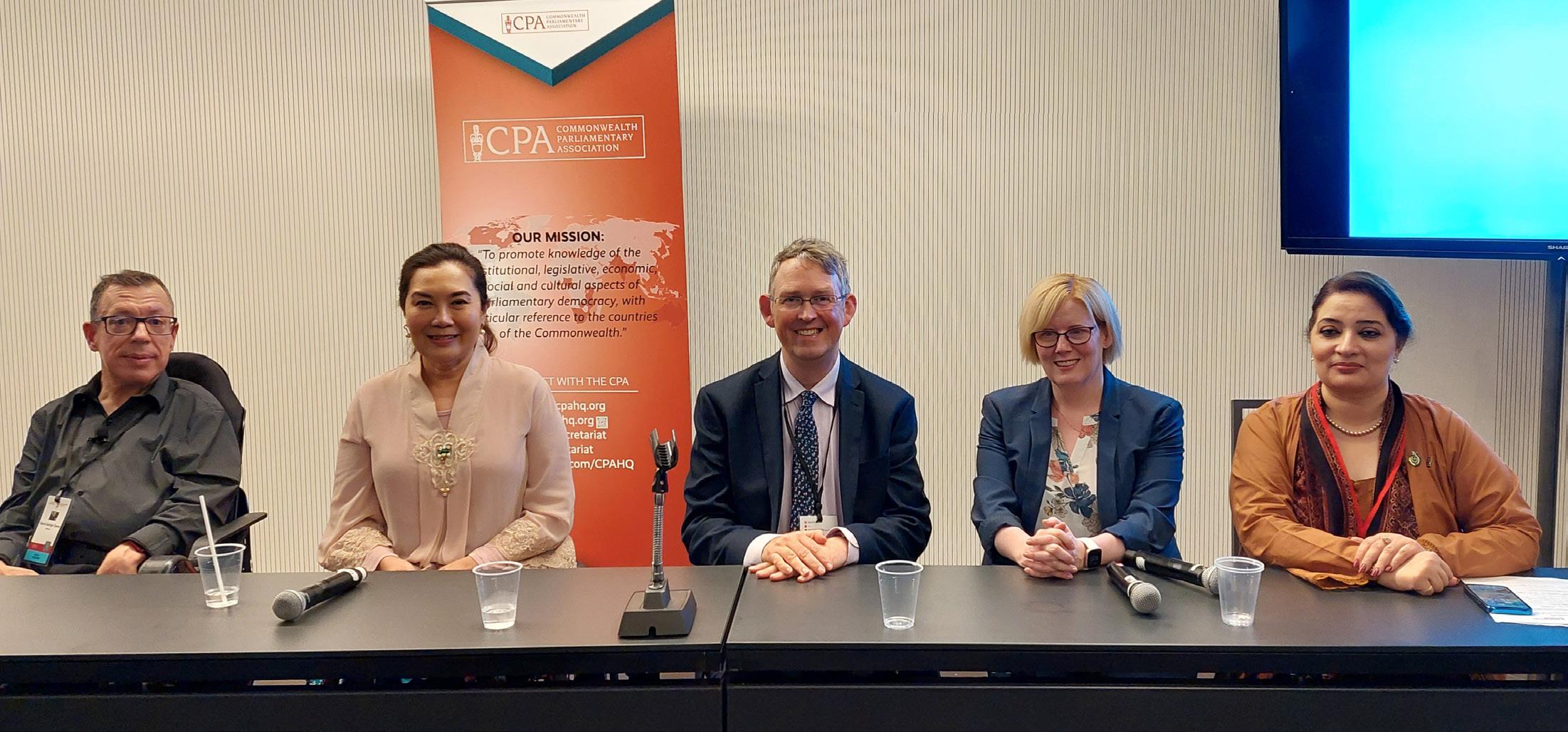
get adequate internet access. In addition to service, the ability for individuals to pay for the accessible technologies is also a major concern. Not everyone has access to a computer, tablet or smartphone, so we cannot rely simply on the technology to ensure access for everyone. The divide between the ‘haves’ and the ‘have nots’ widens when accessibility comes into play because of the cost of technology.
Hon. Romina Alam, MP (Pakistan) highlighted the changes they have made at the Parliament of Pakistan for accessibility. In order to achieve good governance and good practice, all Parliaments should be accessible to all of society, including those with disabilities. In Pakistan, all parliamentary buildings are properly accessible by ramp, and all washroom facilities are accessible. The website has the option to change colour schemes and font sizes. All parliamentary proceedings are recorded and broadcast. Public outreach to engage with the relevant groups to better understand their needs before implementing changes is an important aspect to their successes. The goal of all Parliamentarians should be to ‘not leave anyone behind’.
Senator Hon. Ras Adiba Mohd Radzi (Malaysia) spoke of her personal struggles after becoming disabled later in life. She was employed as a news anchor prior to a life-altering car crash. Her employer refused to allow her to continue to work, perceiving her as disabled because she was now using a wheelchair for mobility. The years of poverty and struggle to find work gave her an understanding of the cruelty of society. Accessing technology was out of the question for her due to the cost. She implored that accessibility is a fundamental right and considering the aging population it will likely affect everyone. She also emphasised the need to collect accurate data about the need for these technologies in society in order to help push for their implementation.
The Q&A that followed included a discussion about improving access to technology, how to change the way that society frames
230 | The Parliamentarian | 2022: Issue Three | 100 years of publishing
INCLUSIVE, ACCESSIBLE, ACCOUNTABLE AND STRONG PARLIAMENTS
“ Despite constituting approximately 15% of the world’s population, persons with disabilities continue to be disproportionately represented in governance and at all levels of decisionmaking. Persons with disabilities historically and globally have been the subject of cultural and legal hindrances which have limited their ability over generations to reach their full potential.”
Images credit: Christian Diotte/Parliament of Canada and Jeffrey Hyland/CPA Headquarters
and discusses disability and a discussion about workplace quotas for inclusion.

Senator Hon. Paul Richards (Trinidad and Tobago) asked the panel about how to assess the inadequate access to assistive technologies. It was emphasised that there was the need for good data to make good decisions. If the right details are not captured about the need for assistive technologies, then it is hard to make the case to spend the money developing them. Additionally, the larger benefit to society from encouraging assistive technologies should outweigh the perceived costliness of them. One example that was discussed was the use of closed captioning, which is often used by people who do not have hearing issues.
Hon. Iqra Khalid, MP (Canada Federal) asked the panel to discuss the definition of ‘disability’ and about the strategies for
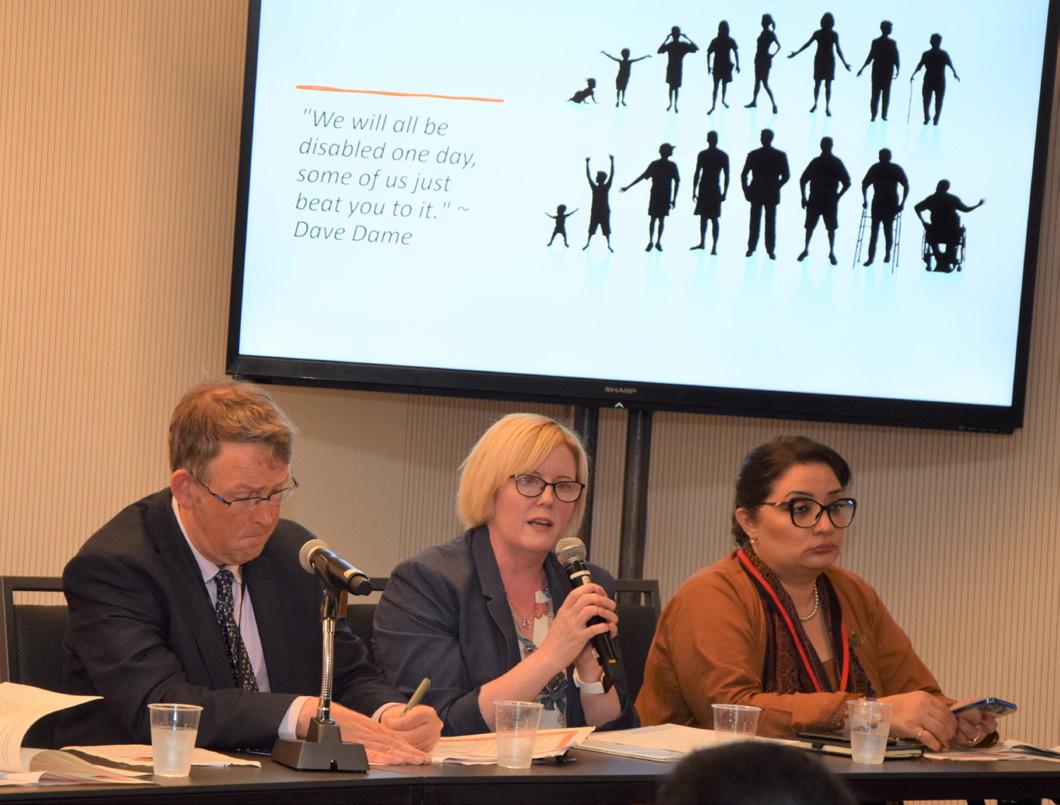
INCLUSIVE, ACCESSIBLE, ACCOUNTABLE AND STRONG PARLIAMENTS
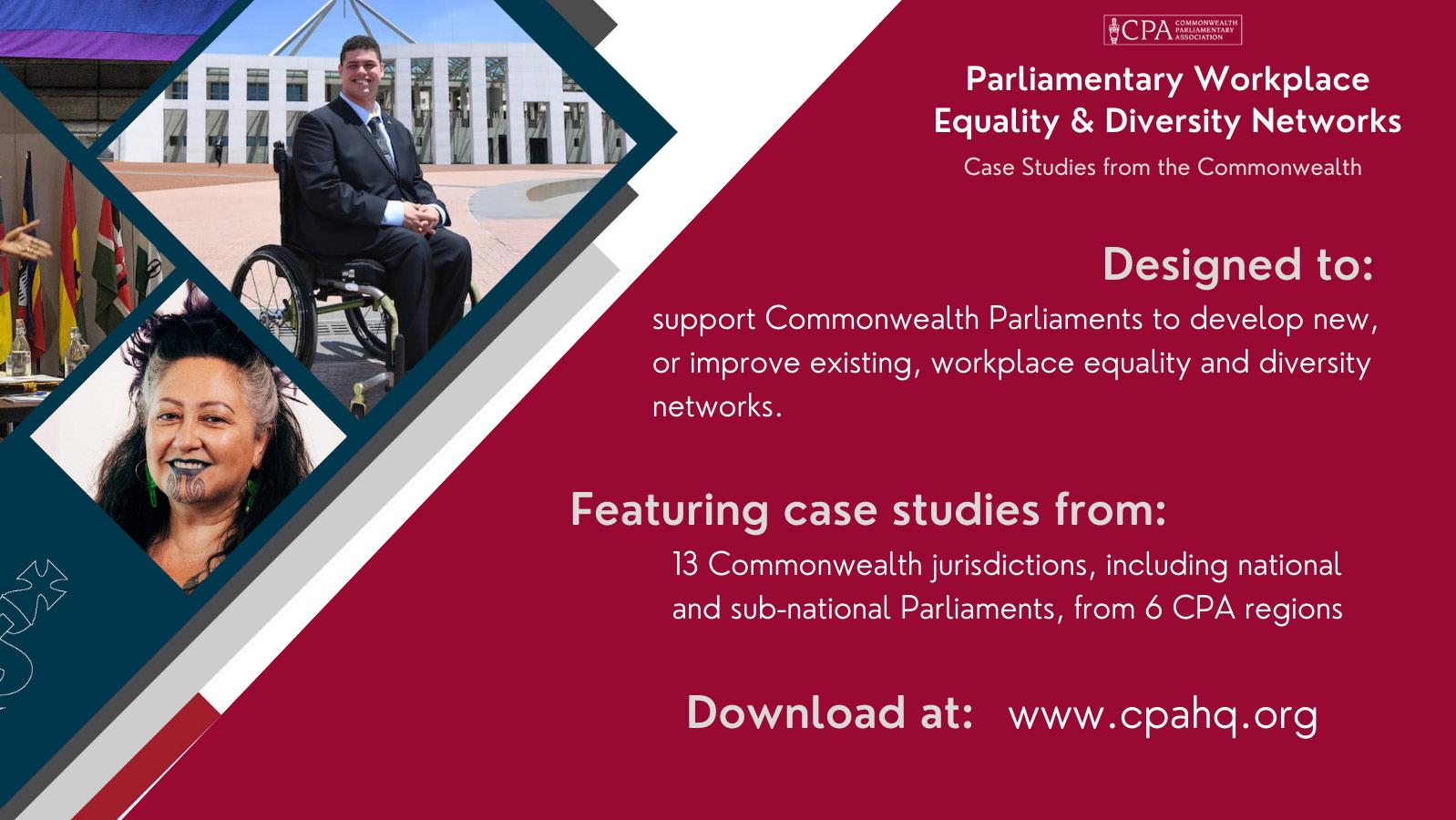
adapting Legislatures and laws around a fixed definition. Disability could be defined as a mismatch with one’s environment or lacking access to that which others take for granted. It is often a personal choice to define oneself as disabled or not. Using disability as a criterion for services or programs creates a situation of restrictive eligibility. The label of disabled is often applied by the more-abled person onto the less-abled.
Hon. Matthew Mason-Cox, MLC, President of the New South Wales Legislative Council asked whether the panel recommended mandatory targets or quotas for workplaces. The panel suggested that targets are an important tool for change, however there is slow implementation. The majority of human rights complaints in Canada are regarding employment discrimination on the grounds of disability, so there is room for improvement. Also, the discussion about labour shortages pointed out the many individuals that want to participate in the economy but are currently unable due to disability. Finally, the topic of a minimum wage being an inadequate solution for hiring those with disabilities, and that meaningful positions should be available as well. Leadership positions should also include the disabled in order to help inform meaningful change. Acceptance in the public follows the government mandates.
Other comments from delegates included a discussion of disability not being considered a negative but a gift of a unique perspective, and to consider that the label of disabled can be hurtful.
The recommendation at the workshop was endorsed as follows:
• Parliaments must adopt assistive technologies to enhance the accessibility of their institutions to persons with disabilities.
The Parliamentarian | 2022: Issue Three | 100 years of publishing | 231
CPC WORKSHOP F: BUILDING GENDER SENSITIVE PARLIAMENTS
Panel Chair: Hon. Myrna Driedger, MLA, CWP President and Speaker of the Manitoba Legislative Assembly
Discussion Leaders:
• Hon. Nontembeko Nothemba Boyce, MPL, Speaker of the KwaZulu-Natal Legislature
• Hon. Julie Green, MLA (Northwest Territories)
• Ms Sarah Childs, Professor of Politics and Gender at the University of Edinburgh & author of CPA’s Gender Sensitising Parliaments Guidelines: Standards and a Checklist for Parliamentary Change (2020)
Facilitator: Bénite Dibateza (CPA Secretariat)
Rapporteurs: Ms Anne Van Iderstine and Mr Scott Burke (Nova Scotia Legislature)
The responsibility of protecting and securing women’s rights and gender equality in Parliaments has long rested primarily on women
Members of Parliaments. This is shifting to focus responsibility on Parliaments, which represent the interests of all citizens. The InterParliamentary Union defines a gender sensitive Parliament as a political institution responding to the needs and interests of all genders in terms of its structures, operations, methods and work. It removes barriers to women’s full participation and offers a positive example or model to society at large.
Commonwealth Parliaments must recognise the detrimental role of gender privilege and disenfranchisement, actively champion gender equality and acknowledge that issues such as parliamentary cultures, governing structures, facilities and institutional resources have the capacity to limit equal participation of women and other underrepresented genders. These obstacles hinder a Parliament’s ability to be an effective democratic institution. The Commonwealth Women Parliamentarians (CWP)

2020 Gender Sensitising Parliaments Guidelines: Standards and a Checklist for Parliamentary Change highlight the importance of gender sensitising across all Commonwealth Parliaments.
This workshop looked at ways to help Parliamentarians recognise the importance of gender sensitivity. The session allowed delegates to highlight appropriate actions, to share experiences and practices in their pursuit of creating gender sensitive institutions.
The Panel Chair and CWP President, Hon. Myrna Driedger, MLA, Speaker of the Manitoba Legislative Assembly noted some progress toward family-friendly Parliaments through improved accessibility, hours and hybrid sessions, however harmful parliamentary cultures of bullying and harassment continue to affect the recruitment of female staff members and electoral candidates.
Key elements for progress are ensuring that women want to participate and Parliaments committing to gender-sensitive reviews.
Hon. Julie Green, MLA (Northwest Territories) described challenges in her jurisdiction. The Northwest Territories covers over one million square kilometers with a population of 45,000. Most constituents are indigenous; 11 official languages are spoken. Before 2019, no more than three out of the 19 elected MLAs were women.
A motion on International Women’s Day 2018 sought to increase women’s participation in the Legislative Assembly. Led by the Clerk and former Speaker, a discussion paper was issued and a Special Committee created to increase representation of women. The Committee found that while women were interested in political participation, they could not see how they could run for office. Most preferred that root causes preventing female participation, such as income, family obligations and campaign costs, be addressed rather than creating a quota system.
An interim Committee report recommended: covering childcare costs for female candidates and MLAs; increasing the number of campaign schools for women; adding changing tables and breast-feeding space at the Assembly; and establishing MLA parental leave. The final report set targets of 20% female representation by 2023 and 30% by 2027, with a plebiscite on a quota system if targets were not met in the 2019 election. The report recommended an election expense rebate for childcare and recognised the necessity of leadership training, mentorship and networking. No plebiscite was needed; nine women were elected in 2019, six of whom were indigenous. A 2021 by-election increased female representation to 52%.
The challenge now is to retain these gains and maintain female participation by personal involvement of MLAs and by encouraging colleagues. Hon. Julie Green concluded that visibility of elected women, including at local levels, demonstrates that political involvement is possible; “If you can see it, you can be it!”
Hon. Myrna Driedger agreed on the importance of setting targets. She noted the impact of formalizing and sustaining
232 | The Parliamentarian | 2022: Issue Three | 100 years of publishing
GENDER TOPIC INCLUSIVE, ACCESSIBLE, ACCOUNTABLE AND STRONG PARLIAMENTS
“
As places of both democracy and work, Parliaments must empower gendersensitivity, encompassing individual behaviours, interactions and the wider environment. The CWP Guidelines offer standards and a checklist to help Parliaments evaluate their institutions, policies and processes.”
mentorship as women seen in public roles are visually mentors for younger women. Public monuments enhance visibility. A Trailblazers’ Wall in the Manitoba Legislature celebrates the 100th anniversary of female voting rights in the province with portraits of the first 12 female MLAs and six other women who first held traditionally male offices.
Hon. Nontembeko Nothemba Boyce, MPL, Speaker of the KwaZulu-Natal Legislature deplored low female representation in sub-Saharan Africa. In contrast, KwaZulu-Natal has 39 female Members out of 80, is led by their first woman Premier since 1994, and over 50% of their Committees are chaired by women. The 1954 South African Women’s Charter was created to fight for women’s civil and property rights, equal wages, the right of women to vote and run for office, and to strive for peace throughout the land. Women in leadership positions are bringers of peace and progress; female participation in government is not only a human right, but central to development. Unpaid work to maintain children and households and persistent social/cultural norms remain barriers for women who want to participate in politics.

The Speaker of the KwaZulu-Natal Legislature reviewed the Guidelines’ four dimensions from a local context. Their proportional representation system promotes equal participation without use of quotas. Improvements to infrastructure are supported through women’s parliamentary organisations. The women’s caucus holds seminars with stakeholders, building capacity for female empowerment as full participants in legislative processes. This year, the caucus focused on a gendered budget and auditing framework. A Standing Committee on the quality of life and status of women also promotes diversity.
Women in Parliament often serve first at the local government level. Discussions with women who lead families and farms helps them to be fully aware of challenges faced by women in Parliament. Dialogue is needed to address gender-based violence, cultural stereotypes and practices such as forced marriages which remain in some areas. Women in leadership are responsible to encourage others of all races and ages, extending efforts to vulnerable LGBTQIA+ groups.
INCLUSIVE, ACCESSIBLE, ACCOUNTABLE AND STRONG PARLIAMENTS
Hon. Nontembeko Nothemba Boyce emphasised that men also have a role in bringing about change and encouraging participation, particularly among women of child-bearing age. The environment must be conducive to success; Standing Orders should be changed to prevent gender discrimination. She called on male and female delegates to prepare women for public office. To quote Charlotte Makgomo Maxeke, “This work is not about ourselves. … If you can rise, bring someone with you.”
The Panel Chair commented that unconscious bias is a significant element in challenges faced by female legislators.
Ms Sarah Childs, Professor of Politics and Gender at the University of Edinburgh and author of the CWP’s Gender Sensitizing Parliaments Guidelines, began her remarks with a statement from its foreword, written by Hon. Shandana Gulzar Khan, MNA (Pakistan) and outgoing CWP Chairperson, “Parliaments must work to become gender sensitive institutions… they must actively champion gender equality for all.” Professor Childs, together with Dr Sonia Palmieri from the Australian National University, identified in 2021 an international norm and imperative, “A gender sensitive Parliament (GSP) values and prioritises gender equality as a social, economic and political objective and transforms a Parliament’s institutional culture, processes and practices, and outputs towards these objectives.”
Parliaments have an obligation to translate the abstract into working principles, transforming goals into processes and best practices. While the four dimensions set out in the Guidelines work together, they are discrete and may be instituted separately. Parliaments should determine their priorities and may focus on only one or two. A flexible approach of the formal and informal is best; neither cultures nor values should take precedence. Administrative aspects may conflict with historic parliamentary practices.
Professor Childs spoke of the four dimensions set out by the Guidelines: equality of participation within Parliament; parliamentary infrastructure; parliamentary culture; and gender equality policy. As places of both democracy and work, Parliaments must empower gender-sensitivity, encompassing individual behaviours, interactions and the wider environment. Sustaining change may be difficult for Parliaments that attempt all four dimensions. The CWP Guidelines offer standards and a checklist to help Parliaments evaluate their institutions, policies and processes. Institutional leadership, organisations and roles should be evaluated to develop reforms that achieve gender sensitivity. Changes to data collection may improve analyses; standards are needed to guide improvements. Where lacking, invest in gender expertise.
The newly adopted CWP publication by Dr Jeanette Ashe (Douglas College and King’s College London), Gender Sensitising Parliaments: A Seven-Step Field Guide, offers steps to undertake an audit in accordance with the Guidelines. In conducting a review, Parliaments must consider and learn from both attempts and failures. There must be a commitment, with agreement on a shared
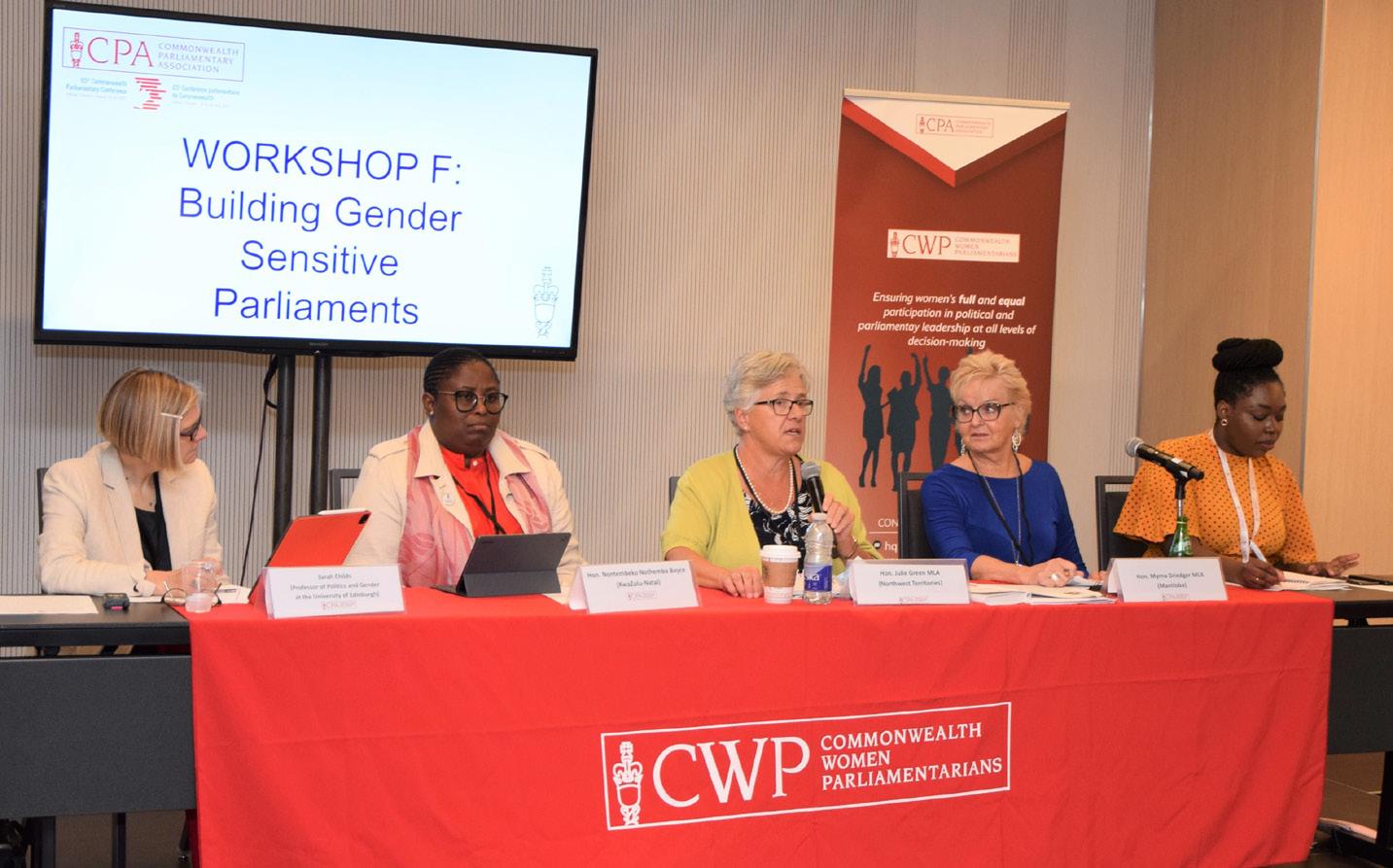
The Parliamentarian | 2022: Issue Three | 100 years of publishing | 233
Images
credit:
Christian Diotte/Parliament
of Canada and Jeffrey Hyland/CPA Headquarters
agenda of elements that can be mobilised; opposing efforts will undermine progress. When women come together with male allies, they can create change, directing resources to develop institutional leadership. To become gender sensitive, Parliaments need actors of change, agendas of change and processes of change.
In a spirited question and answer period, delegates spoke passionately about the need for institutional and individual encouragement of political participation by women. There was particular interest in mechanisms to increase the numbers of women, some in favour of quota systems and others focussed on mentorship. Advocacy by male Parliamentarians and decisionmakers came up frequently, as did equal representation within the wider CPA. Party/parliamentary efforts to encourage female leaders, monuments representing female politicians, plus physical accommodations and policies at Legislature buildings all help create environments conducive to gender-sensitive Parliaments.
Rt Hon. Dame Maria Miller, MP (United Kingdom) raised a CPA resolution to be presented the following day at the CPA General Assembly, that would require 33% women within the CPA Executive Committee. She asked delegates how best to effect passage and monitor progress. Hon. Nontembeko Nothemba Boyce suggested efforts be monitored through the CWP network with work resourced by the CPA Secretariat to create a cohort for discussion and participation. Hon. Myrna Driedger commented that women bring different ideas which allow for more balanced and robust policy decisions. Professor Childs added that sanctions can help maintain policies; parties could be required to meet targets or lose representation.
Hon. Dr Kanimozhi NVN Somu, MP (India Union) and Hon. Masizole Mnqasela, MPP, Speaker of the Western Cape Provincial Parliament supported a CPA quota, the latter proposing that for every male attending the annual Commonwealth Parliamentary Conference, a female delegate should attend with him. Dr Somu also mentioned the importance of gender-based budgets.
Hon. Dr Smt. Nimaben B. Acharya, MLA, Speaker of the Gujarat Legislative Assembly spoke in favour of the resolution and gender quotas for political parties. India requires 50% women at the municipal level. Women in Parliaments should be made an economic issue.
Hon. Vuyiswa Precious Caluza, MPL (KwaZulu-Natal) is from a party with a policy of 50% women for political involvement at all levels. She advocates for a CWP recommendation of 50/50 representation and that going forward.
Rt Hon. Nelly Mutti, MP, Speaker of the National Assembly of Zambia concurred, stating that female engagement has dropped in Zambia where there are no quotas; mentoring within caucus is key to sustaining female participation.
Hon. Arthur E. Holder, MP, Speaker of the Parliament of Barbados noted that gender-sensitive political parties lead to gender-sensitive Parliaments; starting at the party level creates a collaborative environment. Hon. Myrna Driedger agreed that biases still exist and there is a shared responsibility to attract more women. Hon. Julie Green suggested that under electoral laws, parties who don’t meet targets could lose a portion of their election expense rebate. The value of male advocacy and genderbased leadership was also raised by Hon. Winnie Ngwenya, MP (South Africa)
Space must be made for women at the decision-making level. Hon. Lydia Alhassan, MP (Ghana) commented that 70% of women work at a managerial level, asking how to create enabling environments.
Hon. Lisa Morris-Julian, MP (Trinidad and Tobago) spoke on the bias against mothers as MPs and promoted local government as a training ground for higher office. Hon. Nontembeko Nothemba Boyce responded that her region does not require women first to be municipal counsellors but that it helps to engender understanding. Both delegates spoke about the complications of mothership roles in politics, such as a reluctance to elect a pregnant candidate or new mother who would traditionally prioritise childcare.
Hon. Comfort Doyoe Cudjoe-Ghansah, MP (Ghana) said improvement is too slow; in Ghana, male participation and leadership far outstrips that of women. She implored the CPA to require reports from each registered Member to monitor progress. She noted that budgeting is key; delegates who attend the CPC should fund diversity.
Policy and support within Parliaments is necessary. Arif Zaman, Executive Director of the Commonwealth Businesswomen’s Network commented that diversity within Select Committees and their witnesses has an impact.
Rt Hon. Karen Bradley, MP (United Kingdom) said that in her Parliament, Select Committees must now publish statistics on participants. She asked how to establish gender-sensitive policies within institutions that are not inherently so, mentioning the insufficiency of their infant leave policy. She said it is critical to get women into positions of authority.
Hon. Masizole Mnqasela, MPP, Speaker of the Western Cape Provincial Parliament appointed a pregnant female MP as Subcommittee Chair. In 2019, their Parliament initiated MPP parental leave for all genders. He said gender issues are not binary; policies should apply to LGBTQIA+ Members, such as in situations of surrogacy or adoption.
Hon. Valerie Woods, MP, Speaker of the National Assembly of Belize was surprised and uncomfortable to find few women at CPA executive functions. She hoped that delegates will not just make aspirational statements but take action; she expected male delegates to support tomorrow’s diversity resolution. She asked if the gender-sensitizing tools could be modified for parties.
Professor Childs suggested incentivising female leadership. A quota for Committee Chairs could cause parties without enough women to lose Chair positions. She exhorted delegates when they return home not only to notice problems but ask how to make changes. Identifying inequities is a starting point, then we need processes and actors of change.
In view of the discussions, delegates felt that the original recommendation did not go far enough:“Commonwealth national and sub-national Legislatures should consider collaborating with male Parliamentarians and parliamentary staff to successfully build gender sensitive Parliaments.”
Two amendments were proposed, first to strengthen the language and the second on reporting back to the annual conference. The amended recommendation as approved by the workshop delegates, reads:
• Commonwealth national and sub-national Legislatures should strongly support the promotion of gender sensitive Parliaments and report progress annually at the Commonwealth Parliamentary Conference.

234 | The Parliamentarian | 2022: Issue Three | 100 years of publishing
INCLUSIVE, ACCESSIBLE, ACCOUNTABLE AND STRONG PARLIAMENTS
CPC WORKSHOP G: CYBERBULLYING: YOUTH, TROLLING AND MENTAL HEALTH
Panel Chair: Hon. Jeremiah Norbert, MP, Deputy Speaker of the Parliament of Saint Lucia

Discussion Leaders:
• Hon. Taiwo Owatemi, MP (United Kingdom)
• Hon. Susan Leblanc, MLA (Nova Scotia)
Facilitator: Clive Barker (CPA Secretariat)
Rapporteurs: Kilian Schlemmer and Ginelle Starritt (Nova Scotia Legislature)
This Youth Roundtable session was focused on the theme of cyberbullying, with special emphasis on cyberbullying’s implications for youth engagement in society and democracy. The session was divided into two parts. The first part involved a set of presentations from two panelists, followed by a question and answer session. The second part saw delegates be divided into break-out groups, with each group being tasked with generating a set of strategies to deal with cyberbullying as an issue.
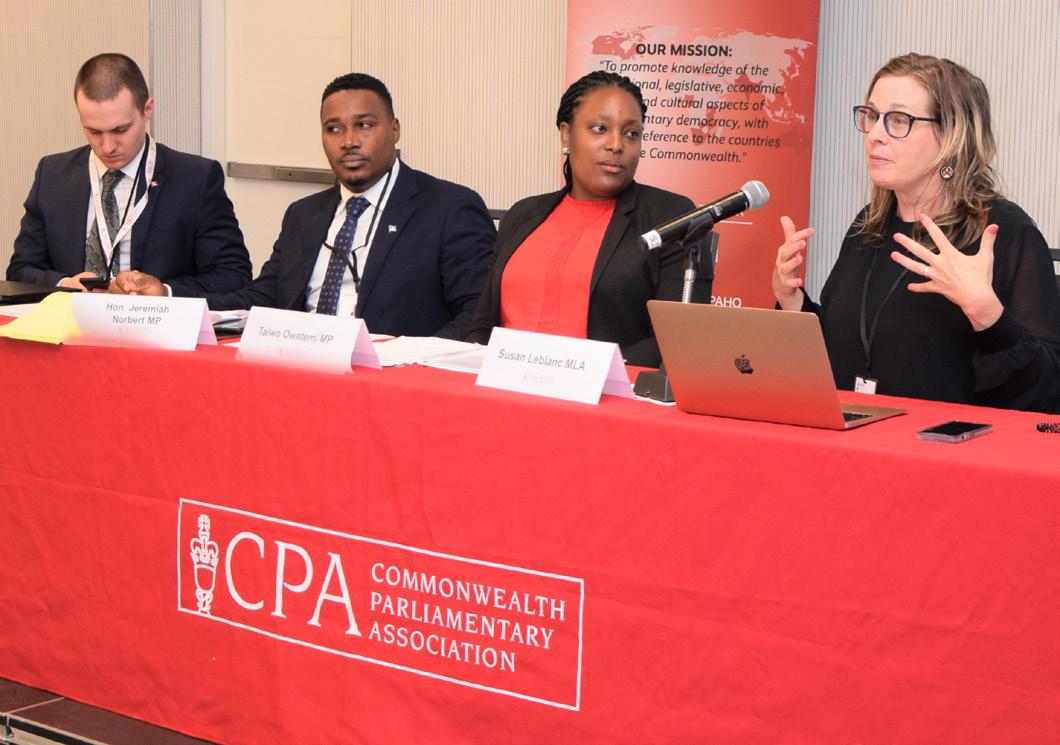
Opening remarks were made by Hon. Jeremiah Norbert, MP, Deputy Speaker of the Parliament of Saint Lucia, who chaired the workshop. He described cyberbullying and online abuse as an increasingly prevalent issue that requires attention from heads of government and legislators. He also stressed that young people need to be involved in discussions surrounding this topic, and he shared that he personally dealt with cyberbullying when campaigning for office. He also noted that the online abuse and harassment of elected officials can extend to their family members, who may become additional targets of cyberbullies. The Deputy Speaker also raised the worrying prospect of young people abandoning their political aspirations because of the toll that cyberbullying may take on a young Parliamentarian’s mental health.
The first panelist, Hon. Taiwo Owatemi, MP (United Kingdom) delivered remarks focusing on the online harm of Parliamentarians in the United Kingdom, and what support mechanisms are in place or being developed to respond to that harm. She acknowledged that as a young Parliamentarian, social media plays an important role in engaging people in politics, but that shortly after her being elected, the negative aspects of social media surfaced. The Member and her staff faced challenges with bullying and harassment online. She indicated that the recent political climate in the United Kingdom contributed to this, with certain constituents having heated responses to issues related to ‘Brexit’ and the COVID-19 lockdowns. She stated that the bullying, harassment and trolling of Parliamentarians may be even more prevalent for female politicians, who face misogyny and threats of violence. She also said that regrettably, a Parliamentarian’s staff members will
often become the target of online abuse, which can lead to fear and mental health issues.
Hon. Taiwo Owatemi then discussed the resources that exist in the United Kingdom’s Parliament for Parliamentarians dealing with online abuse. She indicated that there are doctors, nurses and occupational therapists on site who can provide treatment. Further, referrals can be made to specialist mental health centres, and there are dedicated police officers who are seeking out abuse of Parliamentarians and parliamentary staff. There is also an All-Party Parliamentary Group (APPG) focused on social media, which recently had a session on discrimination.
The UK Member also referenced an Online Safety Bill that is currently being legislated in the United Kingdom. The Bill will aim to hold social media companies accountable for online abuse occurring on their platforms, and to empower a regulatory body to effectively enforce the Bill’s requirements. The Bill is still in its initial stages, and an early issue in crafting the legislation has been addressing what the UK Member calls ‘legal but harmful content’. This refers to online content that is not explicitly illegal or criminal, but nonetheless significantly harmful to people. She stressed that social media companies must be held to account for legal but harmful content, as this sort of content constitutes the majority of cyberbullying on social media platforms.
Hon. Taiwo Owatemi concluded her remarks by providing practical action steps that Parliamentarians and parliamentary staff can take to avoid or deal with online abuse. Those steps include maintaining a distinction between personal and professional social media accounts, keeping physical locations hidden on the internet, being aware of updates social media companies are implementing, training staff members to report abuse instead of engaging with it and proactively checking on other Parliamentarians’ welfare.
The second panelist, Hon. Susan Leblanc, MLA (Nova Scotia), delivered remarks focusing on online harassment of young
The Parliamentarian | 2022: Issue Three | 100 years of publishing | 235 INCLUSIVE, ACCESSIBLE, ACCOUNTABLE AND STRONG PARLIAMENTS
YOUTH ROUNDTABLE
Images
credit: Christian Diotte/Parliament of Canada and Jeffrey Hyland/CPA Headquarters
people and elected officials in Nova Scotia, and the difficulties faced in preventing or addressing that harassment. She said that through her experience outside of politics in teaching university students, she has observed a major change in the mental health of young people, and she partly attributes this change to the online world. She also provided various examples of her experiences with online bullying and abuse, with those experiences including online harm done to her colleagues in politics. Those examples included online sexual harassment of female politicians, which she said can be met with subpar or dismissive police responses. She stated that when female victims of cyberbullying report online abuse, they are sometimes wrongly labelled as overly sensitive.
Hon. Susan Leblanc then discussed the legislative landscape in Nova Scotia with respect to cyberbullying. As she recounted, the catalyst for online abuse legislation was the vicious online bullying of a girl in Nova Scotia who died in 2013 after a suicide attempt at the age of 17. Nova Scotia enacted the Cyber-safety Act, which she suggested was a rushed piece of legislation because it was urgently enacted in response to public outrage. The Cyber-safety Act was struck down in the courts in 2015, and was described by some as draconian. She explained that a few years later, a new piece of legislation came into force, but that it may have overcorrected the mistakes of the prior law, with the effectiveness of the new legislation now being in question.
With respect to supporting victims of online abuse and cyberbullying, Hon. Susan Leblanc indicated that tools exist in Nova Scotia, but they are flawed. She said that the status of a provincial mental health strategy that was published in 2013 is now uncertain, and that work is underway on a sexual violence strategy. She concluded her remarks by saying that groups working with victims of abuse are underfunded and additional public investment is needed.
The panelist presentations then moved into a question and answer period, although many delegates provided comments and input without explicitly asking a question.
Hon. Sarah Murphy, MS (Wales) discussed the importance of holding the leaders of social media giants, such as Facebook, accountable. She stated that across its platforms, Facebook’s parent company has billions of users, but despite its wide reach its Chief Executive Officer is essentially accountable to nobody. She queried what ideas the panel had to address this problem. Hon. Jeremiah Norbert and Hon. Taiwo Owatemi both discussed the importance of legislation in addressing the accountability problem, with the latter pointing to potential provisions under the Online Safety Bill being developed in the United Kingdom.
Hon. Jason McCartney, MP (United Kingdom) stressed that the toxicity of social media and the level of online hate has come to a terrible point. He stated that Parliamentarians need to be able to feel safe in doing their jobs, and that the recent murders of two Parliamentarians in the United Kingdom demonstrate the level of ongoing hate occurring in some parts of society. The UK Member suggested that the rising level of toxic discourse and online abuse is causing some politicians to develop more hardline views on curbing social media abuse. He also criticised the unaccountability of online platforms.
Hon. Jamahl Simmons, MP (Bermuda) raised a question as to mental health and online abuse support services for Parliamentarians in smaller jurisdictions, which often do not have
the resources that a larger parliamentary jurisdiction may have. Hon. Taiwo Owatemi indicated in response that in the United Kingdom, the support services for Parliamentarians are funded through Parliament itself. On a related note, Hon. Jamell R. Robinson, MHA (Turks and Caicos) discussed the difficulties of holding cyberbullies to account in a smaller jurisdiction, partially because of less police resources existing in those jurisdictions.
Shri Anubhav Mohanty, MP (India Union) said that cyberbullying has been a difficult aspect of his life since he has become a Parliamentarian. He stated that Parliamentarians need to do more to stand up for each other when online abuse occurs, and he suggested that the CPA make efforts to facilitate this sort of support.
Hon. Leona Roberts, MLA (Falkland Islands) stated that rather than improving or stagnating, the issue of online abuse and cyberbullying appears to be escalating. She emphasised that the cycle of online harassment must be broken for the next generation, although in similar fashion to earlier comments from delegates, she stated that for small jurisdictions it is difficult to develop comprehensive policies or legislation in this area.
The question and answer period ended with Hon. Andrew Wallace, MP (Australia Federal) stating that in combatting unaccountable social media behemoths and the abuse occurring online, anonymous identities need to be targeted. He recommended that Legislatures pass laws requiring people to identify who they are to open a social media account. He stated that the technology is there, but Parliamentarians need to demonstrate the political will to follow through with this idea.
Delegates were then divided into break-out groups to generate a set of strategies to combat cyberbullying. The break-out discussion themes and issues included what campaigns against cyberbullying should focus on, what success stories exist in the Commonwealth and beyond respecting responses to cyberbullying, what mental health support can be offered to victims of online harm and how Parliaments can maintain oversight of social media companies whose platforms are used for cyberbullying.
At the end of this discussion, delegates then discussed the following recommendation:
• Commonwealth Parliaments should establish, or develop existing, mechanisms that support their younger Members when experiencing poor mental health or abuse online.

A number of issues with the proposed recommendation were discussed, and various suggestions for potential amendments were made including:
• Removal of the word ‘younger’ from the recommendation to ensure that all Parliamentarians would benefit from mental health and online abuse support mechanisms.
• A recommendation that would support the development of a cross-parliamentary strategy to address cyberbullying and online harassment. This discussion also included a suggestion that an international model law should be sought on the regulation of social media.
• Delegates also suggested that the recommendation as presented was possibly ‘unambitious’, given the gravity of the harm being done as heard during the workshop.
Ultimately, the recommendation was not explicitly endorsed or rejected but it was noted by all of the delegates in attendance.
236 | The Parliamentarian | 2022: Issue Three | 100 years of publishing
INCLUSIVE, ACCESSIBLE, ACCOUNTABLE AND STRONG PARLIAMENTS
CPC WORKSHOP H: THE CLIMATE EMERGENCY: ARE PARLIAMENTS HOLDING GOVERNMENTS TO ACCOUNT?
Panel Chair: Hon. Claire Baker, MSP (Scotland)
Discussion Leaders:
• Hon. Chandrasiri Bandara Ratnayake, MP (Sri Lanka)
• Senator Hon. Carolyn Trench-Sandiford, President of the Senate (Belize)
• Hon. Viam Pillay, MP (Fiji)

• Ms Vanessa Corkal (International Institute for Sustainable Development, Canada)
Facilitator: Mr Jack Hardcastle (CPA Secretariat)
Rapporteurs: Ms Eleanor Royle and Mr Philip Grassie (Nova Scotia Legislature)
This session explored the climate emergency and whether and how Parliaments are holding governments to account in combatting climate change.
Participants heard that the goal to limit temperature rise to 1.5C is only just possible if we make immediate reductions in greenhouse gas emissions.
Some of the issues that were discussed were the failure of most governments to meet their own climate change targets, the lack of short-term goals, and the problems with being constrained by the election cycle. In the current cost of living crisis, governments have been tempted to scale back climate promises and to lower fuel taxes. Some jurisdictions say that oil and gas revenues are being used to lift people out of poverty, however the environment is suffering.
Small, especially island, nations who contribute very little to the world’s carbon emissions are at the highest risk of climate disasters. They struggle to know how to influence larger nations with high carbon emissions to curb their continued usage of fossil fuels. Within nations, it has been recognised that disadvantaged groups such as women, children, indigenous peoples, LGBTQ+ people and people living in poverty suffer the worst effects of climate change.
Some solutions that Parliamentarians can implement are climate change education for all Members, non-partisan working groups, and collaboration with non-governmental organisations (NGOs) in educating the public on climate change. Parliamentarians can ask questions in Question Periods; propose legislation to limit climate change which will, at the least, foster debate; act as scrutineers to
make sure that climate change policies are being implemented by governments; and influence budgetary decisions on climate change adaptation and mitigation as opposed to fossil fuel subsidisation.
One example of a forward-looking policy is the Well-being of Future Generations (Wales) Act 2015. Every piece of policy considered by the Welsh Parliament has to be viewed through this prism, which includes environmental issues.
The Panel Chair, Hon. Claire Baker, MSP (Scotland) stressed that Parliaments are vital in holding governments to account in the climate emergency. She said that Parliamentarians have a critical role to play in making national policy and legislation and must act quickly in order to reach the Paris Agreement goal of limiting global temperature increase to under 1.5C. She stated that in April 2019, Scotland became one of the first governments to declare a climate emergency. To date, more than 2,000 jurisdictions have declared a climate emergency and the Scottish Parliament is working to make climate change a core issue.
To this end the Scottish Parliament formed a citizens’ assembly, Scotland’s Climate Assembly, which was asked how Scotland should change to tackle the climate emergency in an effective and fair way. The assembly returned 81 recommendations to the Scottish Parliament. The Panel Chair noted that the challenge is in implementing the assembly’s recommendations in all government departments. Cross-party working is being encouraged however progress it not what it should be. She gave her opinion that in order to have a strong, healthy, just society, sustainable development thinking needs to be at the heart of all new legislation and policies.
Ms Vanessa Corkal (International Institute for Sustainable Development, Canada) emphasised that climate change is the defining issue of our lives. She said that if we cannot attain the Paris Agreement goal of limiting global temperature increase to 1.5C, we need to be close and warned that at our current rate we will be using twice the amount of fossil fuels as we should by 2030. According to her, Canada needs to phase out fossil fuel production within 12 years and yet no plan has been published in Canada that would meet the 1.5C goal.
In order to achieve climate accountability, Parliamentarians need to constantly bring climate change issues into the conversation. Governments need to make short-term targets for every five years and update them regularly. These targets should be aligned with the 1.5C goal. She stressed that how we are allocating our budgets is crucial; we need to stop subsidizing fossil fuel production and invest in robust alternative energy technologies that are proven to work at scale. The panellist emphasised that governments should apply strict conditions on funding to make sure that companies align with government targets.
The Parliamentarian | 2022: Issue Three | 100 years of publishing | 237 INCLUSIVE, ACCESSIBLE, ACCOUNTABLE AND STRONG PARLIAMENTS
Senator Hon. Carolyn Trench-Sandiford, President of the Senate (Belize) reiterated that climate change is the most significant challenge of our time. Small island developing states produce less than 1% of global carbon emissions and yet are bearing the brunt of the effects of climate change. She said that the previous week a tropical wave passed over Belize leaving millions of dollars worth of damage. In addition to damage to infrastructure, climate change is a risk to human health, lives and livelihoods and has a disproportionate impact on the wellbeing of women, children, indigenous peoples, LGBTQ+ people and people living in poverty.
The panellist argued that the Paris Agreement is not necessarily delivering on climate change goals and that Parliamentarians need to re-evaluate how their jurisdictions will limit global rise in temperature below 2C, strengthen their ability to adapt, and ensure that financing of mitigation and adaptation measures is sustainable.
Five areas where the panellist saw that Parliamentarians could act are:
• In talking to constituents and other Parliamentarians about climate change solutions
• As legislators entering into agreements, addressing gaps, and using the climate lens to examine inequities
• As gatekeepers to budgets addressing disparities that affect communities
• As scrutineers making sure that public services are delivered
• As champions of climate justice at both national and local levels.
One innovative approach Belize has taken on climate action is the ‘Blue Bonds for Ocean Conservation’ initiative in partnership with The Nature Conservancy to protect 30% of Belize’s ocean by creating marine protected areas.
Hon. Viam Pillay, MP (Fiji) asserted that Fiji has one of the world’s most comprehensive plans for climate action. Fiji plays a leading role including being the first country to commit to the Paris Agreement.
His suggested methods for how Parliamentarians can hold governments to account were:
• Use legislative and budget powers to support climate action
• Ask questions in Question Period
• Move motions on climate change to generate conversation and debate

• Issue Ministerial Statements
• Investigate policy in Committees.
Mr Pillay outlined just a few of the actions that Fiji has taken to address climate change:
• Creating a Climate Action Trust Fund Act
• Instituting an Environment and Climate Adaptation Levy on prescribed service providers
• Earmarking 6.2% of the 2022-23 budget of Fiji for climate response.
Mr Pillay stressed the importance of gender equality, inclusion and children’s right to a healthy environment in the fight against climate change.
Hon. Chandrasiri Bandara Ratnayake, MP (Sri Lanka), the final panellist, said that the naturally high diversity of flora and fauna on the tropical island of Sri Lanka has suffered because of significant deforestation to make way for human settlement and development. The panellist warned that small nations may have difficulties with financial resources for mitigation and that largescale investments will be needed for adaptation.
He asserted that Parliaments are crucial in setting all levels of policy including a national climate change strategy with mandatory targets and accountability. Sri Lanka has a national climate change policy which sets out objectives and guiding principles and also has the detailed National Adaptation Plan for Climate Change Impacts in Sri Lanka, 2016 - 2025. The adaptation plan includes detailed sector action plans and proposed budgets for mitigation and adaptation to climate change.
Hon. Chandrasiri Bandara Ratnayake stressed that we do not have time to waste in argument, that we need to take responsibility now, and that the planet is not just for humans but for all life on Earth.
At the end of the panellists’ presentations, the workshop reconstituted into smaller breakaway groups for discussion and then reported back to the workshop. The Chair then opened the floor to questions and comments. Some of the issues discussed were as follows.
Hon. Shamsul Iskandar Mohd Akin, MP (Malaysia) raised the question of the youth perspective and specific programs which could address their interests. Ms Vanessa Corkal responded that it was often young people who have acted where older people have not, however young people cannot vote. In her opinion, Parliaments and non-governmental organisations need to listen to youth perspectives and give them a platform on their websites and in videos. Hon. Claire Baker noted that citizens’ climate assemblies exist in other countries and represent a broad swath of society.
Hon. Perry Trimper, MHA (Newfoundland and Labrador) stated that in Labrador, they will soon experience a 6C increase in temperature. However, he said that the province of Newfoundland and Labrador also needs the revenue it receives from the exploitation of oil and gas reserves. In the past, 32% of the province’s revenue has come from oil. He also asserted that the four-year election-cycle life span of legislators and political partisanship hinder the development of coherent climate response plans.
238 | The Parliamentarian | 2022: Issue Three | 100 years of publishing
INCLUSIVE, ACCESSIBLE, ACCOUNTABLE AND STRONG PARLIAMENTS
“ The panellist argued that the Paris Agreement is not necessarily delivering on climate change goals and that Parliamentarians need to re-evaluate how their jurisdictions will limit global rise in temperature below 2C, strengthen their ability to adapt, and ensure that financing of mitigation and adaptation measures is sustainable.”
With the current cost of living crisis, Hon. Steve Brine, MP (United Kingdom) suggested that governments have been tempted to reduce ‘green levies’ on consumers’ energy bills which are used to fund climate mitigation and to scale back on climate promises. Hon. Claire Baker reiterated that it is imperative for governments to be aiming for net zero by 2045. Ms Vanessa Corkal argued that lowering taxes is not effective and that it’s important to stop subsidising the problem. She said that with the war in Ukraine, fossil fuel companies have been making record profits and, in addition, energy security needs to be considered.
Hon. Huw Irranca-Davies, MS (Wales) said that Wales will not authorise any new plans for the extraction of fossil fuels. The Welsh Parliament now considers every policy, including environmental issues, through the prism of the Well-being of Future Generations (Wales) Act 2015 . This has led to a freeze on all new plans to build roads within Wales while the government investigates less energy-intensive ways to transport people and goods. The Member asked if we should be thinking about domestic policy which looks beyond electoral cycles.
Rt Hon. Brigadier (Retired) Mark Phillips, MP, Prime Minister of Guyana stated that Guyana has done a good job of conserving its natural assets including 85% of its forests which means that it has already reached net-zero carbon emissions. He said that they are moving towards greater use of renewable energy and that by 2030, 75% of their energy will come from renewable sources. However, Guyana also recently started drilling for oil and gas which presents an opportunity to lift their people out of poverty. The Prime Minister’s position is that Guyana can use the revenue earned from fossil fuel extraction to achieve long-term climate resilience.
Ms Vanessa Corkal responded that countries need to provide financing to help developing nations make and attain climate adaptation and mitigation goals. In her opinion there is no room for expansion of fossil fuel usage. This puts countries like Canada
INCLUSIVE, ACCESSIBLE, ACCOUNTABLE AND STRONG PARLIAMENTS
in a difficult position because, while advocating for climate action, Canada continues to develop and subsidise its fossil fuel extraction industry. This point was reinforced by Hon. Janet Routledge, MLA (British Columbia) who is alarmed that a pipeline is being built through her constituency.
Hon. Viam Pillay asserted that the continued use of fossil fuels feeds climate disasters including floods, hurricanes, and droughts and that urgent action is needed to curb climate change.
Connétable Mike Jackson (Jersey) talked about the impotence that small jurisdictions feel in the face of climate change and asked how small jurisdictions can influence the policies of industrialised countries. He would also like climate activists to be taken more seriously and not seen as extremists.
Senator Hon. Carolyn Trench-Sandiford gave an example of activism that has worked. In Belize, an unofficial referendum was held in 2012 and more than 96% of participants voted against offshore oil activity. The government has since bowed to public pressure and placed a moratorium on oil exploration.
Hon. Vincent Patrick Henry, MP (Guyana) noted that the Climate Change Performance Index only monitors some countries, not all. He proposed that all Commonwealth countries be included in an index so that all member countries could know where they stand in the rankings.

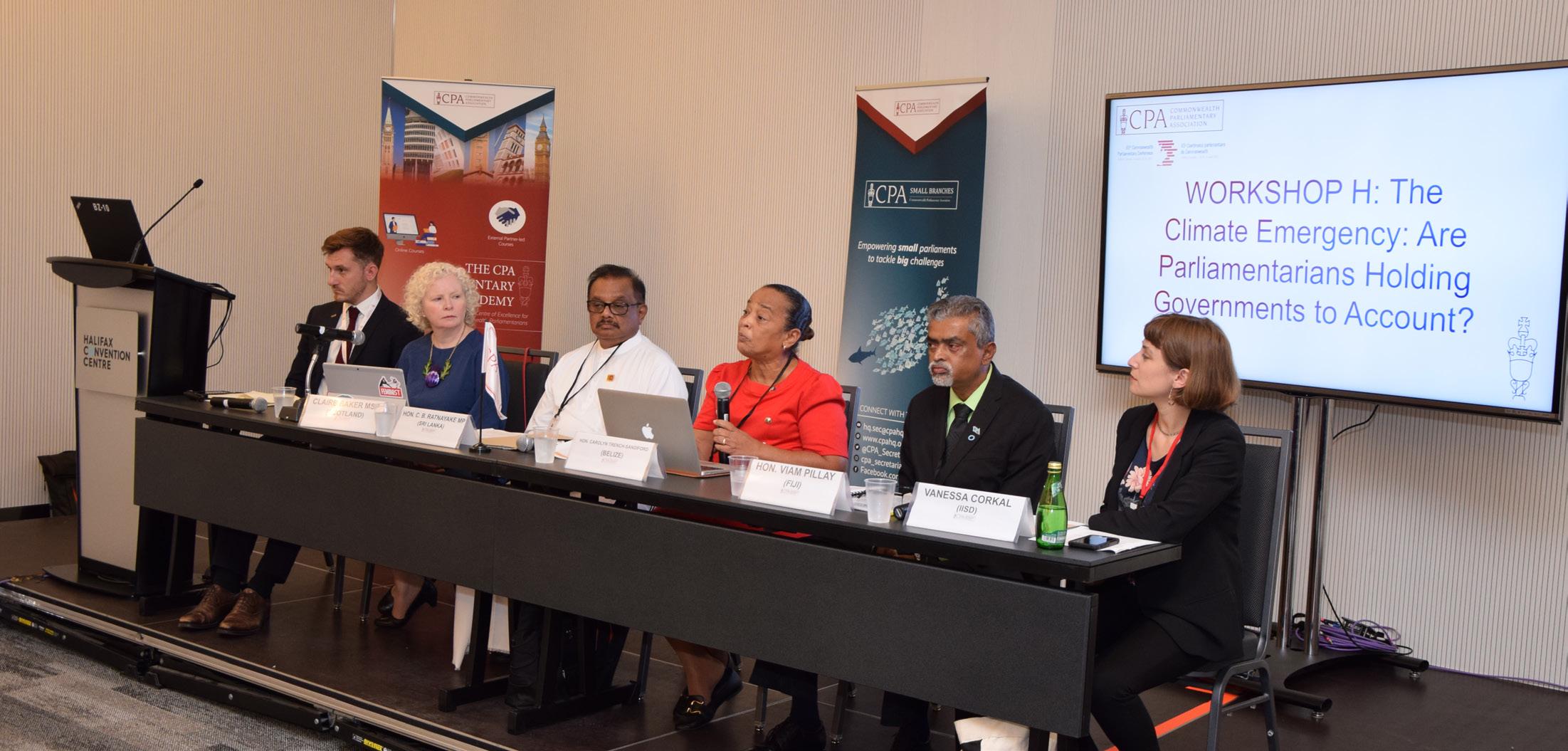
At the end of discussion, the following recommendation was endorsed:
• Parliaments have a responsibility to ensure that national climate laws and policies are robust, ambitious and in line with international commitments such as the Paris Agreement. Parliamentarians should, therefore, be bold in holding governments to account when progress is slow or lacking.
The Parliamentarian | 2022: Issue Three | 100 years of publishing | 239
Images credit: Christian Diotte/Parliament of Canada and Jeffrey Hyland/CPA Headquarters

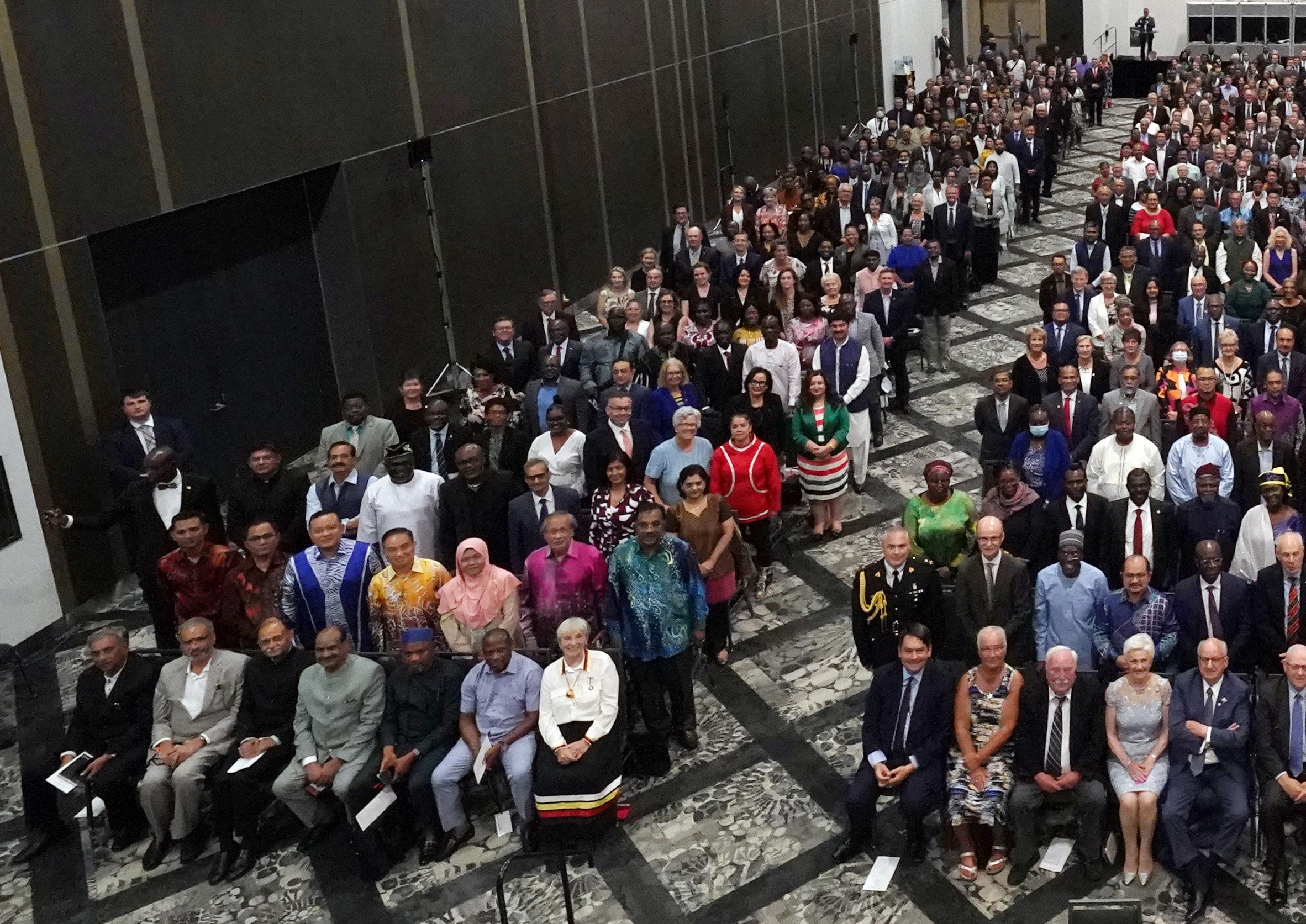
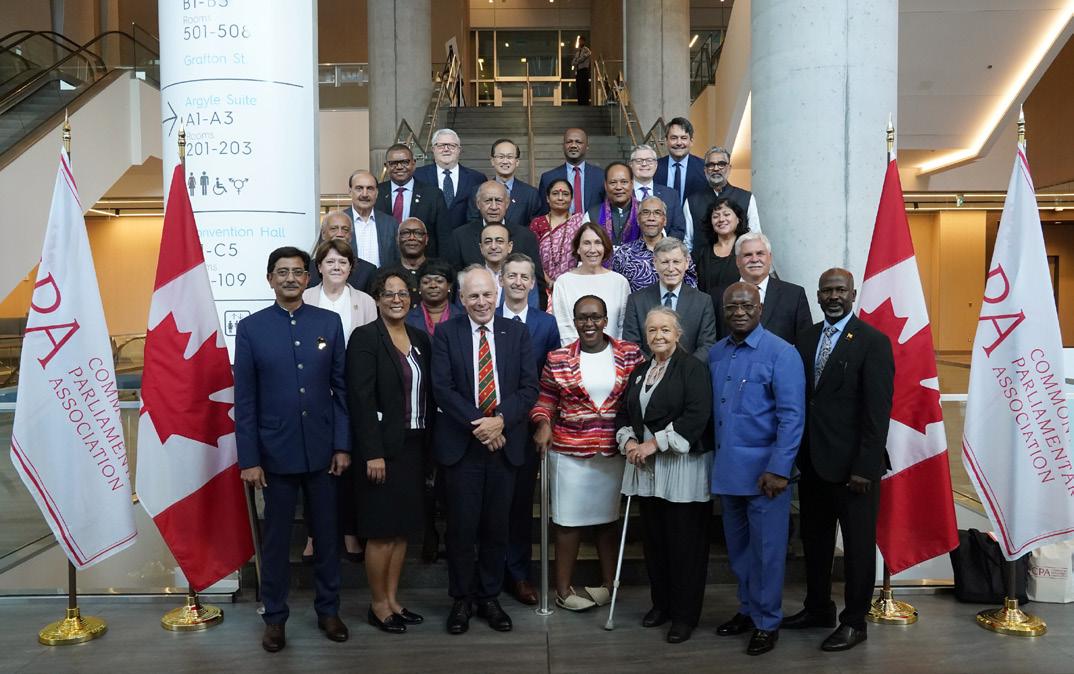
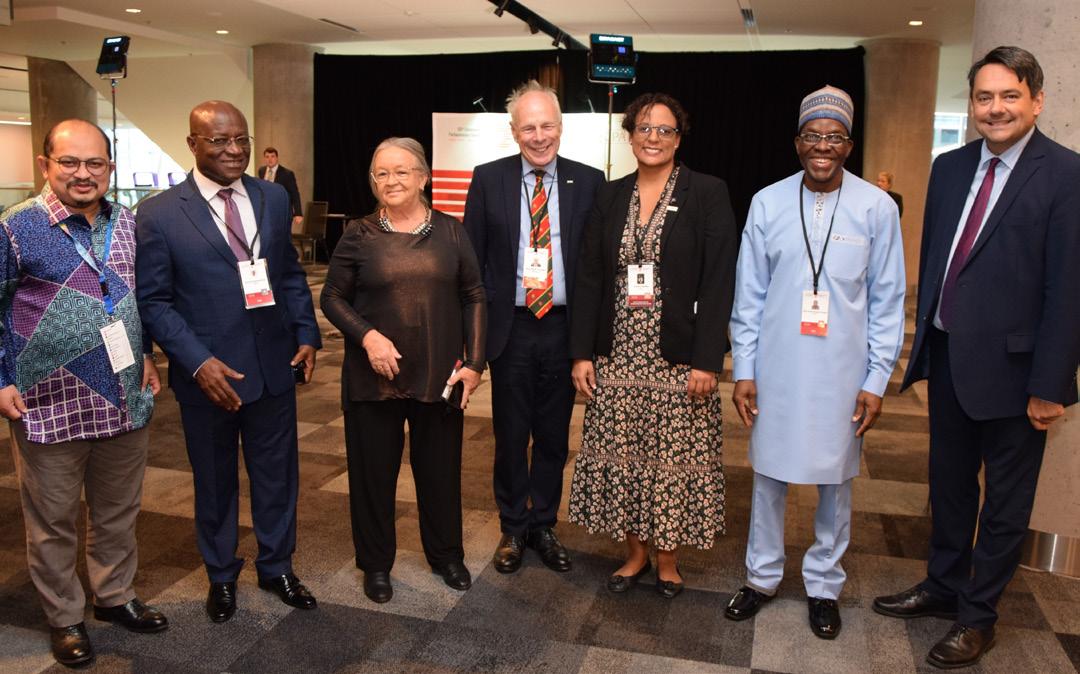
240 | The Parliamentarian | 2022: Issue Three | 100 years of publishing
65th Commonwealth Parliamentary Conference, Halifax, Nova Scotia, Canada
| 20 to 26 August 2022 INCLUSIVE, ACCESSIBLE, ACCOUNTABLE AND STRONG PARLIAMENTS
The
new CPA
Executive Committee meet in Canada at the conclusion of the
65th Commonwealth
Parliamentary Conference.
The CPA Treasurer (Malaysia), CPA Vice-Chairperson (Ghana), CPA Small Branches Chairperson (Australian Capital Territory), CPA Chairperson (UK), CWP Vice-Chairperson (Belize) and the CPA VicePresident (Ghana) with the CPA Secretary-General at the 65th CPC.

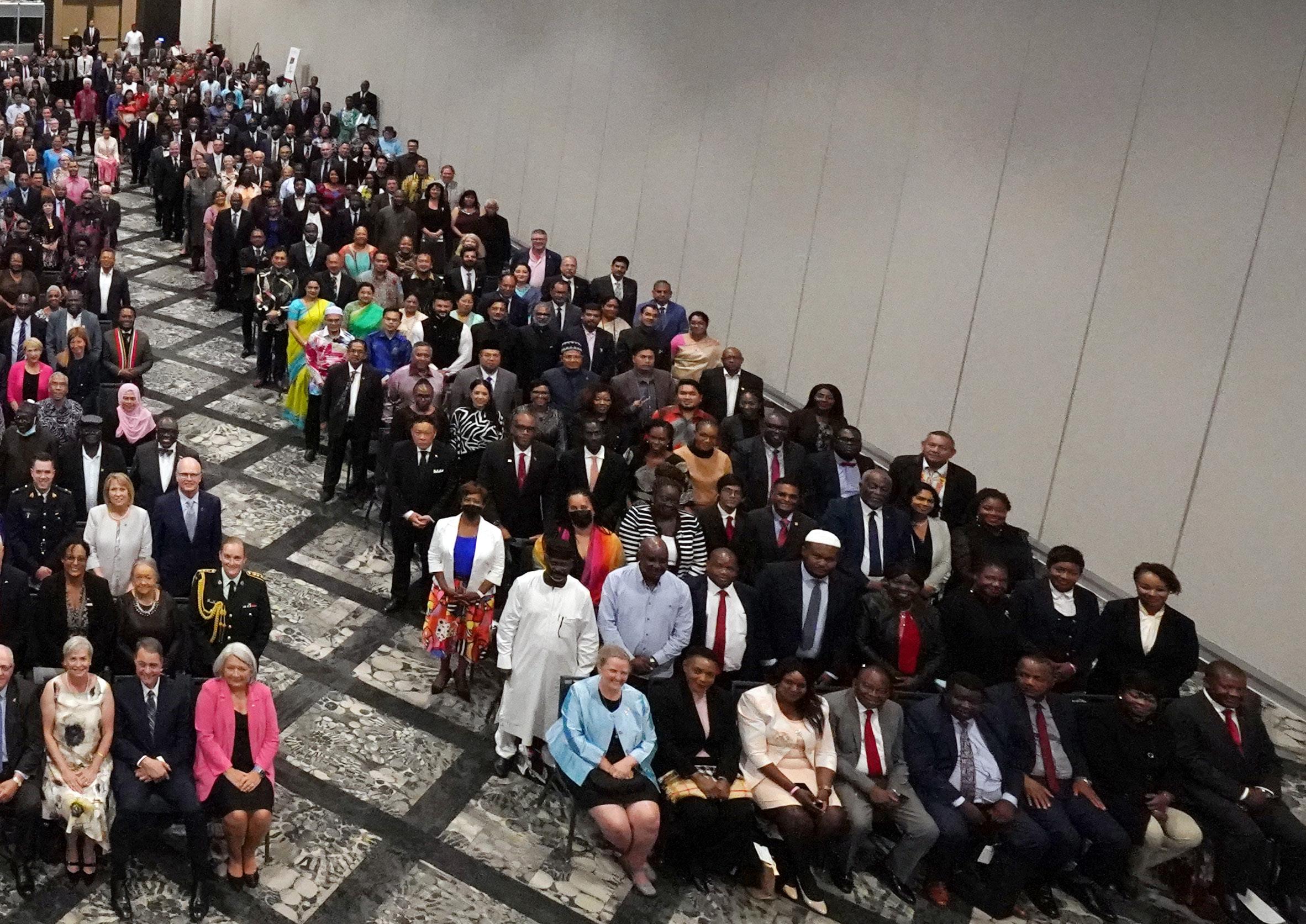
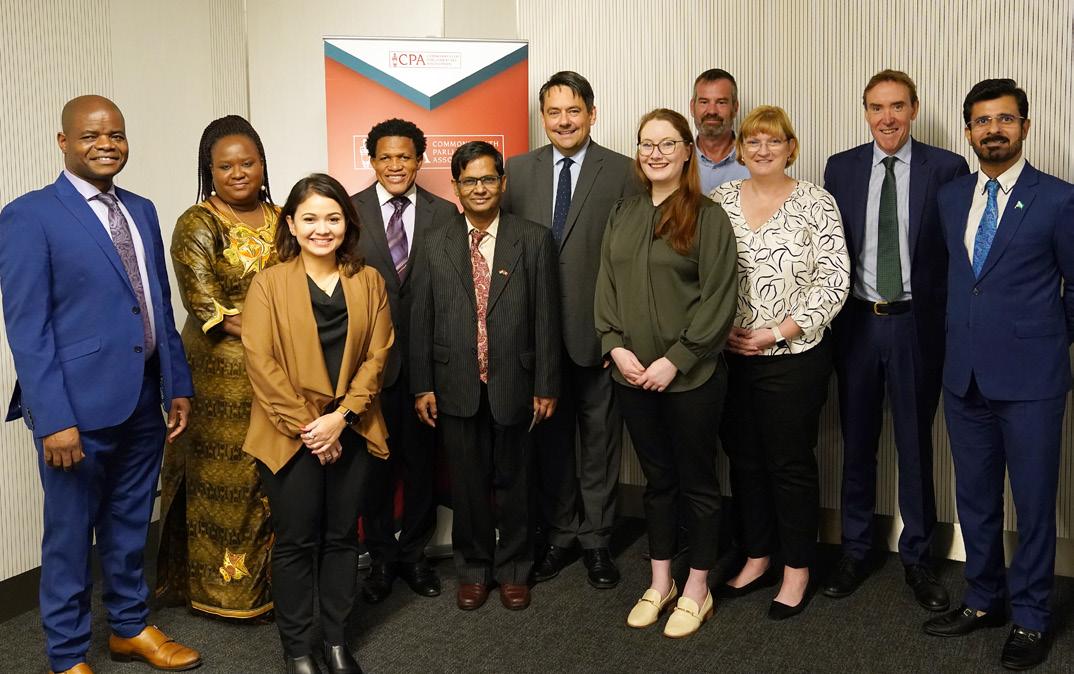
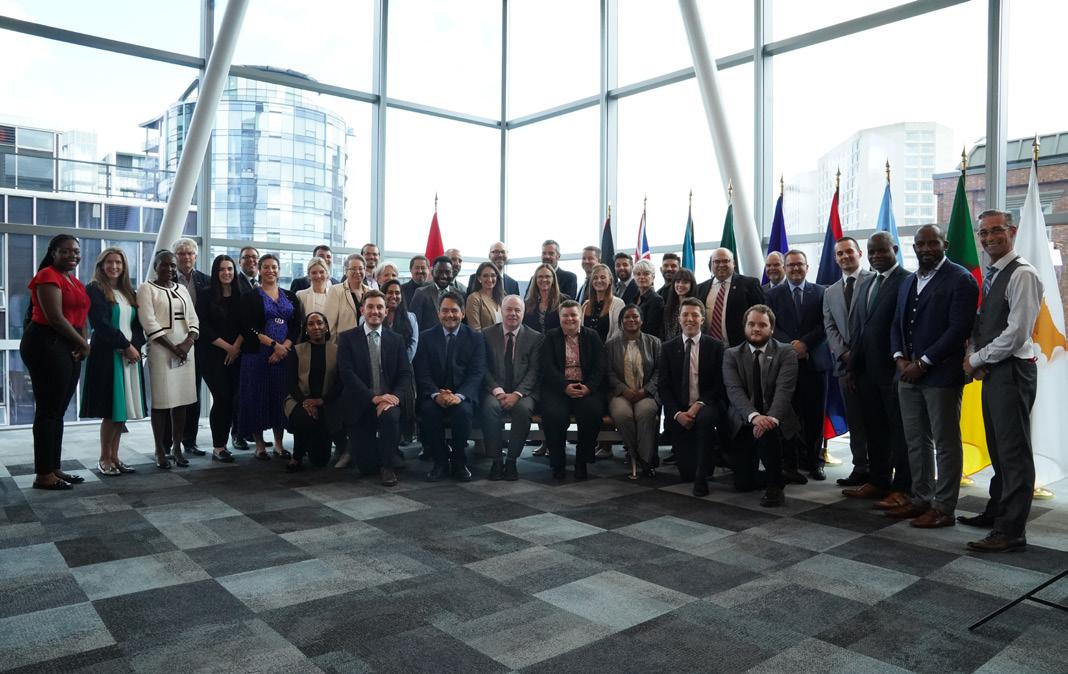
The Parliamentarian | 2022: Issue Three | 100 years of publishing | 241 INCLUSIVE, ACCESSIBLE, ACCOUNTABLE AND STRONG PARLIAMENTS For images of 65th Commonwealth Parliamentary Conference please visit CPA Flickr page (www.flickr.com/photos/cpa_hq/albums), CPA website www.cpahq.org or social media - Twitter @CPA_Secretariat | Facebook.com/CPAHQ | LinkedIn | Instagram @cpa_secretariat
The CPA Secretary-General, Stephen Twigg and Deputy SecretaryGeneral, Jarvis Matiya meet with the nine CPA Regional Secretaries.
The combined organising teams for the 65th CPC from the Canadian Parliament and the CPA Headquarters Secretariat.
Parliamentarians, Parliamentary Clerks and staff from nine CPA Regions and 128 CPA Branches from 43 Commonwealth countries attended the 65th Commonwealth Parliamentary Conference (CPC) in Halifax, Canada.
Images credit: Christian Diotte/Parliament of Canada and Jeffrey Hyland/CPA Headquarters
BREAK THE BIAS: GENDER EQUALITY TODAY FOR A SUSTAINABLE TOMORROW
COMMONWEALTH WOMEN PARLIAMENTARIANS AIM TO ‘BREAK THE BIAS’ TO BUILD GENDER EQUALITY AND REPRESENTATION IN PARLIAMENTS AT CWP TRIENNIAL CONFERENCE IN CANADA
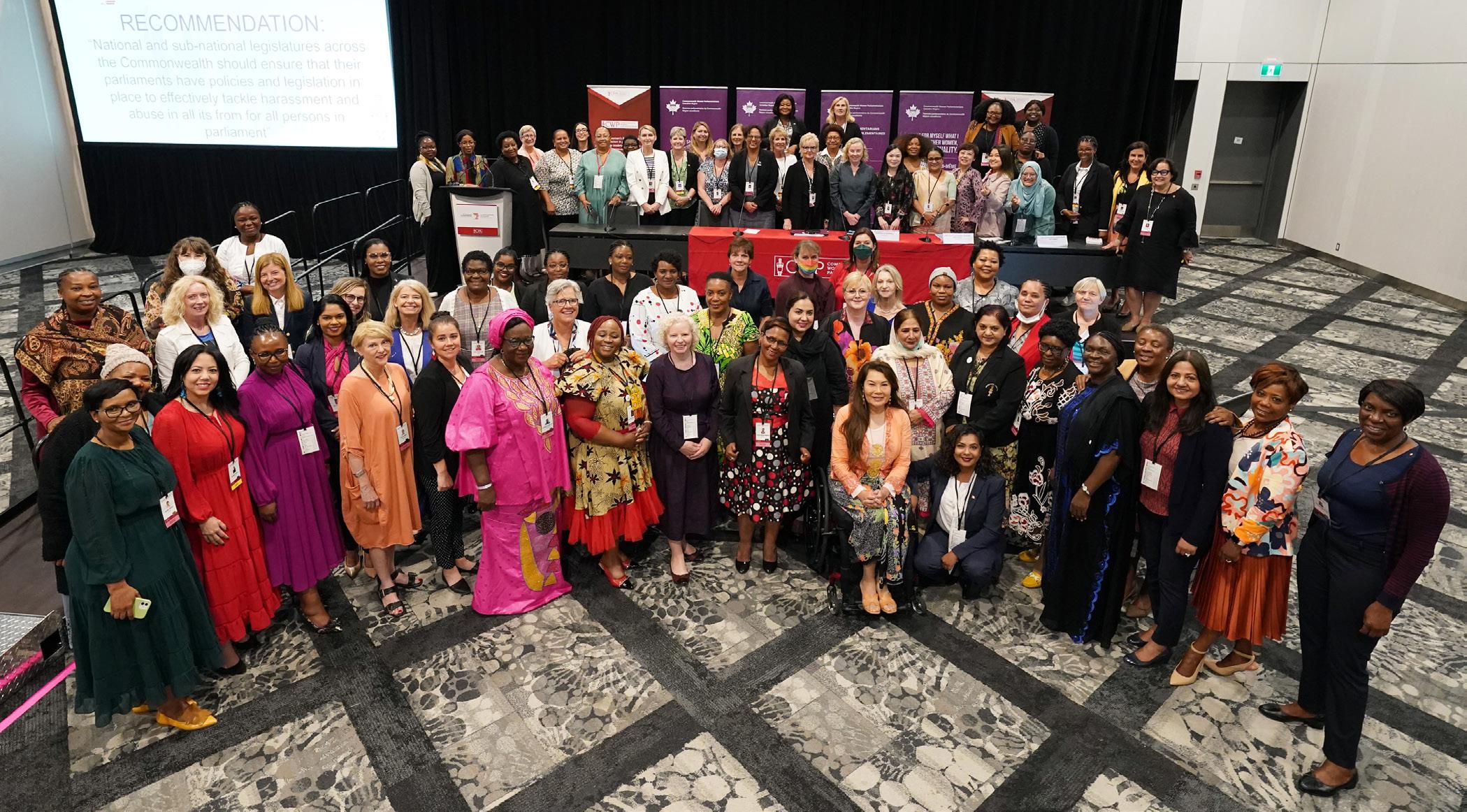
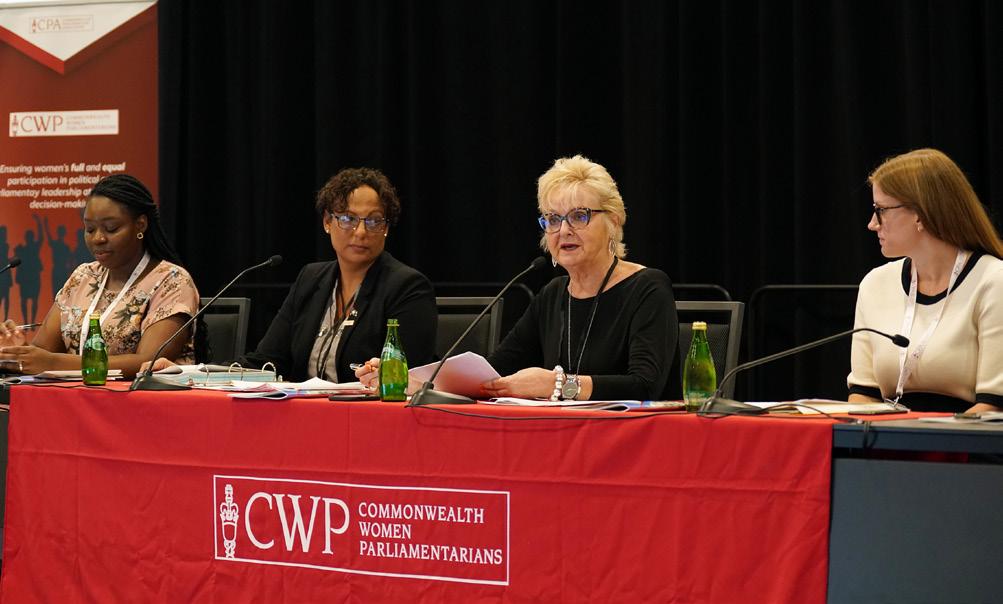


Women Parliamentarians from across the Commonwealth have gathered in Halifax, Nova Scotia, Canada for the 7th triennial conference of the Commonwealth Women Parliamentarians (CWP), held ahead of the wider 65th Commonwealth Parliamentary Conference. The theme of the Commonwealth Women Parliamentarians (CWP) Conference was ‘BreaktheBias: Gender Equality Today for a Sustainable Tomorrow’.
The CWP Conference was opened by the Vice-Chairperson of the Commonwealth Women Parliamentarians, Hon. Valerie Woods, MP, Speaker of the House of Representatives, National Assembly of Belize who welcomed delegates. The CWP President (2022), Hon. Myrna Dreidger, MP, Speaker of the Manitoba Legislative Assembly spoke to the CWP conference about her experience as a legislator.
Over 100 Commonwealth Women Parliamentarians attended the conference, held from 21 to 22 August 2022, from across the Commonwealth. The CWP conference saw leading figures in Commonwealth Parliaments addressing the conference and included four wide-ranging sessions for delegates on the following issues: Empowering Women Parliamentarians and Promoting Diversity / Intersectionality; Effectively Combating all forms of Abuse and Harassment in Parliament; Financial Empowerment of Women and Gender-Sensitive Budgeting; Promoting Gender-Sensitive Parliaments Post-Pandemic.
The CWP Conference also heard from Members from the Parliaments of Canada, India, Uganda, Sri Lanka, Australia, Malaysia, Scotland, Gujarat, Trinidad and Tobago, United Kingdom and New Zealand as well as experts from the Commonwealth Human Rights Initiative (CHRI), the World Trade Organisation.
Hon. Dr Zainab Gimba, MP from the House of Representatives at the Federal Parliament of Nigeria was
242 | The Parliamentarian | 2022: Issue Three | 100 years of publishing
Images credit: Christian Diotte/Parliament of Canada and Jeffrey Hyland/CPA Headquarters
CWP STEERING COMMITTEE MEETING
Ahead of 7th triennial Commonwealth Women Parliamentarians (CWP) Conference in Halifax, Canada, the CWP Steering Committee met in Canada representing the nine CPA Regions: Africa; Asia; Australia; British Isles and the Mediterranean; Canada; Caribbean, Americas and the Atlantic; India; Pacific; and South-East Asia. The CWP Steering Committee reconfirmed Hon. Valerie Woods, MP, Speaker of the House of Representatives, National Assembly of Belize as the CWP ViceChairperson for another term.
elected as the new Chairperson of the Commonwealth Women Parliamentarians in succession to the outgoing CWP Chairperson, Hon. Shandana Gulzar Khan (Pakistan) during the CWP Conference.
The newly elected Chairperson of the Commonwealth Women Parliamentarians (CWP), Hon. Dr Zainab Gimba, MP from the House of Representatives at the Federal Parliament of Nigeria pledged to renew the effort to increase women’s representation and political participation in Parliaments across the Commonwealth. The new CWP Chairperson was elected for a three-year term at the CWP Business Meeting. Under CPA election rules only female delegates to the 65th Commonwealth Parliamentary Conference and CWP Steering Committee Members could take part in the vote to elect a new CWP Chairperson.
Hon. Dr Zainab Gimba, MP is a Member of the Nigerian House of Representatives, representing the Bama/Ngala/ Kala Balge Federal Constituency of Borno State. She is one of the longest serving Commissioners in Borno State, serving from 2011 to 2018 and the only female representative in Parliament from the state. She is also the CWP Africa Regional Chairperson.
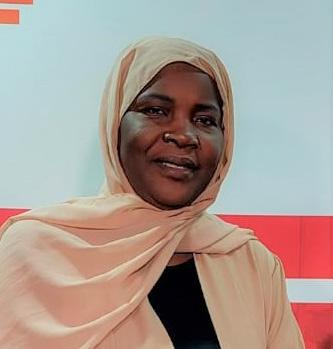
The CPA Secretary-General, Stephen Twigg said: “I congratulate Hon. Shandana Gulzar Khan outgoing CWP Chairperson for the important achievements she has made during her term in office. On behalf of the entire CPA membership, we are incredibly grateful to her for her leadership over the past three years. I very much look forward to working with Hon. Dr Zainab Gimba, MP, the new CWP Chairperson during the next three years and wish her all the very best in this important role.”
The Commonwealth Women Parliamentarians (CWP) is the network of women Members of the Commonwealth Parliamentary Association’s Parliament and Legislatures. The CWP network provides a means of building the capacity of women elected to Parliament to be effective in their roles; improving the awareness and ability of all Parliamentarians, male and female, and encouraging them to include a gender perspective in all aspects of their role - legislation, oversight and representation and helping Parliaments to become gender-sensitive institutions.


BREAK THE BIAS: GENDER EQUALITY TODAY FOR A SUSTAINABLE TOMORROW
The newly elected Chairperson of the Commonwealth Women Parliamentarians (CWP), Hon. Dr Zainab Gimba, MP from the House of Representatives at the Federal Parliament of Nigeria addressed CWP delegates:
"I address the women Parliamentarians from across the Commonwealth who are gathered here in Halifax, Nova Scotia, Canada for the 7th triennial conference of the Commonwealth Women Parliamentarians (CWP), ahead of the wider 65th Commonwealth Parliamentary Conference. I would like to thank all CWP delegates who have elected me today as CWP Chairperson. Receiving your endorsement and nomination to represent CWP is one of the greatest honours of my life. I find myself joyous but, as well, aware of the faith reposed in me by you all. Most importantly, I feel the weight of that trust and the great need not to disappoint all of you who deemed me worthy of the honour to be the Chairperson of CWP and be your representative. My grateful thanks goes to the leadership of the CPA, especially the CPA Secretary-General, the CPA Executive Committee and the Coordinating Committee for their deposition and commitment to advancing gender equality through the CWP.
I would also like to convey my sincere thanks to the outgoing CWP Chairperson, my friend Hon. Shandana Gulzar Khan for all the hard work she has done throughout her tenure. I would also equally like to express my deepest thanks to the CWP Vice-Chairperson, Hon. Valerie Woods for her phenomenal work as CWP Vice-Chairperson especially today during the first official day of the CWP Conference.
As CWP Chairperson, I will continue to deliver the CWP network’s key priorities and renew the effort to increase women’s representation and political participation in Parliaments across the Commonwealth. The CWP envisions a world where women and men have equal access to opportunities – a world where women’s voices are recognised and respected. I urge all Parliamentarians, with the support of the CWP network, to pursue this vision with continued dynamism and enthusiasm. Together we can and will build the future we want, working towards a future of equal rights, equal opportunities and progress for all."
The Parliamentarian | 2022: Issue Three | 100 years of publishing | 243
For images of 65th Commonwealth Parliamentary Conference please visit CPA Flickr page (www.flickr.com/photos/cpa_hq/albums), CPA website www.cpahq.org or social media - Twitter @CPA_Secretariat | Facebook.com/CPAHQ | LinkedIn | Instagram @cpa_secretariat Images credit: Christian Diotte/Parliament of Canada and Jeffrey Hyland/CPA Headquarters
CWP WORKSHOP A: EMPOWERING WOMEN PARLIAMENTARIANS AND PROMOTING DIVERSITY/ INTERSECTIONALITY

Panel Chair: Hon. Valerie Woods, MP, CWP ViceChairperson and the Speaker of the House of Representatives (Belize)
Discussion Leaders:
• Hon. Sunita Duggal, MP (India Union)
• Hon. Laura Kanushu, MP (Uganda)
• Sneh Aurora, Head of London Office, Commonwealth Human Rights Initiative (CHRI)
Moderator: James Pinnell (CPA Secretariat)
Rapporteurs: Erin Fowler and Anne Van Iderstine (Nova Scotia Legislature)
This workshop explored how Parliaments and Legislatures can empower women Parliamentarians and better accommodate and promote increased diversity. Particularly, this session looked at the importance of women and other underrepresented groups, including persons with disabilities, serving in public office, especially positions of parliamentary leadership.
Panel Chair, Hon. Valerie Woods, MP, CWP Vice-Chairperson and the Speaker of the House of Representatives (Belize) noted the importance of the CPA’s network of Commonwealth Parliamentarians with Disabilities (CPwD), which was established to facilitate activities and programmes to champion and increase the representation of persons with disabilities in Commonwealth Parliaments and to work towards the mainstreaming of disability considerations in all CPA activities and programmes. She reviewed the development of the network as well as the history of the Commonwealth Women Parliamentarians (CWP), noting that low numbers of women Parliamentarians remain a global challenge within the Commonwealth.
Hon. Sunita Duggal, MP (India) focused on the underrepresentation of women in Parliaments, particularly in decision-making roles, noting that women hold only 26% of the seats in Parliaments around the world. She stressed that true democracy can only be realised when all segments of society have a voice. While several factors often hamper women’s involvement in politics, change is possible. In India, women attained full voting rights at the same time as men when the country became independent. The Constitution adopted in 1950 conferred universal adult suffrage. To increase political participation by women, the Constitution was later amended, requiring all local levels of government in India to reserve at least 33% of seats for women. Currently, over 100 women serve as
MPs in India’s Parliament. Additionally, India has enacted several pieces of landmark legislation to empower women.
Hon. Sunita Duggal noted the significance of women as leaders of development within the economic sphere of the country. Bank accounts for women have increased female financial independence in India, expanding their influence on development. During the COVID-19 pandemic, the number of bank accounts held by women rose to over 400,000.
When involved in decision-making processes, women’s consciousness of public opinion and their role in society leads to improvements in political rights, social conditions and equality. Both men and women must ensure those in power are gendersensitive in order to promote freedom, equality and justice in favour of women.
Hon. Laura Kanushu, MP (Uganda) spoke on women with disabilities and Uganda’s efforts to increase the number of women in positions of authority. She noted that low and middle-income countries see higher incidents of women with disabilities, making up more than three quarters of the population of persons with disabilities.
The Ugandan Constitution reserves five seats in Parliament for persons with disabilities, only one of which is reserved specifically for women. In the current Parliament, one woman with disabilities was elected outside of the five designated seats. As one of the only women with disabilities in Parliament, Hon. Laura Kanushu represents women with disabilities across all of Uganda, effectively having a national constituency beyond her own region. Representation of this group remains limited since she cannot visit or reach out to all women with disabilities in her country.
In Uganda, a major challenge for women Parliamentarians with disabilities is that the Parliament buildings were constructed before accessibility legislation was passed. Hon. Laura Kanushu explained that making our physical environments accessible to people with disabilities can help increase political participation.
She noted that women with disabilities are often the most vulnerable members of society. If we leave them out of decisionmaking spaces, things will never change. She encouraged all Commonwealth countries to open spaces for women with disabilities within their Parliaments. She further appealed to the delegates to encourage not only more women, but more women with disabilities in leadership positions. When we leave these women behind, we cannot truly say that we are fighting for inclusivity.
The concluding panelist was Sneh Aurora, Head of the Commonwealth Human Rights Initiative (CHRI) London Office After describing the work of the CHRI, Ms Aurora raised three key points for the workshop:
1. The role of Parliaments as models and examples of quality and inclusivity, to prevent the loss of critical views;
244 | The Parliamentarian | 2022: Issue Three | 100 years of publishing
BREAK THE BIAS: GENDER EQUALITY TODAY FOR A SUSTAINABLE TOMORROW
2. How diverse Parliaments promote diversity and equality through legislation;
3. How Commonwealth Parliaments can continue to advance women’s representation.

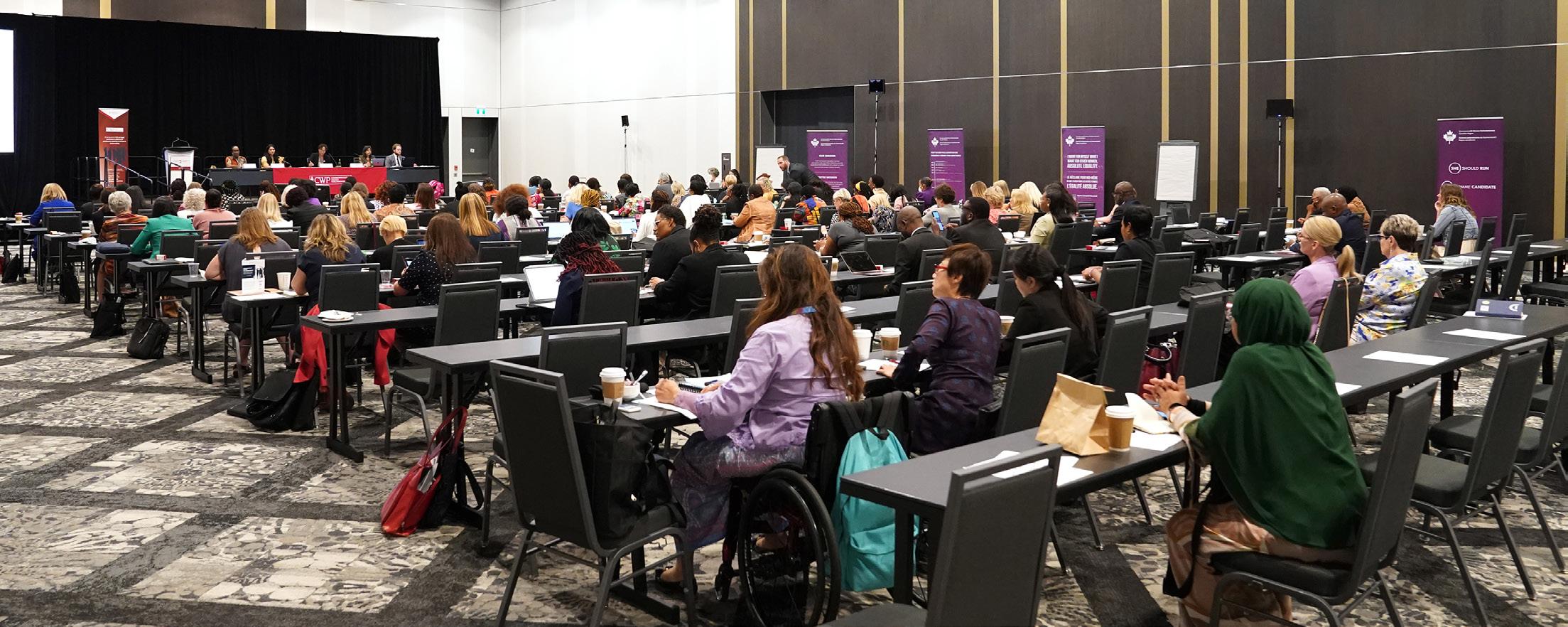
Ms Aurora noted that women form 49.5% of the world’s population, yet only 25.5% of all national Parliamentarians are women and only 19.5% within Commonwealth countries. Gender parity has not been achieved. Contribution by all citizens is required for the social, economic and political good of nations. When public bodies lack equal representation, critical views are lost, which is often reflected in laws and policies.
The need for diversity and women’s participation in political life has been set out in a succession of UN actions. Article 21 of the Universal Declaration of Human Rights and Article 7 of the International Convention on the Elimination of All Forms of Discrimination Against Women (CEDAW) both affirm the right of political participation. Implementation of CEDAW lagged until 1975, when the World Plan of Action for the Implementation of the Objectives of the International Women's Year was adopted by the UN. The Plan created guidelines for states, including their judiciaries and Parliaments, to set targets and take steps to achieve balance. These principles have been furthered by the UN’s Millennium Development Goals (goal 3) and goal 5 of the Sustainable Development Goals. Women, however, are still largely marginalised, including within the legislative branches of government.
Ms Aurora explained that a 2018 study of women in national Parliaments showed a positive correlation between political participation of women and the impact on gender-sensitive laws. Where there are more elected women, Parliaments are more likely to have gender-sensitive laws and are more robust in the protection of women’s rights, enacting and implementing legislation on domestic violence and sexual assault. This is significant given that almost one in three women is subjected to some form of violence.
Ms Aurora stressed that gender-sensitive Parliaments must be our aim. A gender-sensitive Parliament:
• responds to the needs and interests of men and women in its composition, structures, operations, methods and work;
BREAK THE BIAS: GENDER EQUALITY TODAY FOR A SUSTAINABLE TOMORROW
• removes the barriers to women’s full participation and ensures the promotion of gender equality; and
• is one in which there are no barriers – substantive, structural or cultural – that inhibit women’s full participation and equality.
In 2016, the Inter-Parliamentary Union created a Plan of Action offering action areas for Parliaments to improve gender sensitivity. Ms Aurora listed measures Parliaments can take to improve gender-sensitivity and close the representation gap:
• Use gender quotas – specifically reserving seats for women in Parliament as well as in political parties. For example, Uganda has legislated quotas to ensure as least one woman is elected in each district.
• Adopt gender mainstreaming strategies to assess laws, policies and programmes for differential impact.
• Establish structures and mechanisms dedicated to gender. For example, the Kenya Women Parliamentary Association helped push for the adoption of Kenya’s 2011 Prohibition of Female Genital Mutilation Act
• Strengthen linkages to gender equality experts and advocates outside Parliament, such as monitoring progress through external organisations.
• Strengthen capacity development through mentoring and training programs on gender equality.
In concluding, she stressed that while you can have policies in place, what is absolutely essential is inspiration and action; political will and commitment are vital for progress.
The question and answer session following the panel presentations showed unanimous support for the session recommendation, with clear appreciation for and agreement with the panelists. Several delegates were interested in the potential of electoral quotas, while others focused on ways to increase female and diverse participation through other methods.
Several delegates raised the issue of engaging youth and women in political participation. Senator Hon. Salma Ataullahjan (Canada Federal) specifically asked about strategies for engaging youth in Parliament, noting that Canada has made some progress in moving towards gender parity in the Senate and the House of Commons.
The Parliamentarian | 2022: Issue Three | 100 years of publishing | 245
Images credit: Christian Diotte/Parliament of Canada and Jeffrey Hyland/CPA Headquarters
BREAK THE BIAS: GENDER EQUALITY TODAY FOR A SUSTAINABLE TOMORROW
Hon. Savitri Sonia Parag, MP (Guyana) advised that every year the Parliament in Guyana holds a youth parliamentary debate, and that recently a youth advisory council was launched to help youth participate in democracy.
Hon. Pia Glover-Rolle, MP (Bahamas) opined that attracting more women to Parliament comes down to political will as well as modelling the behaviour. When women see women in parliament, they can feel empowered. Similarly, Hon. Sunita Duggal commented that you need to be the change that you want to see in the world. You must behave in a way that does justice to the position you are holding.
Senator Hon. Reuben Rahming (Bahamas) remarked that we need to do more to bring up the level of appreciation of women. Ms Aurora commented that to engage young women, it is about engaging young girls. It is about letting them know that they are capable and that positions of leadership are available to them.
Hon. Siviwe Gwarube, MP (South Africa) inquired about experiences in encouraging more voter turnout for women. Hon. Sunita Duggal commented that in 2019, more women than men came out to vote in the election in India.
Delegates expressed interest in the opportunities and possible drawbacks of Parliaments instituting gender quotas or reserving seats specifically for women with disabilities. Hon. Naomi Cachia, MP (Malta) mentioned that Malta had passed a constitutional amendment to guarantee that women have seats in Parliament. With this positive first step to increase female representation, she wanted to know how the discourse can change as well. Ms Aurora noted that the question of gender quotas is complex. When they are adopted, we need to ensure that it doesn’t just amount to tokenism.
Hon. Siviwe Gwaruba, MP (South Africa) similarly queried as to how we can make sure that we start moving from sheer numbers of women in Legislatures to where there is substantive participation by women. If we only focus on the numbers, we may just end up with malicious compliance, with none of the women having any real impact on legislation or governance. Ms Aurora explained that a 2006 study showed that even with holding only 15% of seats in a political body, women can change the political agenda. You need a minimum number of women to take on the debate, which can be achieved through education and capacity building.
Hon. Shameen Thakur-Rajbansi, MPL (KwaZulu-Natal) commented that in a multi-party system, not all parties speak the

same language. The reality is that some are patriarchal, some discriminate. To counter this, we need to institute quotas in elections and make quotas mandatory for political parties. Ms Aurora concurred explaining that simply increasing the number of women can challenge prejudices.
Hon. Claire Baker, MSP (Scotland) wondered if there was any resistance from the electorate in Uganda when the quotas were implemented. Hon. Laura Kanushu explained that the government at the time wanted to make sure there was more representation from people with disabilities.
Hon. Veronica Kadie Sesay, MP (Sierra Leone) led the audience in a song about equality and development. She then asked the panelists how to acquire and promote symbols in political parties. Hon. Laura Kanushu responded that it is about political will to reserve spaces for persons with disabilities in leadership.
Hon. Sarah Pallett, MP (New Zealand) explained that 48% of New Zealand’s Parliament is made up of women. Instead of implementing gender quotas, the driver of increasing female participation has been from within political parties.
Hon. Iqra Khalid, MP (Canada Federal) observed that social media and mass media often target women Parliamentarians. She questioned how we can ensure freedom of speech and allow social media to be used appropriately while preventing women from being targeted. Ms Aurora opined that it is the role of social media companies to get on board and stop these violations that are happening on their watch.
Hon. Grace Kwelepeta, MP (Malawi) asked what the CPA is doing to ensure people with disabilities are in leadership positions. James Pinnell from the CPA Secretariat noted the creation of the Commonwealth Parliamentarians with Disabilities (CPwD) network as well as the CPA investment fund to help make Parliaments more accessible. He stressed that more data is needed respecting Parliamentarians with disabilities, noting that most Parliaments don’t track this data.
Hon. Mary Muyali Boya, MP (Cameroon) suggested the CWP and CPwD should promote a ‘women with disabilities strategy plan’ to help Parliaments implement some of the examples provided by Hon. Laura Kanushu for increasing the representation of women with disabilities.
Hon. Sonia Sidhu, MP (Canada Federal) noted that Canada has implemented gender-based analysis across federal departments to examine the impacts of policies and programs on people of different genders.

The workshop endorsed the following recommendation:
• In promoting women’s empowerment and greater diversity in public office, Parliamentarians and Legislatures should take an institution-centric approach towards lasting change.
246 | The Parliamentarian | 2022: Issue Three | 100 years of publishing
BREAK THE BIAS: GENDER EQUALITY TODAY FOR A SUSTAINABLE TOMORROW
CWP WORKSHOP B: EFFECTIVELY COMBATING ALL FORMS OF ABUSE AND HARASSMENT IN PARLIAMENT
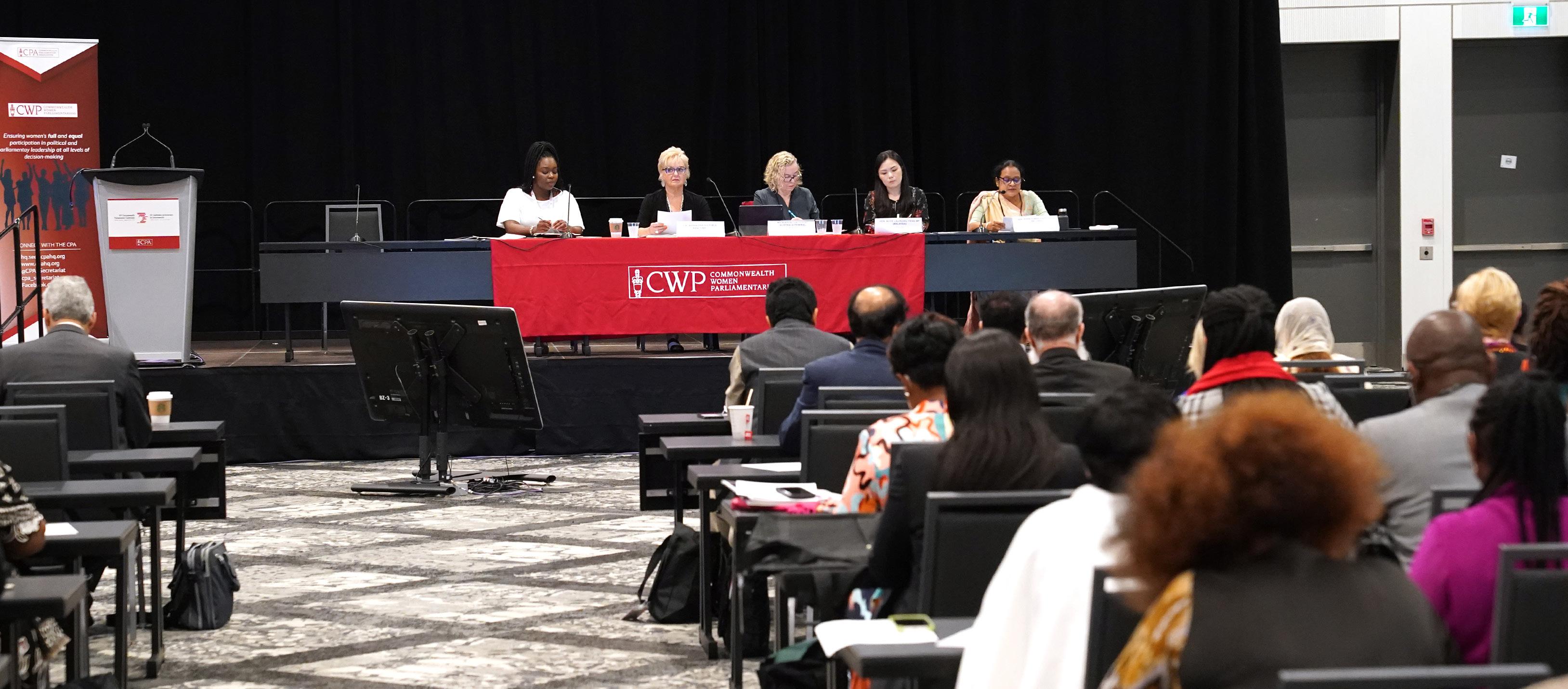

Panel Chair: Hon. Myrna Driedger, MLA, CWP
President and Speaker of the Manitoba Legislative Assembly
Discussion Leaders:
• Hon. Rohini Kumari Kavirante, MP (Sri Lanka)
• Hon. Sharon Claydon, MP (Australia Federal)
• Hon. Alice Lau Kiong Yieng, MP (Malaysia)
Moderator: Bénite Dibateza (CPA Secretariat)
Rapporteurs: Mr James Charlton and Ms Kim Langille (Nova Scotia Legislature)
This workshop looked at the issue of harassment and abuse in Parliament and the harmful impact it has on Parliamentarians, staff and Parliament as an institution. It considered the role of Parliamentarians and what they can do to combat the issue in Parliament. The session also allowed attendees to learn and share best practice that Commonwealth Parliaments can put in place as mechanisms towards solving the issue.
Hon. Rohini Kumari Kavirante, MP (Sri Lanka) commented on the difficulties experienced by women entering politics in South East Asia, and particularly in Sri Lanka. Even though Sri Lanka was the first country to have a woman as Prime Minister, only 12 of its
225 MPs are women. This places it in the lowest quartile among Parliaments in terms of representation of women. The low rate of representation reflects the fact that women have been impeded from realising their political rights and aspirations by various barriers, including cultural constraints and economic and financial impediments to entering politics. The low representation and lack of laws and rules preventing sexual harassment ensure that women are and remain isolated once they do enter politics. Indeed, she remarked that she was the only woman MP - government or opposition - anywhere in her area and asked the rhetorical question, who will bring the concerns of women into Parliament if there are no women MPs? She recounted her experience of being physically assaulted outside Parliament earlier in her career and of being verbally attacked in Parliament more recently. All of this indicates the need for stronger representation of women within Parliament.
To improve the representation of women in Parliament, the use of gender quotas to ensure 33% representation of women in Parliament, mandatory representation of women on party lists and gender quotas for commissions in Sri Lanka was advocated. She noted that while women constitute half of the population globally, their representation in Parliaments is less than half that percentage; that gap is even more pronounced in Sri Lanka. While men and women may be recognised as being equal, they are not treated as equal in practice. It is necessary to do more to achieve equality for women in political representation. Education will be a critical tool in combatting sexual discrimination and fostering a culture of true equality.
The Parliamentarian | 2022: Issue Three | 100 years of publishing | 247
Images credit: Christian Diotte/Parliament of Canada and Jeffrey Hyland/CPA Headquarters
Hon. Myrna Driedger, MLA, CWP President and the Speaker of the Manitoba Legislative Assembly noted a study conducted by the Inter-Parliamentary Union (IPU) on sexism, harassment and violence against women in Parliaments in Europe that found that over 40% of female parliamentary staff had experienced sexual harassment at work. The issue of bullying and harassment in the workplace was identified at the 6th CWP Conference in Uganda as an important issue which must be addressed. Subsequently, the Commonwealth Women Parliamentarians network launched the CWP Anti-Harassment Policy Guidelines in 2020 as a toolkit to support Parliaments across the Commonwealth in an effort to both address and eradicate all forms of harassment across parliamentary workplaces.
Hon. Sharon Claydon, MP (Australia Federal) stated that harassment and bullying is prevalent across most Parliaments. In Australia, revelations in 2021 about sexual misconduct, including a sexual assault that occurred within Parliament House, created outrage and sparked protests. This led to a review of Commonwealth parliamentary workplaces being conducted by Sex Discrimination Commissioner, Kate Jenkins. Jenkins’ report, released on 30 November 2021, contained 28 recommendations. The report called for Parliament to make a public statement of acknowledgment. It also recommended the establishment of codes of conduct for Parliamentarians, parliamentary staff, and the parliamentary precincts, and the expansion of parliamentary workplace support services.
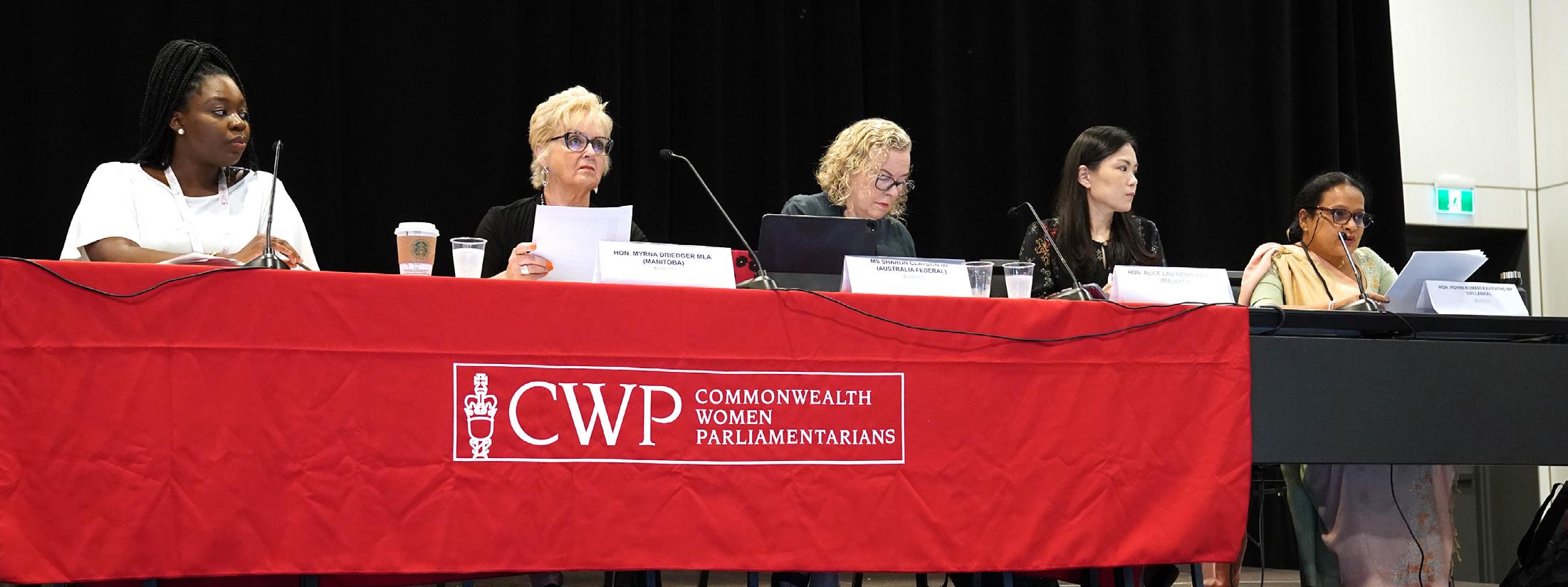
While much work remains to be done, the Government of Australia is committed to continuing the work of implementing the recommendations of the report. A multi-party task force is overseeing implementation of the recommendations and the 47th Parliament has re-established the Joint Committee on Parliamentary Standards to Continue Work on the codes of conduct. The Standing Orders and rules are being reviewed to eliminating language, behaviour and practices that are sexist or otherwise exclusionary and discriminatory. The Government is committed to creating a more family-friendly Parliament and improving access to respectful workplace training. It is also contemplating the creation of an independent parliamentary standards commissioner. On the road to equality, achieving

equal representation is just the first step; reforming the culture of Parliament is the bigger challenge. The ultimate goal is to make Parliament a model employer in Australia.
Hon. Alice Lau Kiong Yieng, MP (Malaysia) began by saying that sexual harassment is a top concern for women in Malaysia, noting that harassment is broader in nature than abuse; harassment also encompasses coercion and unwanted attention. So seriously were these concerns taken that a tribunal is being established specifically to hear and adjudicate complaints of sexual harassment. She noted the hesitancy of many victims to complain, which had in the past given the impression that sexual harassment was a lesser issue.
It was observed that sexism, harassment and abuse are intolerable violations of various fundamental rights - including the right to equality, right against exploitation, and educational rights - entrenched in numerous international legal and political instruments. Harassment, sexist remarks and abuse or physical violence are among the most widespread human rights violations in the world of politics. Studies published by the Inter-Parliamentary Union (IPU) in 2016 and 2018 revealed that 82% of female MP respondents had experienced psychological violence (sexual and sexist remarks, intimidation and threats, pictures published with humiliating or sexual connotations, etc.), 65% had been subjected to sexist remarks (in most cases made on parliamentary premises by male colleagues from their own or opposing caucuses), 25% had suffered physical violence, and 20% had been sexually harassed.
In the Dewan Rakyat, the percentage of seats held by women has increased from 10.8% in 2008 to 14.9% at present. This still trails the global average, which stood at 23.8% in 2018. Removing the barriers to the participation of women in politics is important as women’s participation in decision-making leads to more just, equitable and inclusive policies.
Hon. Alice Lau Kiong Yieng noted that there are comprehensive protections against abuse, sexism, sexual harassment and violence, citing the Federal Constitution, statute law and the standing orders of each House of the Parliament of Malaysia. These protections were supplemented earlier this year by new sexual harassment legislation which provides for a right of redress
248 | The Parliamentarian | 2022: Issue Three | 100 years of publishing
BREAK THE BIAS: GENDER EQUALITY TODAY FOR A SUSTAINABLE TOMORROW
Images credit: Christian Diotte/Parliament of Canada and Jeffrey Hyland/CPA Headquarters
for any person who has been sexually harassed, the establishment of the Tribunal for Anti-Sexual Harassment and the promotion of awareness of sexual harassment. Nonetheless, Parliament must take action to protect Members and parliamentary staff from abuse and sexual harassment. It must be made clear that allegations will be treated seriously with impartiality and confidentiality.
Hon. Myrna Driedger, MLA opined that there is still much to be done to encourage women to speak up and feel free from retaliation. She described the process by which the Manitoba Legislature created its policy on harassment. One important feature was providing that each complaint would be assigned to an independent investigator as it was recognised that the Legislature lacked the internal resources for conducting investigations adequately. An external investigation model was chosen despite the cost to ensure that investigations would be conducted thoroughly and competently. She noted recent instances at the UK Parliament and the Parliament of Canada of inappropriate language, wandering hands and even an MP appearing naked on camera during virtual proceedings. She concluded by contemplating the matter of heckling, which is messy, divisive and partisan, and wondering what effect it has on the environment in Legislatures.
Hon. Catherine Fife, MPP (Ontario) asked about the effect of social media, commenting that the harassment encountered there tends to be far worse than what one encounters face-toface. Hon. Rohini Kumari Kavirante stated that more regulation of social media is required to reduce the amount of bullying and harassment that occurs there. Hon. Alice Lau Kiong Yieng suggested that Parliament should provide more advice and guidance to MPs regarding security, including in relation to social media. There is pressure on lawmakers to behave well and set a high standard of conduct on social media. Hon. Sharon Claydon stressed the need to hold social media companies to account for having policies to deal with online abuse and harassment occurring on their platforms.
Hon. Claire Baker, MSP (Scotland) noted that her Parliament has a code of conduct in place for Members but asked what could be done about political parties. Hon. Myrna Driedger reflected on the fact that the Government of Manitoba had its own policy for civil servants, while the Legislature’s policy covered politicians and legislative staff.
Hon. Veronica Kadie Sesay, MP (Sierra Leone) emphasised the need to continue sharing ideas on combatting harassment. She stated that women in politics need perseverance and ‘thick skin’ to succeed.
BREAK THE BIAS: GENDER EQUALITY TODAY FOR A SUSTAINABLE TOMORROW
Hon. Chrizoster Passage Halwiindi Phirl, MP (Zambia) stressed the need for regional and international bodies to support women in all countries in which they are experiencing harassment and abuse and for women to support each other.
Senator Hon. Salma Ataullahjan (Canada Federal) commented on the importance of creating safe spaces for women to discuss matters of harassment and the need to deal with the culture of shame experienced by victims. Hon. Myrna Driedger opined that Speakers must provide that safe space to the Parliamentarians in their Legislature. Hon. Sharon Claydon suggested that freedom of information and protection of privacy laws may require amendment to ensure that allegations are kept confidential to better encourage reporting. Hon. Alice Lau Kiong Yieng noted that in Malaysia, a complaint to the Speaker could be referred to the Standing Committee on Rights and Privileges for investigation.
Hon. Savitri Sonia Parag, MP (Guyana) underscored the importance of fully implementing and enforcing both Standing Orders and codes of conduct applicable to Parliamentarians. She further asserted the importance of women standing up and refusing to be silent.
Hon. Shameen Thakur-Rajbansi, MPL (KwaZulu-Natal) thanked the Commonwealth Women Parliamentarians network for the training it has provided in relation to the prevention of sexual harassment. She commented that information technology should be part of the conversation and needs to be an integral part of any policies developed to combat sexual harassment. Knowledge changes attitudes changes behaviours.
Senator Hon. Ras Adiba binti Mohd Radzi (Malaysia) noted that the unique considerations of persons with disabilities must also be considered and stressed the importance of everyonemen and women - standing up for themselves against harassment. She queried how best to engage persons outside of Parliament. Hon. Sharon Claydon spoke of the strong demand for reform arising at the constituency level and underlined the need to seize the moment to act.
Hon. Siviwe Gwarube, MP (South Africa) stated the importance of not limiting conversations to women but instead mainstreaming the conversation to include men.
Hon. Julie Green, MLA (Northwest Territories) advised that her jurisdiction’s anti-harassment policy defines harassment as including retaliation against one who invokes the policy.
Hon. Nontembeko Nothemba Boyce, MPL, Speaker of the KwaZulu-Natal Provincial Legislature argued for consideration of how older women treat younger women who are entering Parliaments and ensuring that newcomers are welcomed and treated with respect. She stressed the need for maintaining an open dialogue, noting that women lead and lead well.
The recommendation at the workshop was endorsed as follows:
• National and sub-national Legislatures across the Commonwealth should ensure that their Parliaments have policies and legislation in place to effectively tackle harassment and abuse in all its forms for all persons in Parliament.

The Parliamentarian | 2022: Issue Three | 100 years of publishing | 249
“ On the road to equality, achieving equal representation is just the first step; reforming the culture of Parliament is the bigger challenge. The ultimate goal is to make Parliament a model employer.”
CWP WORKSHOP C: FINANCIAL EMPOWERMENT OF WOMEN AND GENDER SENSITIVE BUDGETING
Discussion Leaders:
• Hon. Claire Baker, MSP (Scotland)
• Ms Anoush der Boghossian, Head of Trade and Gender at the World Trade Organisation
Moderator: Lydia Buchanan (CPA Secretariat)
Rapporteur: David Hastings (Nova Scotia Legislature)
This workshop focused on the importance of the use of a genderbased lens by Parliaments when conducting their business. Specifically with respect to the development of budgets, policies and other legislation to ensure and promote both equality and the gender-inclusive economic empowerment of women across the Commonwealth.

The first panelist, Hon. Claire Baker, MSP (Scotland) provided an overview of the history and current practices of The Scottish Parliament with respect to gender sensitivity. Highlights included a description of the United Kingdom’s first family benefit in 1976, the creation of equal pay legislation, the Sex Discrimination Act of 1975, gender budgeting tools, gender equality indices and audits. It was noted that assuming that national budgets are gender neutral is a mistake. Women in Scotland working full time earn on average 6.6% less than men and women working part-time on average earn 26% less than men.
Today, Scotland employs gender budgeting tools to ensure that women’s voices are heard. For example, each year a Public Sector Equality Statement is now published with the budget. In addition, in 2020 the Scottish Government published the first ever Gender Equality Index which allows for the evaluation of policies from a gender perspective to take place. The Governance body of The Scottish Parliament as an organisation has also taken measures to increase women in leadership positions. Finally, this year an audit was initiated to review the participation of women in politics. It is scheduled to be completed later in 2022 with recommendations made to Parliament. However, interim findings have already concluded that more data and statistics must be collected and shared publicly and should be used to help inform policies.
The importance of gender sensitivity in Committee work in Legislatures was also discussed. It was noted that Scotland currently has 16 Committees in its parliamentary structure. While each Parliamentary Committee decides what it wants to focus on, policies strongly suggest that Committees scrutinise equality more closely.
The Economy and Fair Work Committee for example has decided to focus on women and gender equality which is an important forward step in a Parliament that is dominated by men.
Hon. Claire Baker concluded her remarks by noting that while the Government of Scotland would argue that they take a systematic approach to gender politics and that in modern times, there has
been progress made towards equal pay and opportunities towards employment, there is still much work to be done.
As it is the job of Parliamentarians to ensure that government meets its responsibilities, policy solutions need to be gender sensitive as women continue to be the minority of business owners. The collection and distribution of data and statistics needs to be improved upon and businesses themselves also have a duty to address inequality and pay gaps.
Lydia Buchanan from the CPA Secretariat noted that Scotland has led the way on gender equity in many areas including period poverty and also noted that the pandemic has also undone some of the progress made in closing gaps.
The second panelist of the workshop was Anoush der Boghossian, Head of Trade and Gender at the World Trade Organisation. Ms der Boghossian’s remarks focused broadly on how trade rules can assist with gender sensitive budgeting.
Three main questions were explored:
1. What is the link between trade and gender?
2. What can Parliaments do to make trade rules work for women and address women’s needs? And
3. How can the World Trade Organisation support Parliamentarians in their roles?
It was noted that people often think of trade rules as gender neutral because trade agreements typically aren’t written using terms such as gendered pronouns. This alone doesn’t necessarily mean that trade rules are gender neutral though. In reality, women face higher barriers in trade than men because of varying legal and social environments. This means that we must also apply trade rules with a gender-based lens.
A 2022 report analysing the laws of 150 countries concluded that women have just a fraction of the rights of men. Access to education, health care, child-care, property ownership, travel, banking and equity are just some of the examples of the legal and social disparities between men and women. For example, there are countries that have rules restricting the rights of women to own property. If a woman can’t own property, she can’t meet all of the collateral requirements for loans to start or expand a business. Without access to traditional financial services, you won’t have access to e-commerce, labelling, packaging, shipping, skilled workers, customs procedures etc.
Basically, if you don’t have access to funds, you don’t have access to trade. However, trade rules can have beneficial impacts on women if applied through a gender lens which is why Parliaments need to establish laws that overcome these barriers.
We are also starting to see gender provisions being adopted within trade agreements. Regional Free Trade Agreements that have recently been adopted by countries are beginning to contain gender provisions. Most of these changes have been initiated in African countries and cover areas including access to work, equal access to education, capacity building and training.
250 | The Parliamentarian | 2022: Issue Three | 100 years of publishing
BREAK THE BIAS: GENDER EQUALITY TODAY FOR A SUSTAINABLE TOMORROW
What role can Parliaments play in ensuring gender equality in Trade Agreements?

1. When you have an agreement concluded it has to be ratified by Parliament. Some Parliaments can also shape the mandate of these agreements.
2. The role of Parliament doesn’t stop at ratification. Parliament’s role is to scrutinise government activities and the creation of these agreements. Parliaments can also scrutinise how these agreements impact women.
3. Parliaments need access to data about the impacts on gender in trade agreements. However, some governments face challenges with the collection of statistical data. Parliaments have the ability to talk to female business owners, farmers etc. to gather information that would be helpful. In the collection of data, we often see that women don’t respond to surveys because of a lack of trust in their government. Parliaments can also build budgets that could fill some of the knowledge gaps for statisticians.
4. Using existing funds or financial incentive measures in policies as a model to help women. For example, some programs for small business could include equipment for women, or financial support in terms of guarantees or loans that are favourable to women can be implemented. It is important to understand the impact that these focused types of assistance can create.
How can the World Trade Organisation (WTO) help? Three ways were outlined below:
1. Training and capacity building programs designed for government officials. It could also be possible to have a dedicated session for Parliamentarians on gender.
2. WTO research targets – A specialised club to bring research together so information on gender can all be stored in one easy to access place. The WTO can be a valuable source of information.
3. Informal working group on trade and gender in the WTO. About 85% of the WTO membership is part of this group. The overall objective is to remove trade barriers for women. One way is to build their policy making capacity and expertise. This platform is used to share best experiences. Individuals can then in turn bring their experiences to public officials.
BREAK THE BIAS: GENDER EQUALITY TODAY FOR A SUSTAINABLE TOMORROW
The workshop continued with a question and answer section. Arif Zaman, Executive Director of the Commonwealth Business Women’s Network asked what can Parliamentarians do given that governments have agreed to ensure the developments of the ITC are implemented.
The importance of understanding how these things impact women was discussed. Of all the amendments to Free Trade Agreements mentioned, only 11 mention impact assessments. Further, a lot of things adopted are non-binding so corporations can claim that they just haven’t been able to implement them. This is something that more and more businesses should discuss. How do we understand the impact? Parliaments have more of a role in asking governments what they are doing to bring the voices of women to government.
Hon. Catherine Fife, MPP (Ontario) asked about the power of procurement. Giving women access to procurement contracts should not be viewed as charity. Women entrepreneurs and BIPOC entrepreneurs have so much to contribute but the people or businesses getting public contracts often don’t look like the general population.
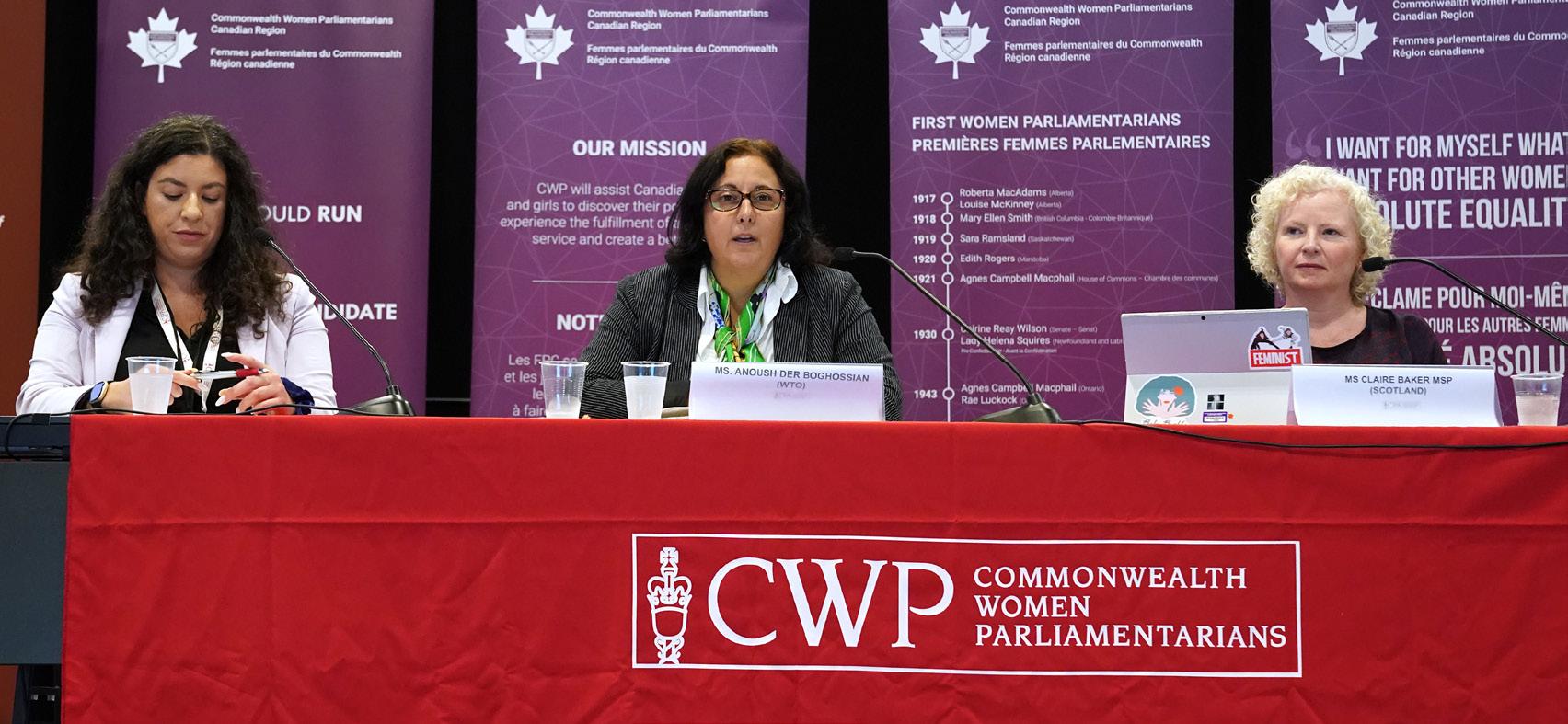
The importance of getting smaller contracts to more businesses and more authority at the local level was discussed. Scotland has a best value approach which isn’t all about the lowest costs. When it comes to procurement, we have to think about how best to improve things for community and businesses.
It was also noted that only 1% of female business owners access procurement. That figure is very small. One way to resolve that is to support women entrepreneurs to scale up their businesses. There is also a lack of transparency and access to information so women don’t know where to access contracts.
When government wants to support women entrepreneurs through procurement, they’ll often try to do it by quota – i.e. 10-15% of the contacts to women. But some women don’t trust the government or don’t get paid on time so their experience is negative. There are so many aspects to these issues that we must look at the whole picture to see why women aren’t accessing these contracts.
Hon. Onica Dipuo Medupe, MPL (North-west) asked about laws that compel governments to do things that will favour women and how to make sure that such laws are in place. One of the panelists replied that there is an association that supports women in business in Scotland that is relied upon by law makers a lot. It was established based upon the Canadian and US models to support women in business.
Hon. Ayanda Bans, MPP (Western Cape) commented that the Department of Health in this jurisdiction is now called the Department of Health and Wellness. Politicians have had a role to play in this name change – health and wellness recognises the
The Parliamentarian | 2022: Issue Three | 100 years of publishing | 251
Images credit: Christian Diotte/Parliament
of Canada and Jeffrey Hyland/CPA Headquarters
importance of women’s health. It will also recognise the significant mental health impacts that COVID-19 has had on communities.
The panel noted that data is so important because it can be difficult to see where things are going. Sometimes it is not that men try to skip benefits for women, it is that they don’t have a full picture. For this reason, everyone – including governments and the private sector - need to apply a gender lens. One of the panelists offered the example that seat belts for cars are designed for men not women. This is just one of so many examples of things that can negatively impact women - but that aren’t necessarily intentional.
Hon. Bridgid Annisette-George, MP, Speaker of House of Representatives (Trinidad and Tobago) asked what can be done to ensure that we train Parliamentarians. With proper training, Parliaments can hold governments to account but without that capacity there won’t be progress made on gender. The panel noted that gender issues can be so cross cutting that it can feel like you need to be an expert just to be involved. This institution could consider starting programs or adding more sessions on these issues.
Hon. Gadija Brown, MPL (Free State) commented that this discussion covered how women generally go into NGOs because they are a softer environment. With respect to proprietorship, statistics show the same even though great measures have been taken to encourage women to participate in procurement etc. It was proposed that this area of study could expand. For example, some places still require women to travel with a male. The commonality that women share are socio-economic challenges such as human trafficking. World banks and Legislatures need to ensure that women have fast access to a common legislative environment to participate in the economy.
Hon. Janet Routledge, MLA (British Columbia) noted that the Finance Committee in the Legislative Assembly of British Columbia had just completed a public consultation on what should be in the next budget. Many individuals and organisations took time to document the social return on investment – the things they want the government to spend money on. For example, CAN$10 per day on childcare. Early diagnosis of children with special needs is critical so they can be integrated into society at less cost. There is a link between social investment and gender equality. Spending money up front can save money later. Cost cutting can also cost society more in the long run.
Hon. Grace Kwelepeta, MP (Malawi) offered comments on the challenges faced by women to become familiar with technology. Access to more technology programs will empower women.
Hon. Nicole Tan, MLA (Negeri Sembilan) spoke about the state of gender equality in Malaysia. Only 5% of the Members of her Parliament are women. Only 0.05% of the budget is dedicated to women but women are 50% of the population and 50% of the voters.
A question was raised with the panel as to whether there is difference between gender responsive budgeting and gender sensitive budgeting. The panel responded that gender responsive budgeting goes further. It responds to specific needs of women. Gender sensitivity could acknowledge women’s needs but may be non-binding. One step even further is gender transformative which transforms positively the lives of women. There is a hierarchy in these concepts.
Hon. Siviwe Gwarube MP (South Africa) spoke about three main points – firstly, the exclusion of women in the high profile Ministries and how women often end up with smaller portfolios rather than finance or justice. Secondly, whether a Parliament could reject a budget because it is not gender sensitive? Finally, how there is a general lack of understanding about financing through a gender lens.
Hon. Iqra Khalid, MP (Canada Federal) commented that there is a need to commit to equity in financial literacy at a young age.
The panel noted that there are many examples of barriers being broken down but much progress is still needed. The challenge is not just women in business, but also the wage gap. The retail sector is dominated by women but is often low paid. Only 30% of Ministers are female. If you look at ambassadors that number goes down to 19%. When it comes to decision making only 15% of women are in a decision making capacity. Whereas in the secretariat world, half the staff are female.
Financial literacy is a very important point. This is something that has been an interesting trend that we can see. We also see that new technologies are helping women become financially literate but also helping with things like preparing financial reports that they can present to financial institutions etc.
The workshop endorsed the following recommendation:
• Commonwealth Parliaments must ensure that all budgets incorporate a gender lens and all policies are gender sensitive.

NEW GENDER-SENSITISING PARLIAMENTS FIELD GUIDE
The Commonwealth Women Parliamentarians (CWP) network has launched its Gender Sensitising Parliamentary Guidelines: A Seven-Step Field Guide which provides a blueprint for Commonwealth Parliaments interested in undertaking a Gender Sensitive Parliament (GSP) review with the objective of making their Parliaments more representative and inclusive. The Field Guide builds on earlier CWP gender sensitising reports, in which a GSP is defined as a place that responds to the needs and interests of women in its structures, operations, methods, and work and is a workplace that removes barriers to women’s full participation.

252 | The Parliamentarian | 2022: Issue Three | 100 years of publishing
BREAK THE BIAS: GENDER EQUALITY TODAY FOR A SUSTAINABLE TOMORROW
Visit www.cpahq.org to download your copy or email hq.sec@cpahq.org.
BREAK THE BIAS:
EQUALITY
SUSTAINABLE TOMORROW
CWP WORKSHOP D: PROMOTING GENDER SENSITIVE PARLIAMENTS POST-PANDEMIC

Panel Chair: Hon. Bridgid Annisette-George, MP, Speaker of the House of Representatives (Trinidad and Tobago)
Discussion Leaders:
• Rt Hon. Dame Maria Miller, MP (United Kingdom)
• Hon. Iqra Khalid, MP (Canada Federal)
• Hon. Jacqui Dean, MP (New Zealand)
Moderator: Bénite Dibateza (CPA Secretariat)
Rapporteurs: Ginelle Starritt and Melissa Kosik (Nova Scotia Legislature)
This workshop focused on the challenges of actively recruiting women to enter politics after the COVID-19 pandemic. Issues that were faced by women Parliamentarians pre-pandemic have intensified during the COVID-19 pandemic.
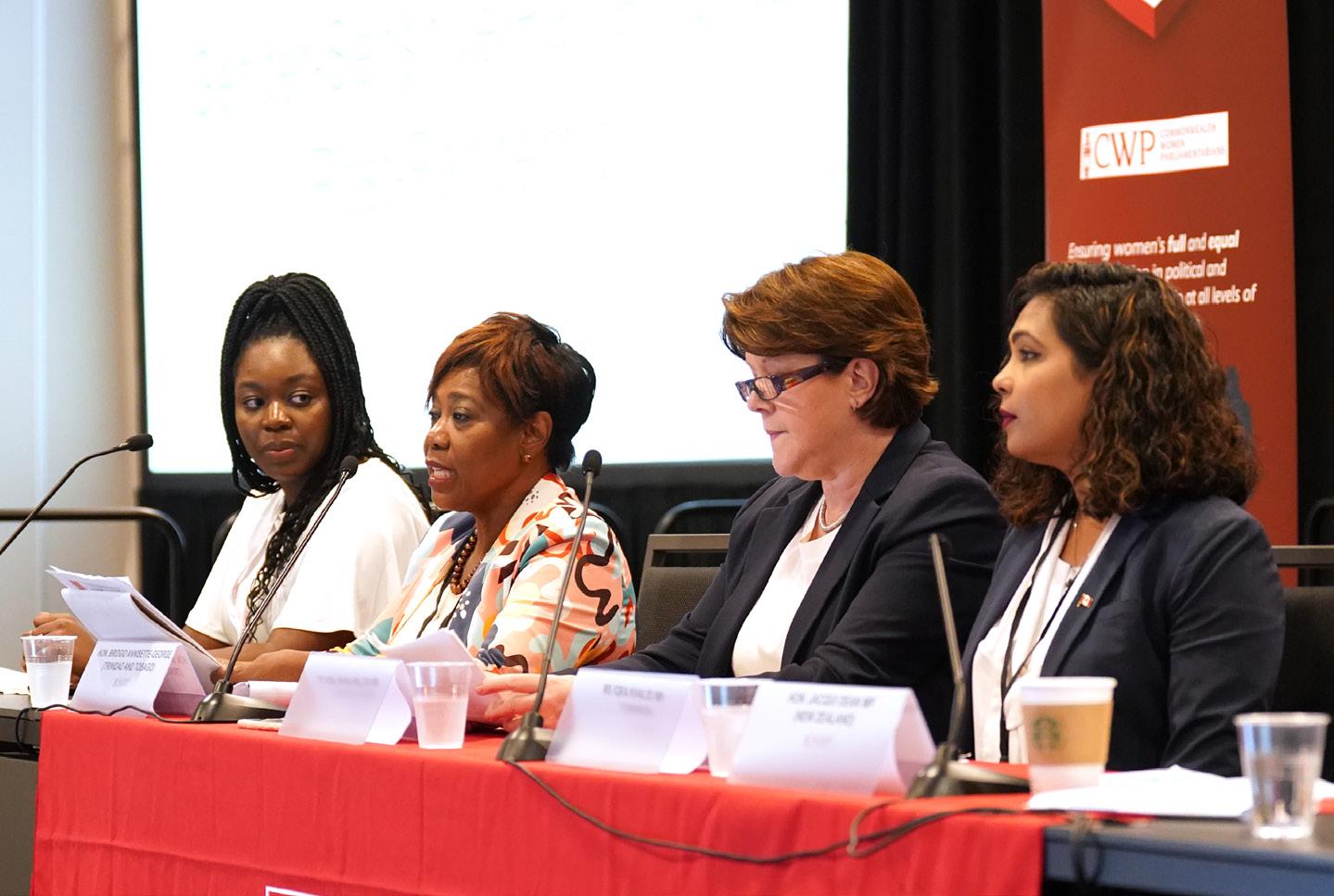
Panel Chair, Hon. Bridgid Annisette-George, MP, Speaker of the House of Representatives (Trinidad and Tobago) opened the discussion by stressing that Parliaments should actively work at the recruitment and retention of women working in parliamentary administration and other internal staff, not just as elected officials. Parliament should be a place where women want to contribute; not just a place to work. Gender privilege and the disenfranchisement of women can be caused by underrepresented Parliaments. She noted that promoting and achieving equality across all bodies and structures of Parliament by fostering an internal culture that respects women’s rights can help achieve gender sensitive Parliaments. She further stated that Parliaments should respond to the needs of Members of Parliament to balance work and life responsibilities.
Rt Hon. Dame Maria Miller, MP (United Kingdom) stated that political parties have been left to fix the problem of gender equality, but feels Parliaments have a pivotal role in ensuring that more women are elected. She urged all of the CPA and CWP network to support women to become Parliamentarians as after more than a decade of work, we have not made as much progress as needed. A strong Parliament needs to be transparent,
accessible, accountable, effective and representative of all constituents. Parliaments elect eight men for every two women, and some have no women representatives at all. She emphasised that it is everyone’s responsibility to support women to become Parliamentarians.
Rt Hon. Maria Miller noted that the UK has been focusing on the recruitment of women but feels that organisational change needs to happen to retain women in Parliament. Most Parliaments were established when women did not have equal rights, so there are entrenched systems in place that are preventing the participation of women. The three key components of change she outlined were cultural, systemic and procedural.
Cultural change would include no toleration of bullying or harassment, addressing behaviour between Members and wider societal issues like social media. System changes would need to consider how people view the organisation from the outside and look to provide parental support, childcare and identify career paths. Procedural change would look to find the best way for all to participate and ensure that both women and men have equal access to be representatives, which could include hybrid or remote work or shorter sitting hours.
Panelist Hon. Iqra Khalid, MP (Canada Federal) highlighted Canadian Prime Minister Trudeau’s commitment to gender parity in Cabinet when first elected in 2015 and the impact that has had. Issues such as pay equity, period poverty and making childcare more affordable could be raised and pushed due to more women in Cabinet. Prior to COVID-19, women were discussing the need for more family friendly sitting hours and improving the quality of life for Parliamentarians. Hybrid sittings gave the opportunity for
The Parliamentarian | 2022: Issue Three | 100 years of publishing | 253
GENDER
TODAY FOR A
Images
credit:
Christian Diotte/Parliament of Canada and Jeffrey Hyland/CPA Headquarters
BREAK THE BIAS: GENDER EQUALITY TODAY FOR A SUSTAINABLE TOMORROW
Parliamentarians to be in their constituency and vote in the House without travel. There is political will amongst Parliaments to explore the idea of virtual participation to facilitate participation for people that would traditionally be unable to contribute due to the working hours required. Parental leave for MPs was first introduced in 2019 which gives 12 months of leave; however, she acknowledged that there is much room for growth.
The COVID-19 pandemic exposed many vulnerabilities. Women leaving their jobs to care for children or relatives, an increase in gender-based violence and last to be hired back after shutdowns. She emphasised that collectively we can help each other by repeating the questions and demands from other fellow Parliamentarians if they are not being heard. Repeating
the question until the issue must be addressed. She encouraged delegates to proactively reach out to women in their communities for feedback about how gender-sensitivity can be built into the policies that are being written. Combating at a systemic level the issues that women face is vital if we wish to continue to recruit women in politics or areas of leadership. Legislation to stop online hate is needed as it is a major barrier for women to enter into this career path.

The third panelist, Hon. Jacqui Dean, MP (New Zealand) acknowledged how hard COVID-19 has been on all communities but it has also provided an opportunity to think how we run our Parliaments. A review on the culture of the Parliament of New Zealand resulted in a code of conduct and the appointment of an independent Parliamentary Commissioner which provides a safe and confidential way for anyone to make a complaint if harassed.

The focus for New Zealand in the past five years has been on making the Parliament more accessible and family friendly which in turn can change the dynamics and atmosphere within Parliament. A family room in the Parliament building gives a place for Parliamentarians to bring their children and feed and change babies, has toys, nap area and bathrooms with showers. Dogs are now allowed at work. This can sometimes completely change a social dynamic and make an environment more approachable. The pressure of the job can be expressed through anger and frustration and children and pets can help break down the barriers, which makes it a safer place for all MPs and their families.
She stated that those of who have the privilege to serve their communities, need to continue to promote the culture of respect that should be entrenched in the political movement, starting with the Leader of the party. A former MP told her that the job you do
254 | The Parliamentarian | 2022: Issue Three | 100 years of publishing
“ Cultural change would include no toleration of bullying or harassment, addressing behaviour between Members and wider societal issues like social media.
System changes would need to consider how people view the organisation from the outside and look to provide parental support, childcare and identify career paths. ”
Images credit: Christian Diotte/Parliament of Canada and Jeffrey Hyland/CPA Headquarters
BREAK THE BIAS: GENDER EQUALITY TODAY FOR A SUSTAINABLE TOMORROW
is important but that doesn’t make you important and one should not forget that they are public servants. If Parliamentarians treat their staff well and treat others with respect in the chamber, the tone in the chamber can change.
Hon. Bridgid Annisette-George responded to the panelists remarks by outlining the mentoring program that her Parliament has established to help promote leadership in young women in Trinidad and Tobago. Roughly 30 women are trained annually in leadership, professional development, mentorship, training in parliamentary practice and procedure and the program ends with a model Parliament. An art gallery in the Parliament is another initiative being used to help remove the mystic of Parliament and help women feel comfortable expressing their voice in Parliament.
During the question and answer part of the workshop, Hon. Lesa Semmler, MLA (Northwest Territories) discussed the issue of social media attacks on women and how many women, who may otherwise run for office, are hesitant due to the effects of the job on the family and the potential danger. She stated that the violence against women politicians during the pandemic was even more extreme and many held politicians responsible for the pandemic and the issues resulting from measures taken.
Hon. Sarah Pallett, MP (New Zealand) asked questions regarding parental leave and wondered who does the work of the Parliamentarian on leave and how does pay work. Hon. Iqra Khalid replied that the work was divided up amongst the other Members
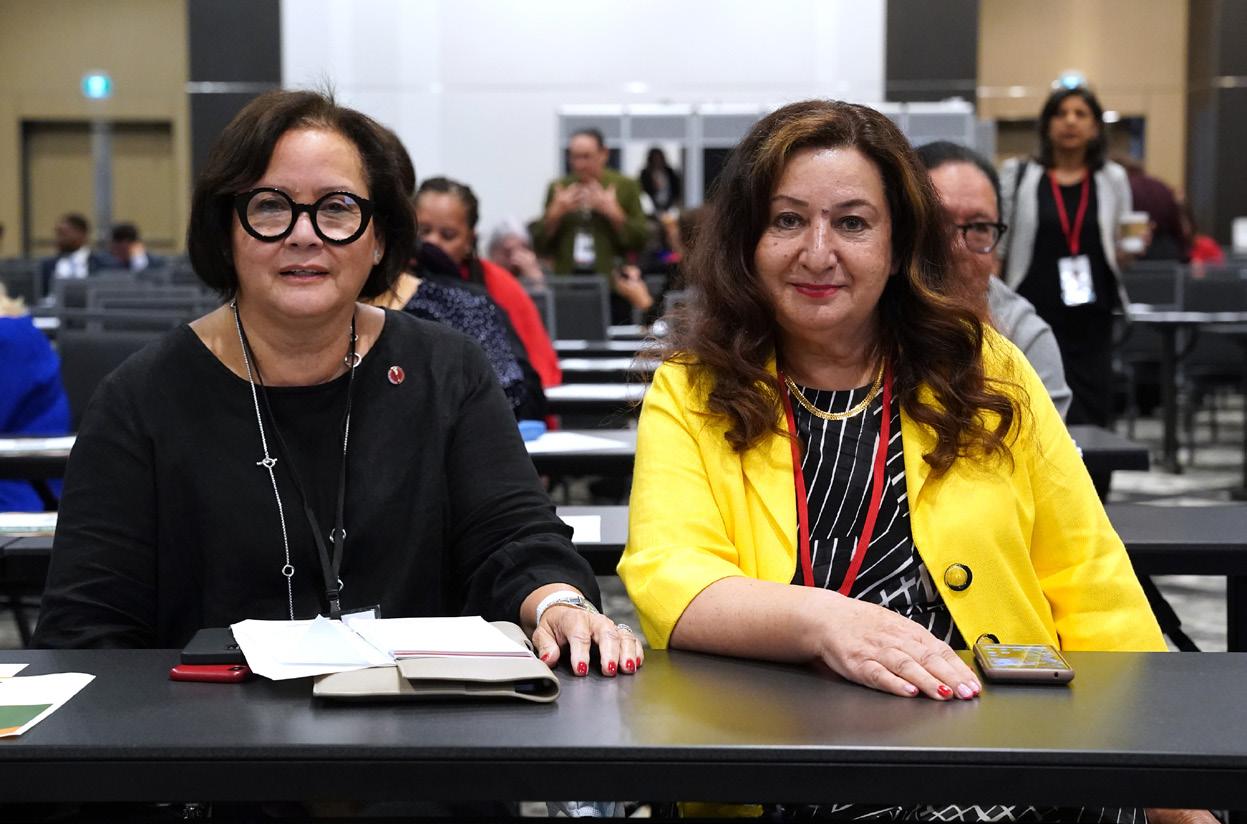
and local politicians and the pay was similar to the Employment Insurance system that is in place for all Canadians. Rt Hon. Maria Miller responded that, unlike in Canada, proxy voting is allowed which allows Members on leave to participate in votes. The party whips play an important role in making sure that people get the time off that they need.
Hon. Lisa Morris-Julian, MP (Trinidad and Tobago) discussed the importance of daycare in encouraging younger women to participate, otherwise women will choose marriage and children first and becoming a Parliamentarian later in life. She stressed the need for our children to see what we do for work, and so when we are away for work, they can understand why.
Hon. Valerie Woods, MP, CWP Vice-Chairperson and the Speaker of the National Assembly (Belize) suggested that for future CPA conferences the gender issues should be in the main conference and not as a silo so the male Parliamentarians can understand the issues too. Rt Hon. Maria Miller stated that Parliaments have left it to parties to sort out the gender issue which means the structure doesn’t make it an appealing place for women to work. The evidence shows that women succeed once they get elected but we need to get them to cross the threshold. She felt a focus on the culture as well as the facilities will help make Parliament a place that women aspire to be.
Hon. Lianne Rood, MP (Canada Federal) commented that being a Parliamentarian can be a short-term career and that makes it daunting for women to choose such an unpredictable career. Public service requires sacrifice, but the choice of stability means many women will not run for office. She encouraged greater thinking ‘outside the box’ to make it more appealing for women.
At the end of the workshop, the following recommendation was approved:
• Commonwealth Parliaments should use lessons learnt from the COVID-19 pandemic to proactively explore gender sensitive practices and policies.
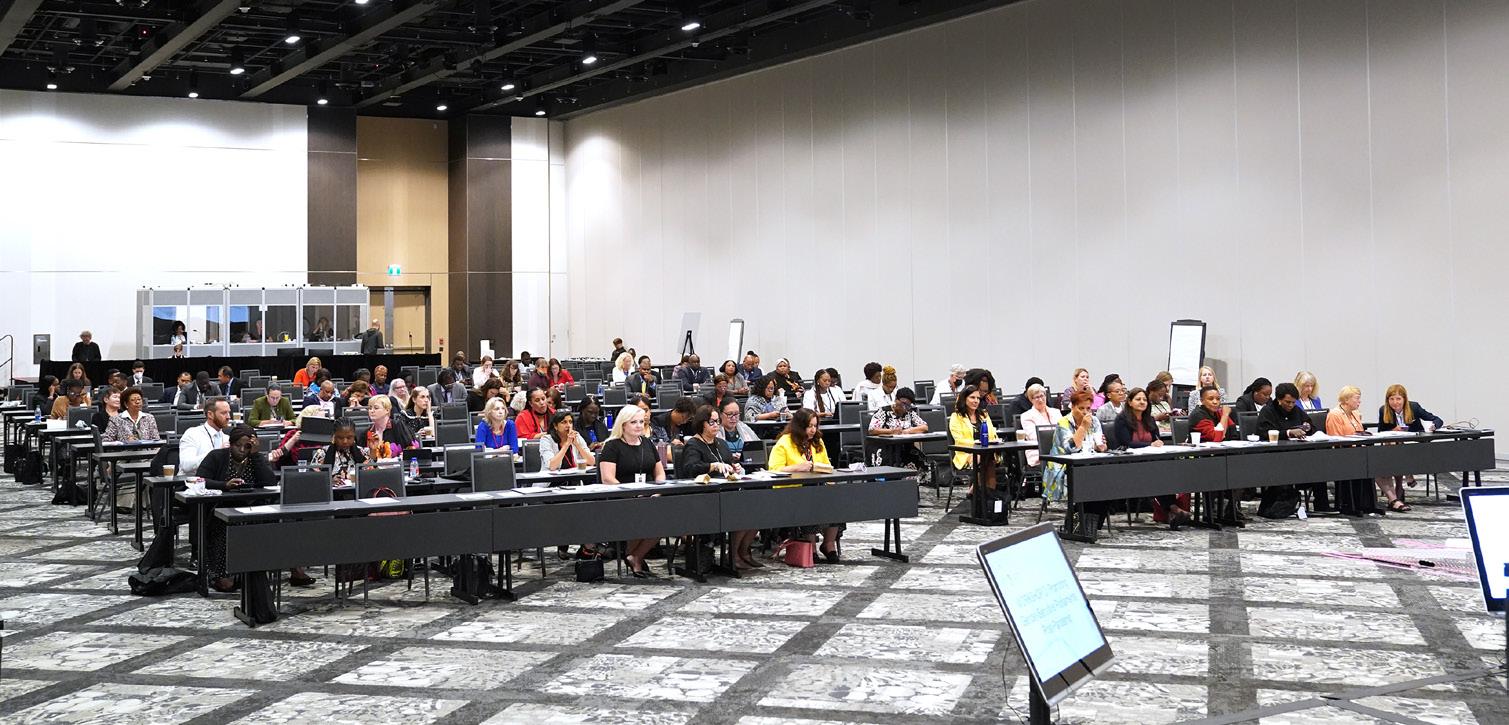

The Parliamentarian | 2022: Issue Three | 100 years of publishing | 255
“ Procedural change would look to find the best way for all to participate and ensure that both women and men have equal access to be representatives, which could include hybrid or remote work or shorter sitting hours.”
Images credit: Christian Diotte/Parliament of Canada and Jeffrey Hyland/CPA Headquarters
COMMONWEALTH PARLIAMENTARIANS FOCUS ON THE RESILIENCE AND PREPAREDNESS OF THE SMALLEST JURISDICTIONS AT 38 th CPA SMALL BRANCHES CONFERENCE
Over recent years, logistical, financial and infrastructure demands have placed huge demands on the smallest jurisdictions in the Commonwealth, and Parliaments and Governments are increasingly required to prepare for different eventualities. Commonwealth Parliamentarians met at the 38th CPA Small Branches Conference from 21 to 22 August 2022 to examine the unique challenges they face. The conference discussed strategies to meet the unique developmental needs of the CPA’s smallest Legislatures through key thematic seminars and development activities that will build parliamentary capacity for CPA Small Branches and create greater opportunities for the sharing of knowledge, parliamentary strengthening and cooperation across the network.
The newly elected CPA Small Branches Chairperson, Joy Burch, MLA, Speaker of the Australian Capital Territory Legislative Assembly said: “The CPA Small Branches Conference helps to build capacities for the small Parliaments and Legislatures of the Commonwealth and create greater and more constant opportunities for the sharing of knowledge and cooperation across the CPA network. The CPA Small Branches come together to address their common difficulties, common strengths and their shared experiences.”
The Members of the CPA Small Branches elected the Speaker of the Australian Capital Territory Legislative Assembly as the new Chairperson of the CPA Small Branches, following her time as the Acting CPA Small Branches Chairperson since February 2021. The role of Chairperson of the CPA Small Branches is an Officer role within the CPA’s governance structure and the new incumbent will sit on the CPA International Executive Committee to bring a voice for Small Branches to the governing body of the CPA.
The CPA Small Branches network highlighted the importance of tackling climate change for the Commonwealth, especially its 31 small and developing states which are often the least polluting but the first casualties of climate change.
The CPA Secretary-General, Stephen Twigg said: “The CPA works with its Small Branches network across the Commonwealth in strengthening parliamentary democracy. The smallest of the CPA’s Legislatures seek to meet the same expectations of service delivery as larger Legislatures and in doing so, they recognise the importance of constantly innovating in the face of fiscal and human resource constraints; and the threats in the face of climate change to some of the Commonwealth’s most vulnerable.”
The CPA Small Branches Conference included four plenary sessions exploring key themes proposed by the Membership: Of the over 180 Branches of the CPA, forty-three Branches are classified as ‘Small Branches’. Examples of CPA Small Branches include Commonwealth countries such as Barbados and Tonga, as well UK Overseas Territories such as Turks and Caicos or states and provinces within larger countries like Northwest Territories in Canada or the Northern Territory in Australia.
The 38th CPA Small Branches Conference took place as part of the wider 65th Commonwealth Parliamentary Conference in Halifax, Nova Scotia, Canada.
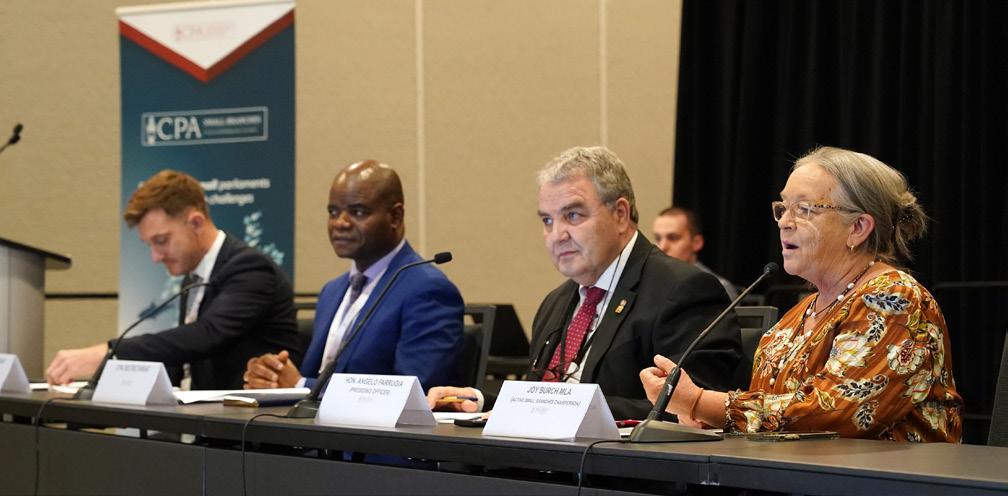



256 | The Parliamentarian | 2022: Issue Three | 100 years of publishing
Images credit: Christian Diotte/Parliament of Canada and Jeffrey Hyland/CPA Headquarters
RESILIENCE AND PREPAREDNESS OF CPA SMALL BRANCHES
CPA SMALL BRANCHES WORKSHOP A: DISASTER RISK PREPAREDNESS FOR SMALL JURISDICTIONS

Discussion Leaders:
• Hon. Fekitamoeloa Utiokamanu, Minister of Foreign Affairs (Tonga)
• Professor Kate Cochrane (Durham University, United Kingdom and Head of Resilience, NHS Highlands, Scotland)
Moderator: Jack Hardcastle (CPA Secretariat)
Rapporteurs: Mr James Charlton and Mr Tamer Nusseibeh (Nova Scotia Legislature)
This session explored the range of governance mechanisms that small jurisdictions have and can implement, including through institutions, policies and legal frameworks that coordinate and oversee disaster risk preparedness. It also explored how the application of different disaster risk preparedness strategies has enabled small jurisdictions to increase their resilience and become more prepared in the face of disasters.
To introduce the workshop, Jack Hardcastle (CPA Secretariat) outlined the importance of disaster risk preparedness, noting that small jurisdictions are disproportionately affected by climate change. For that reason, it is of particular importance to consider the risks and governance responses.
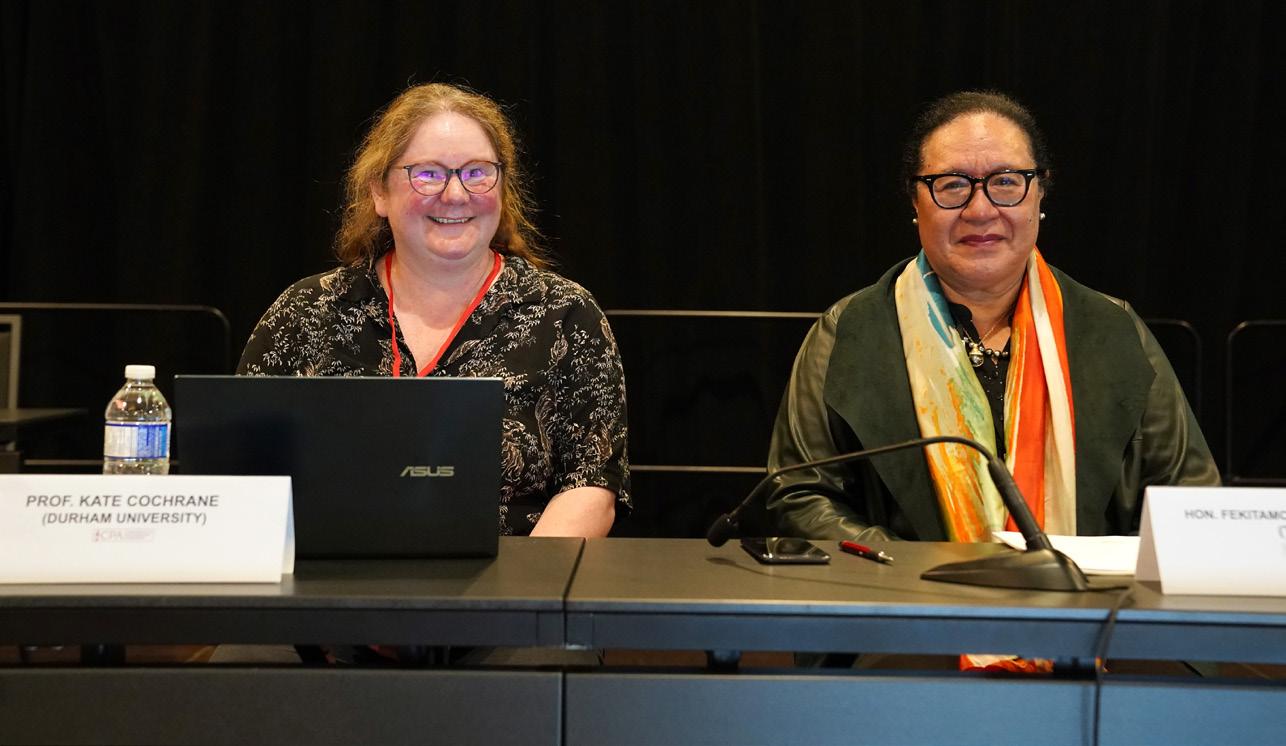
Professor Kate Cochrane, Durham University (United Kingdom) and Head of Resilience, NHS Highlands (Scotland) started the discussion by observing that people usually perceive disaster management as being all about organisational charts and strategic plans. In fact, it is about people and what is caused to communities of people by natural hazards. She framed the discussion by remarking that those facing the consequences of a disaster are experiencing perhaps the most difficult moment of their lives and deserve the best that responders can muster, and by noting that while observation leads to learning, each disaster is its own unique experience.
Professor Cochrane spoke of the vocabulary of disaster management, with particular reference to the definitions established by the Sendai Framework for Disaster Risk Reduction and by the World Health Organisation. Disaster occurs when hazardous events interact with vulnerable communities to create disruption that exceeds the capacity of the communities to adjust and cope. Resilience is a measure of a community’s capacity to resist, absorb, accommodate and adapt to, and recover from the effects of a hazardous event; it is also a measure of a community’s empowerment to prevent hazards from transforming into disasters. The
nature of hazards, threats and risks were also considered. Hazards may arise naturally or as a consequence of human action. While perils may be classified, it was stated that the cause of a disaster is not as relevant to disaster preparedness as the consequences. The important question is about how one talks to communities about the risks they face and how to deal with them.
While there is broad scope for what might be included in an emergency plan for responding to a disaster, Professor Cochrane emphasised that what is essential for a plan to contain for the purpose of responding immediately to a disaster is the answer to five questions: Who is in charge? Who is part of the response team? What decisions are to be taken automatically? What must be thought about? From where may additional support be obtained?
Professor Cochrane advised that another important aspect of disaster preparedness is knowing who will need help the most. Contrary to what one might assume, this is usually not the most vulnerable health-wise or those living in the areas of greatest risk. People in a vulnerable state of health are usually adept at managing their ongoing conditions while persons in areas of elevated risk are usually aware of the risks and able to take steps to mitigate them. Rather, she noted that marginalized persons (e.g., the impoverished, the precariously housed, victims of domestic violence, recent newcomers) and those who did not heed warnings about the risks are the most likely to need assistance.
Finally, Professor Cochrane considered the need for accessing additional help and the questions to be considered - what is needed, when, from whom, how it is to arrive, and how long the need will last. As with most aspects of disaster preparedness, determining what disaster management looks like locally is about know the correct questions to ask.
Hon. Fekitamoeloa Utiokamanu, Minister of Foreign Affairs (Tonga) continued the discussion by addressing the disaster risk preparedness experience in Tonga. She advised that Tonga is the country subject to the second-greatest risk from geological hazards and climate change due to its geography and limited
The Parliamentarian | 2022: Issue Three | 100 years of publishing | 257
Images
credit: Christian Diotte/Parliament of Canada and Jeffrey Hyland/CPA Headquarters RESILIENCE AND PREPAREDNESS OF CPA SMALL BRANCHES
capacity to finance its reconstruction and climate resilience. Earlier in 2022, a volcanic eruption blanketed Tonga in ash and darkness. The eruption affected 85% of its population and costs associated with the disaster amounted to 34.6% of the island’s GDP. She noted that earthquakes, tsunamis and cyclones are recurrent hazards to Tonga; cyclones are the most frequently experienced hazard with between one and three cyclones making landfall in Tonga each year. She commented that island nations are among the most highly susceptible to climate change and natural disasters; Tonga’s experiences reflect this fact.

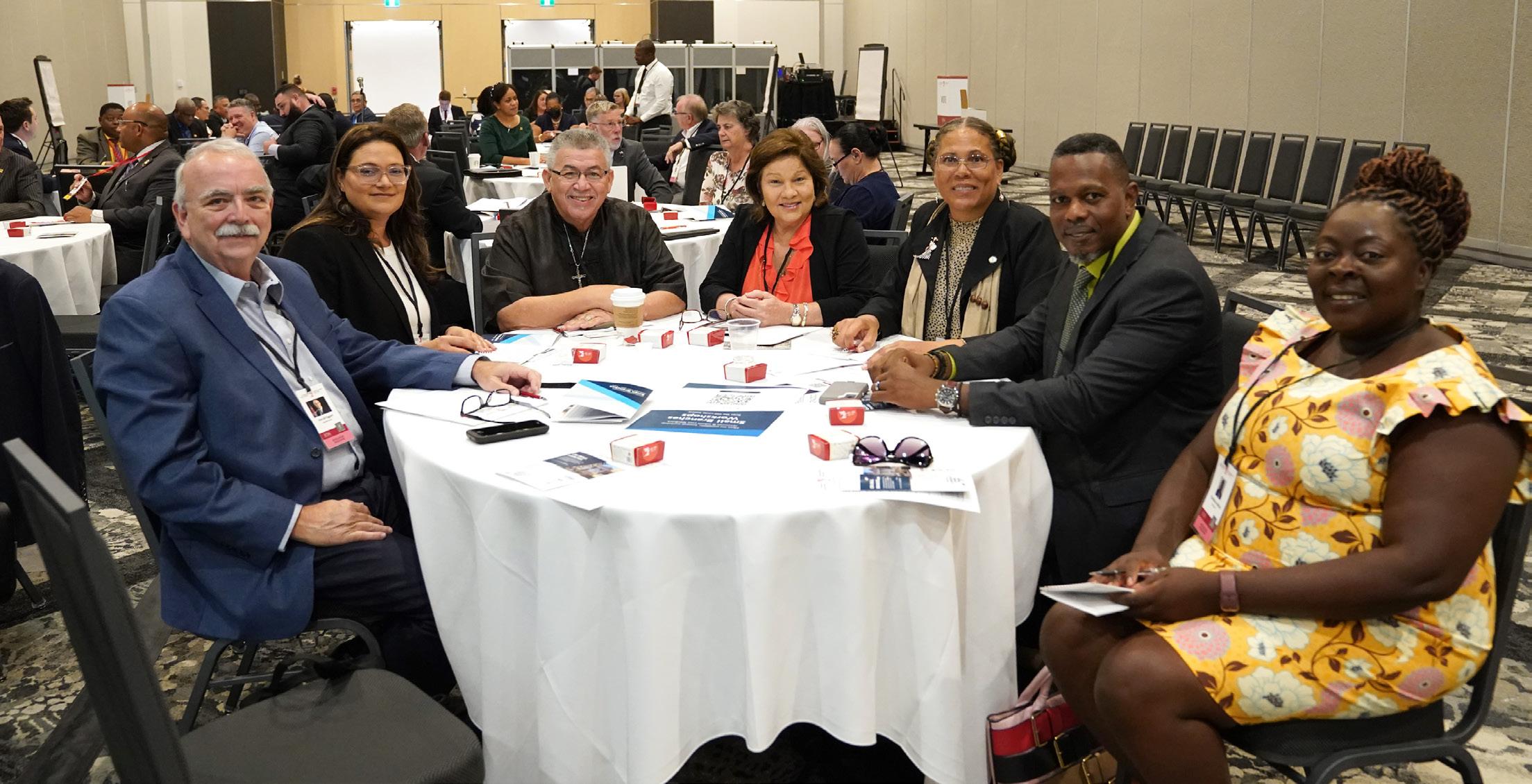
Parliaments are animated by the concerns of their constituents and must be able to act in the wake of disasters. Hon. Fekitamoeloa Utiokamanu described a series of measures undertaken by the Parliament of Tonga over the years to address disaster risk preparedness. Among them were the following: the passage of the Emergency Management Act setting out the legal framework applicable to emergency management, requiring annual reporting on activities to enhance or maintain emergency management functions and establishing a National Emergency Management Plan; the passage of the Emergency Fund Act permitting, with the permission of Cabinet, an annual appropriation from the public fund into an Emergency Fund, the purpose of which is to provide timely and efficient relief and reconstruction in any emergency; the establishment of a Standing Committee on climate change and environment, the mandate of which includes disaster management; developing a disaster risk financing strategy for financing options following the occurrence of a disaster - 80% of climate financing is supported by partnerships; developing a post-disaster procurement framework to expedite the immediate response following a disaster; and the passage of the Ozone Layer Protection Act which regulates the use and import of materials harmful to the ozone layer. The priority for Parliament has been improving national resilience to climate change.
Small jurisdictions continue to have limited means and capacity to respond to and manage the risks of the ever-accelerating climate change and disasters. While legislation and other government actions can address the consequences of climate changes, the causes of climate change are happening elsewhere and lie beyond the control of small jurisdictions. For that reason, regional and lobal cooperation is needed to complement domestic action. The continuing human and financial toll wrought by disasters is a reminder of the urgent need to invest in more disaster risk preparedness.
Hon. Barbara Webster-Bourne, Speaker of the Anguilla House of Assembly asked whether support for Tonga came from private sector sources or from international organisations and other states, whether support was received via loans or grants and whether the CPA had offered aid. Hon. Fekitamoeloa Utiokamanu replied that humanitarian aid was received from the private sector, the Tongan diaspora and from international non-governmental organisations, including the World Bank. Support from the World Bank came in the form of grants. Jack Hardcastle advised that the CPA Secretariat could provide support for capacity building, but not direct financial support.
Deputy Dr David De Lisle (Guernsey) opined that the subject of preparedness should be discussed more. He commented that much planning is conducted as an afterthought; even when responsibility for preparedness is assigned to civil servants, the work is usually conducted on the periphery of other tasks. Resources are limited and must be shared with competing interests. The questions of what preparedness is required and how it is implemented must be considered more. He suggested a distinction between preparing for recurring issues and irregular issues that are less predictable. How, he asked, should small jurisdictions prepare for such issues?
258 | The Parliamentarian | 2022: Issue Three | 100 years of publishing
RESILIENCE AND PREPAREDNESS OF CPA SMALL BRANCHES
Images credit: Christian Diotte/Parliament of Canada and Jeffrey Hyland/CPA Headquarters
CPA
Professor Cochrane responded that preparedness is based on risk, and it can be hard to motivate people to consider risks they cannot readily perceive. For Guernsey and similar small islands, the key risks are supply lines and the fragility of utilities. One must understand the risks and consequences to inform how one is to prepare; for example, this might entail investing in the infrastructure needed to cope with the risks and in people to avoid being dependent on only one person or a few people for critical skills. The emergency plan then becomes a tool to deal with residual risk.
Hon. Fekitamoeloa Utiokamanu stated that legislation provides the framework for preparation. The program of response by government must include arrangements of coordination of activities and of implementation and distribution of support. It is necessary to ensure that infrastructure is resilient to disasters.
Hon. Willin Belliard, MHA (Turks and Caicos) wondered how the CPA could assist aside from its capacity building efforts and suggested that individual CPA Small Branches might use the CPA to facilitate connecting with nearby jurisdictions to assist with their responses to disasters. Jack Hardcastle commented that one of the strengths of the CPA is its ability to connect jurisdictions across the Commonwealth with one another.
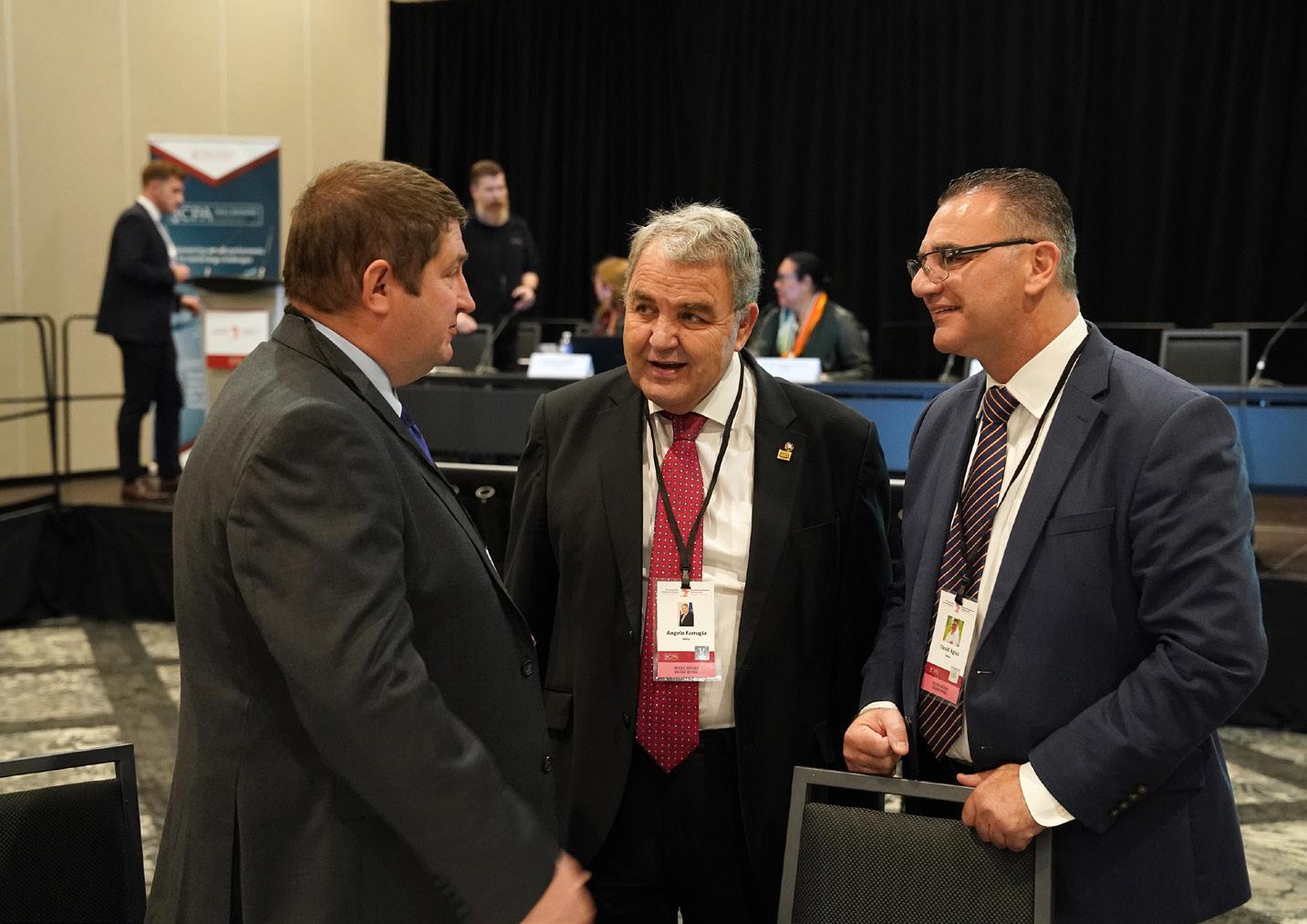
Hon. Mark John Pollard, MLA (Falkland Islands) noted that much of the work on disaster preparedness is happening in silos with CPA Small Branches each acting on their own. He considered that the biggest issue is in obtaining sufficient resources. He questioned how CPA Small Branches can best pool their resources. Professor Cochrane responded that it is important for jurisdictions to have conversations with each other and to identify people who can work in teams across multiple spaces.
The workshop concluded with a small group activity, with participants being tasked with devising a disaster resilience strategy for a small island, considering how best to build knowledge, strengthen governance and invest in disaster resilience.
The recommendation at the workshop was endorsed as follows:
• Parliaments from small jurisdictions should build on and find effective ways to hold government to account for strategies aimed at preparing for and managing disaster risk, including through the use of oversight and accountability mechanisms at their disposal.
COMMITTEE

In the margins of the 38th CPA Small Branches Conference, the CPA Small Branches Steering Committee met to discuss the strategic direction for the network and to elect Hon. Churchill Gill, MNA from the National Assembly of Seychelles as the ViceChairperson of the CPA Small Branches network.
The CPA Small Branches Steering Committee comprises the CPA Small Branches Chairperson and seven Commonwealth Parliamentarians who represent the seven Regions of the CPA with Small Branches: Africa; Australia; British Isles and the Mediterranean; Canada; Caribbean, Americas and the Atlantic; Pacific; and South-East Asia.
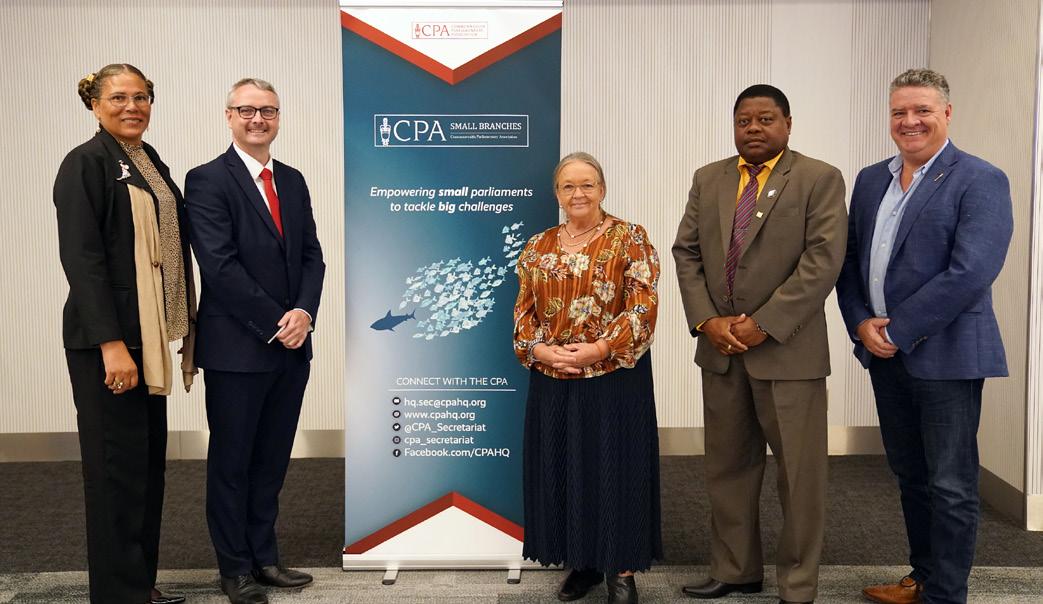
The Parliamentarian | 2022: Issue Three | 100 years of publishing | 259 RESILIENCE AND PREPAREDNESS OF
SMALL BRANCHES
CPA SMALL BRANCHES STEERING
MEETING For images of 65th Commonwealth Parliamentary Conference please visit CPA Flickr page (www.flickr.com/photos/cpa_hq/albums), CPA website www.cpahq.org or social media - Twitter @CPA_Secretariat | Facebook.com/CPAHQ | LinkedIn | Instagram @cpa_secretariat
Images
credit:
Christian Diotte/Parliament
of Canada and
Jeffrey
Hyland/CPA Headquarters
CPA SMALL BRANCHES WORKSHOP B: BUILDING SUSTAINABLE ECONOMIES IN CPA SMALL BRANCHES
Panel Chair: Hon. Mark Monaghan, MLA, Speaker of the Legislative Assembly (Northern Territory)

Discussion Leaders:
• Hon. Angelo Farrugia, MP, Speaker of the House of Representatives (Malta)
• Hon. Katherine Ebanks-Wilks, MP, Deputy Speaker (Cayman Islands)
• Dr Laurie Brinklow (Institute of Island Studies, University of Prince Edward Island, Canada)
Facilitator: Jack Hardcastle (CPA Secretariat)
Rapporteurs: Mike Chandler and Kim Leadley (Nova Scotia Legislature)
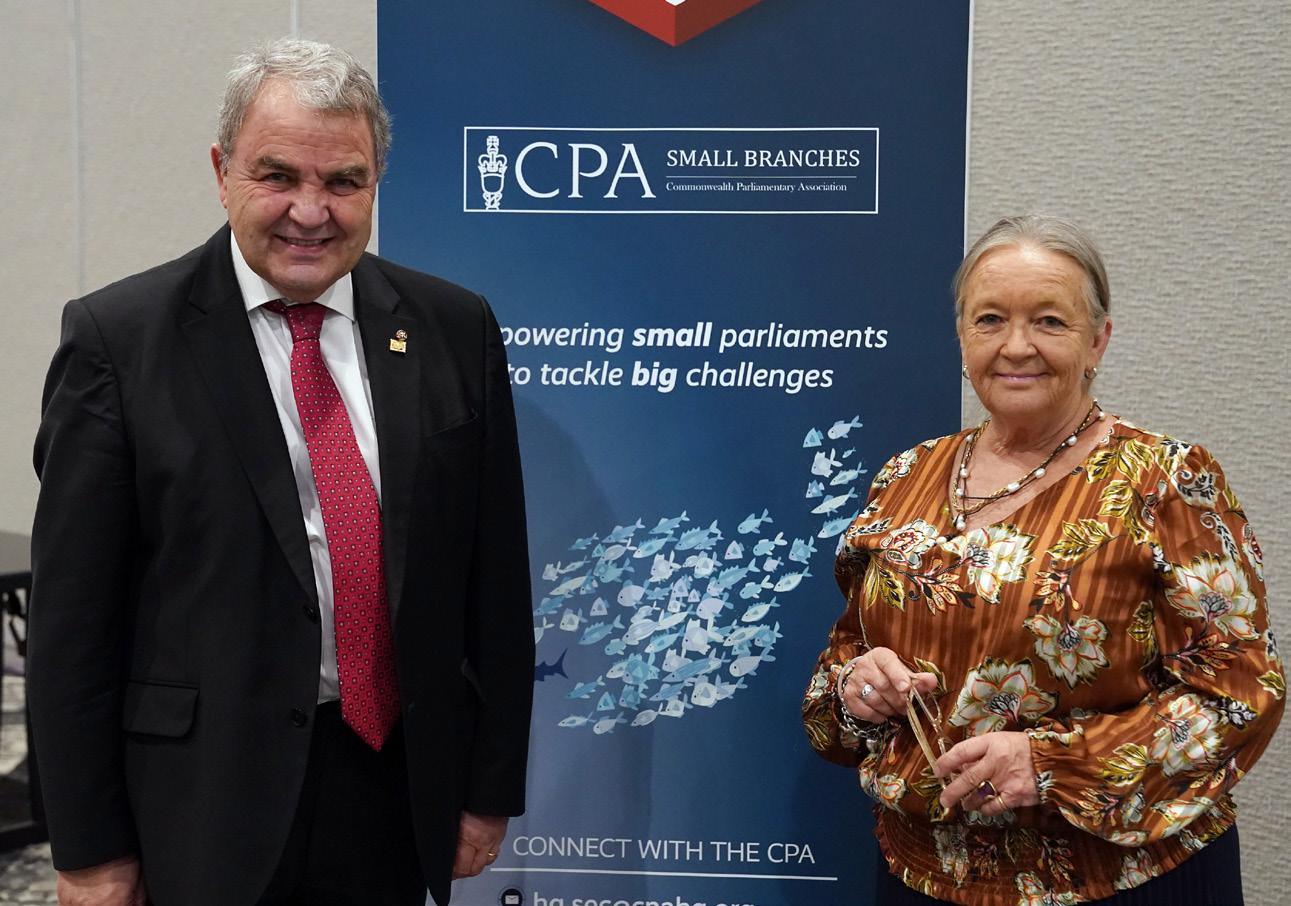
This session explored the factors affecting economic growth and sustainable development in small Commonwealth countries and jurisdictions. Although many small Commonwealth jurisdictions, including CPA Small Branches, differ in population, size, geography and development progress, they share many challenges and vulnerabilities. As the workshop’s Panel Chair noted, this includes high exposure to natural disasters, climate change and global economic shocks, as well as more limited domestic revenues and opportunities for borrowing. Their vulnerabilities are also compounded by low economic diversification, often characterised by high dependence on tourism and remittances. These factors seriously hinder their economic growth prospects and ability to invest in sustainable development.
Small jurisdictions have long found solutions to many of their challenges and pursued unconventional development strategies, often with great success. These strategies have harnessed such assets as innovation, ocean resources and local community knowledge. Delegates heard about some of the challenges faced by the Cayman Islands and Malta in recent years, as well as the efforts to address them, from two panelists. Notable among these challenges are the COVID-19 pandemic and an increase in the frequency and intensity of tropical cyclones. Delegates were also given an overview of the work being done by the Institute of Island Studies on Prince Edward Island in Canada to increase understanding of the issues faced by islands around the world regarding sustainable development.
Parliaments and Parliamentarians are well placed to use their legislative, oversight and representative functions to provide better governance through more effective democratic and accountable institutions. This will help ensure that the right policy decisions are being taken by government and resources are being allocated for the mutual benefit of the national economy and the needs of individuals and communities.
Panel Chair, Hon. Mark Monaghan, MLA, Speaker of the Legislative Assembly (Northern Territory) said that the economies of small jurisdictions are intertwined with respect to social, environmental and health factors. These jurisdictions are faced with huge issues around instability, and current conflicts such as the one in Ukraine are having a great impact on them. Any knowledge gained from dealing with these crises needs to be adapted, grown and individualised to communities to ensure that they are appropriate to the context.
He acknowledged that some countries face challenges in governance from time to time and knowledge from the past are important. Other challenges include poor capital budgets and natural calamities faced by some regions, such as tsunamis, earthquakes and cyclones. Clashes between long-term sustainable investment and a desire for immediate investment return is a major challenge faced by small jurisdictions, as is government corruption and climate change. In Europe for example, people are facing extremely high temperatures as never sustained before.
Hon. Katherine Ebanks-Wilks, Deputy Speaker (Cayman Islands) noted that countries may differ in size, geography and development progress but may be at similar stages in their journeys to sustainability. By working together and sharing
260 | The Parliamentarian | 2022: Issue Three | 100 years of publishing
RESILIENCE AND PREPAREDNESS OF CPA SMALL BRANCHES
Images
credit:
Christian Diotte/Parliament of Canada and Jeffrey Hyland/CPA Headquarters
successes, they become powerful allies in the face of global uncertainty.
She provided some background on the Cayman Islands, whose natural beauty makes up for its lack of size and which is the thirdmost biodiverse UK Overseas Territory. It hosts the Caribbean’s largest contiguous mangrove wetland and is home to the iconic indigenous blue iguana.
Hon. Katherine Ebanks-Wilks explained that the Cayman Islands has significantly expanded marine protection areas and land protection in recent years, but rapid economic expansion has presented challenges. One consequence has been that 75% of mangrove coverage has been lost over the past 50 years. People expect policies that provide a balance between protecting the environment and stimulating economic growth. Last year marked the creation of the Ministry of Sustainability and Climate Resiliency, whose aim is to deliver the government’s commitment to achieving the balance between environmental and economic interests.
The government currently has a target of achieving 70% renewable energy by 2037. Single-use plastics legislation is being developed and a tree planting initiative has been launched. In addition, there is now a national response plan for dealing with the large amount of Sargassum seaweed in the Cayman Islands and the major problems this causes.
She said that there is evidence of an increase in the frequency and intensity of tropical cyclones in recent years. This has the potential to threaten lives and disrupt livelihoods. A recent survey showed most people in the territory are very or extremely concerned about climate change, but most are optimistic about the role small island nations can play.
The Cayman Islands is supporting global efforts through the Commonwealth Climate Growth Fund, sponsored by the Commonwealth Enterprise and Investment Council. Key investment themes for the fund are renewable energy, natural resources, water and sanitation, food and agriculture, infrastructure, education, social development and health care.
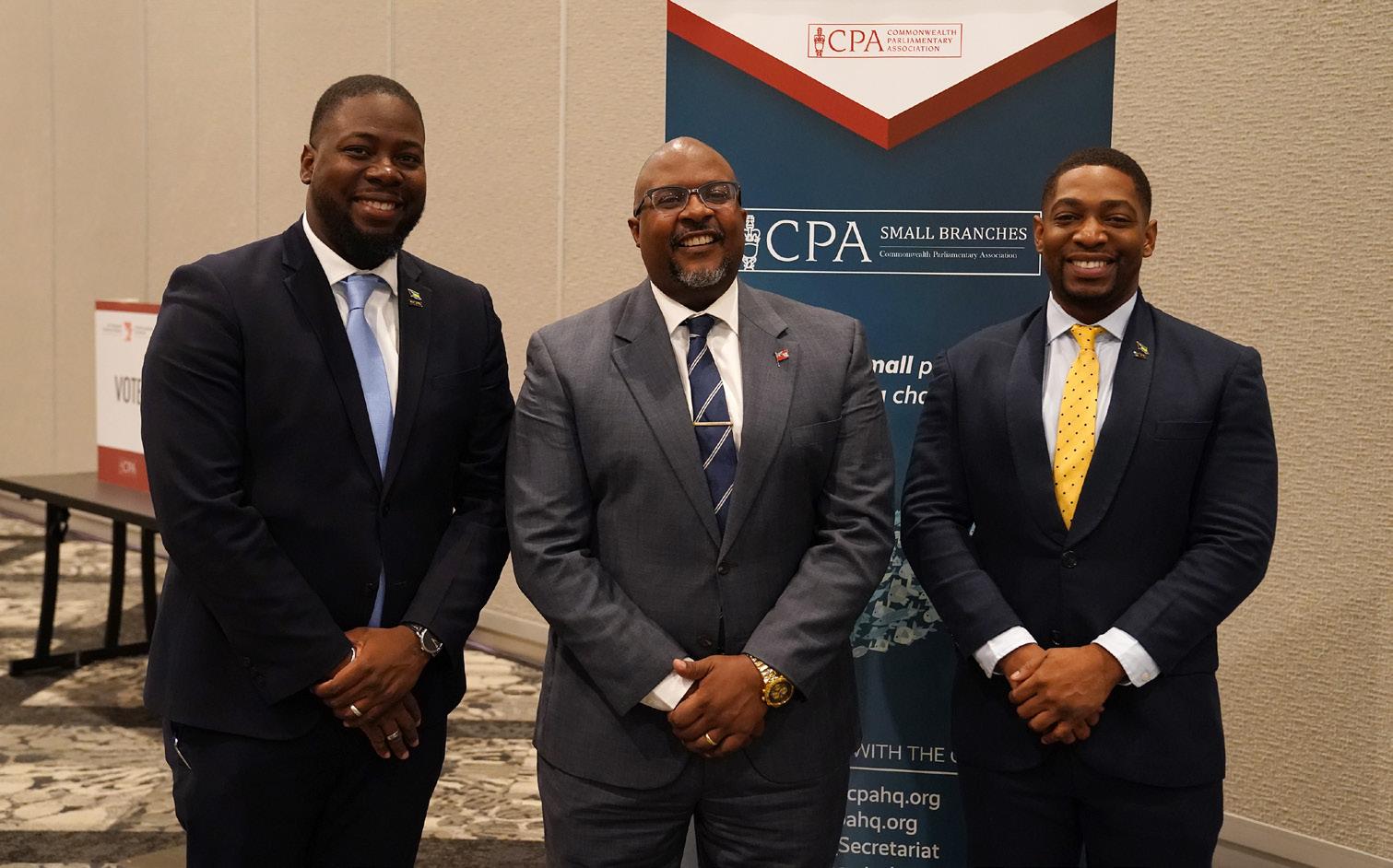

Hon. Katherine Ebanks-Wilks concluded her presentation with a quotation from the Cayman Islands Premier, Hon. Wayne Panton: “Broadly speaking, our vision is of a Cayman Islands that is held up as one of the most sustainable countries in the world, a trio of islands where all its citizens can thrive; a peaceful and prosperous place known for its resourcefulness, its diligence, its excellence and its innovativeness.”
Dr Laurie Brinklow, Institute of Island Studies, University of Prince Edward Island (Canada) discussed the work that has been done by the Institute of Island Studies, which was started in 1985 with the goal of contributing to public policy on Prince Edward Island. The institute has a publishing arm called Island Studies Press which has published over 40 titles; from 2003 to 2021 it also published the Island Studies Journal, which is available online. It offers a Master of Arts in Island Studies degree program with courses such as Island Tourism, Sustainable Island Communities and International Relations & Island Public Policy.
She said that the institute has hosted a number of conferences over the years, including one in 1992 which brought in 52 presenters from 24 different islands. It has hosted public symposia featuring speakers from around the world on topics that have included Population & Migration on Prince Edward sland, Island Land Use Policy and Sustainable Agriculture. A lecture series it offers has examined such topics as Weathering Cyclone Pam in Vanuatu, The Environmental Turn in Island Tourism, Climate Change and Cultural Change Through Art.
Dr Brinklow said the Institute has launched a number of research projects over the years. These have included Sustainable Island Futures, in which international scholars come to teach and study; a project involving an intern from the Netherlands looking at creative arts and climate change adaptation; a project looking at the economic impacts and future pathways of COVID-19; Project Well-Being; the Prince Edward Island Retention Survey; and Island Philanthropy. It has also engaged with partner institutions around the globe, including Research Excellence in Island Territories and Island Innovation.
The Parliamentarian | 2022: Issue Three | 100 years of publishing | 261 RESILIENCE AND PREPAREDNESS OF CPA SMALL BRANCHES
“
Small jurisdictions have long found solutions to many of their challenges and pursued unconventional development strategies, often with great success. These strategies have harnessed such assets as innovation, ocean resources and local community knowledge.”
Images
credit: Christian Diotte/Parliament of Canada and Jeffrey Hyland/CPA Headquarters
She discussed some of the challenges and opportunities faced by her organisation. On one hand, being interdisciplinary can be a curse, as it is at times unclear exactly where the institution fits. Funding is still tenuous, and the Institute is better known abroad than in its own backyard. On the other hand, it has been able to contribute to public policy development on Prince Edward Island, collaborate on research projects, host visiting policymakers, present guest lectures, provide training for island policymakers, and provide access to expertise at the University of Prince Edward Island such as the Canadian Centre for Climate Change Adaptation and the Clean-Tech Institute.
Dr Brinklow concluded her presentation by stating that islands are often though of as the “canaries in the coal mine” and learning together is what they do. She said that what is learned at the Institute can help others on the planet.
Hon. Angelo Farrugia, MP, Speaker of the House of Representatives (Malta) stated that Malta has built on its strengths to make the island more sustainable. A major challenge it faces is a lack of natural resources, meaning it needs to be more creative when designing a foundation for its economy. Tourism has made a significant contribution to Malta’s economy for years, but COVID-19 has had a huge impact on this sector. In addition, climate change and extreme weather conditions have also had a severe impact, as it has on other small countries.
He said that they need to observe and learn how to recover quickly from such situations so that their economies can return to prosperity. The Maltese government has a new strategy that identifies a path for long-term sustainable development of the tourism sector. This involves shifting tourism policy to a growth channel with a healthier mix of quality and quantity and a greater understanding of sustainable policy for the long term.
The Speaker of Malta discussed how funds from an economic regeneration plan are being used to help companies adapt their business models and allow hotels to be exempted from paying taxes and licence fees. Most of the measures in this plan are being extended to the following year. Malta has also sought assistance from the European Commission to support its
economy. During the COVID19 pandemic, local tourism was encouraged through the promotion of staycations for local residents and the direct injection of money to every citizen aged 16 and over to spend on entertainment, hotels and the retail sector. These measures were intended to ease pressure on citizens while also stimulating the economy through domestic tourism.
He concluded by noting that new areas of economic development must be explored by small nations in order to be independent, and the ‘blue economy’ is the next frontier.
There is a need to diversify economies, and being politically neutral gives countries like Malta the opportunity to operate freely to achieve this goal.
Deputy David De Lisle (Guernsey) pointed out that both Prince Edward Island and Malta have the advantage of being able to tap into larger systems, i.e. the Canadian federal government and a European Union fund respectively, while his jurisdiction does not have that opportunity. He asked what the advantages and disadvantages of drawing from large economies are.
Dr Laurie Brinklow (Institute of Island Studies) responded by noting that many subnational jurisdictions have had referenda on independence. They have sometimes been able to go their own way despite belonging to a larger country. Prince Edward Island has things they don’t want to give up but has very robust tourism and fishing sectors. An advantage it has is that it can ‘pivot on a dime’ and be resilient, as it has its own tax system; it can make changes quickly when things fall apart.
The Speaker of Malta responded that things can be organised even if you are not totally independent, and that challenges faced by Caribbean nations can include the erosion of trade preferences.
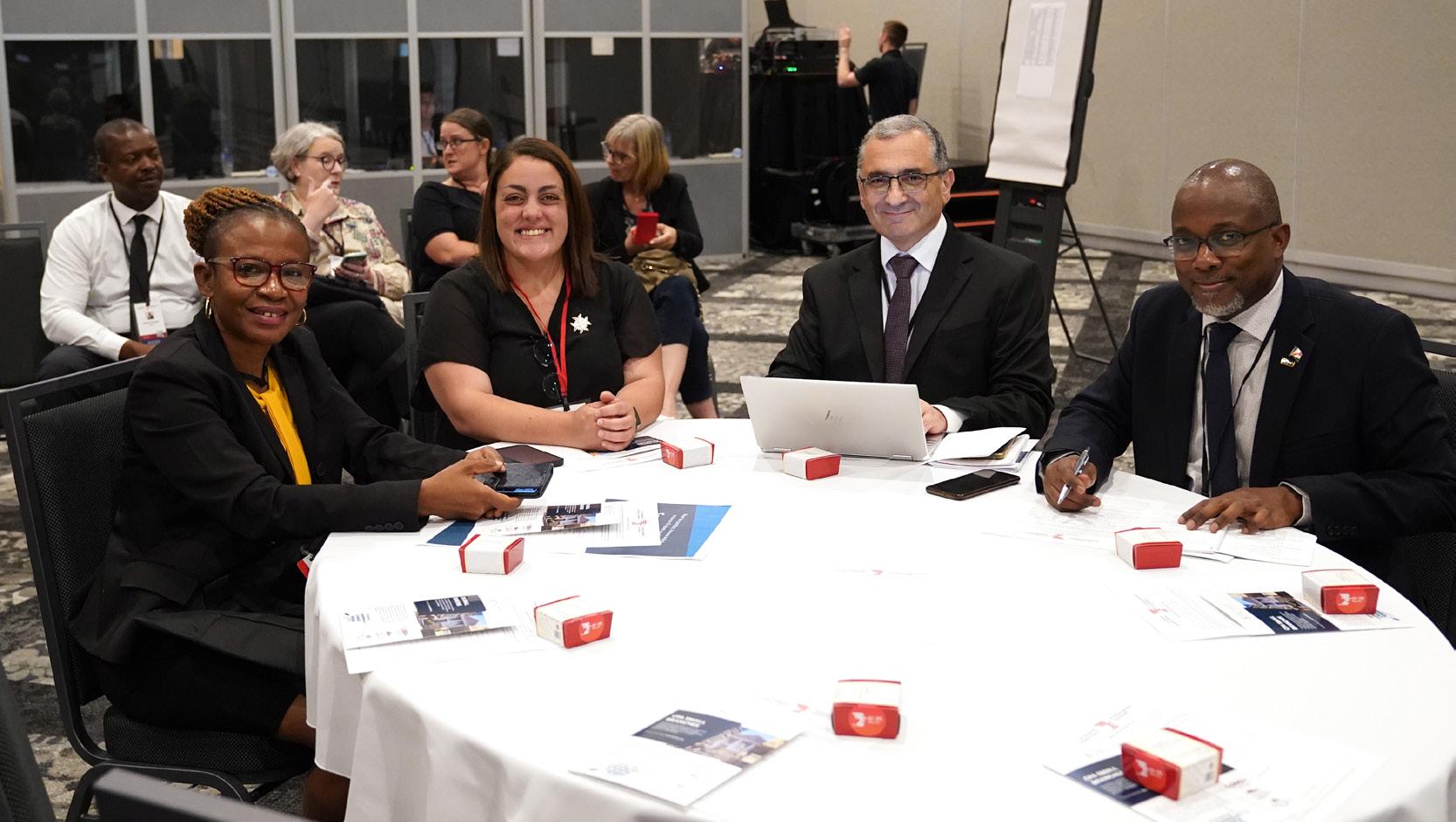
Hon. Corinda Essex, MLC (St Helena) asked about key strategies that could be employed to address population retention. Dr Brinklow said her Institute was hired by the government to create those strategies. She said that a sense of belonging, place and identity will help to keep people on Prince Edward Island.
At the conclusion of the workshop, conference delegates endorsed the following recommendation:
• Through their legislative, oversight and representative functions, Parliamentarians from small jurisdictions should actively engage in economic development policies to ensure that they are responsive to all societal groups, are environmentally sensitive, and are broadly aligned with the Sustainable Development Goals (SDGs).

262 | The Parliamentarian | 2022: Issue Three | 100 years of publishing
RESILIENCE AND PREPAREDNESS OF CPA SMALL BRANCHES Images credit: Christian Diotte/Parliament of Canada and Jeffrey Hyland/CPA Headquarters
CPA SMALL BRANCHES WORKSHOP C: FINANCIAL SCRUTINY AND OVERSIGHT: HOW CAN SMALL PARLIAMENTS ENSURE EFFECTIVE ACCOUNTABILITY?

Panel Chair: Hon. Churchill Gill, MP (Seychelles)
Discussion Leaders:
• Hon. Akierra Missick, MHA (Turks and Caicos)
• Ms Joann Corkish, Deputy Clerk of Tynwald and Clerk of the Legislative Council (Isle of Man)
• Ms Isabelle Watkinson (Student and Researcher, McGill University, Canada)
Moderators: Jack Hardcastle and James Pinnell (CPA Secretariat)
Rapporteurs: Mr Tamer Nusseibeh and Mr Connor Hubley (Nova Scotia Legislature)
This workshop session discussed the importance of financial scrutiny and oversight in small Parliaments in the Commonwealth. The session also explored several means of achieving scrutiny, including oversight Committees, Audit Offices, effective Public Accounts Committee procedures and thorough investigations. Implementing constructive scrutiny allows small Parliaments to produce beneficial budgets for their citizens. Each discussion leader provided insights into their own experiences in government or in conducting ongoing research.
Hon. Akierra Missick, MHA (Turks and Caicos) relayed her experiences of Turks and Caicos’ scrutiny and oversight procedures in their budgeting process. Despite their size, with 19 Members, the Turks and Caicos House of Assembly follows the Westminster parliamentary system. Although they do not have a second chamber, but they do maintain many of the same responsibilities. Rather than having a designated Auditor’s Office, their oversight procedures include a number of Scrutiny Committees. These Committees investigate and question budgets by the Minister of Finance and their department. After a budget is suggested, debates are held until a consensus is reached. A formal budget is then introduced to the Appropriations Committee for auditing purposes.
According to Hon. Akierra Missick, having a majority government makes the scrutiny and accountability an arduous process. However, the abundance of Scrutiny Committees helps to achieve accountability and uncover any concerns held by the Opposition or the wider public. Eventually, the budget is implemented, and the process is repeated annually.
Ms Joann Corkish, Deputy Clerk of Tynwald and Clerk of the Legislative Council (Isle of Man) continued the discussion on the Isle of Man’s scrutiny process as a small jurisdiction.
She elaborated on the Crown Dependency’s size, including its population, public service and the number of Legislators. The Legislature is based on a tri-cameral system with a House of Keys, Legislative Council and the Tynwald Court, all of which assist in scrutiny and accountability.
Ms Corkish’s presentation focused on the Isle of Man’s scrutiny process and detailed the Tynwald Court’s makeup. Tynwald consists of 35 Members that sit monthly to discuss matters pertaining to policy, finance, secondary legislation and ‘Questions’. Unlike the House of Keys, the first of their tri-cameral components, Tynwald is given two and a half hours for Questions rather than one. This system removes many restrictions that other Legislatures face, as Members have no limit on tabling questions, and every Member is allowed to speak on every motion with no limit on the length of the speeches. Financial scrutiny and accountability are Tynwald’s responsibility. Its resources include the Public Accounts Committee and all those involved in its operation. The Isle of Man’s Tynwald Public Accounts Committee comprises six Members and meets for approximately two to three hours. An administrative team, including several Clerks and assistants, supports the Committee. In addition to its Public Accounts Committee, Tynwald boasts three other scrutiny activities.
First is the inquiries process, in which any expenditure-related topic can be discussed and may be directed by Tynwald. The inquiries must provide resolutions. The second was audit support provided in the form of the Audit Advisory Division rather than an Auditor-General that reviews reports based on a rating system. The last-mentioned activity was ad hoc and annual reporting. All reports are laid before the Legislature. Any reports containing amendments are debated in addition to a governmental response report. The government is then given two months to respond to the suggestions and amend them accordingly. Allowing this period of time encourages meaningful negotiations for probable recommendations.
The Parliamentarian | 2022: Issue Three | 100 years of publishing | 263 RESILIENCE AND PREPAREDNESS OF CPA SMALL BRANCHES
“ Establishing checks and balances for accountability is paramount to performing effective scrutiny. Committees must evolve to peruse through public investigations and hearings. Government policies, actions and their execution must be examined through thought-out strategies and the outcome of public expenditure.”
Ms Corkish then introduced three factors for the effective planning of financial scrutiny. Consideration of the impact chosen topics may have, the scope of and focus of an inquiry, and the outcome of the inquiry process are essential for effective planning. Parliamentarians must also be able to collect evidence to support their investigations through planning, effective questioning and involving the public. In addition to effective planning and evidence gathering, a scrutiny support is also an operative tool. The CPA and other networks also provide support through training. Other resources include contacts, research done by other Parliaments and web resources. These suggestions provide a framework for effective financial oversight and the preparation of SMART recommendations.
Ms Isabelle Watkinson, Student and Researcher at McGill University, elaborated further on the Public Accounts Committee and how to implement its procedures in small jurisdictions productively. She discussed the propositions in the ‘Handbook on Parliamentary Financial Oversight: Adapting Public Accounts Committee Best Practices to Legislatures in Small Jurisdictions ’ that was recently launched by McGill University’s School of Continuing Studies (in partnership with several international organisations including the CPA). Ms Watkinson explained to delegates the variety of jurisdictions surveyed to make recommendations for successful Public Accounts Committees. She introduced several factors that contribute to a successful Public Accounts Committee. These factors included Opportunity, Capacity and Motivation. ‘Opportunity’ provides the institutional context of a Public Accounts Committee’s mandate, oversight function and accountability. Several factors shape the Committee’s ‘Opportunity’. This includes legal authority, in which legitimacy is established through budget oversight, a comprehensible mandate, a right of access to information and the relationship with the Legislative Auditor. In smaller jurisdictions, there is a benefit to establishing a constitution for the Public Accounts Committee rather than Standing Orders, as it leads to constant changes that do not allow for accountability.
The next factor, ‘Capacity’, refers to the organisational context that impacts Public Accounts Committees. This includes the human aspect of Public Accounts Committees, primarily their membership. A significant enough Committee to constitute a quorum, the Members’ abilities to conduct reasonable inquiries and the available resources are all elements of a Public Accounts Committee’s capacity. Ms Watkinson suggested that smaller jurisdictions could allow Ministers to sit on Public Accounts Committees. While larger Parliaments often restrict Ministers from sitting on Public Accounts Committees due to interferences with the decision-making process, smaller Parliaments may benefit from including Ministers because it helps Opposition parties to hold them accountable. She gave the example of the Legislative Assembly of Yukon allowing a Government Minister to sit on the Public Accounts Committee.
The final factor, ‘Motivation’, considers the Committee’s willingness to carry out its mandate and achieve effective oversight. Motivation is attained through incentivized leadership, partisan representation and political will. A recommendation to form a Joint Committee of both Houses in a bi-cameral Legislature rather than only appointing Members of the Lower House was made for multi-partisan representation. Majority governments often affect Public Accounts Committees negatively as they may not allow for thorough investigations. In conclusion, a Public Accounts Committee’s performance relies on a legitimate mandate, the capacity to direct competent inquiries and the Committee’s willingness to fulfill its goal.

Panel Chair, Hon. Churchill Gill, MP (Seychelles) , referred back to the Member from Turks and Caicos regarding their lack of an Auditor-General or an Audit Office, commenting that having four Scrutiny Committees is appropriate. He also reflected on Ms Watkinson’s recommendation to include Ministers in Public Accounts Committees, pointing out that the Legislative and Executive branches must operate independently to achieve proper accountability. Moreover, he begged the question, how can majority governments be dealt with in Public Accounts Committees?
The Panel Chair also presented the best approaches for scrutiny and oversight. Establishing checks and balances for accountability is paramount to performing effective scrutiny. Committees must evolve to peruse through public investigations and hearings. Government policies, actions and their execution must be examined through thought-out strategies and the outcome of public expenditure. To perform a query, Opposition parties must have enough time to analyse the proposed budget. They must be able to use Oversight Committees that are answerable to the Legislative branch to ask as many appropriate
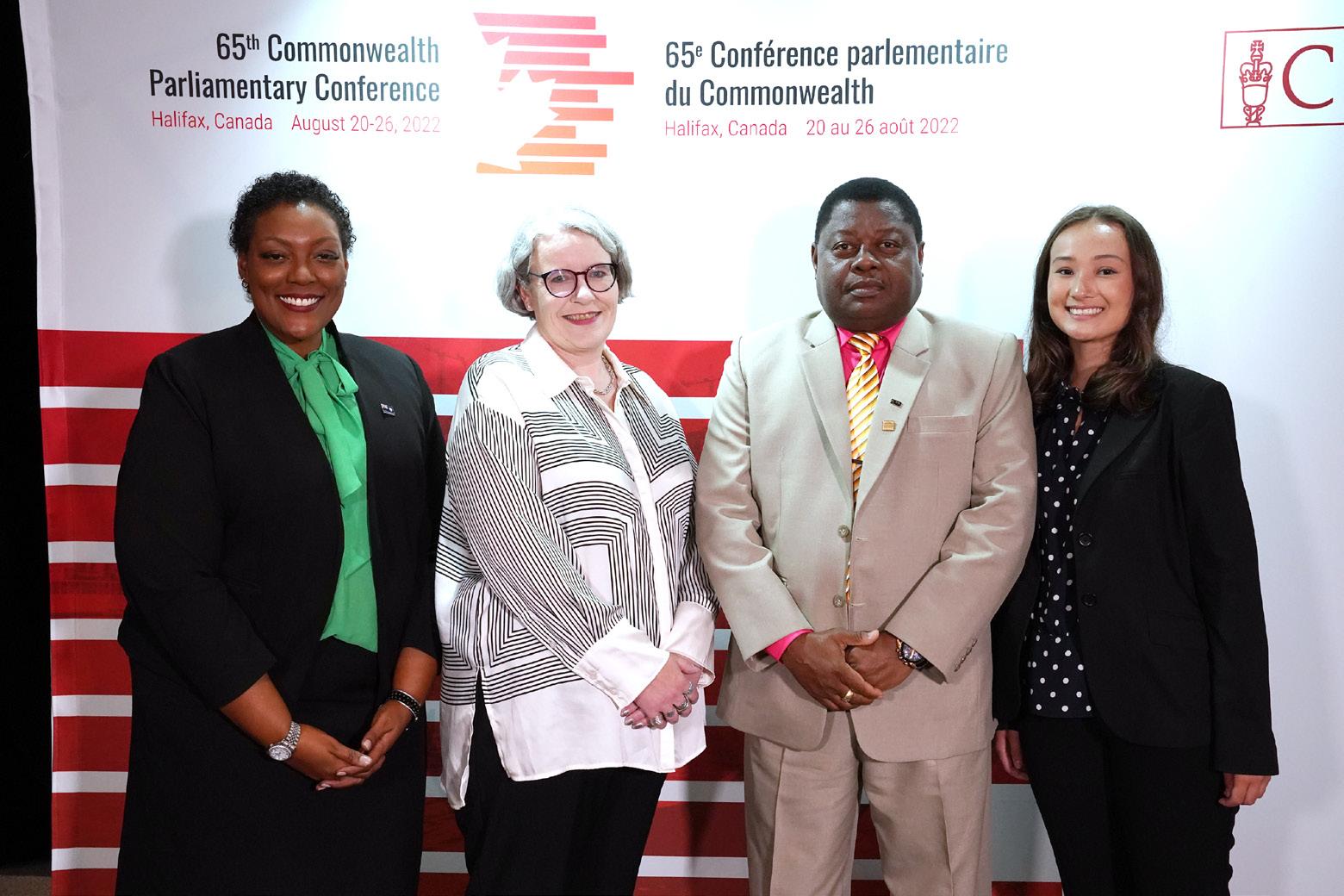
264 | The Parliamentarian | 2022: Issue Three | 100 years of publishing
RESILIENCE AND PREPAREDNESS OF CPA SMALL BRANCHES
Images
credit:
Christian
Diotte/Parliament of Canada and Jeffrey Hyland/CPA Headquarters
questions as needed. Public Accounts Committees are the most effective Oversight Committees. Much like Ms Corkish’s and Ms Watkinson’s points, a Public Accounts Committee enshrined in a constitution gives the Committee legitimacy to authorise strong and effective investigations. This power allows the Committee Members to summon anyone, the right to access germane reports, the ability to conduct supported public inquiries and maintains a connection to the Auditor-General’s Office.
Hon. Juan Watterson, Speaker of the House of Keys (Isle of Man) , indicated that the Public Accounts Committees only investigate what had already happened rather than prospective activities. He then asked for examples of impactful reports or cases of scrutiny. Hon. Akierra Missick spoke of the impact the CPA’s Public Accounts Committee training had on their Public Accounts Committee during their inquiry on national health care. There had been a substantial increase in spending on medicine without a proper explanation as to why. The training helped them to ask the right, tough questions that allowed for adequate scrutiny. Hon. Churchill Gill commented that having an Auditor’s Office and Scrutiny Committees is essential. Moreover, he believes that using the Public Accounts Committee to investigate after the fact is insufficient. Therefore, it should be able to make inquiries and explore throughout a project rather than after completion.
Hon. Gervais Henrie, MP, Deputy Speaker (Seychelles), commented on the lack of two jurisdictions in the handbook mentioned earlier. He then asked about the media and the public’s involvement in the questioning process. Hon. Akierra Missick spoke on the two-sidedness of the press. In her jurisdiction, the media’s lackluster presence makes it difficult to scrutinise government spending efficiently. It is easier for larger jurisdictions to use the media as they are more likely to have the resources and training to investigate policy. Hon. Churchill Gill pointed out the importance of training media personnel in financial scrutiny. They must engage with policy and, more importantly, scrutiny on a higher level.
Hon. Amos Masondo, MP, Chairperson of the National Council of Provinces (South Africa) asked the panelists about legislation that was meant to protect witnesses, relationships with stakeholders and the public’s ability to engage in the oversight process. Ms Corkish responded by saying that all inquiries were public. Moreover, there are greater aspirations for public inclusion in the scrutiny process. She mentioned that witness protection was not well-defined, but the UK Parliament had published a report on this topic. Hon. Churchill Gill replied that Seychelles does have legislation for witness protection, and as Parliamentarians, they have the power to introduce similar legislation. With regard to public inclusion, Seychelles does not identify its inclusion in the constitution. Moreover, having stakeholders and partner relationships can provide supplementary information that could help better scrutinise government execution. Hon. Akierra Missick also mentioned that Turks and Caicos allows stakeholders to meet with Members for their input on any topic.
Hon. Willin Belliard, MHA (Turks and Caicos) spoke on enhancing Public Accounts Committee’s capacity. However, he was skeptical about including Ministers in Public Accounts Committees because it would interfere with decision-making. He then asked about adding the private sector into the oversight process. Ms Watkinson responded that adding Ministers to the Public Accounts Committee is merely a suggestion made by the handbook for small jurisdictions. It proved to be effective in the Yukon but may vary among other small jurisdictions. She also responded positively to the inclusion of the private sector in the oversight and scrutiny processes.
The following recommendation was endorsed:
• Parliaments should have the necessary independence and resources, including any necessary training and capacitybuilding opportunities, to undertake effective financial scrutiny and oversight.
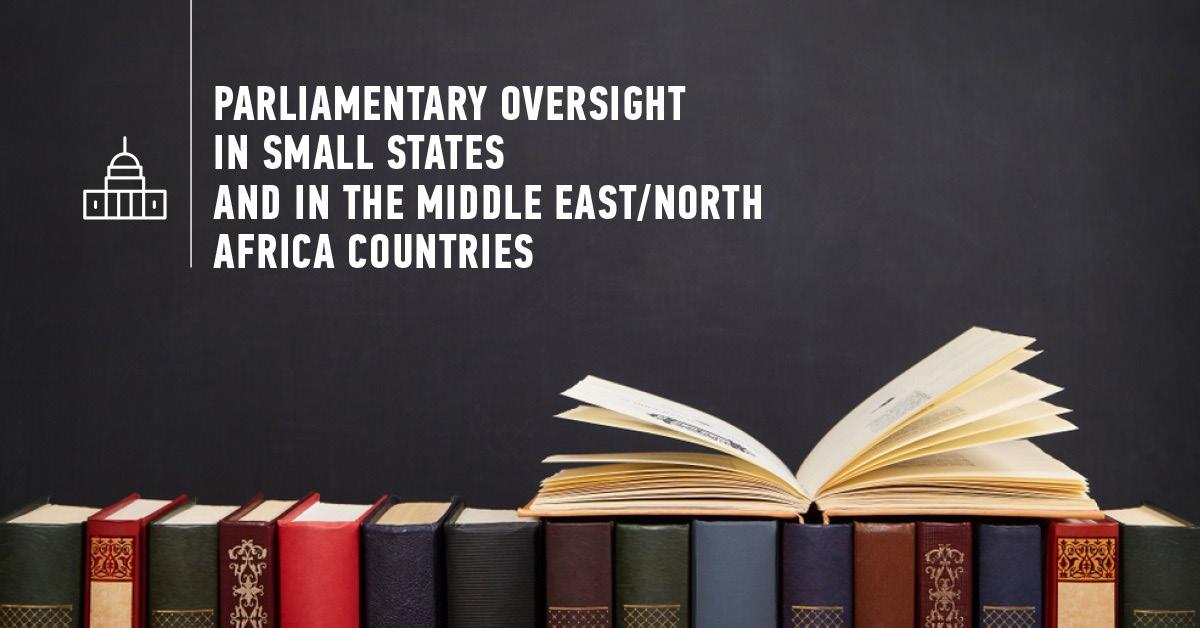

PARLIAMENTARY
In the margins of the 38th CPA Small Branches Conference, McGill University (Montréal, Canada), in partnership with the CPA, launched a new Handbook on Parliamentary Financial Oversight: Adapting PAC Best Practices to Legislatures in Small Jurisdictions. The author of the Handbook, Isabelle Watkinson presented the Handbook’s findings at the CPA Small Branches Workshop C on ‘Financial Scrutiny and Oversight’. The Handbook was a key output from a research project spearheaded by McGill University and the CPA together with several other Commonwealth and global organisations and funded by Canada’s Social Sciences and Humanities Research Council with matching funds from the partners. This project examined the interaction between oversight and corruption in small states, emphasising what works and what does not and applying the results in the development of region- and country-specific case studies of ‘good practice.’ In so doing, project partners helped fill the significant void in global knowledge regarding parliamentary oversight in smaller jurisdictions and, in particular, contributed to enhanced parliamentary development and better governance. This project was announced at the 37th CPA Small Branches Conference in Uganda in September 2019. Subsequently, around 30 small jurisdictions around the world, including more than two dozen CPA Small Branches, responded to a detailed questionnaire.
The Parliamentarian | 2022: Issue Three | 100 years of publishing | 265 RESILIENCE AND PREPAREDNESS OF CPA SMALL BRANCHES
NEW HANDBOOK ON
FINANCIAL OVERSIGHT FOR SMALL JURISDICTIONS
CPA SMALL BRANCHES WORKSHOP D: WELL-BEING INDICATORS FOR CPA SMALL BRANCHES
Panel Chair: Senator Hon. Reginald Farley, President of the Senate (Barbados)
Discussion Leaders:
• Hon. Jeanie McLean, MLA (Yukon)
• Hon. Michael Pettersson, MLA (Australian Capital Territory)
• Dr Laurie Brinklow (Institute of Island Studies, University of Prince Edward Island, Canada)

Moderators: Clive Barker and Jack Hardcastle (CPA Secretariat)
Rapporteurs: Mr Philip Grassie and Mr Kilian Schlemmer (Nova Scotia Legislature)
This session looked at what areas of well-being typically require more attention in smaller jurisdictions, what well-being indicators can be used to measure development and progress of these areas, and how various initiatives, policy guidelines and other frameworks can be included in the legislative process in order to champion well-being in these jurisdictions.
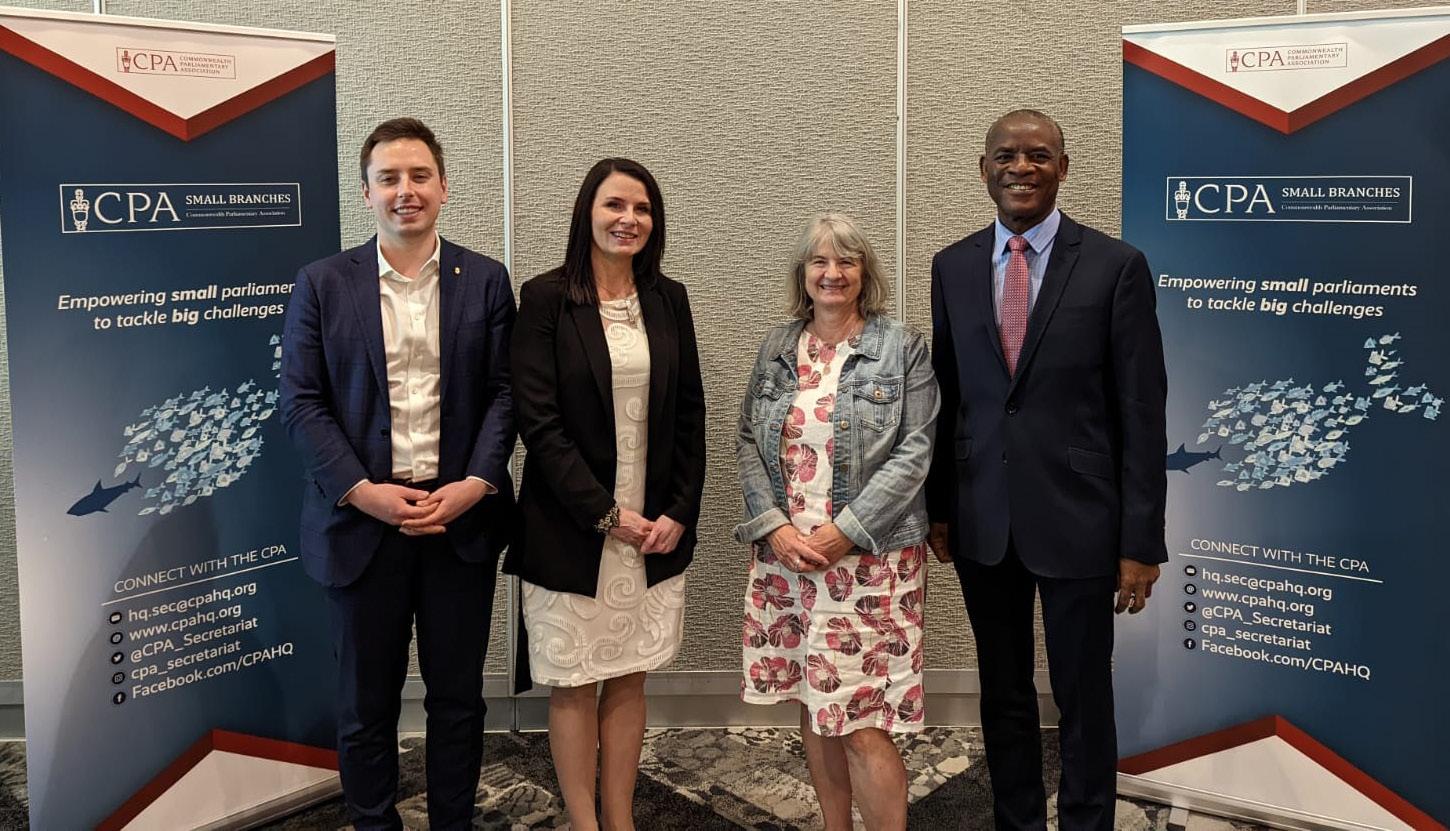
The Panel Chair, Senator Hon. Reginald Farley, President of the Senate (Barbados) introduced the panelists and explained the purpose of the session in recognising the need for wellbeing indicators to be brought into policy to make a difference in people’s lives. Three common themes were identified: areas that should be prioritised in small jurisdictions, what indicators can be used in those areas and how to make use of those indicators in the legislative process.
The first panelist was Dr Laurie Brinklow of the Institute of Island Studies at the University of Prince Edward Island Dr Brinklow spoke about Project WellBeing, a study of the quality of life on Prince Edward Island. The Institute of Island Studies partnered with the University of Waterloo (Canada) to choose the most pertinent indicators of well-being. The study began with a survey of island residents and followed with targeted focus groups in subsequent years. The study found that health was a key concern of island residents, but that ‘Islandness’ and a sense of identity and community was a distinct domain. Allowing newcomers to fit
in so they feel the same sense of belonging is a key priority for retention.
The second panelist was Hon. Michael Pettersson, MLA (Australian Capital Territory). He used the Australian Capital Territory as an example of a jurisdiction that had recently introduced a well-being framework into decision-making. The framework took a holistic approach consisting of 12 interconnected domains and included consideration for younger, older, LGBTQ and aboriginal residents. The twelve domains are: Access and connectivity; Economy; Education and life-long learning; Environment and climate; Governance and institutions; Health; Housing and home; Identity and belonging; Living standards; Safety; Social connection; and Time. Although the database created as part of the project contains a vast amount of data, that data isn’t always easily accessible to policymakers. Cabinet decisions must now include a consideration of well-being and the indicators are also used in the budget process.
The third panelist was Hon. Jeanie McLean, MLA (Yukon). The Member acknowledged the Mik’maw people of Nova Scotia and discussed the use of well-being indicators by the Yukon Government. Well-being was defined as ‘ The presence of the highest possible quality of life in its full breadth of expression focused on but not necessarily exclusive to: good living standards, robust health, a sustainable environment, vital communities, an educated populace, balanced time use, high levels of democratic participation, and access to and participation in leisure and culture.’ The well-being project began in 2018 and a survey was conducted in Summer 2020 with a plan of repeating the survey in 2023 to determine progress. The survey received an excellent response rate. Well-being is assessed using 64 indicators across eight domains. The information from the survey and indicators
266 | The Parliamentarian | 2022: Issue Three | 100 years of publishing
RESILIENCE AND PREPAREDNESS OF CPA SMALL BRANCHES
Images
credit: Christian Diotte/Parliament of Canada and Jeffrey Hyland/CPA Headquarters
are used within government to inform research and decision-making.

A question-and-answer period followed the presentations.
Connétable Mike Jackson (Jersey) noted that many jurisdictions suffered from an exodus of the younger generation for education and jobs and asked whether well-being proposals could be used to reverse the trend of young persons not returning to their place of origin. Hon. Jeanie McLean said they absolutely could be used in that manner. Well-being initiatives can be used to tell Yukon’s story in a better way and as part of branding. She noted that New Zealand has led the way in using well-being indicators as part of building its brand. Hon. Michael Pettersson also responded to the question and noted that well-being indicators can be used to help address the factors that cause people to leave in the first place. Dr Brinklow also addressed the issue of people not returning. For island residents, it is normal for people to leave to seek education and experience other parts of the world. To encourage returning, there need to be opportunities. Remote work has helped attract people back during the pandemic but has also contributed to higher housing costs. Beauty, environment, family connections and identity are all factors that encourage former residents to return. Dr Brinklow also noted that Iceland has a strong return rate and is also one of the most successful jurisdictions in measurements of well-being.
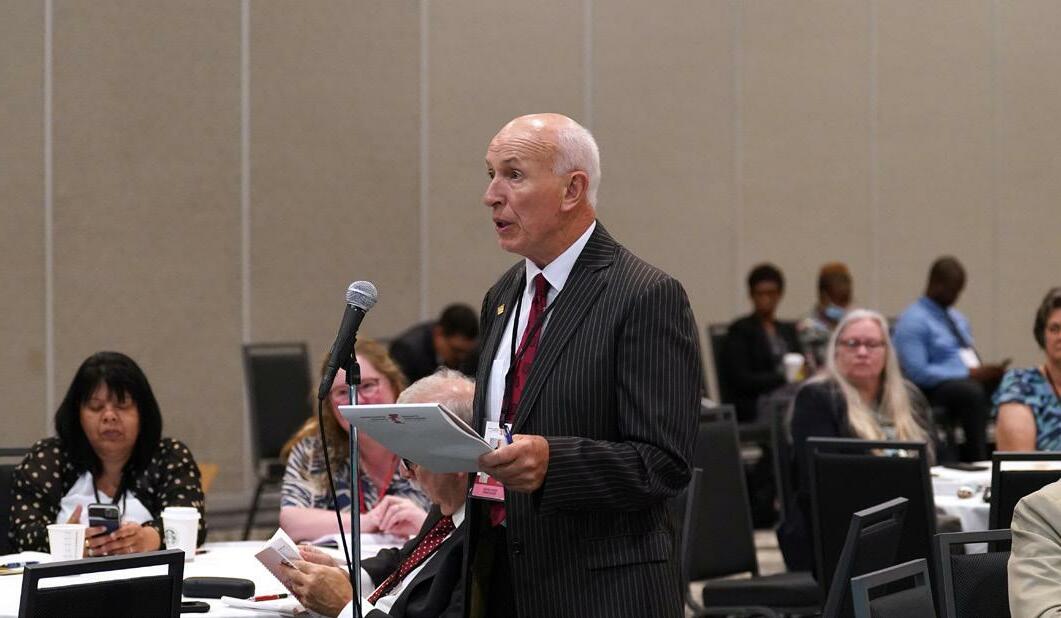
Following the Q&A, the Panel Chair introduced a discussion exercise for delegates to complete at their tables. Each table was to have a short discussion to identify one common area for which small jurisdictions need more development, one well-being indicator for that area that is a measurement and how that indicator could be integrated into the legislative process.
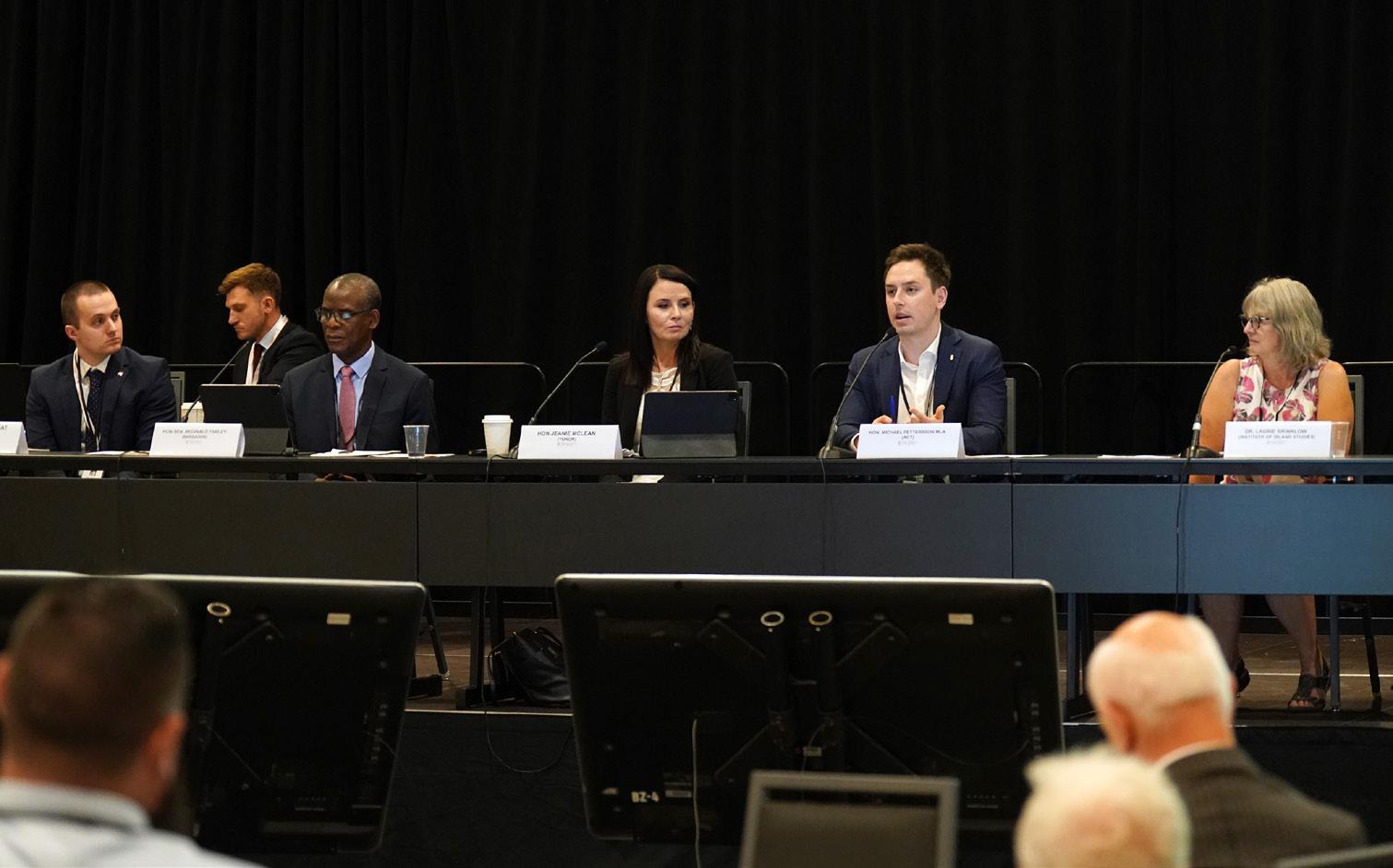
Several of the groups reported the availability and cost of housing as a common issue. A suggested metric was comparing first quintile incomes to first quintile housing costs. The integration of newcomers was also suggested, with connectedness as a metric. Lack of jobs was suggested, with employment rates as a well-being indicator and a suggestion for legislation respecting the hiring process and encouraging succession planning.
The Panel Chair also invited panelists to make closing comments. Dr Brinklow stated that the panel helps validate the work of the Institute of Island Studies and encouraged participants to use the information from the workshop to help in their jurisdictions. Hon. Michael Pettersson noted the shared issues and shared answers from around the world and emphasised the importance of measuring the right things in producing meaningful data. Hon. Jeanie McLean also noted the common issues facing jurisdictions – particularly housing. She encouraged participants to evaluate openly and to use data to challenge assumptions.
The recommendation from the workshop was endorsed as follows:
• Through their legislative, oversight and representative functions, Parliamentarians from small jurisdictions should use well-being indicators to guide legislative scrutiny in order to further national growth.
The Parliamentarian | 2022: Issue Three | 100 years of publishing | 267 RESILIENCE AND PREPAREDNESS OF CPA SMALL BRANCHES
“ Well-being was defined as ‘The presence of the highest possible quality of life in its full breadth of expression focused on but not necessarily exclusive to: good living standards, robust health, a sustainable environment, vital communities, an educated populace, balanced time use, high levels of democratic participation, and access to and participation in leisure and culture’
”
Images credit: Christian Diotte/Parliament of Canada and Jeffrey Hyland/CPA
Headquarters
COMMONWEALTH PARLIAMENTARY CLERKS SHARE BEST PRACTICE AND INNOVATIONS IN LEGISLATURES
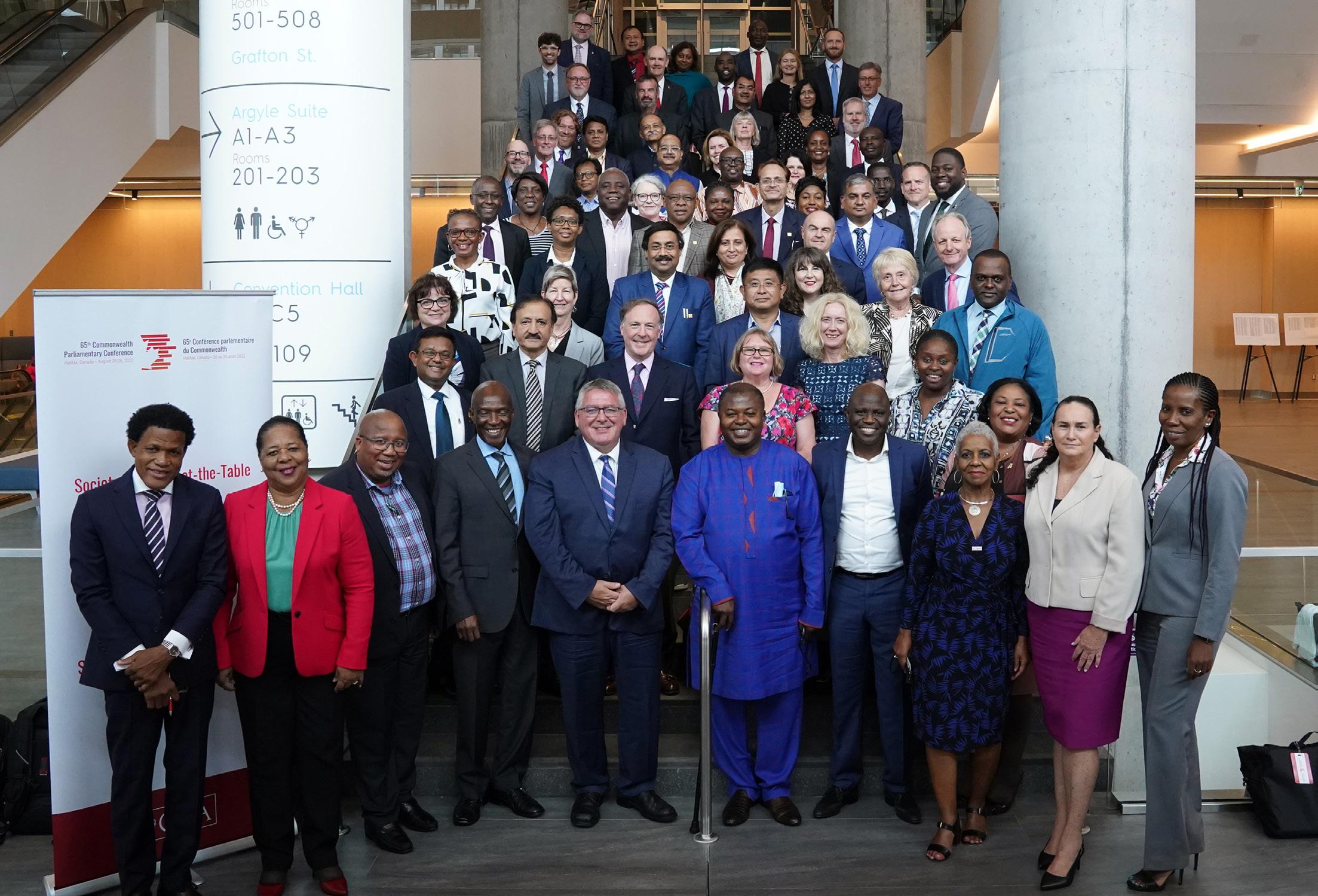

The 56th Meeting of the Society-of-Clerks-at-the-Table (SoCATT) took place in the margins of the 65th Commonwealth Parliamentary Conference (CPC) in Halifax, Nova Scotia, Canada. The meeting brought together Clerks and parliamentary staff from Commonwealth Parliaments to discuss the latest legislative practices and to share best practice.
The Co-Chairs of the meeting were from the Parliament of Canada - Mr Gérald Lafrenière, Interim Clerk of the Senate and Clerk of the Parliaments and Chief Legislative Services Officer, and Mr Charles Robert, Clerk of the House of Commons.
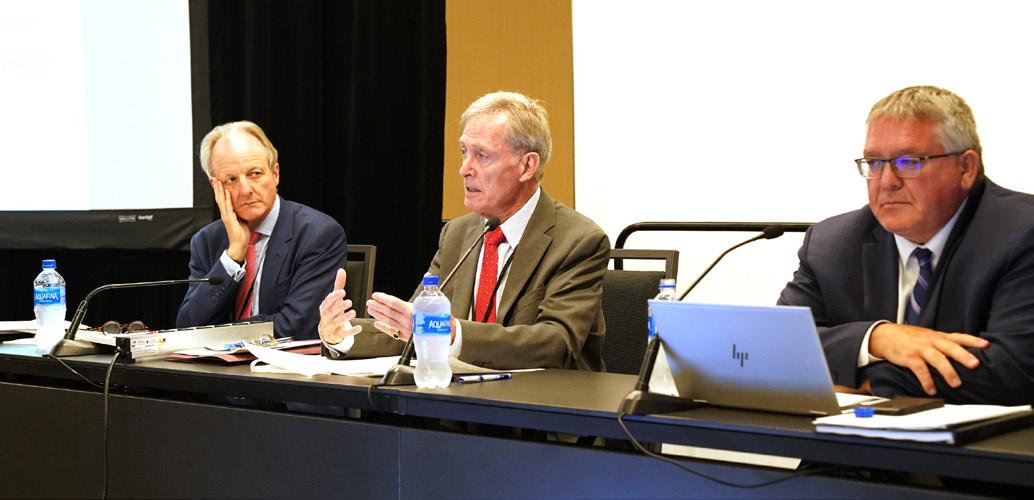
Presentations were made during the two-day meeting by a number of different Parliamentary Clerks and parliamentary staff on a wide range of subjects including:
• the Canadian Parliamentary system and recent developments in Canada;
• Parliamentary Projects at the UK House of Commons;
• Sessional orders as a vehicle for procedural reform in the New South Wales Legislative Council;
• The e-Parliament - a novel digital approach in Khyber Pakhtunkhwa, Pakistan;
• Procedural and administrative impact of the truck convoy protest in Ottawa;
• Victoria’s gender equity action plan;
• Relevance and importance of zero hours in the Parliamentary system of India;
• Role and function of Parliamentary Committees in the Rayja Sabha, India.
268 | The Parliamentarian | 2022: Issue Three | 100 years of publishing
56th MEETING OF THE SOCIETY-OFCLERKS-AT-THE-TABLE (SOCATT)
Images credit: Christian Diotte/Parliament of Canada and Jeffrey Hyland/CPA Headquarters
At the conclusion of the meeting, Mr Matthew Hamlyn, SoCATT Secretary (United Kingdom) outlined a number of SoCATT
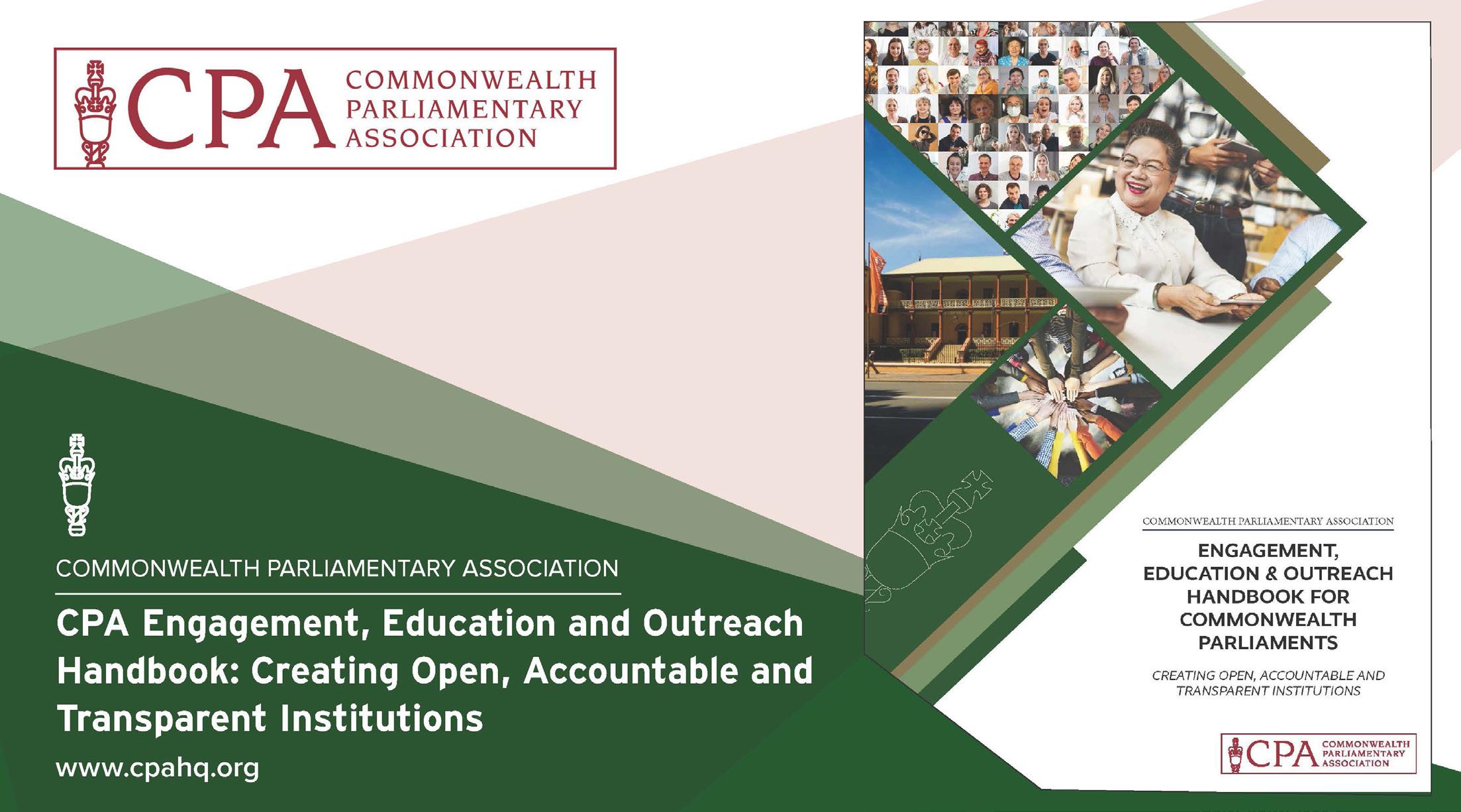

and decisions, and proposals for the agenda for the 57th SoCATT General Meeting were agreed.

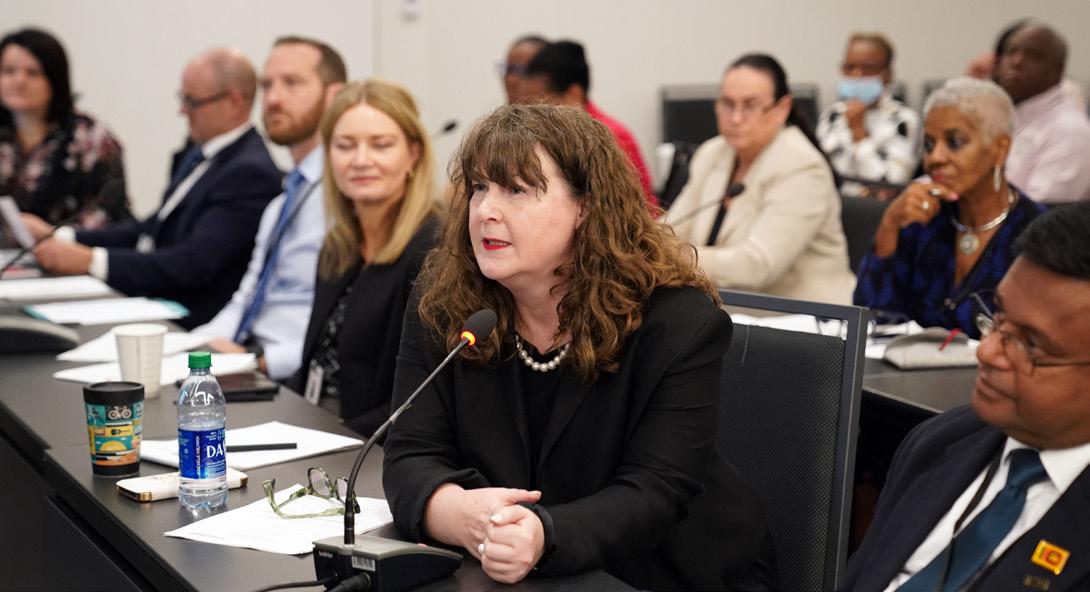
further information about SoCATT please
PAKISTAN PARLIAMENTARY OFFICER RECEIVES RECOGNITION FOR MCGILL UNIVERSITY COURSE
In the margins of the SoCATT meeting, Mr Attaullah Khan, Parliamentary Officer and CPA Focal Person at the Khyber Pakhtunkhwa Provincial Legislature in Pakistan was presented with a certificate in recognition of his completion of the one-year Parliamentary Certificate with McGill University, Canada. Mr Khan completed the course with honours and also received an award for the best course paper for the year from Ms Inna Popova-Roche, Director of Professional and Corporate Education at McGill University’s School of Continuing Studies. He also presented his paper on ‘The e-Parliament - a novel digital approach in Khyber Pakhtunkhwa’ to the delegates attending the SoCATT meeting.

The Parliamentarian | 2022: Issue Three | 100 years of publishing | 269
reports
For
visit http://www.societyofclerks.org/SCAT_Home.asp. 56th MEETING OF THE SOCIETY-OFCLERKS-AT-THE-TABLE (SOCATT)
Images credit: Christian Diotte/Parliament of Canada and Jeffrey Hyland/CPA Headquarters
TRINIDAD AND TOBAGO
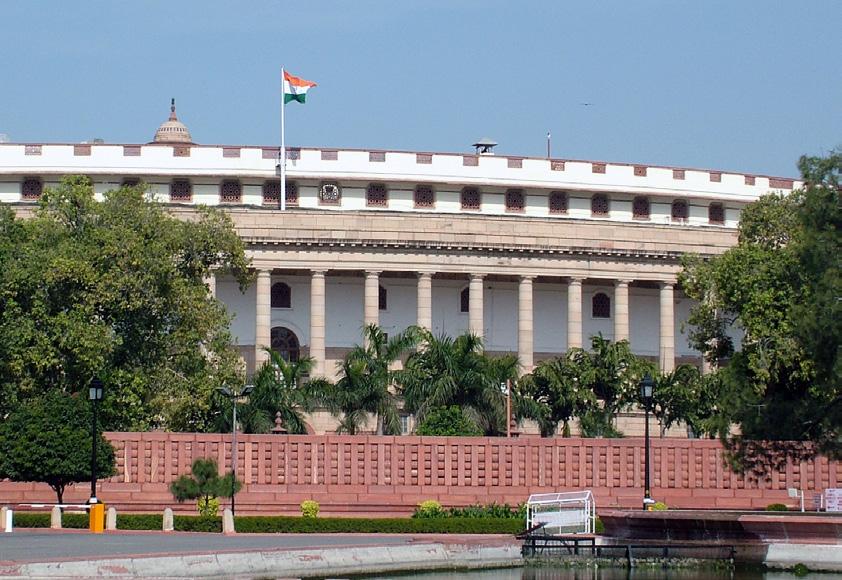
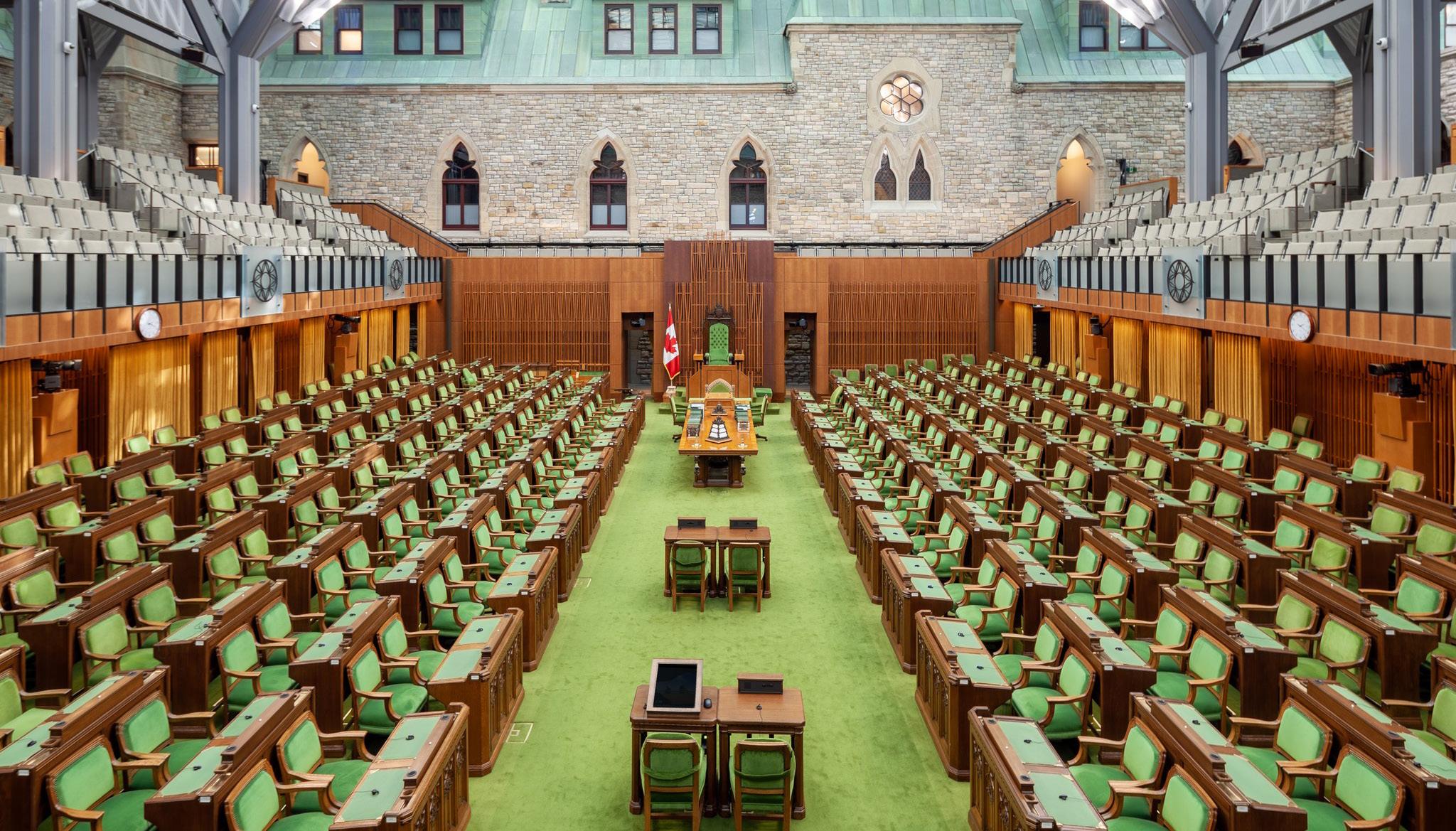

PARLIAMENTARY REPORTS AND THIRD READINGS FROM PARLIAMENTS AROUND THE COMMONWEALTH THIRD READING REPORTS India Union Page 276 New Zealand Page 280 Australia Federal Page 284 CANADA Tributes to The Queen and Changes in Parliament Page 274 COMMONWEALTH LEGISLATIVE NEWS
President opens new session of Parliament Page 278 AUSTRALIA Opening of 47th Parliament of Australia Page 282 270 | The Parliamentarian | 2022: Issue Three | 100 years of publishing UNITED KINGDOM Tributes to The Queen and appointment of Prime Minister Page 271 BOOK REVIEW Page 286
TRIBUTES TO THE QUEEN AND APPOINTMENT OF A NEW PRIME MINISTER IN UK PARLIAMENT
NEW LEADER OF THE CONSERVATIVE PARTY AND UK PRIME MINISTER
On 5 September 2022, the Chair of the 1922 Committee, formally known as the Conservative Private Members’ Committee, Hon. Sir Graham Brady, MP announced that Rt Hon. Liz Truss, MP, the UK Foreign Secretary, would become the Leader of the Conservative Party after beating the former Chancellor of the Exchequer, Rt Hon. Rishi Sunak, MP in the Conservative leadership contest with 81,326 votes (57.4%) from party members compared to 60,399 (42.6%) for Mr Sunak.
The following day, 6 September 2022, the UK Prime Minister, Rt Hon. Boris Johnson, MP travelled to Scotland to tender his resignation to Her Majesty The Queen. He was closely followed by Rt Hon. Liz Truss, MP, who was received in audience by Her Majesty at Balmoral Castle and ‘requested her to form a new Administration’ and to become Prime Minister and First Lord of the Treasury.
The new Prime Minister then returned to London to address the nation in a speech outside No. 10 Downing Street before making Ministerial appointments to the new Cabinet. Key appointments included Rt Hon. Kwasi Kwarteng, MP as the Chancellor of the Exchequer, Rt Hon. James Cleverly, MP as Foreign Secretary, Rt Hon. Suella Braverman, MP as Home Secretary and Rt Hon. Thérèse Coffey, MP as Deputy Prime Minister and Health Secretary.
The new UK Prime Minister, the third woman to hold the position, faced Prime Minister’s Questions in the House of Commons on 7 September 2022.
HOUSE OF LORDS PAYS TRIBUTE TO HER MAJESTY QUEEN ELIZABETH II
The UK House of Lords paid tribute to Her Majesty Queen Elizabeth II over two days on 9 and 10 September 2022.
The Lord Speaker, Rt Hon. Lord McFall of Alcluith began the first House of Lords sitting following the announcement of the death of The Queen with a minute’s silence.

The Leader of the House of Lords, Rt Hon. Lord True, led tributes stating “So was she to us, and to all the countries and peoples of the great Commonwealth that she herself, beyond all others, nurtured, and to which she was devoted. She was our strength and stay for 70 years - firm in her duty, wise in her counsel, reassuring in her smile and gracious in her every act, whether in stretching out the hand of reconciliation in Ireland or encouraging a timorous child hovering with a bouquet that he dared not present.”
The Leader of the Opposition in the House of Lords, Rt Hon. Baroness Smith of Basildon said “As the most recognisable face in the world, Her Majesty has been a fixed point at the core of our national life. As the world has changed almost beyond recognition during the 70 years of her reign, through her experience, her character and steadfast sense of duty, the Queen was able to remain a constant
Below: Tributes to the late monarch took place in the House of Lords on 9 and 10 September 2022.
The Parliamentarian | 2022: Issue Three | 100 years of publishing | 271 PARLIAMENTARY REPORT UNITED KINGDOM
Parliamentary Report by the Editor of The Parliamentarian
Image credit: UK Parliament.
and unwavering presence while still ensuring that the monarchy adapted to the challenges of the modern age. It was not just her longevity and the span of history she lived through but how she represented and served the nations of the UK and the Commonwealth that have earned such admiration and affection.”
Members from every party and grouping in the House of Lords paid tribute including the Leader of the Liberal Democrats in the Lords, the Crossbench Convenor, the Archbishop of Canterbury and many Members over two days.
At the start of the sitting on 10 September 2022, a small number of senior Members of the House of Lords took the oath to His Majesty The King. At the end of tributes other Members continued to take the oath.
UK HOUSE OF COMMONS PAYS TRIBUTE TO HER MAJESTY QUEEN ELIZABETH II
The UK House of Commons paid tribute to Her Majesty Queen Elizabeth II on Friday 9 September 2022. A minute’s silence was observed at the start of the sitting.
The Speaker of the House of Commons, Rt Hon. Sir Lindsay Hoyle, MP, opened the session with a statement saying: “Almost all of us in the House have experienced no monarch upon this country’s throne but Her late Majesty. There are indeed only a score-or-so of Members in this House who were already born, let alone who can recall a time, when she wasn’t Queen. She is wedded in our minds with the Crown and all that it stands for. After her accession in February 1952, she first came to the Palace of Westminster to open a Session of Parliament in November 1952 - when Winston Churchill was Prime Minister and Speaker William Morrison was in this Chair – almost seventy years ago.
Fifty-seven complete Sessions of Parliament have passed since then, and she was here to open all but three of them. As Parliamentarians we have celebrated with her for her Silver, Golden and Diamond jubilees and of course marked her Platinum Jubilee this year in which the lamp standards have been unveiled in New Palace Yard. In this place her reign saw ten different Speakers occupy this Chair; during her reign there were 18 General
Elections – and I am sure the Prime Minister will remind us of how many of her predecessors she welcomed and spoke to, always I am sure with quiet wisdom.”
The UK Prime Minister, Rt Hon. Liz Truss, MP (Conservative) led the tributes saying: “Her late Majesty Queen Elizabeth II was one of the greatest leaders the world has ever known. She was the rock on which modern Britain was built. She came to the throne aged just 25, in a country that was emerging from the shadow of war; she bequeaths a modern, dynamic nation that has grown and flourished under her reign. The United Kingdom is the great country it is today because of her. The Commonwealth is the family of nations it is today because of her. She was devoted to the Union of England, Scotland, Wales and Northern Ireland. She served 15 countries as Head of State, and she loved them all.”
Below: Both UK Houses of Parliament came together on 12 September 2022 in the historic setting of Westminster Hall to present Addresses of condolence from each House to His Majesty King Charles III.

272 | The Parliamentarian | 2022: Issue Three | 100 years of publishing
PARLIAMENTARY REPORT UNITED KINGDOM
Image credit: UK Parliament.
The Leaders of the other parties in the House of Commons followed: Rt Hon. Sir Keir Starmer, MP (Labour), Rt Hon. Ed Davey, MP (Liberal Democrats) and Rt Hon. Ian Blackford, MP (Scottish National Party), as well as the Father of the House, Rt Hon. Sir Peter Bottomley, MP (Conservative), the Mother of the House, Rt Hon. Harriet Harman, MP (Labour) and former Prime Ministers, Rt Hon. Theresa May, MP (Conservative) and Rt Hon. Boris Johnson, MP (Conservative).
Tributes continued in the House of Commons over two days and at the end of the second day’s sitting, Members agreed an Humble Address of condolence to His Majesty The King.
PRESENTATION OF ADDRESSES TO KING CHARLES III IN WESTMINSTER HALL
The Lord Speaker, Rt Hon. Lord McFall of Alcluith and the Speaker of the House of Commons, Rt Hon. Sir Lindsay Hoyle, MP presented Addresses of condolence from each House to His Majesty King Charles III, accompanied by The Queen Consort, on 12
September 2022 in the historic setting of Westminster Hall.
Following the announcement of the death of Her Majesty Queen Elizabeth II, both Houses of Parliament had met on 9 and 10 September 2022 for tributes to The Queen. At the end of proceedings, each House agreed a message of condolence to His Majesty King Charles III, which was presented to The King in Westminster Hall.
LYING-IN-STATE OF HER MAJESTY QUEEN ELIZABETH II IN WESTMINSTER HALL
The Lying-in-State of Her Majesty Queen Elizabeth II took place in Westminster Hall at the Palace of Westminster, also known as the Houses of Parliament, from 14 to 19 September 2022.

A service was held before the Lying-inState began attended by His Majesty King Charles III, accompanied by The Queen Consort and members of the Royal Family, as well as the Lord Speaker, Rt Hon. Lord McFall of Alcluith, the Speaker of the House of Commons, Rt Hon. Sir Lindsay Hoyle, MP and Members of both Houses of Parliament.
During the Lying-in-State, the coffin rested on a raised platform (catafalque) in the middle of Westminster Hall. Each corner of the platform was guarded around the clock by members of the Sovereign’s guard of the Household Cavalry, Foot Guards and The King’s Bodyguards.
An estimated 250,000 members of the public were able to file pass the coffin during the Lying-in-State as well as Presidents, Prime Ministers, Foreign Monarchs and Royal Families, Members of Parliament and parliamentary officials, High Commissioners and many other dignitaries.
Westminster Hall features the Diamond Jubilee window in the three central panels of the north window in tribute to the Queen’s Diamond Jubilee. Westminster Hall also played a part in the life of Queen Elizabeth II as the venue for giving and receiving Addresses (formal messages) of particular importance from both Houses of Parliament and for the opening of conferences such as the Commonwealth Parliamentary Conference, which The Queen did in 1961, 1986 and 2000.
NEW LORD GREAT CHAMBERLAIN APPOINTED
At the start of the new reign of King Charles III, a new Lord Great Chamberlain has been appointed. One of the Great Officers of State, the holder has charge over the Palace of Westminster and is also given the responsibility of walking backwards in front of the monarch at the State Opening of Parliament and other occasions when the sovereign attends Parliament.
The Lord Great Chamberlain also plays a major part in royal coronations and duties include investing the sovereign with the insignia of rule.
The office was previously held by the 7th Marquess of Cholmondeley, however following a 1912 agreement between three noble families entitled to the role, it was agreed that the position would thereafter rotate among the three joint office holders and their heirs after them, changing at the start of each successive reign. The Marquess of Cholmondeley and his heirs would serve in every other reign; the Earl of Ancaster and the Earl Carrington would each serve once in every four reigns.
The new Lord Great Chamberlain is the Rt Hon. 7th Baron Carrington, a Crossbench Member of the House of Lords.
The Parliamentarian | 2022: Issue Three | 100 years of publishing | 273 PARLIAMENTARY REPORT UNITED KINGDOM
PARLIAMENTARY NEWS FROM FEDERAL PARLIAMENT OF CANADA
Parliamentary Report by Gabrielle de Billy Brown, Parliament of Canada.
PASSING OF HER MAJESTY QUEEN ELIZABETH II
The Parliament of Canada paid tribute to the legacy of Her Majesty Queen Elizabeth II, Queen of Canada, following her passing on 8 September 2022. Senator Hon. George Furey, Speaker of the Senate of Canada expressed his condolences, noting Her Majesty The Queen’s “unwavering devotion to the people of Canada and the Commonwealth.”
In his statement, Hon. Anthony Rota, MP, Speaker of the House of Commons recalled Her Majesty’s many royal tours in Canada and praised her “great dedication and distinction” in her service to the country and the Commonwealth.
On 13 September 2022, the House of Commons was recalled to pay public tribute to Her Majesty, one of many gestures organised to give Canadians the opportunity to honour her life and work.
In addition, the Prime Minister, Rt Hon. Justin Trudeau, MP announced that 19 September 2022, would be a National Day of Mourning in Canada to coincide with Her Majesty’s State Funeral.
His Majesty King Charles III was proclaimed Canada’s Head of State on 10 September 2022, as the Prime Minister, Rt Hon. Justin Trudeau, MP and the GovernorGeneral of Canada, Her Excellency Rt Hon.
Mary Simon signed an order-in-council confirming His Majesty’s accession.
CONTINUED RESPONSE TO THE COVID-19 PANDEMIC
The Parliament of Canada continues to adapt to the ongoing COVID-19 pandemic. In recent months, many measures have been lifted.
On 23 June 2022, the obligation to wear a mask within the House of Commons precinct expired and was not renewed. In the Senate of Canada, on 6 September 2022, the Standing Committee on Internal Economy, Budgets and Administration lifted the masking requirements. In both cases, individuals are invited to continue to do so if they desire.
In addition, both the Senate of Canada and the House of Commons have suspended the requirement to provide proof of vaccination against COVID-19 on the parliamentary precinct in June 2022. This measure had first been announced in October 2021 by the Speakers of both Chambers.
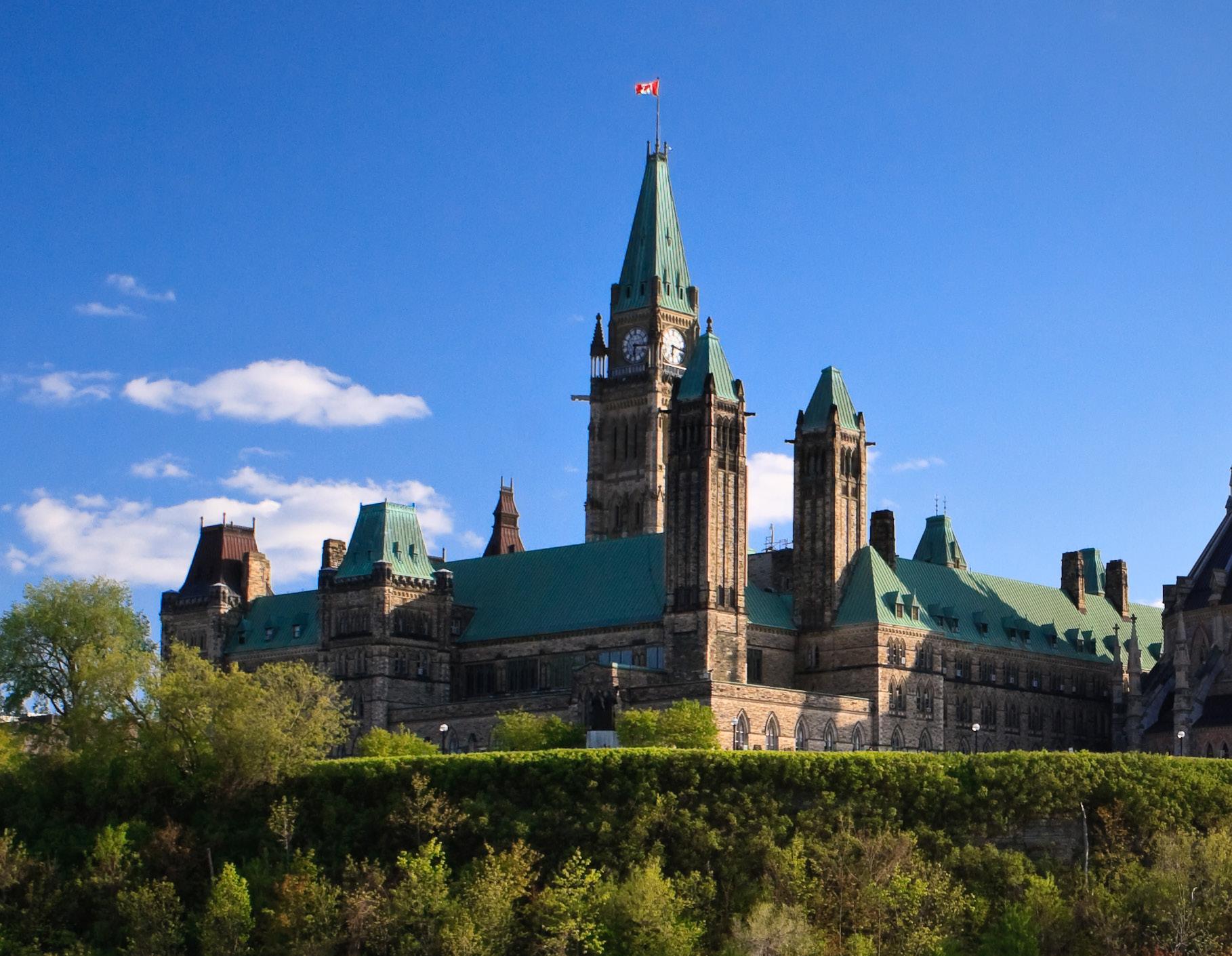
On 23 June 2022, the House of Commons voted in majority to prolong by a year the different measures in place which allow for hybrid sittings of both the Chamber and Standing Committee meetings, as well as allowing for electronic voting and the online tabling of documents.
CHANGES IN THE SENATE
On 3 June 2022, Hon. Howard Wetston retired after 6 years in the Senate. He represented the province of Ontario. At the time of his retirement, he was a member of the Independent Senators Group.
On 27 June 2022, Hon. Michèle Audette, who represents the senatorial division of De Salaberry in the province of Québec, left the Independent Senators Group to join the Progressive Senate Group. She had been a member of the group since 2021.
On 4 August 2022, Hon. Larry W. Smith, who represents the senatorial division of Saurel in the province of Québec, left the Conservative Party to join the Canadian Senators Group. He had been a member of the party since his nomination to the Senate in 2010.
As of 14 September 2022, the standings in the Senate were: Independent Senators Group 39, Conservative Party 15, Progressive Senate Group 14, Canadian Senators Group 13 and non-affiliated 7. Seventeen seats were vacant.
CHANGE IN THE HOUSE OF COMMONS
On 13 September 2022, Alain Rayes, MP announced his departure from the Conservative Party of Canada. Representing the constituency of Richmond-Arthabaska in Québec since 2015, he will now sit as an independent when the House of Commons resumes its sittings following its summer recess.
CHANGES IN CABINET
The Prime Minister, Rt Hon. Justin Trudeau, MP announced changes to the Ministry on 31 August 2022, as two Ministers exchanged roles. Hon. Filomena Tassi, MP, Minister of Public Services and Procurement since 2021, is now Minister responsible for the Federal Economic Development Agency for Southern Ontario. Consequently, Hon. Helena Jaczek, MP, who had occupied this role since 2021, is now Minister of Public Services and Procurement.
CHANGES IN PARTY LEADERSHIP
The leadership contest to find the successor to Hon. Erin O’Toole, MP as leader of the
274 | The Parliamentarian | 2022: Issue Three | 100 years of publishing PARLIAMENTARY REPORT CANADA
Conservative Party of Canada ended on 10 September 2022. Over 400,000 ballots from members of the Conservative Party of Canada were received before the deadline of 6 September. Hon. Pierre Poilievre, MP won with over 68% of votes on the first ballot, obtaining a plurality of votes in 330 of 338 constituencies. With this victory, he also becomes the Leader of His Majesty’s Loyal Opposition.
The leadership contest to succeed to Annamie Paul as Leader of the Green Party of Canada officially began on 31 August 2022. In total, six candidates have qualified for the first round of the campaign, with some running jointly. Of this list, one is a current Member of Parliament, Elizabeth May, MP, who is running with human rights activist, Jonathan Pednault. Ms May was the Leader of the Green Party of Canada between 2006 and 2019 and is currently the party’s parliamentary leader.
LEGISLATION
On 21 June 2022, Bill C-14: An Act to amend the Constitution Act, 1867 (electoral representation) received royal assent. Known under the short title ‘Preserving Provincial Representation in the House of Commons Act’, the Government Bill ensures that, in the event of a readjustment of the number of seats
in the House of Commons, the number of constituencies assigned to each province never falls below the number assigned to that province during the 43rd Parliament.
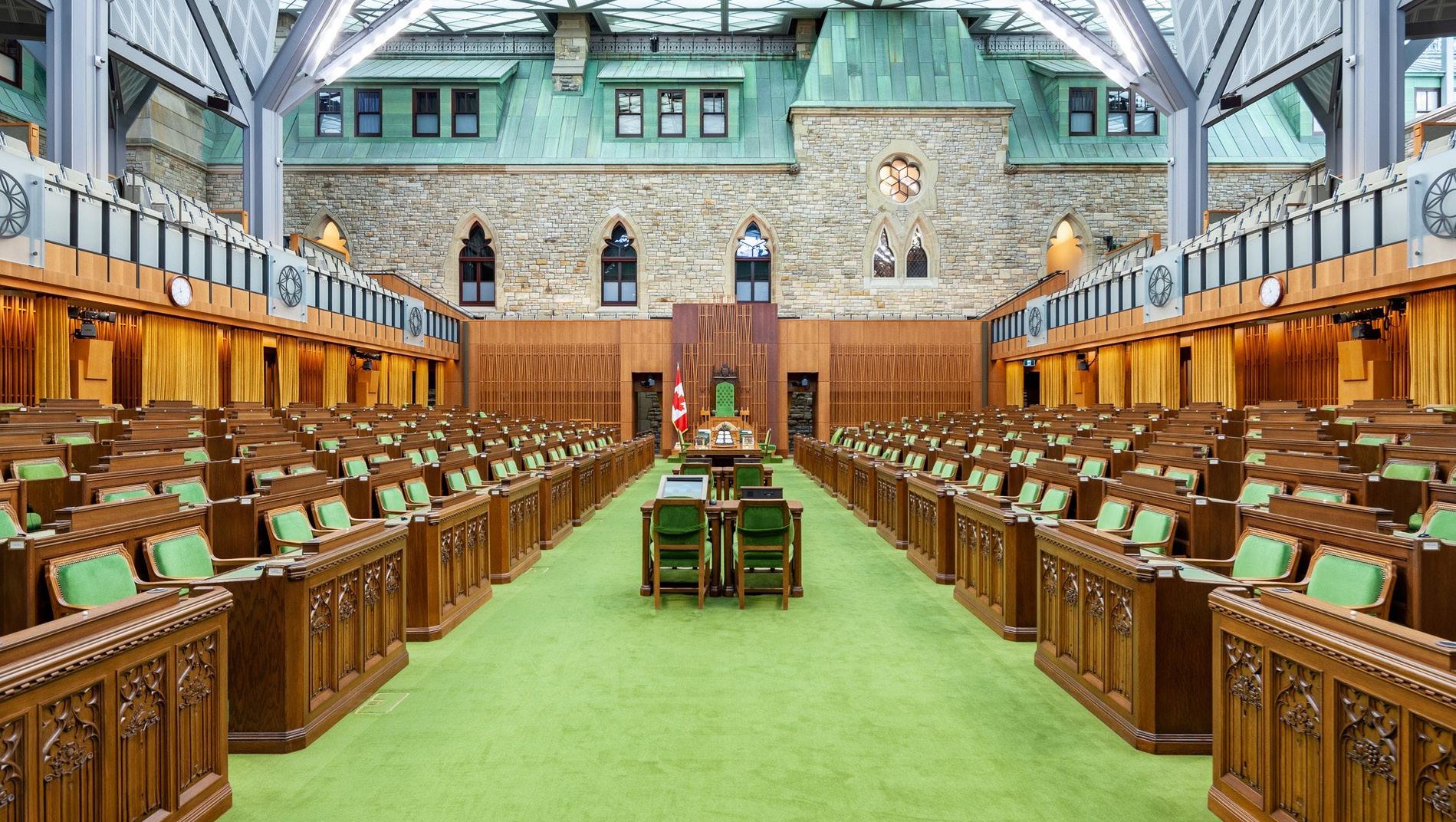
NOMINATION
The Prime Minister, Rt Hon. Justin Trudeau, MP announced on 19 August 2022 the nomination of Hon. Michelle O’Bonsawin to the Supreme Court of Canada to fill the vacancy created by the retirement of Justice Michael J. Moldaver. Following this announcement, the House of Commons Standing Committee on Justice and Human Rights held a special hearing on 24 August to discuss the nomination with the Minister of Justice and Attorney General of Canada, Hon. David Lametti, MP and the Chairperson of the Independent Advisory Board for Supreme Court of Canada Judicial Appointments, Hon. H. Wade MacLauchlan. The hearing was followed by a question-andanswer period with the nominee, which also included Parliamentarians of the Standing Senate Committee on Legal and Constitutional Affairs.
Following this meeting, Justice Michelle O’Bonsawin was appointed to the Supreme Court on 1 September 2022. An accomplished and respected jurist, she is the first Indigenous woman named to the Court since its inception in 1875.
On 27 June 2022, the Parliament of Canada unanimously endorsed the nomination of Philippe Dufresne as Privacy Commissioner of Canada. Before his appointment, Mr Dufresne had been Law Clerk and Parliamentary Counsel of the House of Commons since 2015. An independent Agent of Parliament, the role of the Privacy Commissioner is to protect and promote privacy rights and includes the power to investigate complaints and take legal action when necessary. It also advises Parliament on matters related to privacy rights of Canadians.
RECONCILIATION WITH INDIGENOUS PEOPLES
On 29 August 2022, the Survivors’ Flag, which commemorates the thousands of Indigenous children who were taken from their homes to attend residential schools across Canada, was raised on Parliament Hill. The flag was developed by survivors of different First Nations, Inuit and Métis communities in collaboration with the National Centre for Truth and Reconciliation. It had first been raised in 2021 to mark the inaugural National Day for Truth and Reconciliation. The flag will fly on Parliament Hill until 2024, after which a permanent home for it will be found.
The Parliamentarian | 2022: Issue Three | 100 years of publishing | 275 PARLIAMENTARY REPORT CANADA
The National Anti-Doping Bill, 2021
Background: The Copenhagen Declaration on Anti-Doping in Sport was agreed to by the Government of India in March 2003, which was the political declaration through which governments signaled their intention to formally recognise and implement the World Anti-Doping Code, introduced by the World Anti-Doping Agency (WADA). In 2005, India also signed the United Nations Educational, Scientific and Cultural Organisation (UNESCO) International Convention against Doping in Sport, also known as the ‘UNESCO Convention’ and it was ratified in November 2007. Pursuant to the ratification of the said convention, the Government of India established the National Dope Testing Laboratory and the National Anti-Doping Agency.
The UNESCO Convention aims to promote the prevention of, and the fight against, doping in sports for its elimination. Article 5 requires the signatory countries to adopt appropriate measures that may include legislation, regulation, policies or administrative practices and to commit themselves to the principles of the World Anti-Doping Code as the basis for the measures provided in the said Convention.
In order to comply with both Conventions, the Authorities in India concerned with anti-doping activities related to sports
required the requisite legal authority. Hence, it became imperative to provide a statutory framework in the form of legislation for the strengthening of the functions and operations of the National Anti-Doping Agency and the National Dope Testing Laboratory in India to carry out their activities, and to comply with the provisions of the UNESCO Convention and the WADA Code.
Therefore, the National Anti-Doping Bill, 2022 was introduced in the Lok Sabha on 17 December 2021 with a view to:

i) establish a National Board for AntiDoping in Sport;
ii) establish National Dope Testing Laboratory and other dope testing laboratories; and
iii) strengthen the framework and mechanisms for carrying out the doping control programme in sports to ensure dope-free sport in India.
Debate: During the three hour 25 minutes long debate, the Bill received support from all sections of the Parliament. Some of the suggestions put forth by Members included:
• Awareness and dissemination of information about anti-doping among athletes, coaches, doctors and other sports staff is needed urgently.
• Dope-free certification by independent bodies should be made mandatory for all supplements or nutraceuticals regularly consumed by athletes.
• There is no provision in the Bill which envisages any forms of punishment for coaches in order to discourage them for suggesting such substances to athletes.
• This Bill will strengthen anti-doping activities in sports in compliance with the provisions of the UNESCO International Convention.
• The Government of India should make it mandatory for every sports camp to have at least one certified sports medicine doctor to advise athletes so that they do not use unethical means to improve their performance.
• Dope testing laboratories should be established in each State and district so as to provide better coverage and reduce time delays.
• Sports infrastructure needs to be strengthened at school-level.
Replying to the debate, the Ministerin-charge of the Bill, Shri Anurag Singh Thakur thanked all the participating Members for their support to the Bill and stated that as far as sports is concerned, India is moving forward rapidly. He further said that giving statutory status to the National Anti-Doping Agency (NADA), the National Dope Testing Laboratory and other dope testing laboratories will reduce the time and expenses incurred on sending samples to other countries for dope-testing. He also stated that the Government is serious about creating awareness about doping amongst athletes
276 | The Parliamentarian | 2022: Issue Three | 100 years of publishing THIRD READING REPORT
THIRD READING REPORT INDIA
The Parliament of India.
and other stakeholders and has taken a series of steps in this regard.
The Bill was passed by the Lok Sabha on 27 July 2022 and by the Rajya Sabha on 3 August 2022. The Bill, as passed by both the Houses, was assented to by the President of India on 12 August 2022.
The Weapons of Mass Destruction and their Delivery Systems (Prohibition of Unlawful Activities) Amendment Bill, 2022
Background: The Weapons of Mass Destruction and their Delivery Systems (Prohibition of Unlawful Activities) Act, 2005 was enacted to prohibit unlawful activities in relation to any biological, chemical or nuclear weapons and their delivery systems and provided for legal measures to exercise control over the export of related material, equipment and technologies, including prevention of their transfers to non-State actors and terrorists.
In recent times, regulations by international organisations relating to proliferation of weapons of mass destruction (WMD) and their delivery systems have expanded. The United Nations Security Council’s targeted financial sanctions and the recommendations of the Financial Action Task Force (FATF) have mandated against financing of proliferation of weapons of mass destruction and their delivery systems.
In view thereof, there was a need to amend the Weapons of Mass Destruction and their Delivery Systems (Prevention of Unlawful Activities) Act, 2005 to provide against the financing of proliferation of weapons of mass destruction and their delivery systems so as to fulfil India’s international obligations.
The Weapons of Mass Destruction and their Delivery Systems (Prohibiton of Unlawful Activities) Amendment Bill, 2022 was accordingly introduced in the Lok Sabha on 5 April 2022. The Bill inter alia sought: a. to prohibit financing of any activity in relation to weapons of mass destruction and their delivery systems; b. to empower freezing of funds of financial assets or economic resources for preventing such financing; c. to prohibit making available funds, financial assets or economic resources for prohibited activity in relation to
weapons of mass destruction and their delivery systems.
Debate: During the debate, the Bill received unequivocal support from all the sections in Lok Sabha. The main points put forth by the Members included:
• In order to fully achieve deterrence against proliferation financing, a level of international cooperation is required with respect to extradition;
• Only enacting legislation cannot be a holistic approach to curb the menace, rather some international treaties must be initiated by the United Nations; binding upon Member-States;
• State-wise legislation is essentially needed, but what is needed more is a collective and holistic mechanism through the United Nations or any other forum not only to curb the menace, but to implement such type of legislation in a proper manner irrespective of State boundaries.
• India is a responsible nuclear weapon State and is committed, as per its nuclear doctrine, to maintain a credible, minimum deterrence with the posture of no-first-use and non-use against non-nuclear weapon States.
• The definition of ‘Weapons of Mass Destruction’ is for nuclear, biological and chemical weapons, which need to be expanded. There is a need to rethink about radiology, high explosives, CBRN weapons and cyber-
attacks, electro-magnetic attacks, munitions, etc.
• The Bill shows the deep commitment of the Government of India to our counter-terrorism measures and also our deep commitment to international obligations and conventions.
• As India remains particularly vulnerable to biological threats and has a history of hostile political conflicts, the country needs to take a lead in ensuring the Biological Weapons Convention is effective in its aim at curbing use of biological agents or toxins.
The Minister-in-Charge of the Bill, Dr S. Jaishankar, replying to the debate expressed satisfaction that there was unanimity in the House over a crucial foreign policy matter. He further stated that the FATF’s recommendation No.7 says that countries should implement targeted financial action to comply with UN Security Council Resolution that ‘they should freeze without delay funds and assets, and ensure that no funds and assets are made available directly or indirectly, to any person or entity dealing with WMD’. This Bill is a step in that direction.
The Bill was passed by the Lok Sabha on 6 April 2022 and by Rajya Sabha on 1 August 2022. The Bill, as passed by both the Houses, received the assent of the President of India on 6 August 2022.
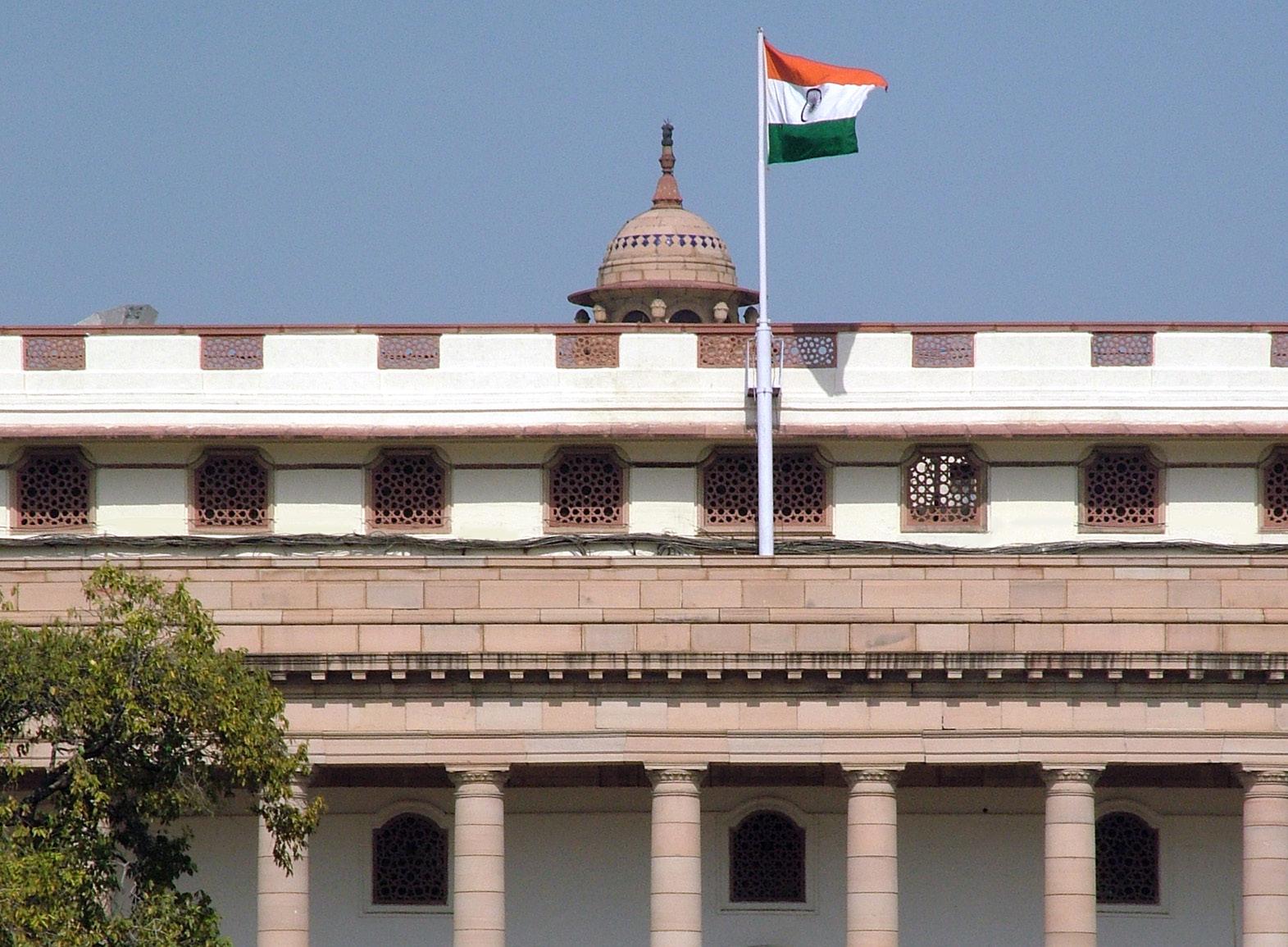
The Parliamentarian | 2022: Issue Three | 100 years of publishing | 277 THIRD READING REPORT INDIA
Third Reading Report by Vinay Kumar Mohan, Parliament of India.
NEWS FROM TRINIDAD AND TOBAGO PARLIAMENT

TRINIDAD AND TOBAGO’S PRESIDENT URGES MPs TO EMBRACE COLLABORATION
Trinidad and Tobago’s President, Her Excellency Paula Mae-Weekes has urged Members of Parliament to embrace the spirit of collaboration during her address at the opening of the Third Session of the 12th Parliament. Before she began her address, the President expressed her deepest condolences to King Charles III and the Royal Family on the death of Queen Elizabeth II. The President told MPs that the new session provides them with a golden opportunity to offer perspectives, attitudes and behaviour as the people’s representatives as they endeavoured to fulfil their oaths of office: “Why not use this new session of Parliament to present an alternative to a regrettable status quo? Resolve to put behind petty squabbles and divisions and work together for the benefit of all.”
The President reminded Members that they were the vanguard in upholding the country’s democracy and of making relevant and useful laws that will contribute to national development. “Challenges, old and new, must be tackled head on and with wisdom, industry and co-operation. None of this can be achieved if the starting point is ugly party politics or it’s tit-for-tat partisan agenda.”
President Mae-Weekes noted that if unnecessary contention, the exchange of wild accusations and insults, and abrupt withdrawal are the order of the day, how and when will the people’s business to
be conducted? She called for patriotism which transcends cultural, racial and political bounds which will reflect bipartisan endeavour. The President noted that the 12th Parliament of Trinidad and Tobago had produced 45 Acts out of 71 sittings of the House of Representatives, and 69 of the Senate, and urged that the Third Session of the 12th Parliament does not judge it too harshly.
MPs PAY TRIBUTE TO HER MAJESTY QUEEN ELIZABETH II
The Acting Prime Minister of Trinidad and Tobago, Hon. Colm Imbert, MP stated that the late Queen Elizabeth II was the epitome of grace and endurance, and also extended the country’s sincerest condolences to King Charles III and the late Queen’s family.
Hon. Colm Imbert told Parliament that, though the Prime Minister, Hon. Dr Keith Rowley, MP was not physically present in Parliament today, we speak with one voice in the language of grief and loss as, “we reflect on the contributions made by Her Majesty”. He said that Queen Elizabeth II had visited Trinidad and Tobago in 1966 and 1985, and was a special guest when the country hosted the 2009 Commonwealth Heads of Government Meeting (CHOGM).
Hon. Colm Imbert added: “As part of the Cabinet at that time, I recall her visit here as one that brought great joy to many, as for us too, this was the only monarch that we have known. She was an ardent admirer of our steel band and insisted that the Trinidad and Tobago Defence
Force Steel Orchestra play at her recently concluded [Platinum] Jubilee celebrations.”
The Opposition Leader, Hon. Kamla Persad-Bissessar, MP noted that the life of Queen Elizabeth II was “an inspiring one, that neither youth nor gender would prevent her from undertaking such a role with great responsibilities. Indeed she took up the role of Monarch when she was just 25 years old. Today, as women across the globe traverse the halls of power in every field, we can all say that Queen Elizabeth II stood as one of the early pioneers to inspire young girls across the globe to believe that not only women equal me, but they can lead them.”
Hon. Kamla Persad-Bissessar continued that she had met The Queen in person several times on the Commonwealth stage and that Her Majesty had lived a life of service to the British people and to the Commonwealth to the very end.
The Speaker of the House of Representatives, Hon. Bridgid AnnisetteGeorge, MP said that Queen Elizabeth II’s 70-year reign is characterised by her unwavering dedication and service to her people. “I admire Her Majesty in times of war. The Queen served alongside her people, and in times of uncertainty and change, she stood firmly and supportively with her people. Her Majesty has fulfilled her promise to the people of the United Kingdom and the Commonwealth when she vowed that her whole life, whether long or short, shall be devoted to their service.”
Former MP and Minister of Foreign Affairs, Winston Dookeran said that Queen Elizabeth II had been an extraordinary
278 | The Parliamentarian | 2022: Issue Three | 100 years of publishing PARLIAMENTARY REPORT TRINIDAD AND TOBAGO LEGISLATIVE
Parliamentary Report by Paras Ramoutar, Freelance Journalist based at the Parliament of Trinidad and Tobago.
Head of the Commonwealth. “She discharged her duties with great dignity and sensitivity. The world will mourn a leader who can be emulated as an icon among leaders. We, in Trinidad and Tobago, are fortunate to have her during the relevant period of the country. I think her life would be a monument of stability and state craft ever displayed by a Monarch at all times.”
TRINIDAD’S FINANCE MINISTER GIVES A PHILOSOPHICAL OVERVIEW OF 2023 BUDGET
The Finance Minister of Trinidad and Tobago, Hon. Colm Imbert gave a philosophical overview as he presented the 2023 Budget to Parliament, saying that the budget places the national interest at the centre of the country’s developmental agenda. He stated that the Government have sought to foster a unity of purpose and the well-being of citizens in its ‘Roadmap to Recovery’ Programme. He continued: “We will achieve macro-economic sustainability over the medium-term with an emphasis on fiscal and debt consolidation with a social conscience, while at the same time creating the fiscal space to address critical challenges. The resulting stability conditions of low inflation and interest rates as well as a competitive exchange rate will engender to increasing savings and investments to finance growth and development.”
The Finance Minister said that the Government were investing heavily in national infrastructure projects, including roads, drainage, schools, hospitals, public buildings and facilities, tourism sites, ICT, water supply and electrification, among other development projects and programmes, in order to create employment and stimulate economic activity. “We are enhancing investments in digital technology which will underpin the modern and diversified economy. We are continuing to ensure a supportive business environment within which the private sector can strive, grow and facilitate a buoyant non-energy sector. We are improving the investment climate as well as the ease of doing business”, he added.
The Finance Minister said that we are deepening human capital development through multi-faceted education and training programmes. “Madam Speaker, despite the enormous difficulties and challenges that we face. I am confident
that the resilience and support of our citizens, combined with the wide range of policies, projects and programmes which we have put in place will sustain the momentum of the economic recovery.”
FUEL PRICE INCREASES IN TT$56.1 BILLION BUDGET
The 2022-23 Trinidad and Tobago Budget, that was recently introduced in the House of Representatives, is titled ‘Tenacity and stability in the face of global challenges’ and is estimated at TT$56.1 billion.
Members of Parliament debated the budget measures in the House of Representatives. Key features of the Budget included an increase in fuel prices; an increase in personal income tax to TT$90,000 from TT$84,000 a year which means that individuals earning TT$7,500 a month will be exempted from income tax; an amnesty on penalties owed on financial affairs; an increase fines for stealing or illegally obtaining old or stolen metal. As predicted earlier in the year, the price of fuel has been increased to TT$1 per litre for premium and supreme gasoline, and 50 cents for diesel.
The Finance Minister told the House of Representatives that two and a half year have now passed since COVID-19 was declared a pandemic by the World Health Organisation and all advanced and emerging countries were forced to face two adverse challenges simultaneously: saving lives and protecting livelihoods with the resulting impact on economies.
MP QUERIES SAFETY OF PIPEBORNE WATER
An Opposition MP, Hon. Barry Padarath has complained about the water woes in his constituency of Princes Town, and by extension in several other parts of Trinidad and Tobago. In his response to the Government’s latest Budget, the Member pointed out that people are suffering daily with supplies of water, and that the Government was ignoring the pleas of the population. According to a Water and Sewerage Authority (WASA) bacterial report the local water supply was complaint, although Hon. Barry Padarath questioned the safety of the water supply, claiming that the WASA agency had failed to meet certain standards in its scientific testing of the quality of the water supply. He also states that proper data about water supply in the country must be sought urgently as some
TRINIDAD AND TOBAGO
reports suggest that 52% of the population are without water on a daily basis.
The Minister of Public Utilities, Hon. Marvin Gonzales denied that Government has any plans to fire 2,500 workers in the Water and Sewerage Authority and that the Government was not complacent in the face of the dire economic position.
OPPOSITION LEADER RESPONDS TO GOVERNMENT BUDGET
The Opposition Leader, Hon. Kamla PersadBissessar has termed the Trinidad and Tobago Government’s 2022-2023 Budget as ‘wicked’ and ‘an act of brutality against the working class’ in her response to the budget in the House of Representatives.
The Leader of the Opposition United National Congress party said that the Budget statement is “an unnecessary provocation of our poor and working-class citizens. There is a seething anger building in the country against an entrenched unfairness being perpetuated against citizens to benefit a chosen few. Our economy is in crisis, our business sector is heavily polarised, and the SME sector remains severely challenged. International studies are reporting that our citizens are suffering badly.”
Hon. Kamla Persad-Bissessar said that the Minister of Finance was using the concept of falling energy revenues as justification for the Government’s inability to conclude negotiations with the unions, offering zero and one per cent salary increases even as the cost of living grew, and as the explanation for raising taxes and adding new taxes. “Like the rest of the population, we were hoping for a Budget that would address the realities of our country. Instead, the Government’s reaction was to introduce and raise even more taxes, remove even more subsidies, raise fuel prices even higher and offer unions less than minimum wages increases. Instead of sustainable measures for growth, development and an increase to the quality of life of people, the presentation was a long, tiring, misleading diatribe laced statistical deceit, bluff and outright manipulations and falsification of data”, she noted.
The Leader of the Opposition outlined several issues that would advance the economy, such as reducing the tax burden, jumpstarting food security, investing in renewable energy and establishing and economic booster.
The Parliamentarian | 2022: Issue Three | 100 years of publishing | 279 PARLIAMENTARY REPORT
New Zealand Bill of Rights (Declarations of Inconsistency) Amendment Bill
The New Zealand Bill of Rights (Declarations of Inconsistency)
Amendment Bill was read a third time in August 2022. The Bill had its origins in 2015 when the Supreme Court ruled that a ban on prisoner voting was inconsistent with the New Zealand Bill of Rights Act. In response, the new Bill created a mechanism for the Court to tell Parliament if it has passed a law inconsistent with the Bill of Rights Act, 1990 or the Human Rights Act, 1993, and for Parliament to consider and respond. The Bill had its First Reading in May 2020 and was carried through to the 53rd Parliament. Hon. David Parker, MP, Attorney-General (Labour) said of the Bill’s long time frame: “We haven’t tried to push this through with haste. We’ve actually tried to take everyone with us.”
In his Third Reading speech, Hon. David Parker outlined the Bill’s constitutional significance, saying: “It will change the way in which civil liberties are protected in New Zealand in what, in my opinion, is an important way.” He added: “the protections in the New Zealand Bill of Rights Act are very, very important, and perhaps they’re a bit too easy for us to ignore when Parliament gets it wrong … At the moment, there is no easy route back for Parliament to reconsider issues when the courts determine that we might have gone a bit far, or they think that we have gone too far, and that’s essentially what this Bill is about.”
The Bill ensures that Parliament still has supremacy and New Zealand courts cannot strike laws down. Instead, the Bill seeks to promote dialogue between the branches of Government, therefore giving New Zealand’s unwritten constitution greater strength. David Seymour, MP (ACT), said: “I think the process that has been arrived at is absolutely the right one because it’s been arrived at with a very delicate navigation of parliamentary sovereignty, but also accepting the reality that the courts have a role to play.”
Joseph Mooney, MP (National), said: “It is also important that Parliament is able to maintain sovereignty to make law, as it is ultimately responsible to the will of the
people via voting in general elections, but it is important that Parliament considers seriously any decisions made by the courts.”
The Bill was accompanied by new Sessional Orders setting out that declarations of inconsistency would be considered by Select Committees, responded to by the Government, and debated by the House within six months. Hon. Michael Woodhouse, MP (National), agreed that this was the right approach: “Legislation doesn’t set out what this place should do or how it should do it; that is rightly the domain of Members of this House through the Standing Orders process. I think we’ve struck the right process for dealing with this.”
Golriz Ghahraman, MP (Greens), talked about the first issue that could potentially be considered under the new legislation, voting rights for 16- and 17-year-olds. She said: “The New Zealand Bill of Rights Act does uniquely say that they can’t be discriminated against based on their age in terms of any of their fundamental rights, including voting. That’s gone to the Court of Appeal, who found a breach, and the Supreme Court has, of course, already heard that issue, and we’re waiting with bated breath for that decision to see if we’re going to debate that. And those are issues that sit very close to my heart, being about the extension and the health of our democracy.”
The Bill was passed without opposition on 23 August 2022. Camilla Belich, MP
(Labour), said: “We as legislators don’t often agree on things, but one thing we do agree on in relation to this Bill is the fact the fundamental human rights as outlined in the New Zealand Bill of Rights Act and in the Human Rights Act are something that needs to be held in great importance.”
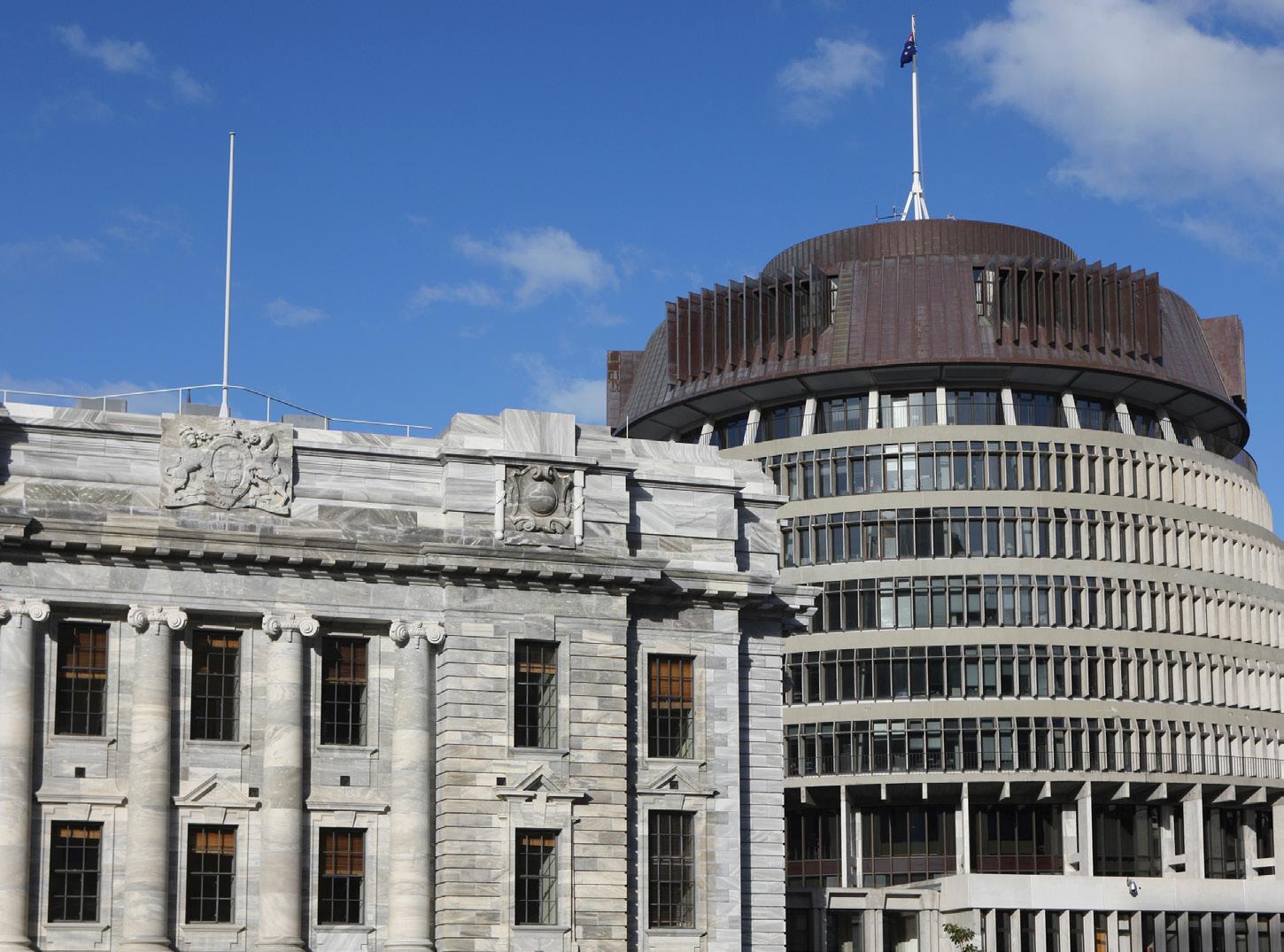
Pae Ora (Healthy Futures) Bill
The Pae Ora (Healthy Futures) Bill is the New Zealand Government’s response to the Health and Disability System Review report which found consistently poor outcomes for some groups and significant disparities in service availability, access, and quality between population groups and areas of New Zealand. The Bill also draws on reflections made by a Waitangi Tribunal inquiry into whether the health system has served the interests of Māori and been consistent with the Crown’s obligations under the Treaty of Waitangi. The Bill creates new structure and accountability arrangements whereby the current 20 district health boards and the Health Promotion Agency will be replaced by Health New Zealand, a new Crown agent, and the Māori Health Authority, an independent statutory entity. The Bill’s explanatory note states that the purpose of these reforms is to protect, promote, and improve the health of all New Zealanders, achieve equity by reducing health disparities among New Zealand’s population groups - particularly for Māori -
280 | The Parliamentarian | 2022: Issue Three | 100 years of publishing THIRD READING REPORT
THIRD READING REPORT NEW ZEALAND
Third Reading Report by Lizzie Hendy, Parliament of New Zealand.
and build towards pae ora (healthy futures) for all New Zealanders.
The Minister-in-charge of the Bill, Minister of Health, Hon. Andrew Little, MP (Labour), described it as a “once-in-a-generation change for our health system”. He said that: “if we want to overcome the postcode lottery, this is the change we need to make”, and also that these principles require the system: “to provide Māori with the opportunity to make decisions that are important to them. That’s nothing less than the commitment that was made by the British Crown [and] the obligation that the Crown owes to Māori under the Treaty, … [This legislation] will allow Māori to make their decisions to exercise their rangatiratanga (sovereignty) on this very important matter of the health of their people, and we saw it amply demonstrated in the COVID-19 vaccination campaign, where we handed over leadership and responsibility to Māori … and they made the difference in the health of their people. Let Māori lead when it comes to health, and this legislation will allow them to do that.”
Dr Shane Reti, MP (National) spoke against the Bill, saying: “This health reform loses its moral imperative by removing health need as the sole arbiter and sole utility in the health system. In its place are inequities and Treaty responses. Neither are the same as health need.” However, Hon. Willie Jackson, MP (Labour) responded: “This establishes an opportunity that we’ve never ever had before, … a by Māori, for Māori strategy, working in collaboration and in partnership with Pākehā New Zealand, mainstream New Zealand.”
Dr Elizabeth Kerekere, MP (Green) spoke in favour of the funding for the new system: “It is not often … we see the Government putting its money where its mouth is in such a timely fashion. Budget 2022 allocated eye-watering amounts of funding … including to establish the Māori Health Authority … These are required to address the health disparities for Māori [that] existed in our health system long before COVID came along to make it worse.”
Debbie Ngarewa-Packer, MP (Te Paati Māori) also spoke in favour of the funding allocation: “We cannot achieve the health outcomes we want to see with 2% of the health budget for a population that makes up more than 17% of the country.”
Brooke van Velden, MP (ACT) spoke against the Bill, saying: “This Bill is an
exercise in co-governance rather than putting healthcare at the centre of the healthcare system”, while Simon Watts, MP (National) summed up his party’s view: “Centralisation will result in a loss of local voice. Bureaucracy will not deliver better outcomes.”
The Pae Ora (Healthy Futures) Bill passed its Third Reading by 77 votes to 42, and received Royal Assent on 14 June 2022.
The Human Rights
(Disability Assist Dogs NonDiscrimination) Amendment Bill
The Human Rights (Disability Assist Dogs Non-Discrimination) Amendment Bill, a Member’s Bill, had its origins in the case of Murray Whittington and his hearing dog, Frodo. Legally, Frodo was classified a pet. With over 40 tenancy applications denied on the grounds of no pets, Whittington feared he might have to return Frodo to avoid homelessness. Former Green MP and Green Party disability spokesperson, Mojo Mathers, herself deaf, responded by drafting the Bill to extend the legal protections granted to guide dogs to all disability assist dogs. On 3 December 2015, Mathers marked International Day of Persons with Disabilities by launching the Bill, which sat in the ballot until it was drawn and introduced on 8 April 2021. As Ms Mathers was no longer an MP, Ricardo Menéndez March, MP (Green) guided the Bill through the House.
The Bill makes two small changes to the Human Rights Act 1993. Firstly, it inserts ‘disability assist dog’ into the interpretation section of the Human Rights Act, specifying: “‘disability assist dog’ has the same meaning as in section 2 of the Dog Control Act 1996.” The Dog Control Act 1996 defines ‘disability assist dog’ as a dog trained to assist a person with a disability and certified by an organisation named within the Act. Secondly, it amends Section 21 (Prohibited grounds of discrimination) of the Human Rights Act, replacing ‘guide dog’ with ‘disability assist dog’. According to Menéndez March: “[it] seeks to amend the Human Rights Act to make it really clear that discriminating against disability assist dogs is discrimination towards disabled people.” Disability assist dogs perform tasks that support disabled people, including people who are blind, deaf, mobility-impaired, epileptic and/or
diabetic. Currently, approximately one in four New Zealanders identify as disabled.
The Social Services and Community Committee worked to make the Select Committee submission process as accessible as possible. Committee Member, Karen Chhour, MP (ACT), noted: “Not only did it bring the attention to the disability assist dogs, it brought attention to the fact that there are many barriers for the disabled community.” Accommodations included additional time for submissions, New Zealand Sign Language interpretation, and live transcription. Angie Warren-Clark, MP (Labour), Chair of the Committee, concluded: “[the Select Committee] didn’t make any amendments to the Bill, which is fair enough really - it’s quite a small Bill.”
Emily Henderson, MP (Labour) noted that there had been only eight MPs with disabilities in the history of the House, and hoped that more accommodations would be made in future. She said: “How good will it be when this parliamentary community is fully representative of our full community, including the one in four Kiwis who are disabled?”
Penny Simmonds, MP (National), National’s disability issues spokesperson, critiqued the Bill for only authorising eight organisations to certify disability assist dogs, since “demand routinely exceeds supply.” Simmonds introduced Supplementary Order Paper (SOP) 145 to widen the scope to include private trainers recognised by those organisations. Menéndez March said: “It is unfortunate that this SOP was brought so late into the process, because that consultative process wasn’t able to happen.” The SOP was widely criticised by Labour Members for its late introduction. It was rejected, with 55 votes in favour (National, Green, ACT, Te Paati Māori) and 65 votes opposed (Labour).
At the Bill’s Third Reading, Menéndez March looked forward: “there is so much more work to do. … I think this Bill should, hopefully, pave the way for broader reform.” National Party Members expressed disappointment that the Labour Party had voted against the SOP. Ian McKelvie, MP (National), said: “I’m sure it will mark us again in the future”, however, the Human Rights (Disability Assist Dogs Non-Discrimination) Amendment Bill passed its Third Reading with support from all parties.
THIRD READING REPORT NEW ZEALAND The Parliamentarian | 2022: Issue Three | 100 years of publishing | 281
OF THE
The opening of the 47th Parliament of Australia took place in Canberra on Tuesday 26 July 2022. The day began with a Welcome to Country ceremony in the Great Hall at Australian Parliament House, in which Dr Aunty Matilda House-Williams, Ngambri and Ngunnawal Elder, welcomed Members, Senators and their guests to the traditional country on which Parliament House stands.
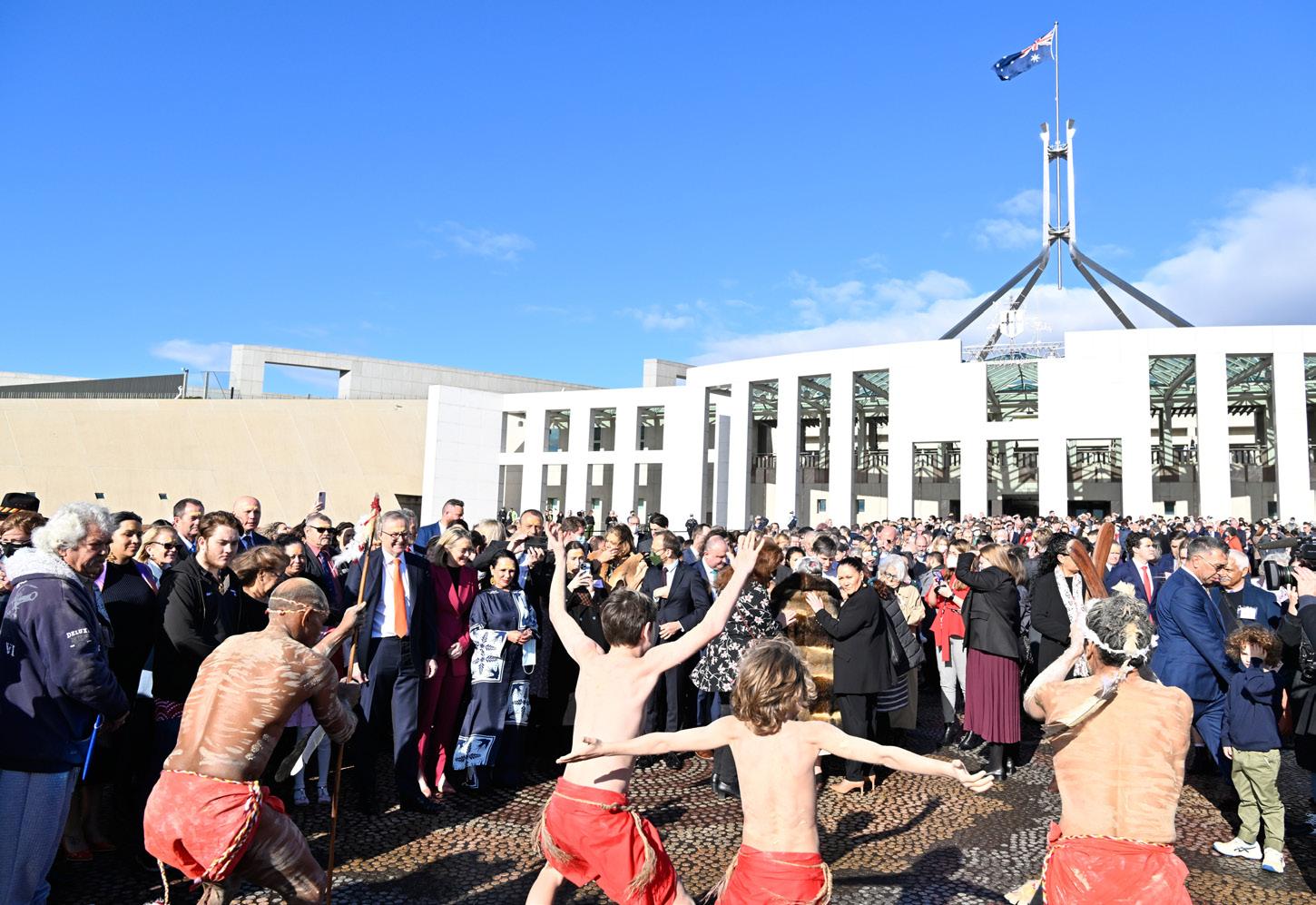
Aunty Matilda’s son, Mr Paul Girrawah House, Ngambri and Ngunnawal Custodian, then completed the Welcome to Country on her behalf. At the conclusion of the ceremony, Mr House presented a coolamon, which he had earlier cut from a tree within the parliamentary precinct, to the Prime Minister, Hon. Anthony Albanese, MP, as a gift to the Parliament. The Prime Minister, and the Leader of the Opposition, Hon. Peter Dutton, MP, responded to the Welcoming Address. The Welcome to Country ceremony was followed by a smoking ceremony on the Forecourt of Parliament House.
Members of the House of Representatives attended the Senate, for the first of two occasions that day, to hear the Parliament formally declared open by the Chief Justice of the High Court of Australia, Hon. Susan Kiefel, AC, as the Deputy of the GovernorGeneral, His Excellency General Hon. David Hurley, AC DSC (Retd)
Members returned to the House of Representatives and were sworn in by Hon. Stephen Gageler, AC, Justice of the High Court, as a Deputy of the GovernorGeneral. An election of the Speaker then took place as the next item of business.
The Member for Oxley, Mr Milton Dick, MP (Australian Labor Party) and the Member for Fisher, Hon. Andrew Wallace, MP (Liberal National Party of Queensland) were nominated for the position and both accepted their nomination.
The Member for Macquarie, Ms Susan Templeman, MP (Australian Labor Party), who nominated Mr Dick, told the House that he “has shown a deep interest in the rules of this place.” Describing Mr Dick as a “generous soul”, Ms Templeman said that during his time in Parliament, Mr Dick had been a member of the Speaker’s Panel, Deputy Chair of the Procedure Committee, and a member of the Joint Standing Committee on Electoral Matters,
PARLIAMENT OF AUSTRALIA
Parliamentary Report by Fleur Hall, Parliament of Australia.
through which he had continued “a deep commitment to maintaining the integrity of democratic institutions.”
Seconding the motion, the Member for Bendigo, Ms Lisa Chesters, MP (Australian Labor Party), told the House that Mr Dick “has the skills and the attributes required for the role of Speaker” and that he was “calm, considered and focused on solutions [and] committed to listening to different colleagues for the best possible outcome.”
The Member for McPherson, Hon. Karen Andrews, MP (Liberal National Party of Queensland), who nominated Mr Wallace, told the House that he “is an incredible example of a broadly experienced Parliamentarian.” Mrs Andrews said that she “would urge new Members of Parliament, particularly those new Independent Members on the crossbench, to consider his experience as a previous Speaker of the House.” Mrs Andrew concluded the motion by saying that Mr Wallace “is a thoroughly decent individual and exactly the sort of person who epitomises the qualities of a true, respectful and observant Speaker in the traditional mould.”
Seconding the motion, the Member for Forde, Mr Bert van Manen, MP (Liberal National Party of Queensland), said that Mr Wallace had served as a Speaker in the 46th Parliament with “dignity and respect” and that he could “attest to his incredible knowledge and passion for our nation’s parliamentary processes.”
A ballot was then held and the Clerk of the House of Representatives, Ms Claressa Surtees, announced that Mr Dick had received 92 votes and that Mr Wallace had received 56 votes. Mr Dick was declared elected and was escorted to the Chair. He thanked the House for the honour and took the Chair. The Prime Minister, the Leader of the Opposition, the Leader of the House, Hon. Tony Burke, MP, the Manager of Opposition Business, Hon. Paul Fletcher, MP and the Leader of the Australian Greens, Mr Adam Bandt, MP all congratulated the Speaker. The Speaker expressed his thanks, remarking that “this Chamber should be a place of ideas and energy, and I want to allow debate to flow and the very best ideas to be exchanged in a respectful manner.”
Later that day, the Member for Newcastle, Ms Sharon Claydon, MP (Australian Labor Party), was elected Deputy Speaker and the Member for Moore, Mr Ian Goodenough, MP (Liberal Party of Australia), was elected Second Deputy Speaker.
In the Senate, after Senators were sworn in by the Chief Justice, the Senate proceeded to elect its President. The Leader of the Government in the Senate, Senator Hon. Penny Wong (Australian Labor Party), proposed Senator Sue Lines (Australian Labor Party) to the Senate for its President. The Leader of the Australian Greens in the Senate, Senator Larissa
282 | The Parliamentarian | 2022: Issue Three | 100 years of publishing PARLIAMENTARY REPORT AUSTRALIA OPENING
47th
Image credit: Penny Bradfield/Auspic.
The traditional Smoking Ceremony is held in the Parliamentary Forecourt ahead of the Opening of the 47th Parliament of Australia.
A ballot was held, following which the Clerk of the Senate, Mr Richard Pye, announced that Senator Lines had received 54 votes and that Senator Cox had received 12 votes. The Clerk then declared Senator Lines elected as President.
The President thanked the Senate for the honour conferred upon her and took the Chair, telling the Senate that “I will do my utmost to be a fair and consultative President.” The President was congratulated by Senator Hon. Penny Wong, and by the Leader of the Opposition in the Senate, Senator Hon. Simon Birmingham and Senator Waters. Later that day, Senator Andrew McLachlan, CSC (Liberal Party of Australia) was elected Deputy President and Chair of Committees.
At 3.00pm, Members of the House attended the Senate, for a second time, to hear the opening speech of the GovernorGeneral: the formal declaration of the causes of calling Parliament together, and an outline of the Government’s proposed legislative program. The Government’s priorities outlined in the speech encompassed several areas, including economic growth, childcare, jobs and skills, Australian manufacturing, infrastructure, health care and COVID-19, aged care, climate change and energy, disaster readiness, and the establishment of an anticorruption commission. The Government also conveyed its intention to implement the Uluru Statement from the Heart and to seek to enshrine a First Nations
voice to Parliament in the Constitution via a referendum. A 19-gun salute on the Forecourt signified the end of the speech.
When the Speaker and Members returned to the House, and before the Governor-General’s speech was reported, some formal business was transacted, pursuant to the Standing Orders. This took the form of the presentation and First Reading of a Bill, the Customs Amendment Bill 2022. The transaction of formal business that is not part of the legislative program outlined by the Government in the Governor-General’s speech is the symbolic declaration by the House that it is master of its own program of business.
MEMBERS’ AND SENATORS’ FIRST SPEECHES
In the House of Representatives, four new Members contributed to the debate on the motion that the Address in Reply to the Governor-General be agreed to, using the opportunity to give their first speeches: the Member for Reid, Ms Sally Sitou, MP (Australian Labor Party), the Member for Swan, Ms Zaneta Mascarenhas, MP (Australian Labor Party), the Member for Casey, Mr Aaron Violi, MP (Liberal Party of Australia) and the Member for Goldstein, Ms Zoe Daniel, MP (Independent).
During the first three sitting weeks, a further 26 new Members gave their first speeches – from the Australian Labor Party: Dr Michelle Ananda-Rajah, MP, Mr Matt Burnell, MP, Ms Cassandra Fernando, MP, Dr Carina Garland, MP, Ms Tania Lawrence, MP, Mr Sam Lim, MP, Ms
Louise Miller-Frost, MP, Mr Sam Rae, MP, Dr Gordon Reid, MP, Ms Tracey Roberts, MP and Ms Marion Scrymgour, MP; from the Liberal Party of Australia: Ms Jenny Ware, MP and Mr Keith Wolahan, MP; from the Liberal National Party of Queensland: Mr Colin Boyce, MP, Mr Henry Pike, MP and Mr Andrew Willcox, MP; from The Nationals: Mr Sam Birrell, MP; from the Australian Greens: Mr Stephen Bates, MP, Mr Max Chandler-Mather, MP and Ms Elizabeth Watson-Brown, MP, as well as Independent Members: Ms Kate Chaney, MP, Ms Dai Le, MP, Dr Monique Ryan, MP, Dr Sophie Scamps, MP, Ms Allegra Spender, MP and Ms Kylea Tink, MP
In the Senate, 11 new Senators gave their first speeches: from the Country Liberal Party: Senator Jacinta Nampijinpa Price; from the Australian Labor Party: Senator Fatima Payman, Senator Jana Stewart and Senator Linda White; from the Australian Greens: Senator Penny Allman-Payne, Senator Barbara Pocock and Senator David Shoebridge; from The Nationals: Senator Ross Cadell; from Jacqui Lambie Network: Senator Tammy Tyrrell; from the United Australia Party: Senator Ralph Babet, as well as Independent Senator David Pocock.
PARLIAMENTARY REPORTS FROM THE CPA AUSTRALIA REGION
NEW GOVERNOR OF WESTERN AUSTRALIA SWORN IN
His Excellency Hon. Christopher Dawson, APM was sworn in on 15 July 2022 as the 34th Governor of Western Australia, succeeding Hon. Kim Beazley, AC, who has served in the role since May 2018. Prior to his appointment, His Excellency had led the Western Australia police force since 2017, including overseeing the state’s strict border and travel restrictions during the COVID-19 pandemic. The Premier of Western Australia, Hon. Mark McGowan, MP, made the announcement about the appointment on 4 April 2022.
The Welcome to Country ceremony is held in the Great Hall of the Australian Parliament Building.
At his swearing-in, His Excellency said that he was “passionate about Western Australia and its people” and he pledged to be a “respectful custodian and [to] use the opportunity to advocate, support and encourage the young leaders of today to further the reconciliation between our First Nations people and all West Australians.”
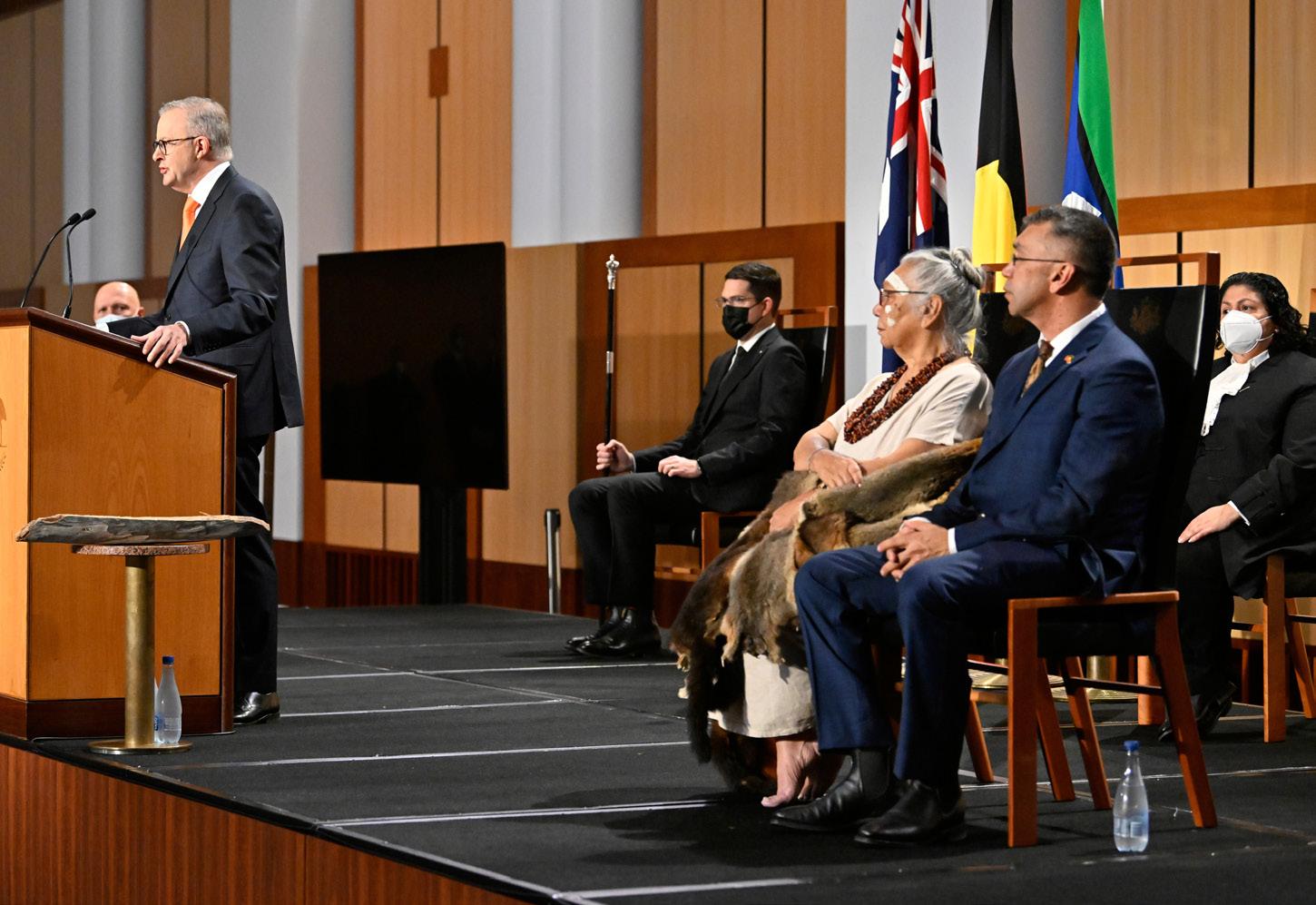
The Parliamentarian | 2022: Issue Three | 100 years of publishing | 283
Waters, proposed Senator Dorinda Cox (Australian Greens).
PARLIAMENTARY REPORT AUSTRALIA
Image credit: Penny Bradfield/Auspic.
THIRD READING REPORT
Climate Change Bill 2022 and Climate Change (Consequential Amendments) Bill 2022
These Bills were introduced in the Australian House of Representatives on 27 July 2022.
The Climate Change Bill 2022:
• outlines Australia’s greenhouse gas emissions reduction targets of a 43% reduction from 2005 levels by 2030 and net zero by 2050;
• requires the Minister to prepare and table an annual climate change statement;
• requires the Climate Change Authority to give the Minister advice in relation to the annual statement and future greenhouse gas emissions reduction targets; and
• provides for periodic reviews of the operation of the Act.
The Climate Change (Consequential Amendments) Bill 2022 makes consequential amendments to 14 Acts to incorporate Australia’s greenhouse gas emissions reduction targets under the Paris Agreement into legislation for relevant Commonwealth entities and schemes.
On 3 August 2022, the Leader of the House, Hon. Tony Burke, MP (Australian Labor Party), moved a suspension of the Standing Orders in relation to the passage of both Bills. The motion provided for, in relation to the Second Reading debate:
• debate on the Bills to continue until there were no further Members rising to speak or until at least 10.00pm; and
• shorter speaking times of 10 minutes (compared with the 15 minutes provided for by the Standing Orders), with a Minister able to reduce the time further, to five minutes, after 9.00pm, if in their opinion the number of speakers would mean the House would sit unreasonably late.
The Leader of the House explained that the approach, which differed from the urgent Bills procedure set out in the Standing Orders, was to cater for “an unusually large number of people of all different opinions on these Bills, who would regard these Bills and the issues within them as critical to how they sought election to be in the place.” The motion was agreed to on the voices. Fifty-one Members
contributed to the Second Reading debate in the House, which concluded at 9.27pm.
The Minister for Climate Change and Energy, Hon. Chris Bowen, MP (Australian Labor Party) told the House that the Climate Change Bill had been introduced in response to “one of the most urgent…issues of our time – climate change.” Describing it as “simple, yet powerful”, the Minister said that the Bill “is a solid foundation, setting clearly and firmly, in Australian law, our emissions reduction ambitions. It holds the government of the day properly accountable to the Australian Parliament and the Australian people, on how it measures up to those ambitions, and how it is addressing this fundamental issue.”
The Minister also outlined the Government’s “comprehensive plan, which sits alongside the…targets…in the Bill.” These included, he said:
• re-wiring the nation to modernise the grid, implement the Integrated System Plan and to provide the country with more renewables, transmission and storage;
• 82% renewable energy in our electricity system by 2030;
• a national electric vehicle strategy to increase access to affordable electric and hydrogen vehicles; and
• a national battery strategy, to use… our international advantage in raw materials to not just supply minerals, but to build a domestic industry.
In his speech, the Minister also acknowledged “the spirit of constructive engagement on this Bill from the crossbenches of both this House and the other place.”
The Shadow Minister for Climate Change and Energy, Mr Ted O’Brien, MP (Liberal National Party of Queensland) said that the Bills “do not account…for the economic consequences of higher energy prices and their impact on Australian businesses, investments and jobs, along with the households and families and the basic way of life for everyday Australians.” He said that the Bills “require the Minister to make an annual statement on the progress towards meeting its climate change policies … but there’s absolutely nothing … in the requirement for the annual statement that relates to the economy or prices.”
Echoing these sentiments, the Member for Canning, Hon. Andrew Hastie, MP
(Liberal Party of Australia) told the House that “fundamentally this country cannot have a conversation about a climate change Bill without confronting the obvious effect it will have on jobs and the cost of living.” He argued that “Labor is so focused on the politics that they have not considered the consequences. Through [the Bills], they have removed all Ministerial accountability for the impact of their policies on jobs, wages, investment and regional communities.” Mr Hastie said that “jobs will go in Canning. We are home to two bauxite mines and two refineries, Wagerup and Pinjarra. That is 3,000 jobs, direct and indirect, in Canning, not to mention the many FIFO workers I represent.”
In her contribution, the Member for Ryan, Ms Elizabeth Watson-Brown, MP (Australian Greens) said that she wanted to “speak up” for the future of her grandchildren. Ms Watson-Brown said that “43% emissions reduction by 2030 is not enough, but, with the ratchet mechanism negotiated by the Greens, we may … be able to get it to 75% by 2030 and, ultimately, to 100% by 2035, which is in line with what is actually needed.” Ms Watson-Brown told the House that “it’s easy to be distracted by targets, and I fear a lot of this debate has been distracting us from the bigger issue … new coal and gas. We cannot overstate the problem here: if all of the coal and gas projects currently in the pipeline go ahead, they will produce 30 times the emissions that the 43% target will cut.”
The Member for New England, Hon. Barnaby Joyce, MP (The Nationals) argued that “there is nothing in this legislation that will affect the climate. It is a form of virtue signalling. It is a form of … being a part of a global movement … that the vast majority of the globe is not part of.” Mr Joyce added that the Bill will do “massive damage to our economy at a time when our nation should become as strong as possible, as quickly as possible. It will cost you money … your price of power is higher because of climate policy, whether you think of it as virtuous or not.”
The Member for Kooyong, Dr Monique Ryan, MP (Independent), told the House that the Bill “resets the tone of our national approach to climate change” but added that it was “limited in detail on its targets, on how they are to be achieved and on the consequences to this government should those targets not be achieved.” Dr Ryan
284 | The Parliamentarian | 2022: Issue Three | 100 years of publishing THIRD READING REPORT AUSTRALIA
Third Reading Report by Fleur Hall, Parliament of Australia.
said that “we know the science. We know that in order to keep the rise in atmospheric temperature to just 1.5 degrees we have to reduce our carbon emissions by at least 60%, ideally by more than 75%. We know that that means that Australia cannot open new coalmines or gas projects.”
The next morning the Bills were called on together, in accordance with the resolution. During consideration in detail, nine sets of amendments were moved by crossbench Members, and the House divided on each set of amendments, after debate. Seven sets of amendments were agreed to: those moved by the Member for Kooyong, Dr Monique Ryan, MP (Independent), the Member for Goldstein, Ms Zoe Daniel, MP (Independent), the Member for Mayo, Ms Rebekah Sharkie, MP (Centre Alliance), the Member for Wentworth, Ms Allegra Spender, MP (Independent), the Member for North Sydney, Ms Kylea Tink, MP (Independent), the Member for Warringah, Ms Zali Steggall, OAM MP (Independent), and the Member for Ryan, Ms Elizabeth Watson-Brown, MP (Australian Greens). The Bills, as amended, were agreed to, read a third time and transmitted to the Senate.
The Bills were introduced in the Senate on 5 September 2022. During the debate, Senator Hon. Jonathan Duniam (Liberal Party of Australia) reiterated his party’s opposition to “legislating an emissions reduction target of 43%.” He said that there had been “no consultation, no regard for unintended consequences and no concern for the people of rural and regional
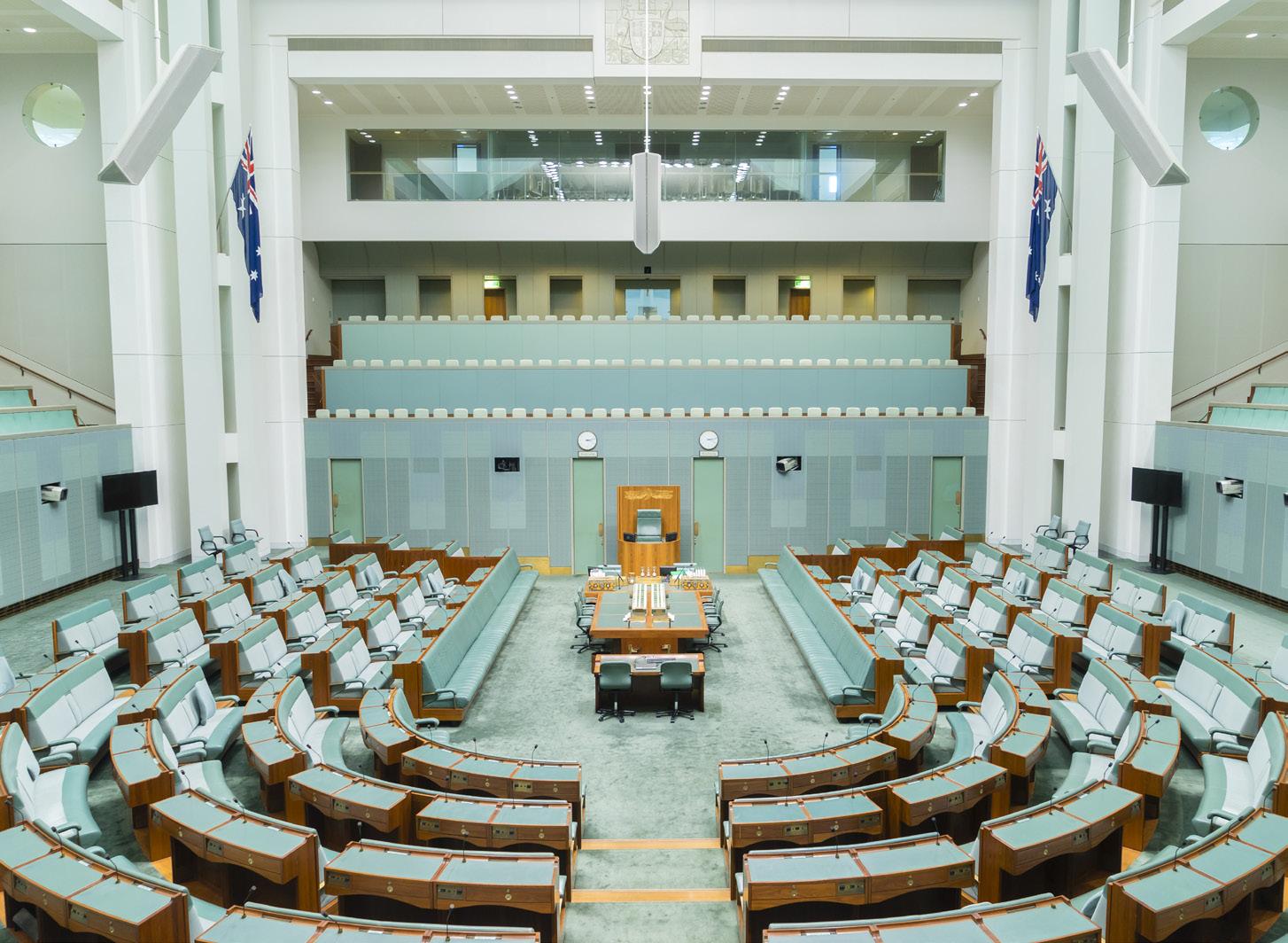
Australia - who will likely bear the brunt of these enshrined targets and the increased cost of living and the impact on jobs and the economy - and, perhaps, people who will be forced into energy poverty as power prices continue to skyrocket.”
In her contribution, the Leader of the Australian Greens in the Senate, Senator Larissa Waters, indicating her support for the Bills, said that “through our negotiations, we’ve improved a weak Climate Bill. It’s still weak, and it’s still nowhere near enough, but it is a small step in the right direction, and the Greens will vote for it.” She told the Senate that “the Labor Party’s target of 43% was set in consultation with political scientists, instead of climate scientists, and it’s at risk of failing because of new coal and gas.”
Senator Waters argued that “this could be the climate Parliament … Australia is the sunniest continent on the planet, with amazing wind resources and smart, adaptive and innovative minds. These resources and these huge opportunities are being wasted as each year passes. Imagine what could be achieved if Australia’s energy is effectively free. Manufacturing could return to our shores again, and we could make green products here instead of exporting the raw materials overseas.”
Opposing the Bill, Senator Pauline Hanson (Pauline Hanson’s One Nation) said that “the only guarantees from Labor’s climate change folly and this legislation will be the death of Australian manufacturing and innovation, chronic high
unemployment, reduced living conditions and standards, and even greater rises in the cost of living and doing business in Australia. It will make our current cost-ofliving crisis seem like a walk in the park.”
Senator David Pocock (Independent) told the Senate that it was “clear that human influence on the climate system is now an established fact. We don’t have to look far to see our Pacific Islands neighbours crying out for climate action. For many of them this is an existential threat.” Senator Pocock said that “our communities around the country are demanding action … from each other, from corporate Australia and from government. Jurisdictions from the UK to New Zealand have adopted climate laws that give a framework for climate action. Some Australian states and territories have done the same. The ACT … passed a Climate Act in 2010. Victoria passed a similar Act with broader functions and powers in 2017.”
Summing up, the Assistant Minister for Climate Change and Energy, Senator Hon. Jenny McAllister said that the Bills “provide the clearest signal this Parliament can provide that Australia is serious about climate action, serious about building a net zero economy and serious about capturing the jobs, the investment and the other benefits that a net zero economy will bring.”
During the Committee of the Whole debate, Senator Pocock moved amendments which he said would “improve the accountability and transparency mechanisms”. Senator Pocock explained that the effect of the amendments, which were ultimately agreed, was to:
• require that the annual climate change statement consider the risks presented by climate change;
• require that there be public consultation before the annual statement on climate change;
• require advice from the Climate Change Authority be made public before or at the same time as the annual statement on climate change; and
• close loopholes allowing the Australian Renewable Energy Agency to fund non-renewable energy sources and technologies.
The Bills, as amended, were agreed to and read a third time. The House considered and agreed to the Senate amendments the same day. The Bills received royal assent on 12 September 2022.
The Parliamentarian | 2022: Issue Three | 100 years of publishing | 285
THIRD READING REPORT AUSTRALIA
The Parliamentarian: Book Review
‘Global Citizen: Grass Roots Democracy and High Diplomacy’ by Carl Wright, Secretary-General Emeritus, Commonwealth Local Government Forum and member of the Editorial Advisory Board for The Parliamentarian (Hansib Publications 2022, £16.99)
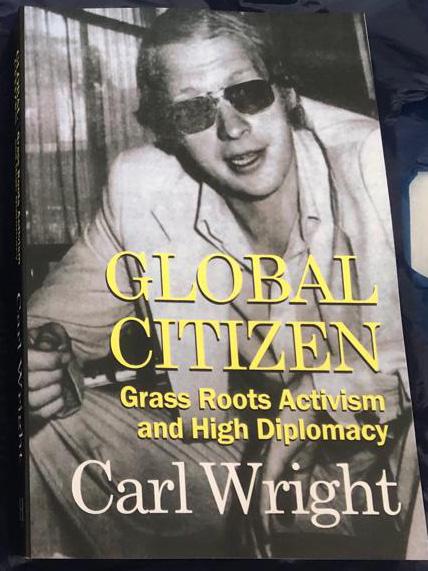
Review by Hon. Robert Montague, CH, MP, Minister without Portfolio in the Ministry of Economic Growth and Job Creation, Jamaica, who has held senior Ministerial posts and served as Chairperson of the Commonwealth Local Government Forum (CLGF).
Commonwealth Parliamentarians, local mayors and councillors have much in common: they face scrutiny and election from their electorate, they have to promote democracy and good governance and, especially at local community level, have key responsibilities for ensuring sustainable development and responding to environmental and climate emergencies.
Carl Wright, who I have worked with closely, both as a local government leader and then as a Parliamentarian and a Minister, including during my tenure as Chairperson of the Commonwealth Local Government Forum (CLGF), knows these interconnections well.
His autobiography and professional recollections, ‘Global Citizen’ gives numerous examples of how MPs can work with their local counterparts for the common good. He also sets out political tensions which can and do occur, for example in Malawi, where CLGF played an important role in helping to overcome these. In this particular instance, MPs from Malawi were given the opportunity of visiting and studying the local government systems of neighbouring countries like Zambia and Uganda, to demonstrate the value of local democracy. CLGF also organised a series of in-county events to assist the Malawi Government in overhauling its local government system and reinstate local elections.
In these observations, Carl can draw on his extensive experience of collaborating with many Commonwealth bodies, not least the Commonwealth Parliamentary Association. He also describes his tasks as Commonwealth election observer in Ghana, Nigeria and Pakistan, an assignment I myself undertook as well in Sierra Leone. What is unique however is that the book combines the work
of a life-long political activist and of a senior international diplomat, including his time as Assistant Director at the Commonwealth Secretariat (1988-94). It accordingly provides a valuable insight into the complex relationship between nongovernmental, quasi-governmental and intergovernmental organisations.
‘Global Citizen’ is an extensive review of Commonwealth and international affairs over 50 years, 1972-2022, written from the perspective of a senior practitioner. This includes the Caribbean where Carl has been supportive for many years, helping to build grass roots structures, supporting our cause in places like the EU and the UN, and interacting with many of our leaders like Hugh Shearer, Portia Simpson Miller and Bruce Golding in the case of Jamaica. Thus, when he helped to set up the CLGF in 1994, it was instructive that among the very first activities organised was a regional event in Trinidad and Tobago. Caribbean countries have benefited from CLGF’s technical support, partnership programmes and training, as indeed have most Commonwealth countries around the world. For me, moreover, one of the delightful passages of the book related to reading about our own Bob Marley playing at the Zimbabwe Independence Celebrations in 1980.
One of the messages of the book is about the circular nature of politics and how ideas for international economic reforms mooted in the 1970s found later expression in the Millennium Development Goals in the early 2000s and more especially in the Sustainable Development Goals agreed for 2030. There is also much interesting recounting, supported by amusing personal anecdotes, of encounters with iconic global leaders like Nelson Mandela, Indira Gandhi and Fidel Castro. The role played by the
Commonwealth in advancing the cause of the anti-apartheid struggle in the 1980s is highlighted, including the strong backing given to Black trade unions in the 1980s by the Commonwealth Trade Union Council (CTUC), headed by Carl at the time. So too is the Commonwealth support for the postapartheid human resource development of the new South Africa. At the same time, disappointment is expressed where Commonwealth principles, including those set out in the 2005 Aberdeen Principles on Good Practice for Local Democracy and Good Governance are flaunted.
The book is not just a look backwards but is highly relevant to our turbulent current times. It makes a passionate plea to reject the siren calls of political populism and the drift towards authoritarianism and conflict. It concludes by reiterating that all human beings are equal regardless of race, creed or religion; that protecting democratic values is vital; that globalisation is remote to ordinary people and requires more, not less, local decision-making; that our international system needs preserving and strengthening; and that we need to address the bigger picture like climate change and biodiversity loss. That we all, and especially our young, should strive to be Global Citizens.
This is a book which Parliamentarians throughout the Commonwealth - and beyond - will benefit from reading. I can do no better than echo the warm recommendation made by that great son of the Caribbean, former Commonwealth Secretary-General, Sir Shridath (Sonny) Ramphal, who said: ‘Not many have lived the life of a Global Citizen, but Carl Wright has…these recollections are a text-book for a generation still in need of learning the compulsions of global citizenship’.
286 | The Parliamentarian | 2022: Issue Three | 100 years of publishing
THE PARLIAMENTARIAN BOOK REVIEW
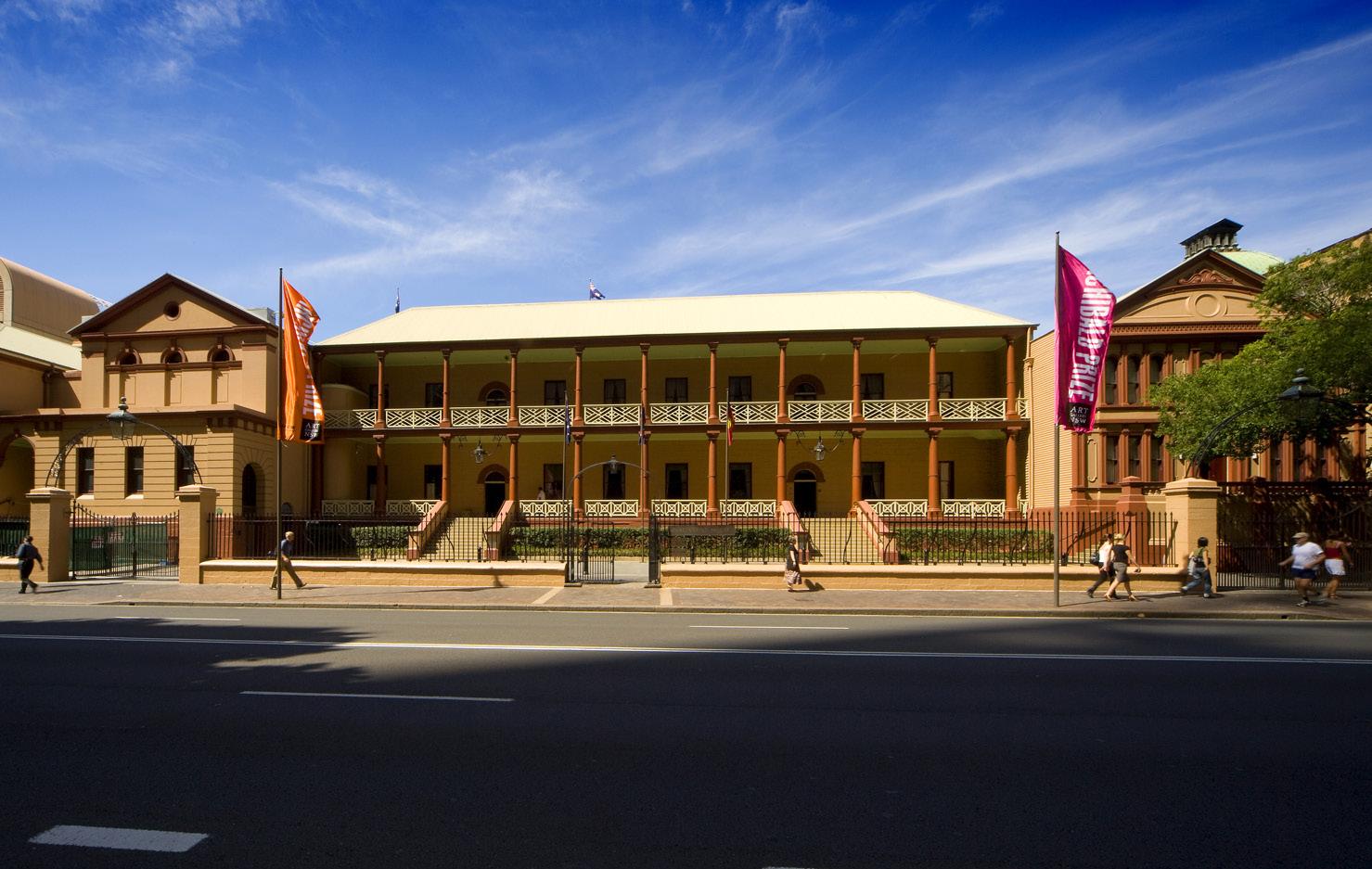


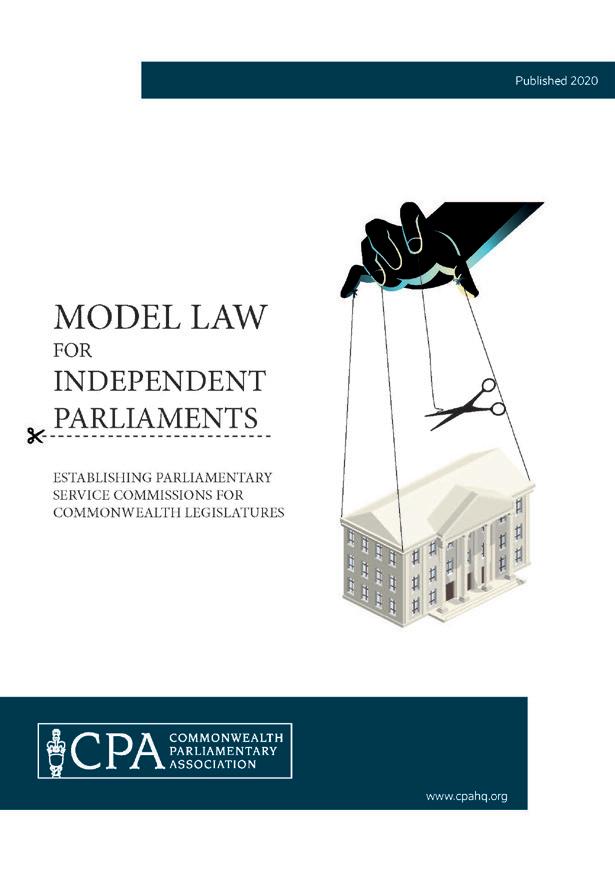
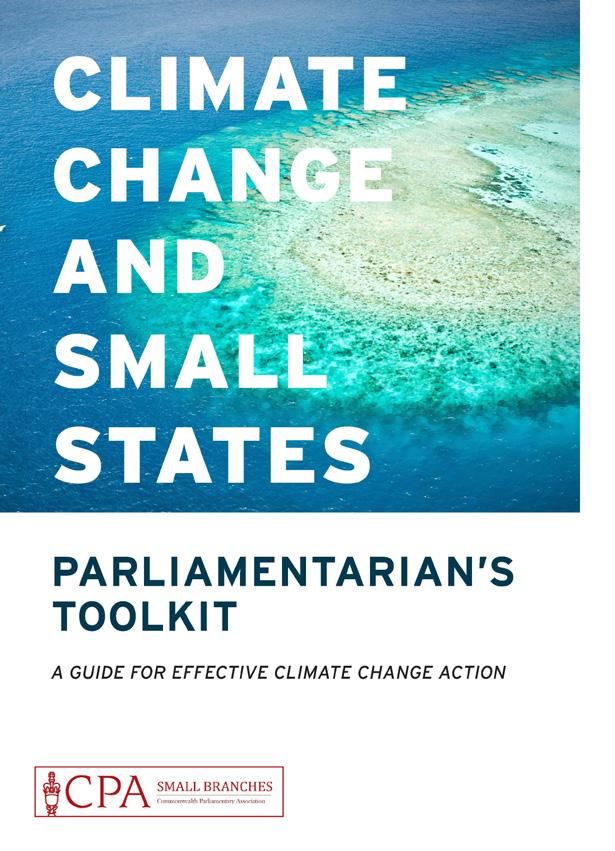
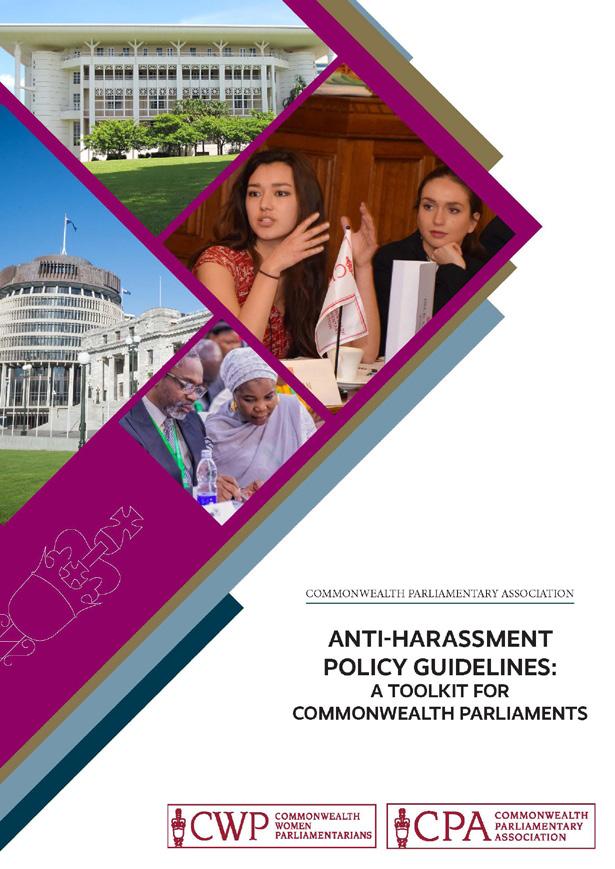
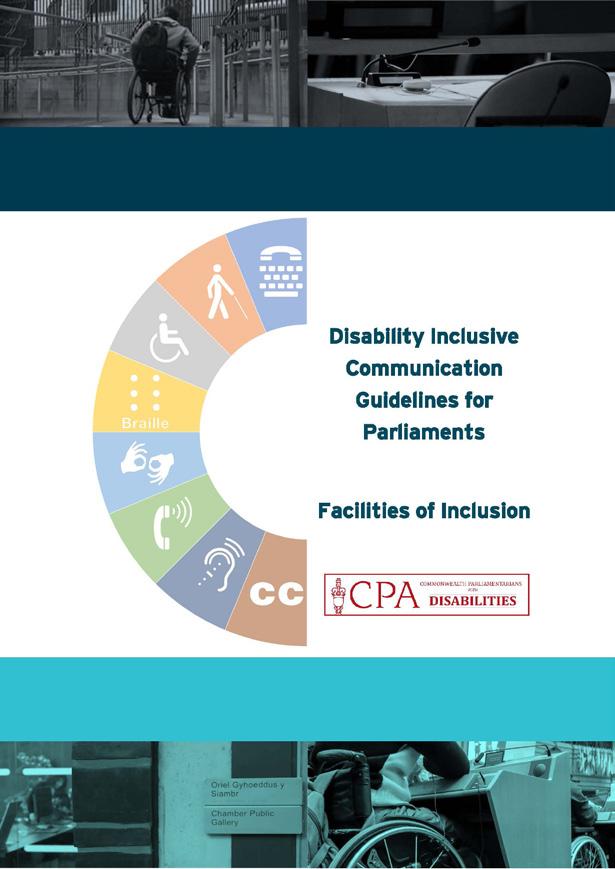
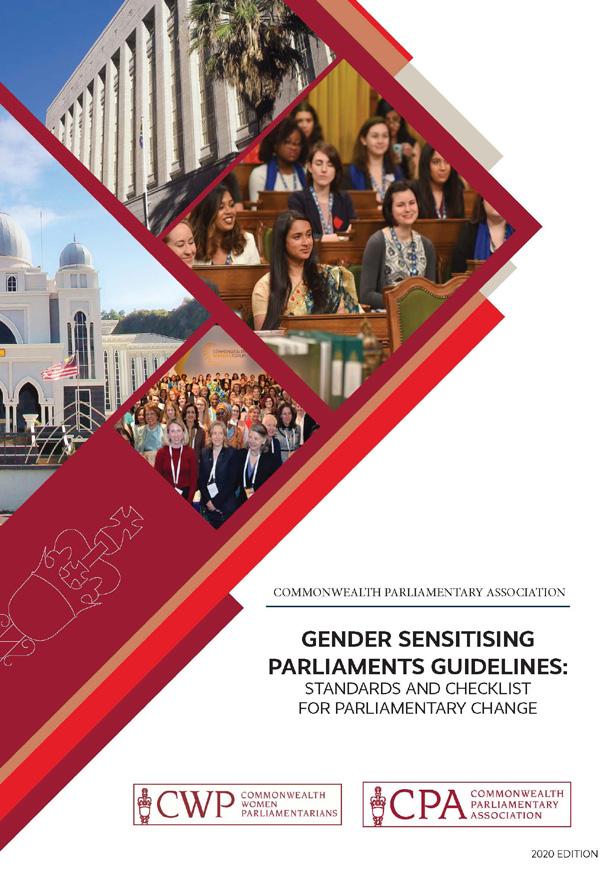
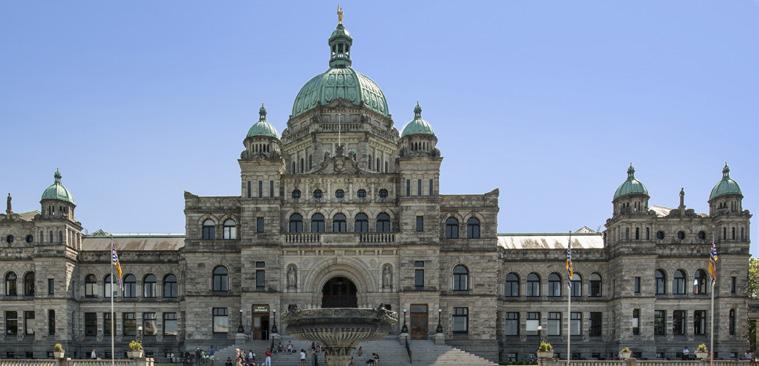
DID YOU KNOW THAT CPA HAS RESOURCES AVAILABLE FOR COMMONWEALTH PARLIAMENTS? DOWNLOAD CPA’S NEW PUBLICATIONS AND TOOLKITS Visit www.cpahq.org or email hq.sec@cpahq.org www.cpahq.org
Office Holders
Office Holders of the Commonwealth Parliamentary Association
CPA Executive Committee
Dates of membership below. Some Members are completing terms started by other Members. *TermdatesextendedasnoCPAGeneralAssemblyheldin2018,2020and2021.
CPA Officers
CPA PRESIDENT: (65th CPC to 66th CPC - 2022-2023): Rt Hon. Alban Bagbin, MP, Speaker of Parliament (Ghana)
CPA VICE-PRESIDENT: (65th CPC to 66th CPC - 2022-2023): Hon. Matthew Mason-Cox, MLC, President of the New South Wales Legislative Council
CHAIRPERSON OF THE CPA EXECUTIVE COMMITTEE: (65th CPC to 68th CPC - 2022-2025): Hon. Ian Liddell-Grainger, MP (United Kingdom)
CPA VICE-CHAIRPERSON: (65th CPC to 66th CPC - 2022-2023): Hon. Osei Kyei Mensah Bonsu, MP (Ghana)
CPA TREASURER: (65th CPC to 68th CPC - 2022-2025): Hon. Shri Anurag Sharma, MP (Lok Sabha, India Union)
COMMONWEALTH WOMEN PARLIAMENTARIANS (CWP)
CHAIRPERSON: (65th CPC to 68th CPC - 2022-2025): Hon. Dr Zainab Gimba, MP (Nigeria)
CPA SMALL BRANCHES
CHAIRPERSON: (65th CPC to 68th CPC - 2022-2025): Joy Burch, MLA, Speaker of the Legislative Assembly of Australian Capital Territory
COMMONWEALTH PARLIAMENTARIANS
WITH DISABILITIES (CPwD)
CHAIRPERSON: (65th CPC to 68th CPC - 2022-2025): Hon. Laura Kanushu Opori, MP (Uganda)
The CPA Coordinating Committee comprises the CPA Chairperson, Vice-Chairperson, Treasurer, CPA Small Branches Chairperson and the Chairpersons of the Commonwealth Women Parliamentarians (CWP) and the Commonwealth Parliamentarians with Disabilities (CPwD).
Regional Representatives
AFRICA REGION
Hon. Dr Makali Mulu, MP, Kenya (63rd CPC to 66th CPC- 2017-2023)*
Rt Hon. Sephiri Enoch Motanyane, MP, Speaker, Lesotho (63rd CPC to 66th CPC- 2017-2023)*
Hon. Osei Kyei Mensah Bonsu, MP, Ghana (64th CPC to 67th CPC - 2019-2024)* - Also CPA ViceChairperson
Rt Hon. Dr Abass Bundu, MP, Speaker, Sierra Leone (64th CPC to 67th CPC - 2019-2024)*
Hon. Solomon Lechesa Tsenoli, MP, Deputy Speaker of the National Assembly, South Africa (65th CPC to 68th CPC - 2022-2025)
Hon. Raymond Nkhata, MP, Malawi (65th CPC to 68th CPC - 2022-2025)
ASIA REGION
Hon. Dr Lal Chand Ukrani, MPA Sindh, (63rd CPC to 66th CPC- 20172023)*
Hon. Mahinda Yapa Abeywardana, MP, Speaker, Sri Lanka (64th CPC to 67th CPC - 2019-2024)*
Completing the term started by another Sri Lanka Member.
Hon. Kazi Nabil Ahmed, MP Bangladesh (65th CPC to 68th CPC - 2022-2025)
AUSTRALIA REGION
Hon. Bruce Atkinson, MLC Victoria (63rd CPC to 66th CPC- 2017-2023)*
Senator Hon. Sue Lines, President of the Senate, Australia Federal (64th CPC to 67th CPC - 2019-2024). Completing the term started by other Australia Federal Senators.
Hon. Mark Shelton, MP, Speaker of the Legislative Assembly, Tasmania (65th CPC to 68th CPC - 2022-2025)
BRITISH ISLANDS AND MEDITERRANEAN REGION
Hon. Leona Roberts, MLA Falkland Islands (63rd CPC to 66th CPC- 2017-2023)*
Vacant, United Kingdom (64th CPC to 67th CPC - 2019-2024)* Completing the term started by other UK Members.

Hon. Stuart McMillan, MSP, Scotland (65th CPC to 68th CPC - 2022-2025)
CANADA REGION
Hon. Randy Weekes, MLA, Speaker of the Legislative Assembly of Saskatchewan (63rd CPC to 66th CPC- 2017-2023)* Completing the term started by Nova Scotia.
Hon. Terry Duguid, MP, Canada Federal (64th CPC to 67th CPC2019-2024)* Completing the term started by another Canadian Member.
Hon. Ted Arnott, MPP, Speaker of the Legislative Assembly of Ontario (65th CPC to 68th CPC2022-2025)
CARIBBEAN, AMERICAS AND THE ATLANTIC REGION
Hon. Claudius J. Francis, MP, Speaker, Saint Lucia (64th CPC to 67th CPC - 2019-2024)* Completing the term started by another St Lucia Member.
Hon. Gordon J. Burton, MHA, Speaker, Turks & Caicos (64th CPC to 67th CPC - 2019-2024)* Completing the term started by another Turks & Caicos Member.
Vacant (65th CPC to 68th CPC2022-2025)
INDIA REGION
Shri Biswajit Daimary, MLA, Speaker of the Legislative Assembly, Assam (63rd CPC to 66th CPC- 20172023)* Completing the term started by another Assam Member.
Hon. Neeraj Shekhar, MP Rajya Sabha, India Union, (64th CPC to 67th CPC - 2019-2024)* Completing the tern started by another India Member.
Vacant (65th CPC to 68th CPC2022-2025)
PACIFIC REGION
Hon. Therese Kaetavara, MHR, Deputy Speaker, Bougainville (63rd CPC to 66th CPC- 2017-2023)* Completing the term started by another Bougainville Member
H. E. Hon. Ratu Epeli Nailatikau Speaker, Fiji (64th CPC to 67th CPC2019-2024)*
Hon. Gerry Brownlee, MP, New Zealand (65th CPC to 68th CPC2022-2025)
SOUTH-EAST ASIA REGION
Hon. Lim Biow Chuan, MP Singapore (63rd CPC to 66th CPC2017-2023)* Completing term started by another Singapore Member
Hon. Datuk Wira Dr Mohd Hatta Ramli, MP, Malaysia (64th CPC to 67th CPC - 2019-2024)*
Hon. Dato’ Law Choo Kiang, MLA, Speaker, Penang (65th CPC to 68th CPC - 2022-2025)
Commonwealth Parliamentary Association
288 | The Parliamentarian | 2022: Issue Three | 100 years of publishing
CPA Small Branches Steering Committee
CPA SMALL BRANCHES
CHAIRPERSON
Joy Burch, MLA, Speaker of the Legislative Assembly of Australian Capital Territory
AFRICA REGION
Hon. Churchill Gill, MNA Seychelles (2021-2024) - CPA Small Branches Vice-Chairperson
AUSTRALIA REGION
Hon. Mark Monaghan, MLA Speaker, Northern Territory (20202023)
BRITISH ISLANDS AND MEDITERRANEAN REGION
Hon. Juan Watterson, SHK Speaker of the House of Keys, Isle of Man (2020-2023)
CANADA REGION
Hon. Nils Clarke, MLA Yukon (2019-2022)
CARIBBEAN, AMERICAS
AND THE ATLANTIC REGION
Hon. Barbara Webster-Bourne, MHA, Speaker of the House of Assembly, Anguilla (2020-2023)
PACIFIC REGION
Hon. Tofa Nafoitoa Talaimanu Keti, MP, Samoa (2019-2022)
SOUTH-EAST ASIA REGION
Hon. Hamizan bin Hassan, MLA Perlis (2020-2023)
The CPA Small Branches Steering Committee comprises the CPA Small Branches Chairperson and seven Members who represent the seven out of the nine Regions of the CPA with Small Branches.
Commonwealth Women Parliamentarians (CWP) Steering Committee
CWP PRESIDENT Vacant Ghana (2022-2023)
CWP CHAIRPERSON
Hon. Dr Zainab Gimba, MP Nigeria (2022-2025)
AFRICA REGION Vacant (2022-2025)
ASIA REGION
Hon. Selima Ahmad, MP Bangladesh (2021-2024)
AUSTRALIA REGION
Senator Nita Green Australia Federal (2022-2025)
BRITISH ISLANDS AND MEDITERRANEAN REGION
Rt Hon. Dame Maria Miller, MP United Kingdom (2021-2024)
CANADA REGION
Hon. Lisa Thompson, MPP Ontario (2020-2023)
CARIBBEAN, AMERICAS
AND THE ATLANTIC REGION Hon. Valerie Woods, MP Speaker of the House of Representatives, Belize (2021-2024) - Also CWP ViceChairperson (2022-2023)
INDIA REGION
Smt. Sunita Duggal, MP Lok Sabha, India (2020-2023)
PACIFIC REGION
Hon. Selina Napa, MP Cook Islands (2020-2023)
SOUTH-EAST ASIA REGION
Hon. Alice Lau Kiong Yieng, MP Malaysia (2022-2025)
Commonwealth Parliamentarians with Disabilities (CPwD) Regional Champions
CPwD CHAIRPERSON
Hon. Laura Kanushu Opori, MP Uganda (2022-2025)
AFRICA REGION
Hon. Laura Kanushu Opori, MP Uganda (2020-2023)
ASIA REGION
Hon. Zill-E-Huma, MNA Pakistan (2020-2023)
AUSTRALIA REGION
Hon. Liesl Tesch, MP New South Wales (2020-2023)
BRITISH ISLANDS AND MEDITERRANEAN REGION
Hon. Paul Maynard, MP United Kingdom (2020-2023)
CPA Regional Secretaries
AFRICA REGION Ms Nenelwa Joyce Mwihambi, Parliament of Tanzania
ASIA REGION Mr Dhammika Dasanayake, Parliament of Sri Lanka
AUSTRALIA REGION Ms Alex Cullum, Parliament of Australia
BRITISH ISLANDS & MEDITERRANEAN Mr Jon Davies, Parliament of the United Kingdom
CANADA REGION
Hon. Dan Coulter, MLA British Columbia (2020-2023)
CARIBBEAN, AMERICAS
AND THE ATLANTIC REGION
Senator Hon. Paul Richards Trinidad and Tobago (2020-2023) Also: CPwD Vice-Chairperson
INDIA REGION
Smt. Supriya Sule, MP India (2020-2023)
PACIFIC REGION
Hon. Viam Pillay, MP
Assistant Minister for Agriculture, Waterways and Environment, Fiji (2020-2023)
SOUTH-EAST ASIA REGION
Senator Ras Adiba Mohd Radzi Malaysia (2020-2023)
CANADA REGION Mr Jeremy LeBlanc, Parliament of Canada
CARIBBEAN, AMERICAS & THE ATLANTIC REGION Mr Pedro E. Eastmond, Parliament of Barbados
INDIA REGION Shri Utpal Kumar Singh, Parliament of India
PACIFIC REGION Ms Megan Robins, Parliament of New Zealand
SOUTH-EAST ASIA REGION Mr Nizam Mydin bin Bacha Mydin, Parliament of Malaysia
CPA Headquarters Secretariat
Stephen Twigg
CPA Secretary-General Commonwealth Parliamentary Association, CPA Headquarters Secretariat, Richmond House, Houses of Parliament, London SW1A 0AA, United Kingdom
Tel: +44 (0)20 7799 1460 Email: hq.sec@cpahq.org www.cpahq.org Twitter @CPA_Secretariat Facebook.com/CPAHQ Instagram @cpa_secretariat LinkedIn | YouTube
InformationassuppliedbyCPABranchesandCPARegionstoCPAHeadquartersSecretariat
Commonwealth Parliamentary Association (CPA)
A full A to Z listing of all CPA Branches can be found at: www.cpahq.org
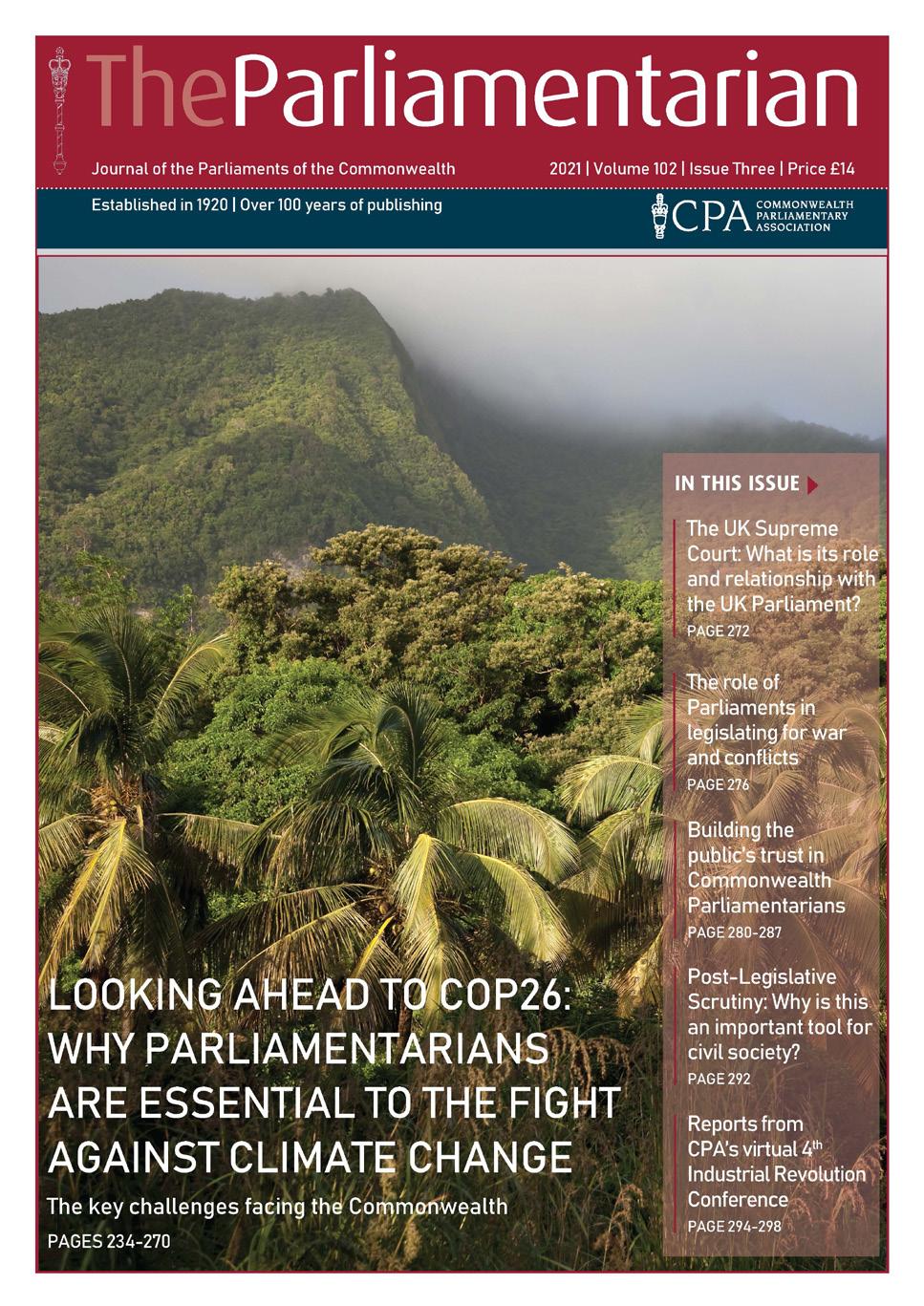
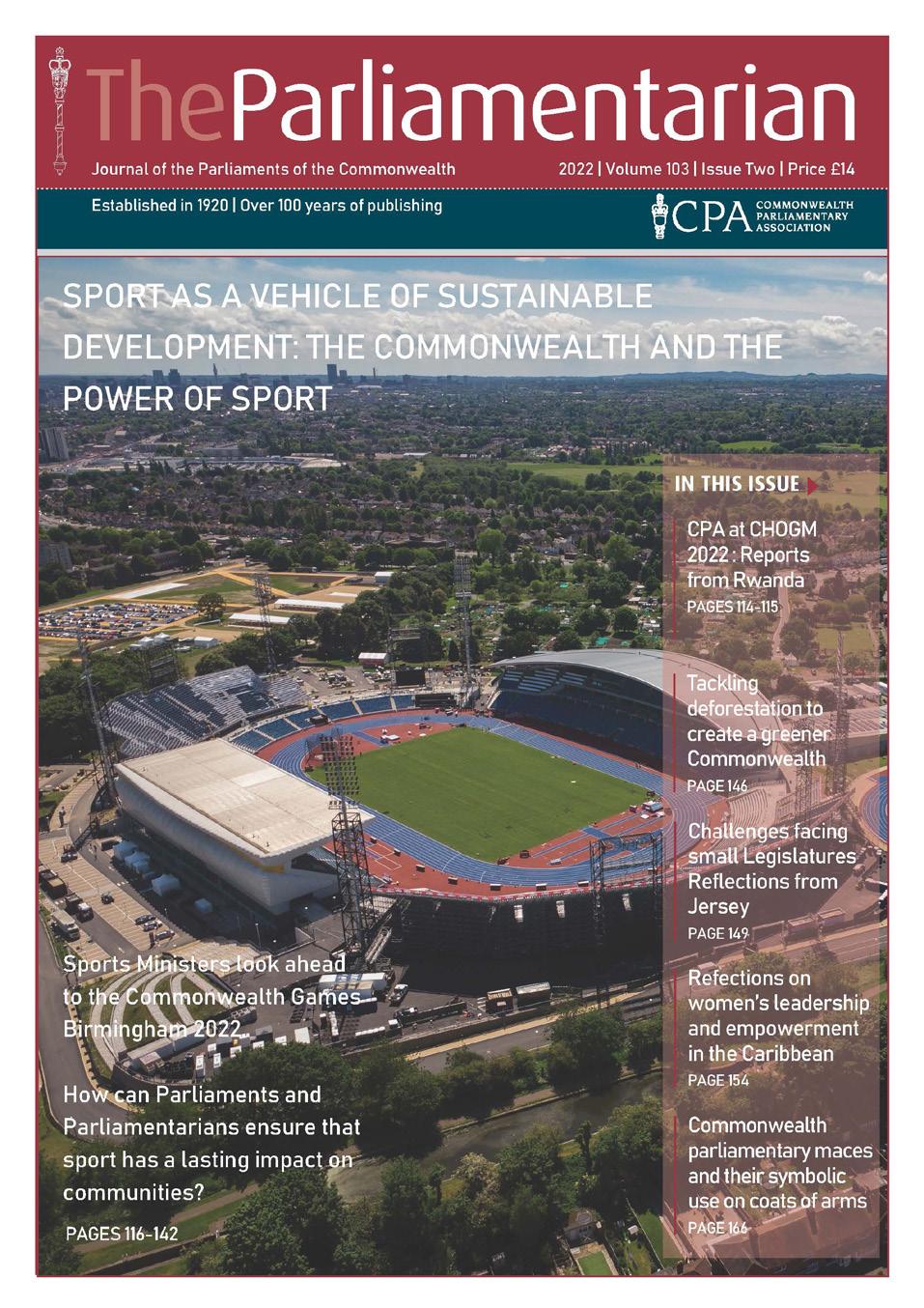
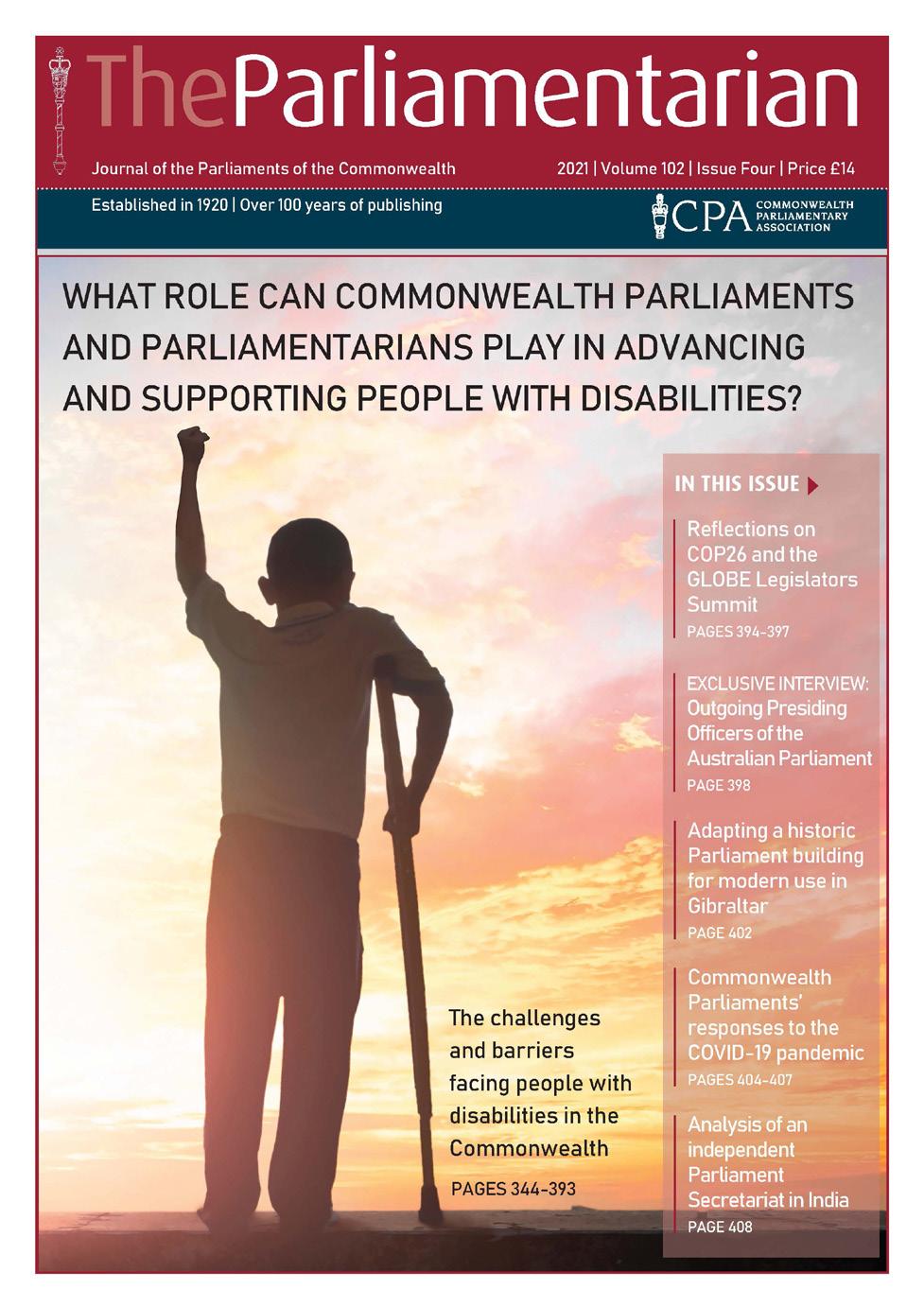
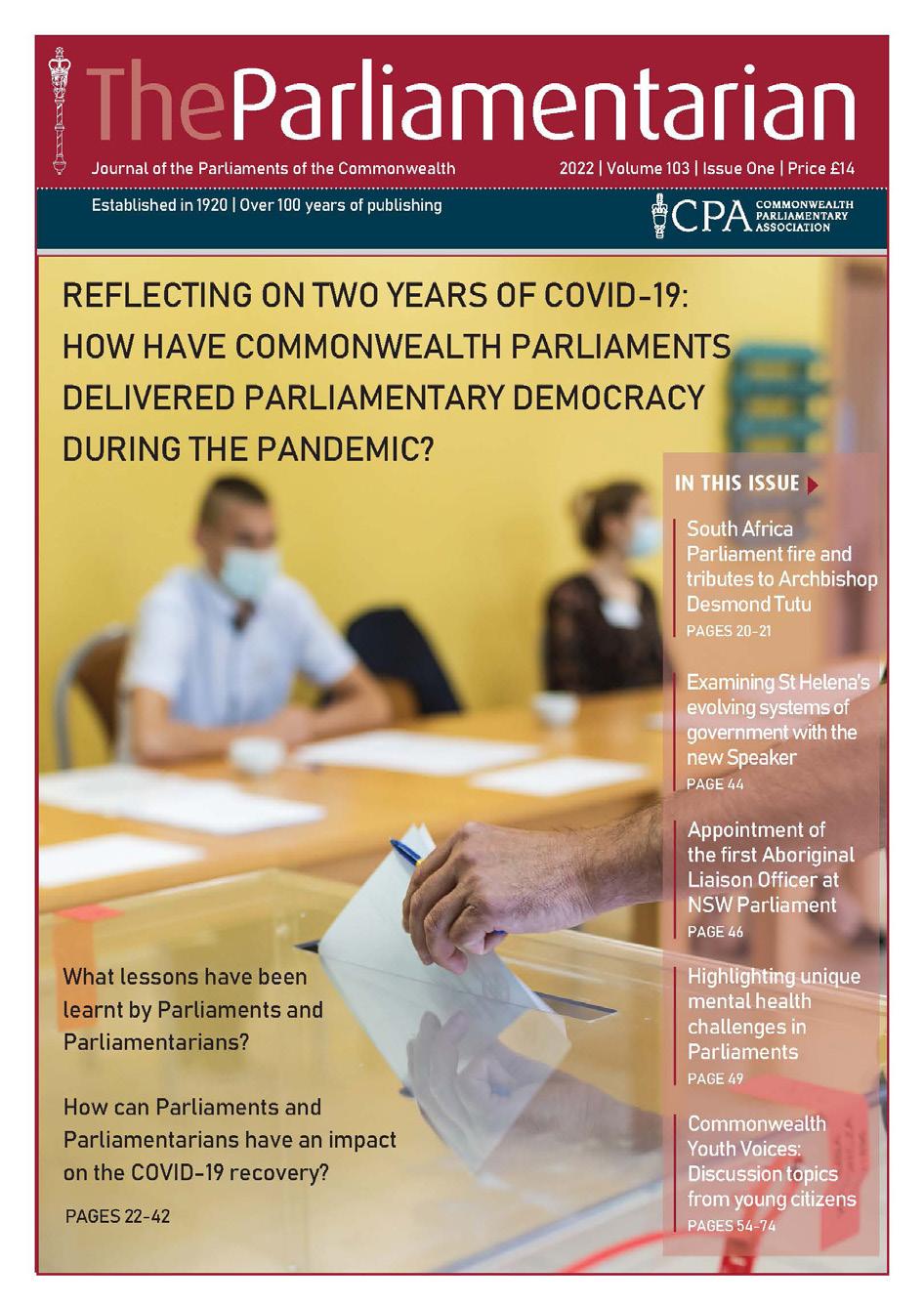
SUBSCRIBE TODAY THE PARLIAMENTARIAN To subscribe to The Parliamentarian, please email editor@cpahq.org Members of Parliament: Please contact your CPA Branch Secretary for print and digital copies. Individual subscriptions also available.
















 Hon. Ian Liddell-Grainger, MP, Chairperson of the CPA Executive Committee and Member of the United Kingdom Parliament.
Hon. Ian Liddell-Grainger, MP, Chairperson of the CPA Executive Committee and Member of the United Kingdom Parliament.





































































































































































































